Srlmad-Bhagavatam

Srlmad-Bhagavatam of K�SNA-DVAIPAYANA VYASA
�ii�l!41(1iR1Jt � ��q� I q��tltserf'��ms�+�&'( ����II
aham eviisam eviigre niinyad yat sad-asat param pasciid aham yad etac ca yo'vasi�yeta so'smy aham (p. 507)


ALL GLORY TO SRT
GURU AND GAURANGA
OTHER BOOKS by His Divine Grace A.C. Bhaktivedanta swami Prabhupada
Bhagavad-gitii As 1t 1s
Teachings of Lord Caitanya
K!§[W, the Supreme Personality of Godhead (2 volumes)

Sri lsopani§ad
Easy Journey to Other Planets
Kr§rw Consciousness: The Topmost Yoga System
The Nectar of Devotion
The K!fi[W Consciousness Movement is the Genuine Vedic Way
Back to Godhead Magazine (Founder)
Srimad-Bhagavatam
Second Canto
"The cosmic Manifestation"
<Part one-chapters 1-6>


With the Original Sanskrit Text, Its Roman Transliteration, Synonyms, Translation and Elaborate Purports by His Divine Grace
A.C. Bhaktivedanta swami Prabhupada
Founder-Acarya of the International Society for Krishna Consciousness
THE BHAKTIVEDANTA BOOK TRUST New York · Los Angeles · London · Bombay
His Divine Grace
A. C. Bhaktivedanta Swami Prabhupada
Founder-Acarya of the International Society for Krishna Consciousness
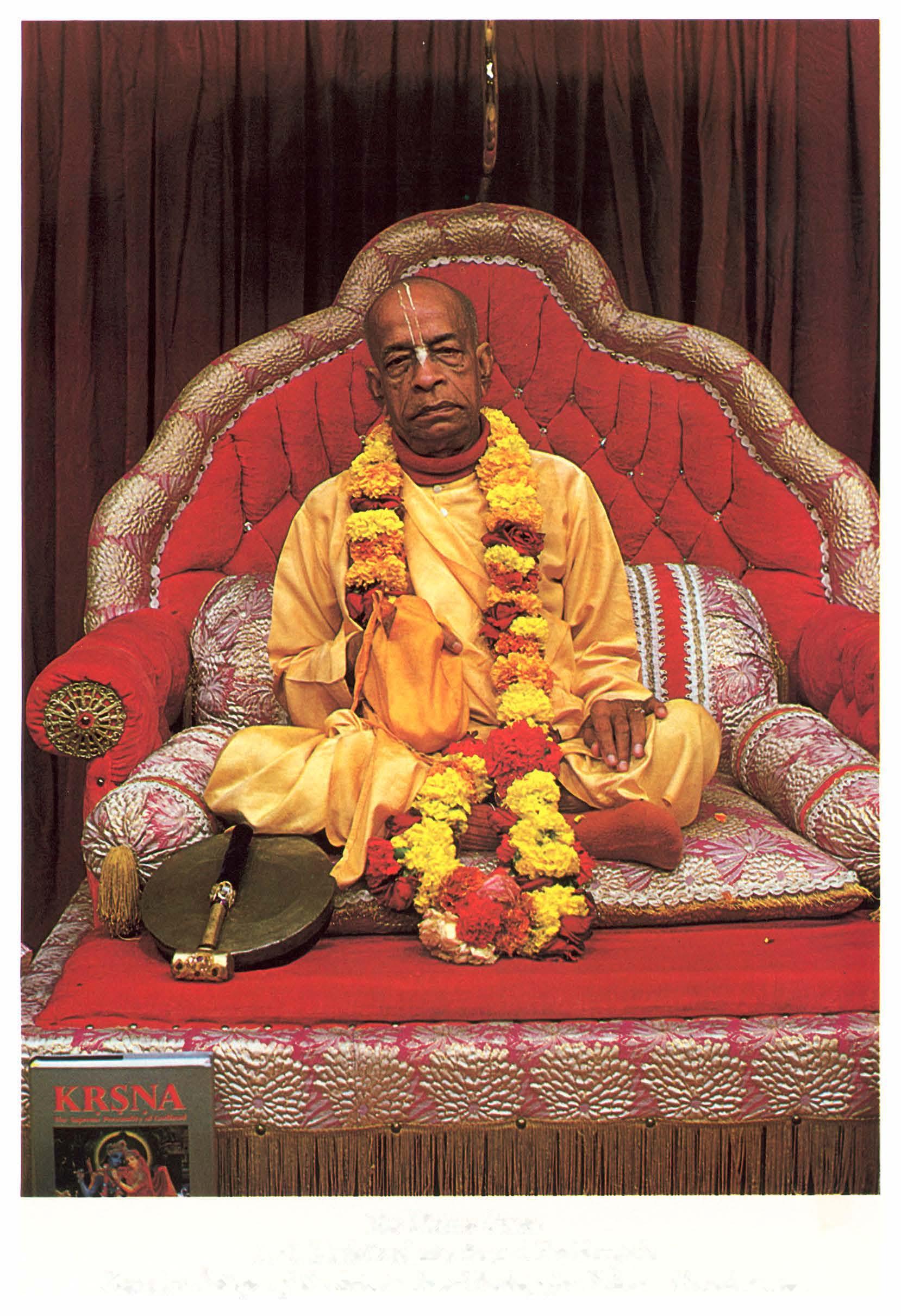
PLATE ONE
Five thousand years ago the great rajar�i (saintly king) Maharaja Parik!?it reigned as emperor of the world. Having received a warning that he would die within a week, he renounced his entire kingdom and retired to the bank of the Ganges at Hastinapura (now Delhi) to fast until death and receive spiritual enlight�nment. There, in an assembly of learned saints, he heard the entire Srimad-Bhiigavatam from the great sage Sukadeva Gosvami. 'fhe Bluigavatam begins with Emperor Parik!?it's sober inquiry to Sukadeva Gosvami: "You are the spiritual master of great saints and devotees. I am therefore begging you to show the way of perfection for all persons, and especially for one who is about to die. Please let me know what a man should hear, chant, remember and worship, and also what he should not do. Please explain all this to me."
Sukadeva Gosvami's answer to this question and numerous other questions posed by Maharaja Parik!?it, concerning everything from the nature of the self to the origin of the universe, held the assembled sages in rapt attention continuously for the seven days leading to the King's death.
(pp. 22-26)

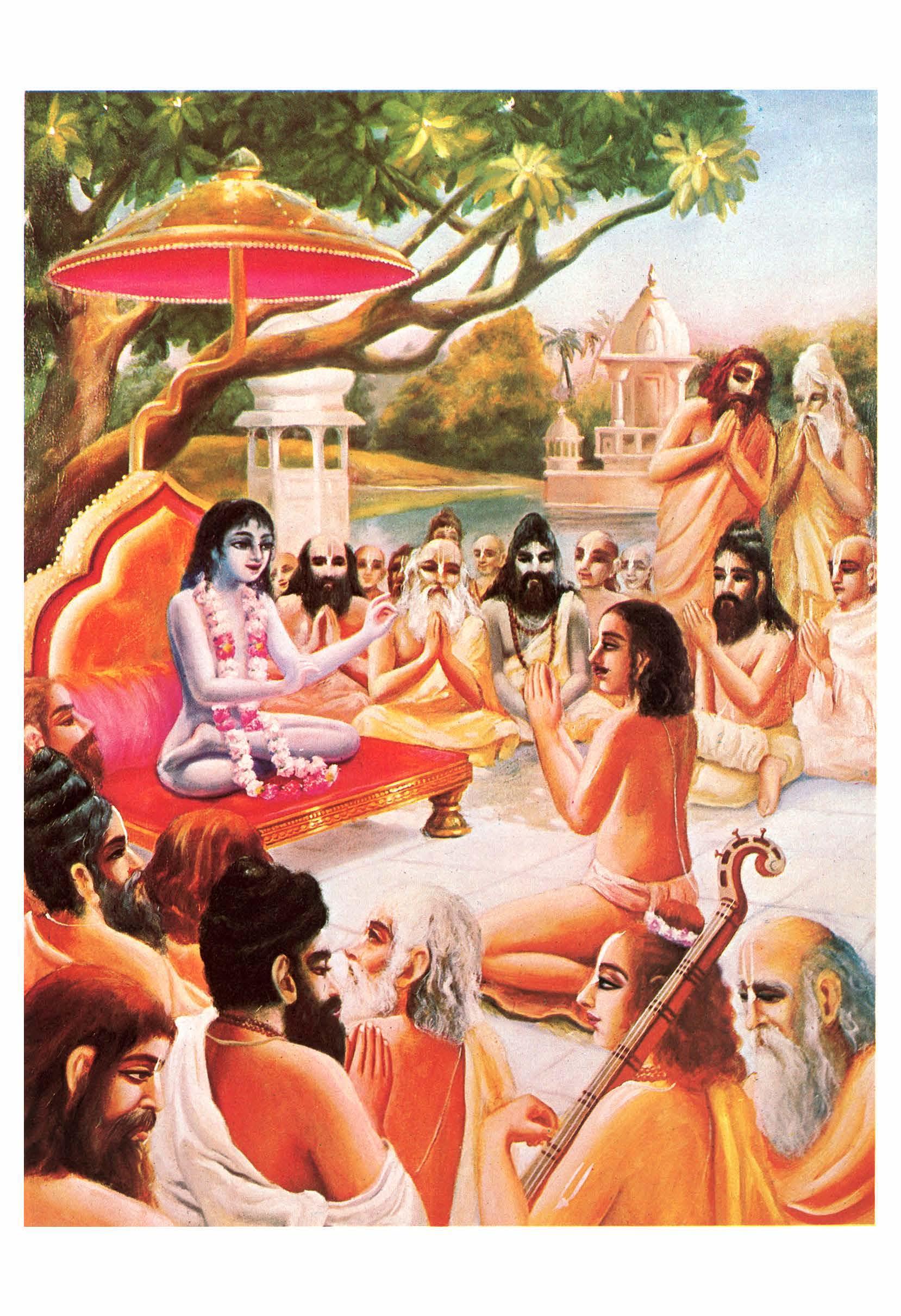
PLATE SIX
Mter being born out of the lotus growing from the navel of Garbhodaka8ayi Vi�Qu, Lord Brahmii turned his attention toward the task of creation. But he could see only darkness in every direction. Then Brahmii heard the sound tapa (penance) vibrated in the ether, and he sat in meditation. After one thousand celestial years, the sound of ��Qa's flute entered into the ear of Brahmii as the Vedic mantra om. When the sound vibration of ��Qa's flute was expressed through the mouth of Brahmii, it became the Gayatri mantra. Thus by the influence of ��Qa's flute, Brahmii, the supreme creature and first living entity of this material universe, attained all Vedic knowledge and became the original spiritual master of all living entities. (p. 123)

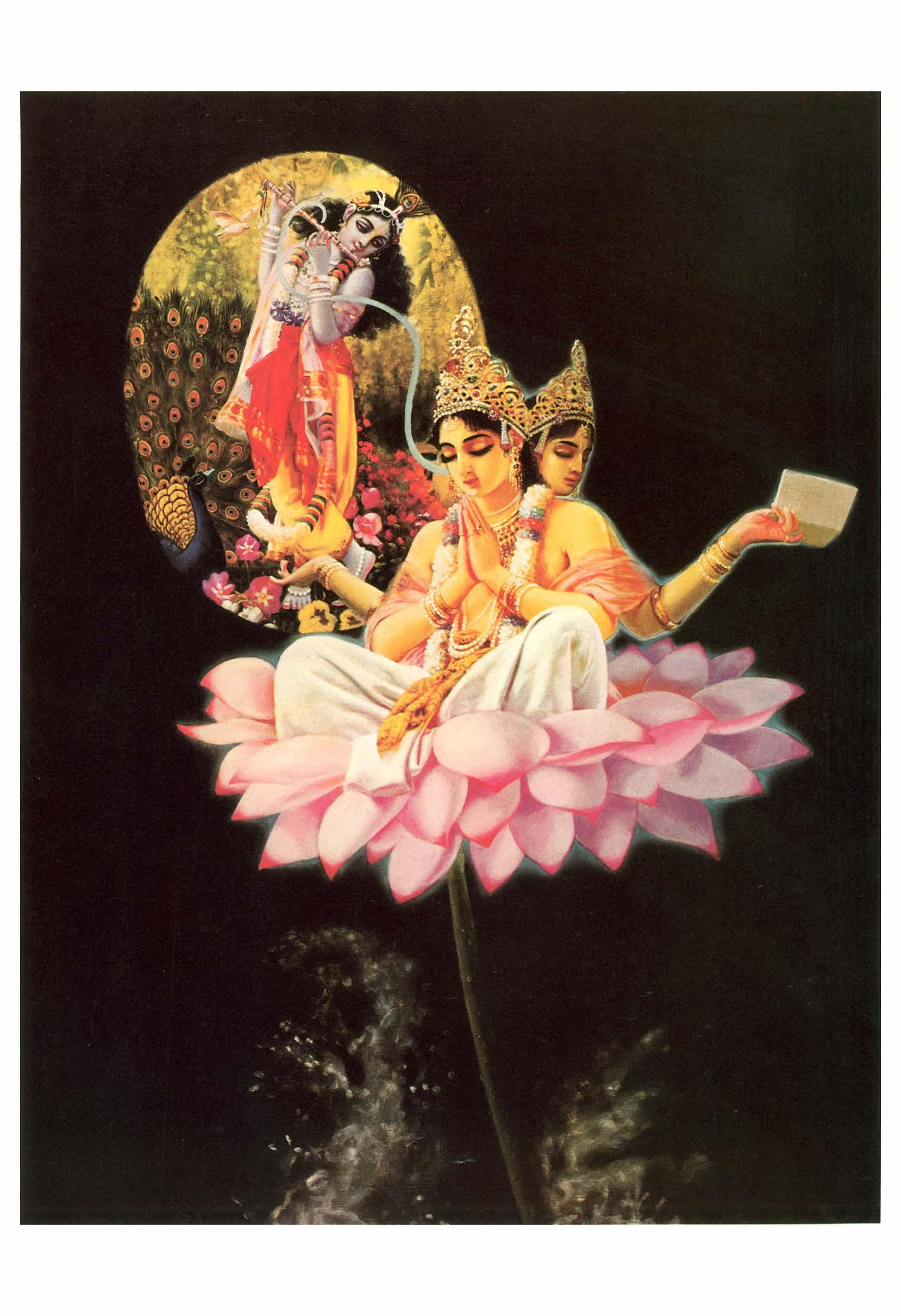
PLATE SEVEN
On the full-moon night of the autumn season, Lord Sri Kr!?I.la attracted the young milkmaids of V:rndavana to the forest with the sound of His celebrated flute. As they approached Him, one of the gopis said to Krf?I,la, "Dear Kr!?I,la, by seeing Your beautiful face decorated with tresses of hair, by seeing the beauty of Your earrings falling on Your cheeks, and by seeing the nectar of Your lips, the beauty of Your smiling glances, Your two arms, which assure complete fearlessness, and Your broad chest, whose beauty arouses conjugal attraction, we have simply surrendered ourselves to become Your maidservants." (p. 145)


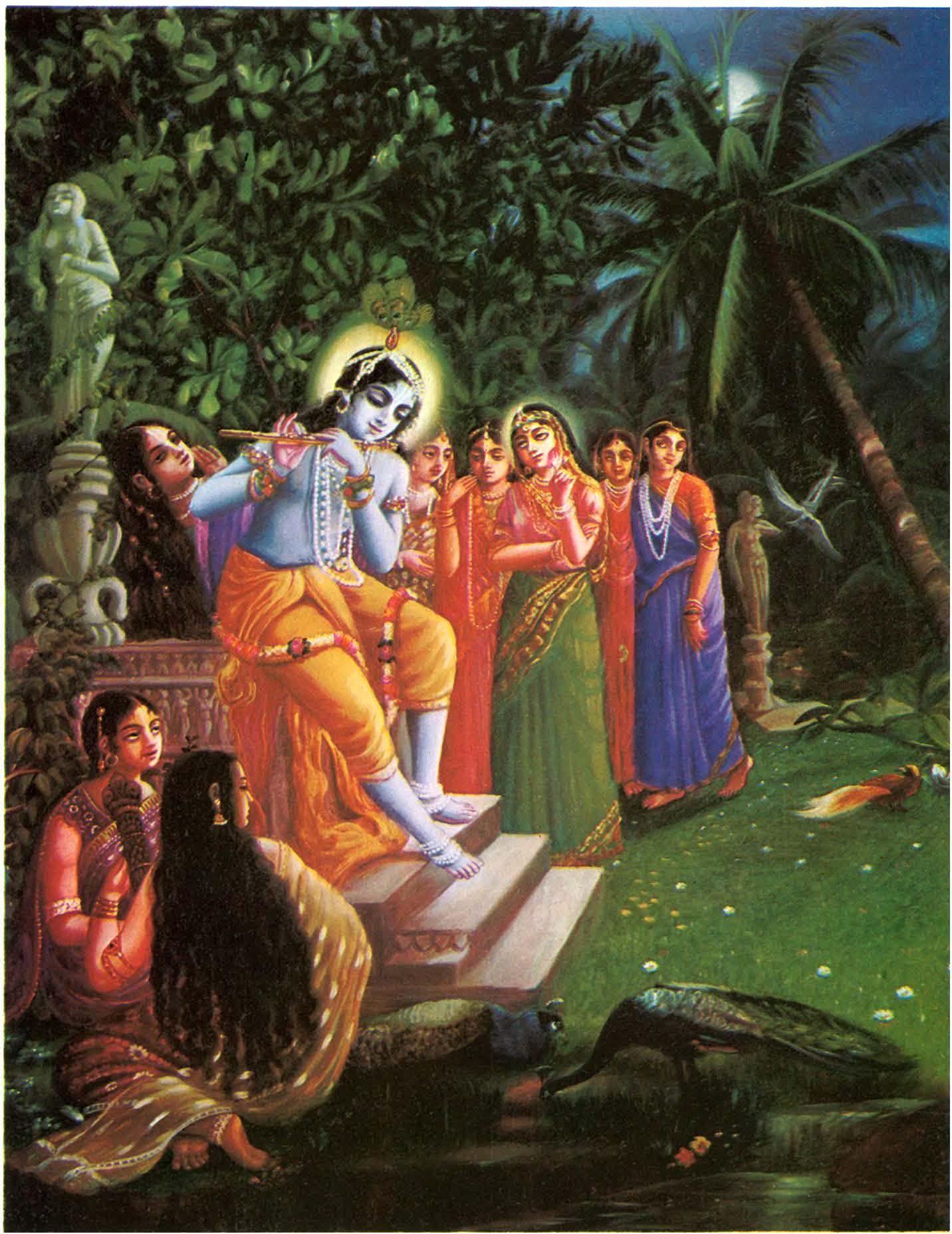
PLATE EIGHT
Our material senses cannot perceive the transcendental, all-spiritual body of the Supreme Lord. Nevertheless, out of His causeless mercy, the Lord, by expanding His spiritual potencies, can manifest Himself as the Deity, or arca-vigraha, thus allowing us to see Him. Although seemingly made ofmaterialelements like stone, wood, or earth, the Deity, the area incarnation, is directly Lord Sri Kr�r:ta Himself. The omnipotent Supreme Personality of Godhead can appear anywhere without being contaminated by matter. (pp. 167-171)

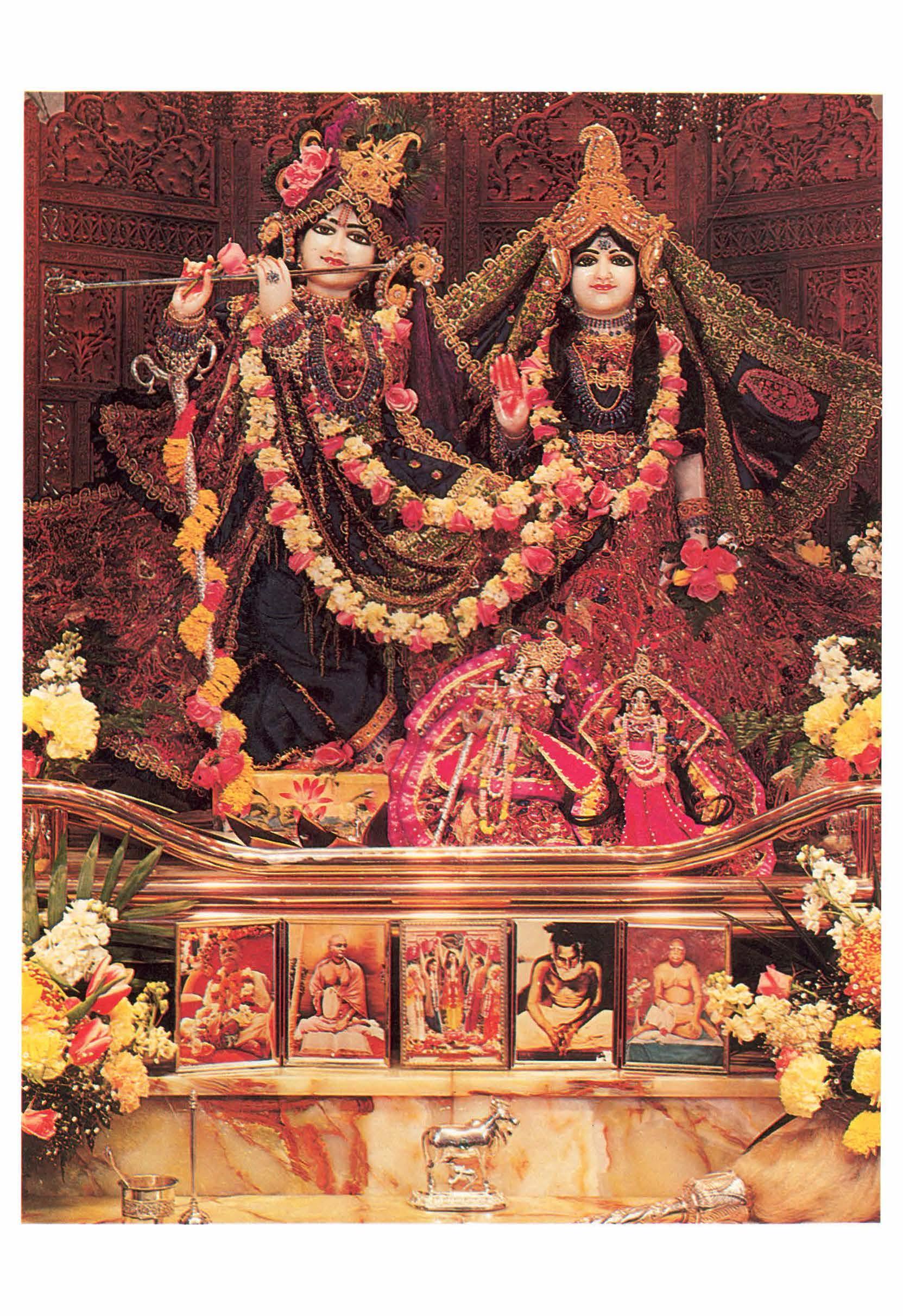
PLATENINE


In the supreme spiritual abode of Goloka Vrndiivana, Lord Kr!?l).a alwaysrevelsinpastimesoflove withHisdearestdevotees,the gopfs. And of all the gopfs, Srimati: Radhiiriil).i is the dearmost, for she is the complete tenderhearted feminine counterpart of the Lord. "My dear auspiciousRadhariil).i," saidK.r!?l).aonceupon Theirmeeting,"Yourbody is the source of all beauty. Your red lips are sweeter than nectar, Your face bears the aroma of a lotusflower, Your words defeat the melodious vibrationsofthecuckoo,and Yourlimbsarecoolerthanthepulpof sandalwood. All My transcendental senses are overwhelmed in ecstatic pleasure by tastin You, who are completely decorated with beautiful qualities."

(p.
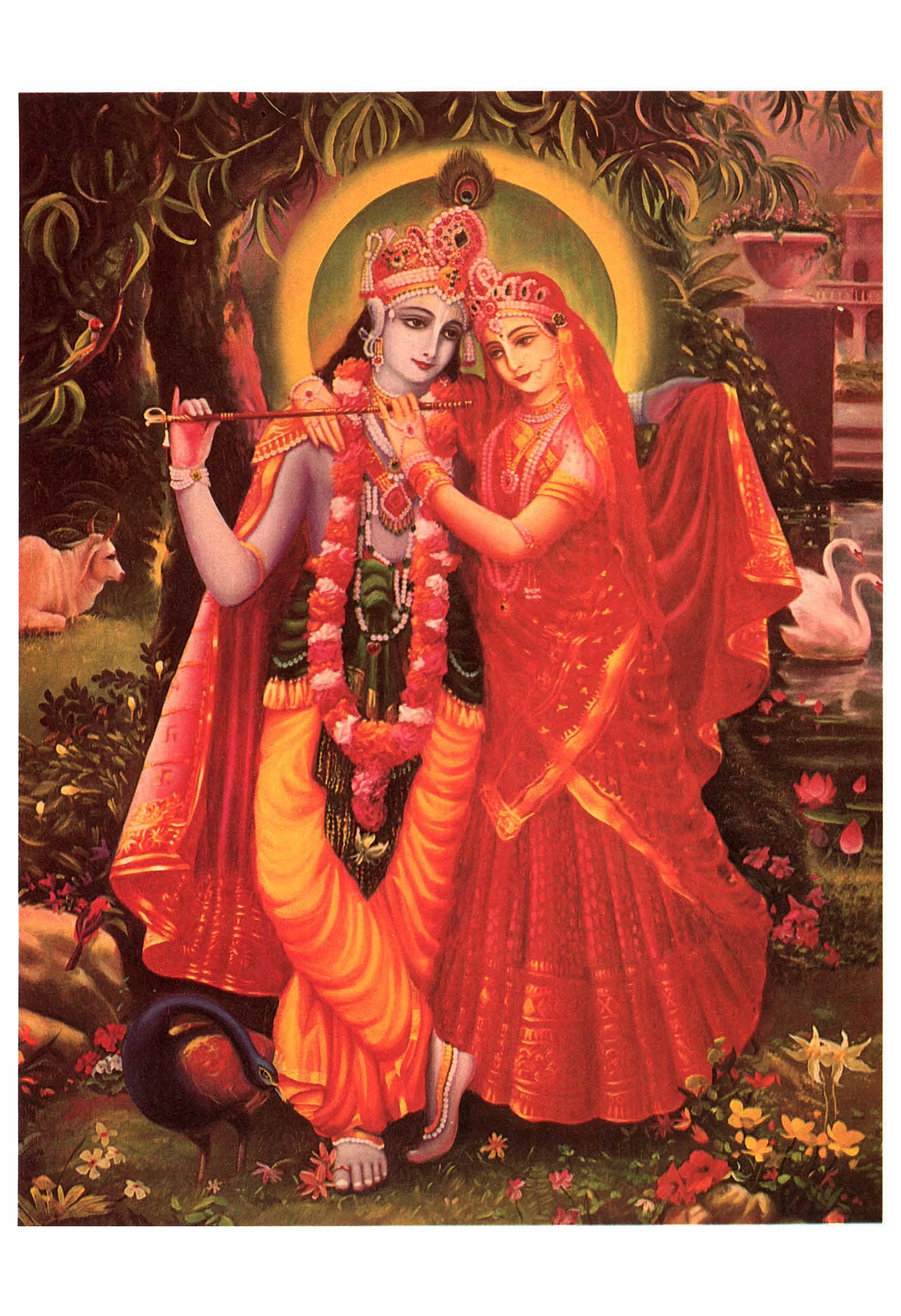
PLATE TEN


Lord Sri Kr�I).a, the original Supreme Personality of Godhead, incarnatesHimselfinvariousformsageafteragetoperformspecificmissions. Here we see His ten most prominent lilii-avataras (pastime incarnations). Beginning in the lower left-hand corner and moving clockwise, wefind (1) LordMatsya,thefishincarnation,whoprotectedVaivasvata Manu bysupportingthe boathewas induringacomplete inundationof the universe; (2) Lord Kurma, the tortoise incarnation, whose shell served as a pivot for Mandara Mountain when it was being used as a churningrodbythetheistsandthe atheists; (3) Lord Varaha, the boar incarnation,wholifted theearthupfromthenetherregionsofthe universeandslewthegreatdemonHiral).yak�a; (4) LordNrsirhhadeva,the half-man half-lion, who bifurcated the strong body of the atheist Hiral).yakasipu with His nails; (5) Lord Vamanadeva, the dwarfbrahmar:w incarnation, who begged three steps of land from Bali Maharaja; (6) Lord Parasurama, who annihilated the administrative class (�atriyas) twenty-one times; (7) Lord Ramacandra, who accepted exileintheforestwithHisbelovedconsort,SHadevi,andthenexhibited superhuman powers by controlling the Indian Ocean and killing the atheist King Raval).a; (8) Lord Sri .Kr�IJ.a Himself (seen here with Lord Balarama, Hisfirstexpansion), whoperformedsuchwonderfulpastimes asholdingGovardhana HillaloftforsevendaystoprotectHisfriendsin Vrndavana from King Indra's inundation; (9) Lord Buddha, who appeared justto deludethose who are envious of thefaithfultheists; and (10) Lord Kalki, whowilla pearat theendof the Kali-yugatoannihilate allthe atheists. (p.

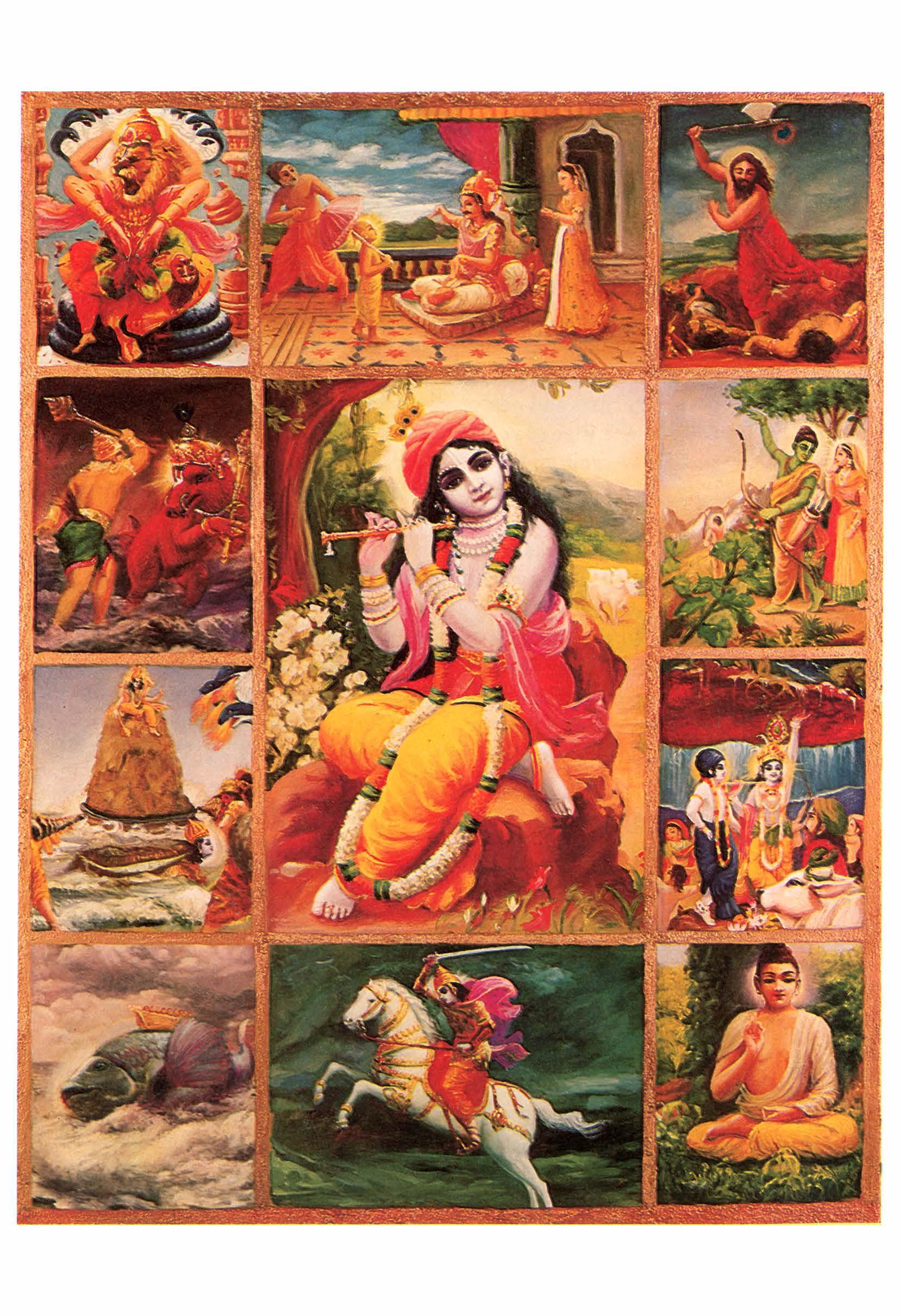
PLATE ELEVEN
Desirous to learn the cause of all causes, Sri Narada Muni approached his father, four-headed Lord Brahmii, and spoke as follows: "My dear father, whatever was created in the past, whatever will be created in the future, and whatever is being created at present, as well as everything within the universe, is within your grip,justlike a walnut. As the spider very easily creates the network of its cobweb without being defeated by others, so also you yourself, by employing your self-sufficient energy, appear to create without any others' help. Yet we are moved to wonder about the existence of someone more powerful than you when we think of your great austerities and perfect discipline, although your good self is so powerful in the matter of creation. My dear father, what is the source of your knowledge, and under whom are you working?" Lord Brahma replied, "My dear Narada, what you have spoken about me is understandable, because unless and until one is aware of the Personality of Godhead, who is the ultimate truth beyond me, one is sure to be illusioned by observing my powerful activities. The truth is that I create only after the Lord's creation by His personal effulgence, the brahmajyoti, just as when the sun manifests its fire, then the moon, the firmament, the planets and the twinkling stars are also manifest. Therefore I offer my obeisances and meditate upon Lord Kr�r:ta, the Personality of Godhead, whose invincible potency influences the less intelligent class of men to call me the supreme controller." (pp. 238-249)

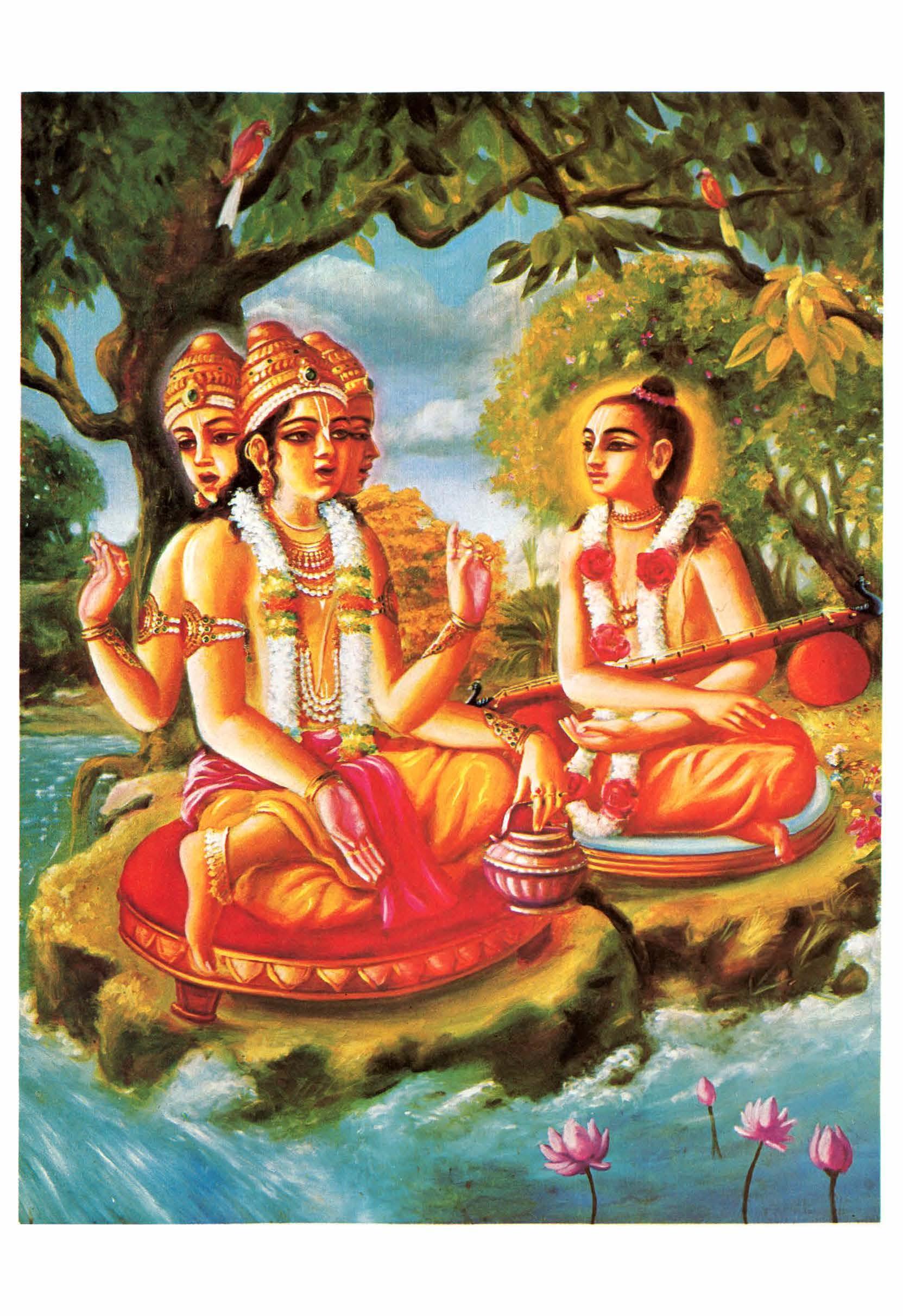
PLATE TWELVE
Five hundred years ago, in Nadiya, India, the Lord incarnated as Sri Caitanya Mahaprabhu to introduce the smikirtana-yajfia, the sacrifice of congregationally chantingthe Hare Kr�l).a mantra. Accompanied by His dear devotees, especially Sri Nityananda Prabhu, Sri Advaita Acarya, Sri Gadadhara PaQ.Qita, and Sri Srivasa PaQ.Qita, Lord Caitanya would nightly perform kirtana at Sri Srivasa's house. There He preached, there He sang, there He danced, and there He expressed the highest spiritual ecstasies-infusing whoever saw and heard Him with kmw-bhakti, devotional service to Lord Sri Kr�l).a. (p. 269)

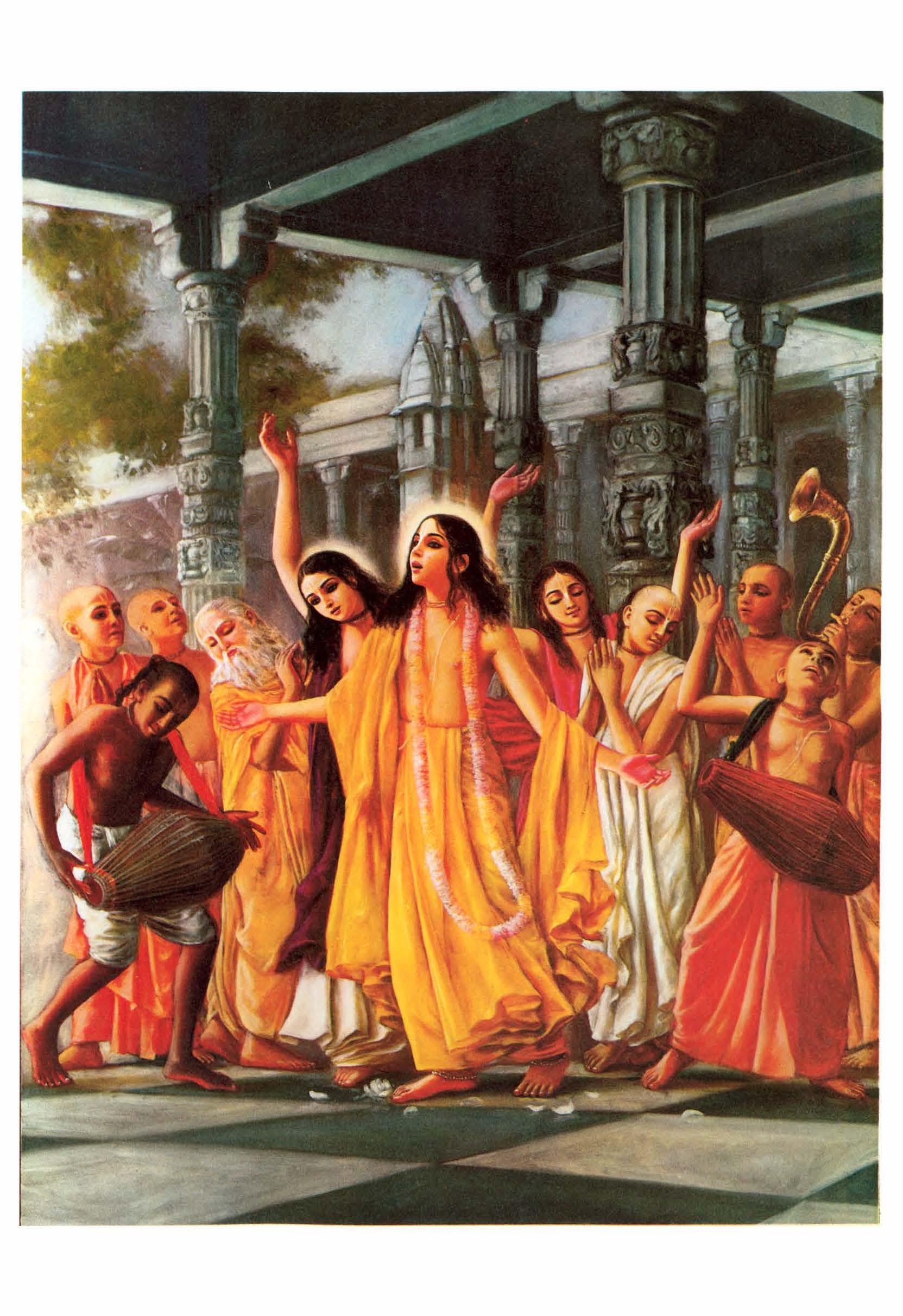
PLATE THIRTEEN
In a corner of the spiritual sky (brahmajyoti) a spiritual cloud sometimes appears, and the covered portion is called the mahat-tattva. Then, by His plenary portion known as Mahii-Vi!?I:J.U, the Lord lies down within the water of the mahat-tattva. This water is called the Causal Ocean. While Mahii-Vi!?I:J.U sleeps within the Causal Ocean, innumerable universes are generated along with His breathing. These floating universes scatter all over the Causal Ocean, remaining manifest only during the breathing period of Mahii-Vi!?I:J.U. In each and every universal globe the same Maha-Vi!?I:J.U enters as Garbhodakasiiyi Vi!?I:J.U and lies down on the serpentlike Se!?a incarnation, and from His navel a lotus sprouts. Upon the lotus is born Brahma, the lord of the universe, who creates the sun, the moon, the demigods and all forms of living beings of different shapes in terms of their different desires. (p. 278)


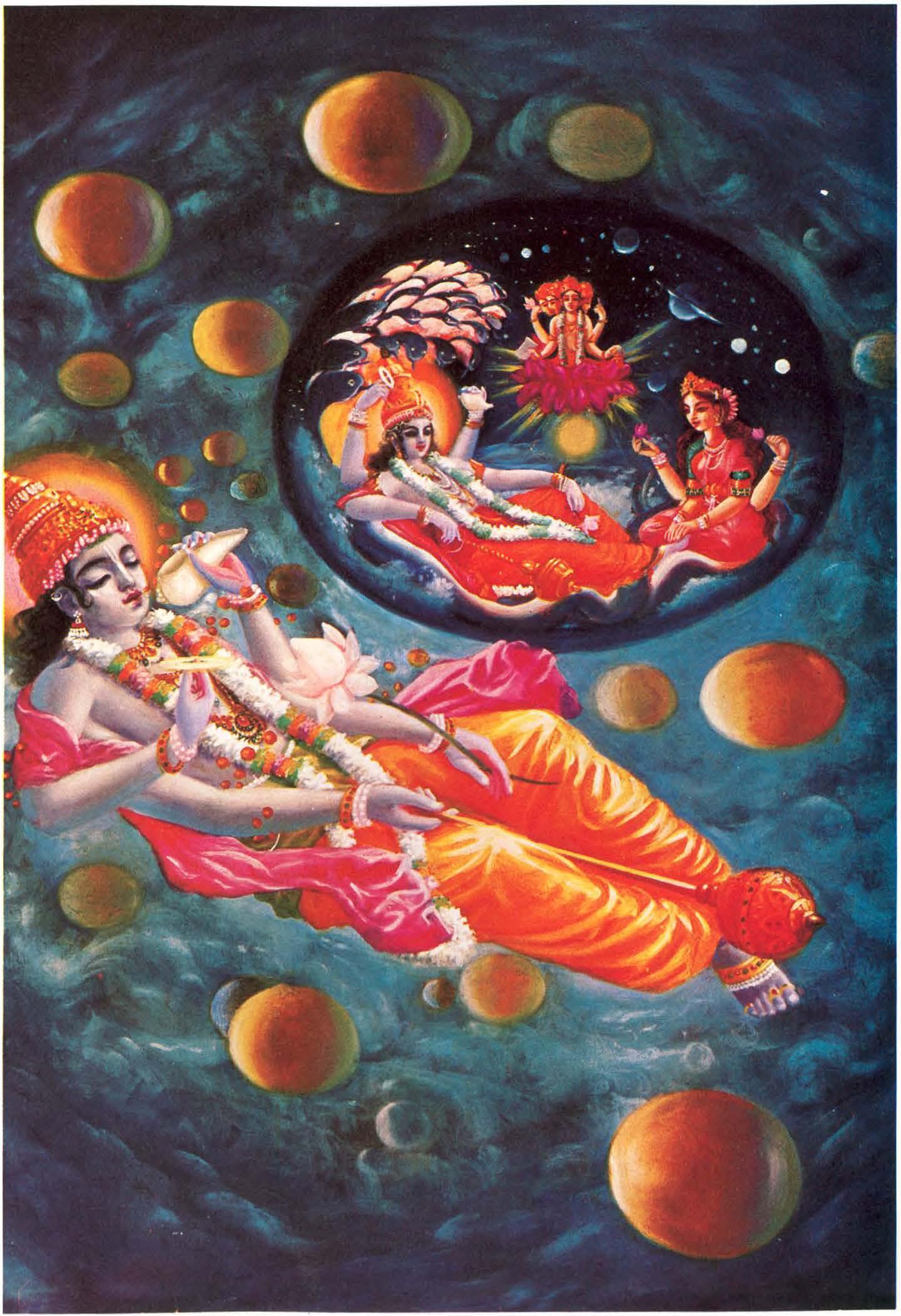
PLATE FOURTEEN
The universal form of the Lord is the complete whole of everything thatbe. Thisform, adornedwithvariouscrowns, clubs,discs, spearsand other weapons, is difficult to look at because of its glaring, fiery effulgence, immeasurable like the sun. Many, many other forms expand without limit from this universal body of the Lord, which spreads throughout the sky and the planets and all space in between. His arms are the resting place for the great demigods and other leaders, such as Lord Brahmii, Siva, Siirya and Candra. Indeed, all varieties of livingentities, including the birds, beasts, trees and everything that be, are all covered by the universal form of the Lord at all times, although He is transcendental to all of them, eternally existing as the Supersoul in a form not exceeding nine inches. (pp. 280-305)

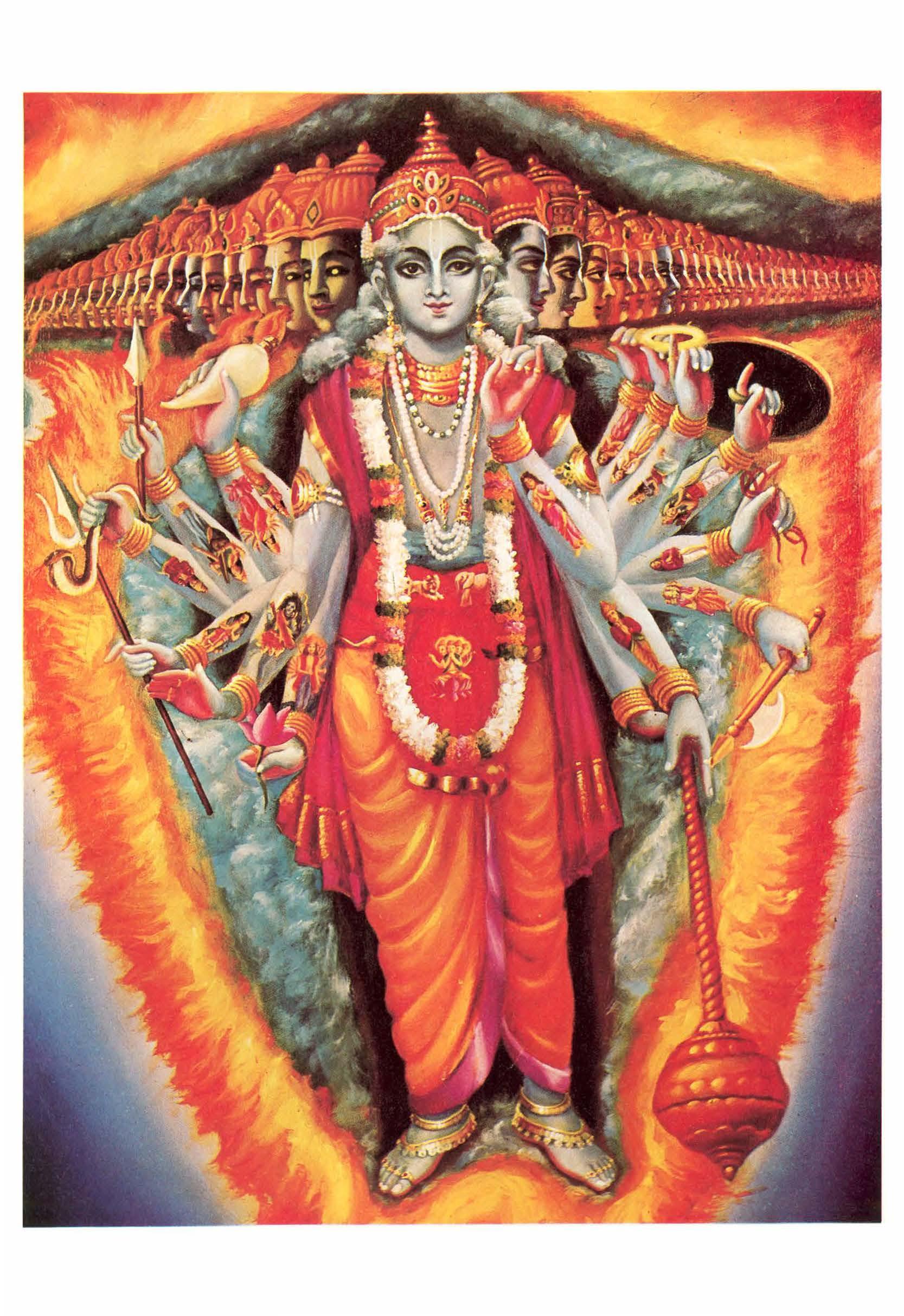
PLATE FIFTEEN
The original spiritual planet, which resembles the whorl of a huge lotus flower, is called Goloka V:rndavana. It is the abode of Lord K:r�J.la, the original Personality of Godhead. This original planet of Goloka throwsoff a spiritualeffulgence called the brahmajyoti, withinwhich are unlimited numbers of spiritual planets or Vaikul).thalokas. The conception of spiritual bliss (brahmarumda) is fully present in those planets. Each of them is eternal, indestructible and free from all kinds of inebrieties experienced in the material world. Each of them is selfilluminating and more powerfully dazzling than (if we can imagine) the total sunshine of millions of mundane suns. The inhabitants of those planets have full knowledge of everything; they are all godly and free from all sorts of material hankerings. They have nothing to do there except to render transcendental loving service to the Supreme Lord Narayal).a, who is the predominating Deity in every Vaikul).tha planet. The Lord and His eternal servitors in the transcendental kingdom all have eternal forms, which are auspicious, infallible, spiritual and eternally youthful. In other words, they do not experience birth, death, old age or disease. Thusthat eternal landis full of transcendental enjoyment, beauty and bliss. (pp. 308-309)


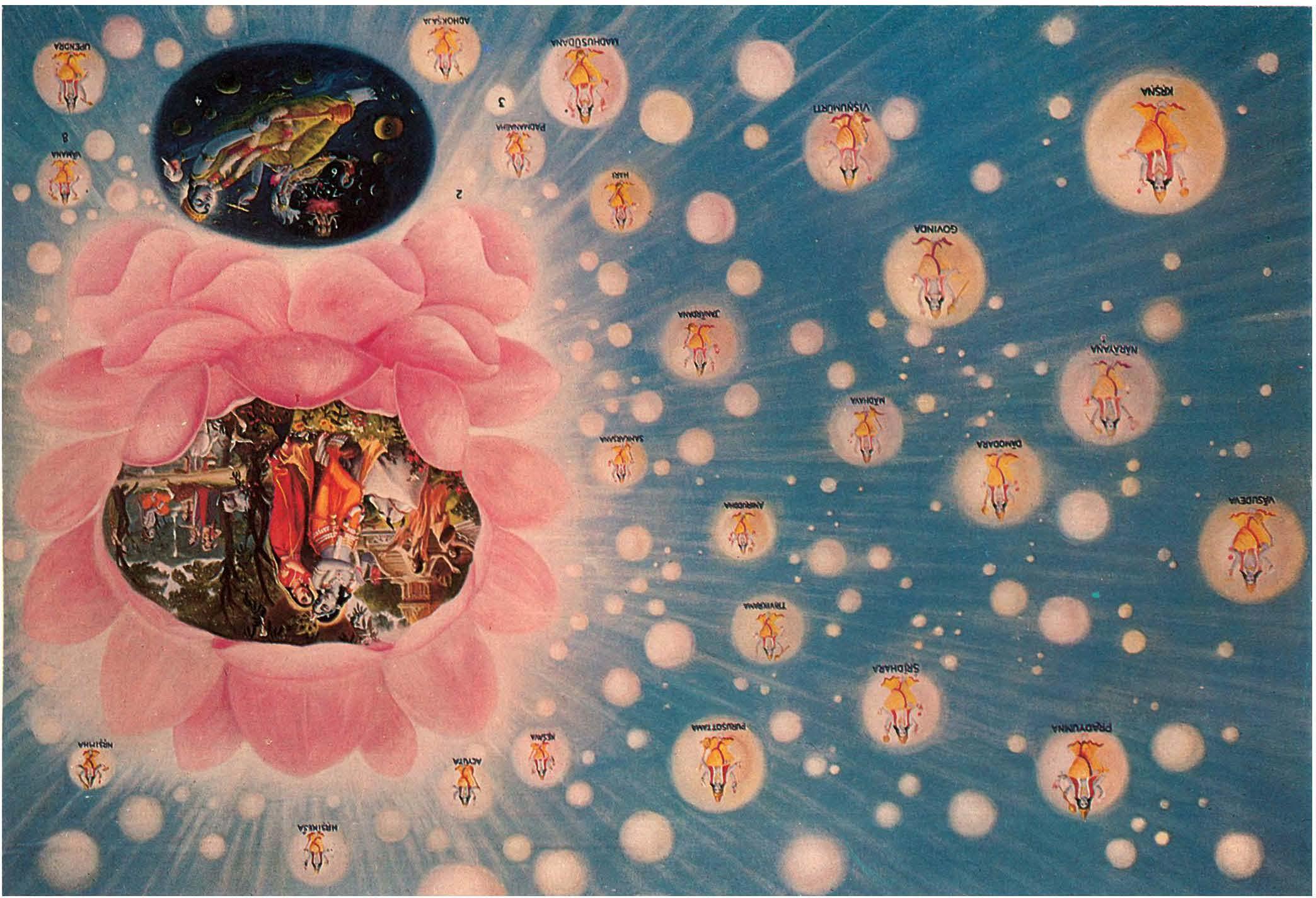
PLATE TWO
Haridiisa Thakura, a great devotee of Lord Sri: Caitanya, used to live in a cave, and by chance a great venomous snake also was a copartner of the cave. Some admirers of Haridasa, who had to visit the Thakura every day, feared the snake and gave a suggestion to the Thakura to leave that place. Because his devotees were afraid of the snake, Haridasa Thakura agreed to the proposal on their account. But as soon as this was settled, the snake actually crawled out of its hole in the cave and left the cave for good. By the dictation of the Lord, who lives also within the heart of a snake, the snake gave preference to Haridiisa and decided to leave the place and not disturb him. (p. 75)

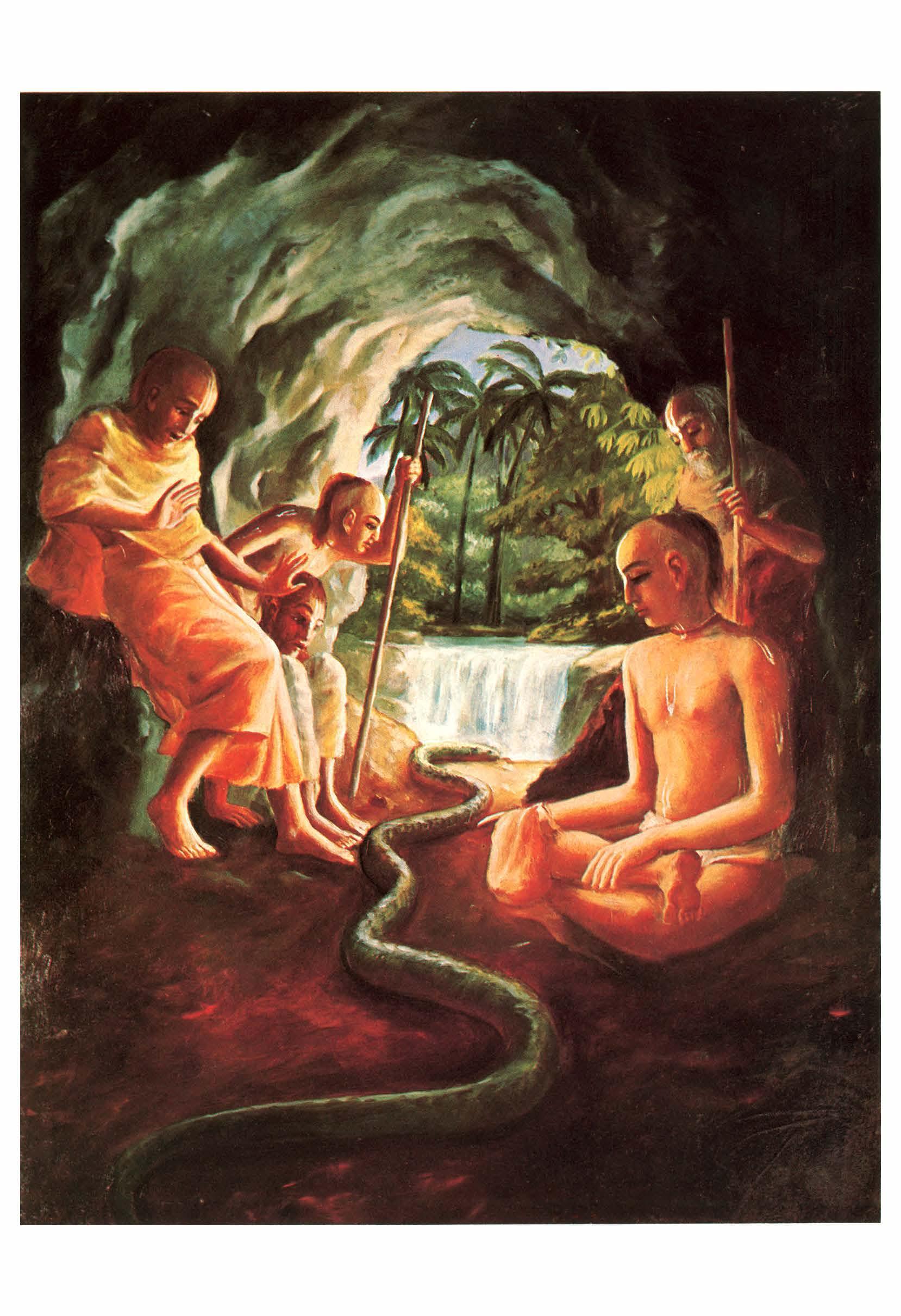
PLATE THREE
A plenary portion of the Supreme Personality of Godhead known as the Supersoul resides within the body in the region of the heart. He measures about eight inches and has four hands, carrying a lotus, a wheel of a chariot, a conchshell and a club respectively. His mouth expresses His happiness, His eyes are spread like lotus petals and His garments, bedecked with valuable jewels, are yellowish like the saffron of a kadamba flower. His ornaments are all made of gold, set with jewels, and He wears a glowing headdress and earrings. On His chest He wears the Kaustubha jewel engraved with a beautiful calf, on His shoulders He wears other jewels, and around His neck He wears a garland of fresh flowers. About His waist He wears an ornamental wreath; on His fingers, rings studded with valuable jewels. His leglet, His bangles, His oiled hair curling with bluish tint and His beautiful smiling face are all very pleasing. The Lord's magnanimous pastimes and the glowing glancing of His smiling face all indicate His extensive benedictions. (pp. 80-85)

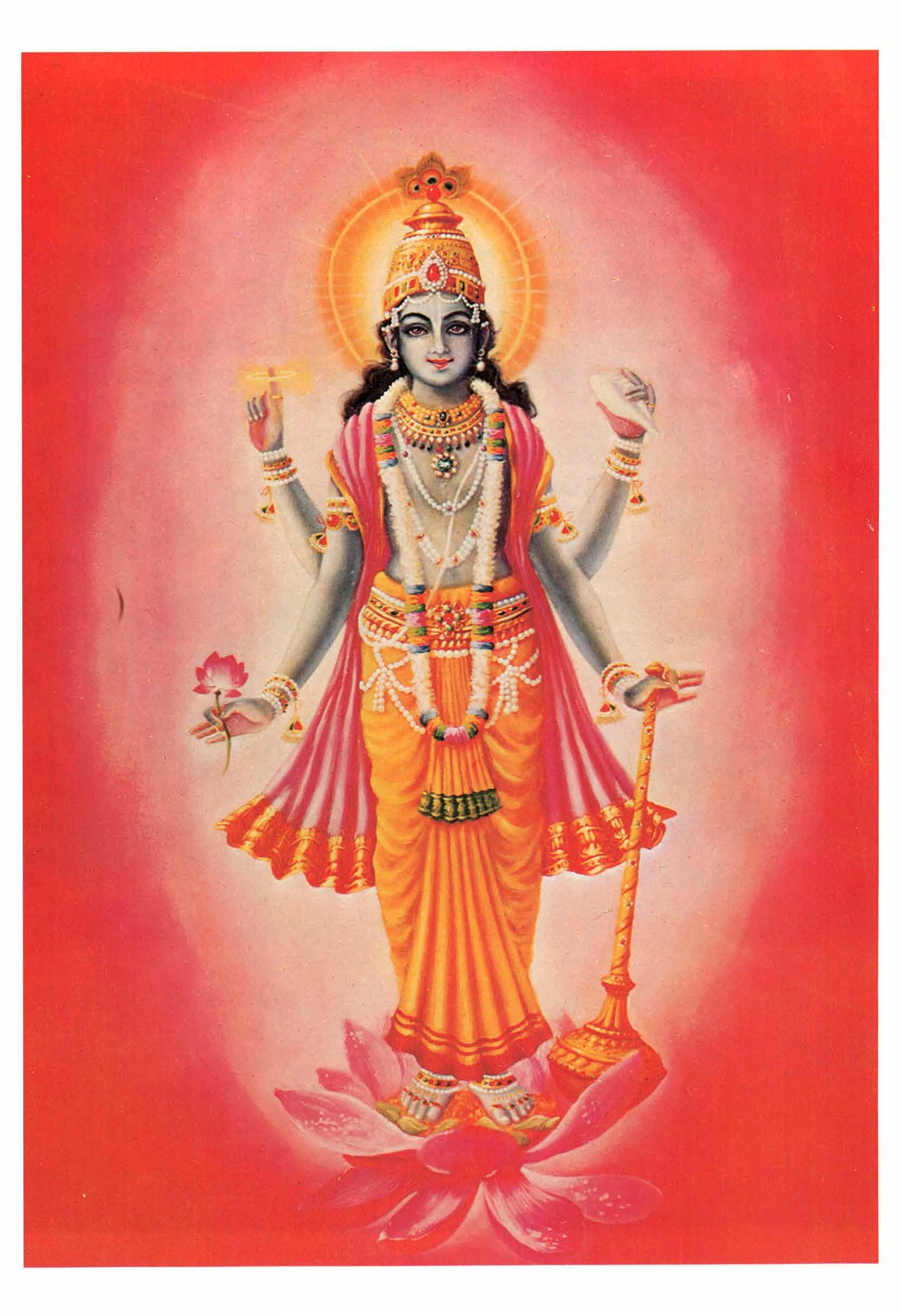
PLATE FOUR
By the strength of scientific knowledge of transcendence, the meditative devotee should be well situated in absolute realization and thus be able to extinguish all material desires. Then he can give up the material body by blocking with his heel the air hole through which stool is evacuated and then lifting the life air progressively through the six primary places. Slowly, searching out the proper places with intelligence, he should push up the life air from the navel to the heart, from there to the chest, and from there to the root of the palate. Thereafter, he should push up the life air to the space between the eyebrows, and then, blocking up the seven outlets of the life air, he should maintain his aim for going back home, back to Godhead. If he is completely free from all desires for material enjoyment, he should then reach the cerebral hole and give up this material connection, having gone to the Supreme. (pp. 99-102)

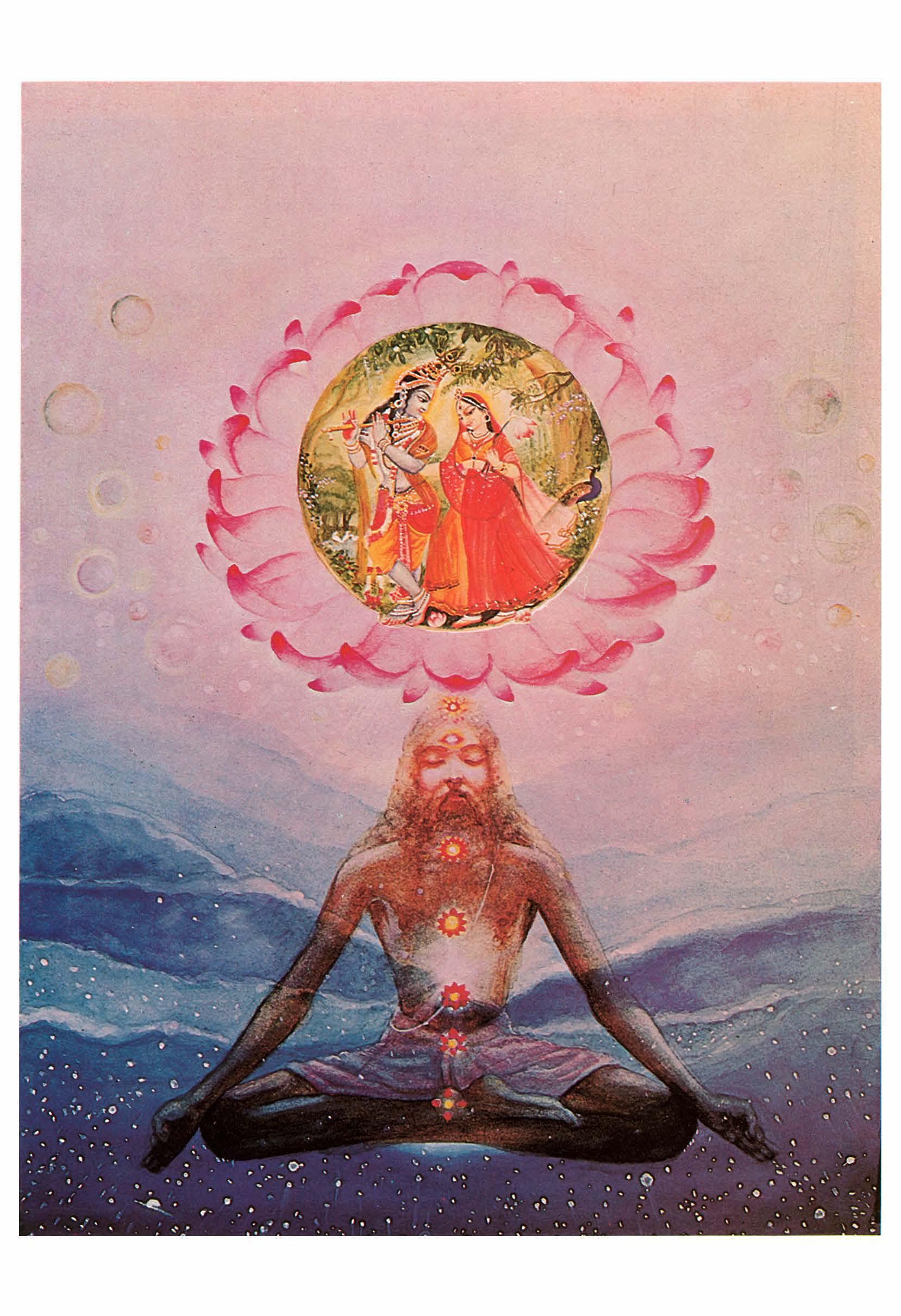
PLATE FIVE
Because he is fixed in unbroken devotional service to the Lord, Narada Muni has received the grace of the almighty Vi�l).u. Thus he is a liberated spaceman, and he can travel anywhere without restriction, both in the transcendental world and in the three divisions of the material world. As he travels, he constantly sings the glories of the Lord and vibrates his vitzd, which is charged with transcendental sound and which was given to him by Lord .i(r�l).a Himself. (p. 1 06)


CHAPTER ONE

The First step in God Realization INVOCATION
� ;.. "\ ....
3.P ;J'fl � ;rm�Ff I
om nama bhagavate viisudeviiya
om-0 my Lord; nama� - my respectful obeisances unto You; bhagavate -untothe Personality of Godhead; vasudeviiya- unto Lord Kr��a, the son of Vasudeva.
TRANSLATION
0 my Lord, the aU-pervading Personality of Godhead, I offer my respectful obeisances unto You.
PURPORT
Viisudevaya means to Kr��a, the son of Vasudeva. As by chanting the name of Kr��a, Vasudeva, one can achieve all the good resultsof charity, austerity and penances, so by the chanting of this mantra, om namo bhagavate viisudevaya, it is to be understood that the author or the speaker, or anyone of the readers of Srimad-Bhiigavatam, is offering respectful obeisances unto the Supreme Lord Kr��a, the reservoir of all pleasure. In the First Canto of Srimad-Bhiigavatam, the principles of creation are described, and as such, the First Canto can be called "Creation."
Similarly, intheSecondCanto, the post-creationcosmicmanifestationis described. The different planetary systems are described in the Second Canto as different partsof the universal body of the Lord. For this reason, the SecondCanto canbe called "The Cosmic Manifestation." There are ten chapters in the Second Canto, and in these ten chapters the purpose of Srimad-Bhiigavatam and the different symptoms of this purpose are narrated. In the First Chapter, the glories of chanting are described, and the process of meditation on the universal form ofthe Lord by the neophyte
I
devotees is hinted. In the first verse, Sukadeva Gosvami replies to the questions of Maharaja Parik�it, who asked him about one's duties at the point of his death. Maharaja Parik�it was glad to receive Sukadeva Gosvami, and he was proud of being a descendant of Arjuna, the intimate friend of Kr�!J.a. Personally, he was very humble and meek, but he expressed his gladness that Lord Krwa was very kind to the sons of Pa!J.�U, or his grandfathers, especially his own grandfather, Arjuna. And because Lord Kr�!la is always pleased with his family, therefore, at the verge of Maharaja Parik�it's death, Sukadeva Gosvami was sent to help him in the process of self-realization. Maharaja Parik�it was a devotee of Lord Kr�!la from his childhood, so he had natural affection for Krsna, and Sukadeva Gosvami could understand his devotion to Lord Kr�!J.a. Therefore, he welcomed the questions about his duty. Because the King hinted that worship of Lord Kr�!la is the ultimate function of every living entity, Sukadeva Gosvami welcomed the suggestion and said, "Because you have raised questions about Kr�!J.a, your question is most glorious." The translation of the first verse is as follows.
TEXT l

sri suka uviica
variyiin e�a te prasna[l, krto loka-hitam nrpa iitmavit-sammata[l, purhsiim srotavyiidi�u ya[l, para[!,
sri suka uviica-Sri Sukadeva Gosvami said: variyiin-glorious;e§a-all these; te-your; prasna[l,-questions; krta[l,-made by you; loka-hitambeneficial for all men; n!Pa-the king; iitmavit-transcendenta l ist; sammata[l,- approved;pumsiim-of all men; srotavyiidi§u-in the matter of all kinds of hearing;ya[l,-what is;para[l,-the supreme.
TRANSLATION
Sri Sukadeva Gosvami said: My dear King, your question is glorious because it is very beneficial to all kinds of people. To hear the answer to this question is the prime subject matter of hearing, and it is approved by all transcendentalists.
2 Srimad-Bhagavatam [Canto 2, Ch. l
�� �Utt� ij Sl.ta:
� I ,....., . . .. ,.... 3lmfl��:'!m �ij""��,;
rif if�ij
�:'R.:II ? II
Even the very question is so nice that it is the best subject matter for hearing. Simply by such questioning and hearing, one can achieve the highest perfectional stage of life. Because Lord Kr�!la is the original Supreme Person, any question about Him is original and perfect. Lord Sri Caitanya Mahaprabhu said that the highest perfection of life is to achieve transcendental loving service of Kr��a. Because questions and answers about Kr��a elevate one to that transcendental position, the questions of Maharaja Parilqit about Kr��a philosophy are greatly glorified. Maharaja Parik�it wanted to absorb his mind completely in Kr��a, and such absorption can beeffected simply by hearing about the uncommon activities of Kr��a. For instance, in the Bhagavad-gita it is stated that simply by understanding the transcendental nature of Lord Kr��a's appearance, disappearance, and activities, one can immediately return back to home, back to Godhead, and never come back to this miserable condition of material existence. It is very auspicious, therefore, to hear always about Kr��a. So Maharaja Parik�it requested Sukadeva Gosviimi to narrate the activities of Kr�!!a so that he could engage his mind in Kr��a. The activities of Kr�!!a are nondifferent from Himself. As long as one is engaged in hearing such transcendental activities of Krwa, he remains aloof from the conditional life of material existence. The topics of Lord Kr�!la are so auspicious that they purify the speaker, the hearer, and theinquirer. They are compared to the Ganges waters, which flow from the toe of Lord Kr�!J.a.Wherever the Ganges watersgo,they purify the land and the person who bathes in them. Similarly, Kmw-kathii or the topics of Kr�!!a are so pure that wherever they are spoken, theplace, the hearer, the inquirer, the speaker and all concernedbecome purified.
TEXT 2

srotavyiidini riijendra
n[!l-iirh santi sahasrasa� apasyatiim iitma-tattvarh grhe�u grha-medhiniim
srotavyiidini-subject matter for hearing; riijendra-0 Emperor; nnuimof the human society; santi-there are; sahasrasa�-hundreds and thou-

Text 2) The FirstStepin God Realization 3
PURPORT
sands; apasyatam-of the blind; atma-tattvam-knowledge of self, the ultimate truth; grhe§u-at home; grha-medhinam-of persons too materially engrossed.
TRANSLATION
Those persons who are materially engrossed, being blind to the knowledge of ultimate truth, have many things as subject matter for hearing in the human society, 0 Emperor.
PURPORT
In the revealed scriptures there are two nomenclatures for the householder's life. One is grhastha, and the other is grhamedhi. The grhasthas are those who live together with wife and children, but live transcendentally for realizing the ultimate truth. The grhamedhis, however, are those who live only for the benefit of the family members, extended or centralized, and thus are envious of others. The word medhi indicates jealousy of others. The grhamedhis, being interested in family affairs only, are certainly envious of others. Therefore, one grhamedhi is not on good terms with another grhamedhi, and in the extended form, one community, society or nation is not on good terms with another counterpart of selfish interest. In the age of Kali, all the householders are jealous of one another because they are blind to the knowledge of ultimate truth. They have many subject matters for hearing, namely political, scientific, social, economic and so on, but due to a poor fund of knowledge, they set aside the question of the ultimate miseries of life, namely miseries of birth, death, old age and disease. Factually, the human life is meant for making an ultimate solution to birth, death, old age and disease, but the grhamedhis, being illusioned by the material nature, forget everything about self-realization. The ultimate solution of the problems of life is to go back to home, back to Godhead, and thus, as stated in the Bhagavadg"ita, the miseries of material existence-birth, death, old age and diseaseare removed. (Bg. 8.16)
The process of going back to home, back to Godhead, is to hear about the Supreme Lord, His name, form, attributes, pastimes, paraphernalia and variegatedness. Foolish people do not know this. They want to hear something about the name, form, etc., of everything temporary, but they do not know how to utilize this propensity of hearing for the ultimate good. Misguided as they are, they also create some false literatures about the

4 Srimad-Bhagavatam [Canto 2, Ch. 1
name, form, attributes, etc., of the ultimate truth. One should not, therefore, become a grhamedhi simply to exist for envying others, but one should become a real householder in terms of the scriptural injunctions.
TEXT 3

nidrayii hriyate naktarh vyaviiyena ca vii vaya� diva ciirthehayii riijan kutumba-bharartena vii
nidrayii-by sleeping; hriyate-wastes; naktam- night; vyaviiyena-sex indulgence; ca-also; vii-either; vaya�-duration of life; diva-days; caand; artha-economic; ihayii-development; rajan-0 King; kutumbafarnilv members; bharartena-maintaining; va-either.
TRANSLATION
The lifetime of such envious householders is passed at night either in sleeping or in sex indulgence, and in the daytime either in making money or maintaining family members.
PURPORT
The present human civilization is primarily based on the principles of sleeping and sex indulgence at night and earning money in the day and spending the same for family maintenance. Such form of human civilization is condemned by the Bhiigavata school.
Because humanlife is a combination of matter and spirit soul, the whole process of Vedic knowledge is directed at liberating the spirit soul from the contamination of matter. The knowledge concerning this is called atma-tattva. Those men who are too materialistic are unaware of this knowledge and are more inclined to economic development for material enjoyment. Such materialistic men are called karmis or fruitive laborers,
Text 3] The First Step in God Realization 5
r� rn ��Fr.����: 1 ft(ql �� mt� ��oT� �T II � II
and they are allowed regulated economic development or association of woman for sex indulgence. Those who are above the karmis, that is, the jniinis, yogis and devotees, are strictly prohibited from sex indulgence. The karmis are more or less devoid of iitma-tattva knowledge, and as such, their life is spent without spiritual profit. The human life is not meant for hard labor for economic development, nor is it meant for sex indulgence like the dogs and hogs. It is specially meant for making a solution to the problems of material life and the miseries thereof. So the karmis waste their valuable human life by sleeping and sex indulgence at night, and by laboring hard in the daytime to accumulate wealth, and after doing so, they tryto improve the standard of materialistic life. The materialistic way of life is described herein in a nutshell, and how foolishly men waste the boon of human life is described as follows.
TEXT 4

dehiipatya-kalatriidi§v iitma-sainye§v asatsv api te§iirh pramatto nidhanarh pasyann api na pasyati
deha-body; apatya-children; kalatra-wife; iidi§u-and in everything in relation to them; iitma-own; sainye§u-fighting soldiers; asatsu-fallible; api-in spite of; te§iim-of all of them; pramatta�-too attached; nidhanam -destruction; pasyan- having been experienced; api-although; na-does not; pasyati-st:<e it.


TRANSLATION
· Persons devoid of atma-tattva do not inquire into the problems of life, being too attached to the fallible soldiers like the body, children, wife, etc. Although sufficiently experienced, still they do not see their inevitable destruction.
6 Srimad-Bhagavatam [Canto 2, Ch. l
���rit'4«�€ffq
��q
I � � f.f�
;r 'l�trfu II� II
This material world is called the world of death. Every living being, beginning from Brahma, whose duration of life is some thousands of millions of years, down to the microbial germs who live for a few seconds only, is struggling for existence. Therefore, this life is a sort of fight with material nature, which imposes death upon all. In the human form of life, a living being is competent enough to come to an understanding of this great struggle for existence, but being too attached to family members, society, country, etc., he wants to win over the invincible material nature by the aid of bodily strength, children, wife, relatives, etc. Although he is sufficiently experienced in the matter by dint of past experience and previous examples of the deceased predecessors, he does not see that the so-called fighting soldiers like the children, relatives, society members and countrymen are all fallible in the great struggle. One should examine the fact that his father or his father's father has already died, and therefore he himself is also sure to die, and similarly, his children, who are the wouldbe fathers of their children, will also die in due course. No one will survive in this struggle with material nature. The history of human society definitely proves it, yet the foolish people still suggest that in the future they will be able to live perpetually, with the help of material science. This poor fund of knowledge exhibited by human society is certainly misleading, and it is all due to ignoring the matter of the constitution of the living soul. This material world exists only as a dream, due to our attachment to it. Otherwise, the living soul is always different from the material nature. The great ocean of material nature is tossing with the waves of time, and the so-called living conditions are something like foaming bubbles, which appear before us as bodily self, wife, children, society, countrymen, etc. Due to a lack of the knowledge of self, we become victimized by the force of ignorance and thus spoil the valuable energy of human life in a vain search after permanent living conditions, which are impossible in this material world.
Our friends, relativf:s and so-called wives and children are not only fallible, but also bewildered by the outward glamor of material existence. As such, they cannot save us. Still we think that we are safe within the orbit of the family, society or country.
The whole materialistic advancement of human civilization is like the decoration of a dead body. Everyone is a dead body flapping only for a few days, and yet all the energy of human life is being wasted in the decoration of this dead body. Sukadeva Gosvami is pointing out the duty

Text 4] The First Step in God Realization 7
PURPORT
of the human being after showing the actual position of bewildered human activities. Persons who are devoid of the knowledge of iitma-tattva are misguided, but those who are devotees of the Lord and have perfect realization of transcendental knowledge are not bewildered.
TEXT 5

ij$i'll(ij �tw �·���;O� m: 1
��: �ijo:t£�m���ll'-\ II
tasmiid bhiirata sarviitmii bhagaviin isvaro hari� srotavya� kirtitavyas ca smartavyas cecchatiibhayam
tasmiit-for this reason; bhiirata-0 descendant of Bharata; sarviitmiithe Supersoul; bhagaviin-the Personality of Godhead; iSvara�-the controller; hari�-the Lord who vanquishes all miseries; srotavya�-is to be heard; kirtitavya�-to be glorified; ca- also; smartavya�-to be remembered; ca- and; icchatii-of one who desires; abhayam-freedom.
TRANSLATION
0 descendant of King Bharata, one who desires to be free from all miseries must hear, glorify and also remember the Personality of Godhead, who is the Supersoul, the controller and the savior from all miseries.
PURPORT
In the previous verse, Sri Sukadeva Gosvami has described how the foolish materially-attached men are wasting their valuable time in the improvement of the material conditions of life by sleeping, indulging in sex life, developing economic conditions and maintaining a band of relatives who are to be vanquished in the air of oblivion. Being engaged in all these materialistic activities, the living soul entangles himself in the cycle of the law of fruitive actions. This entails the chain of birth and death in the 8,400,000 species of life: the aquatics, the vegetables, the reptiles, the birds, the beasts, the uncivilized man, and then again the human form,
8 Srimad-Bhagavatam [Canto 2, Ch. l
which is the chance of getting out of the cycle of fruitive action. Therefore, if one desires freedom from this vicious circle, then one must cease to act as a karmi or enjoyer of the results of one's own work, good or bad. One should not do anything, either good or bad, on his own account, but must execute everything on behalf of the Supreme Lord, the ultimate proprietor of everything that be. This process of doing work is recommended in the Bhagavad-gitii also (Bg. 9.27), where instruction is given for working on the Lord's account. Therefore, one should first of all hear about the Lord. When one has perfectly and scrutinizingly heard, one must glorify His acts and deeds, and thus it will become possible to remember constantly the transcendental nature of the Lord. Hearing and glorifying the Lord are identical with the transcendental nature of the Lord, and by so doing, one will be always in the association of the Lord. This brings freedom from all sorts of fearfulness. The Lord is the Supersoul (Paramiitmii) present in the hearts of all living beings, and thus by the above hearing and glorifying process, the Lord invites the association of all in His creation. This process of hearing and glorifying the Lord is applicable for everyone, whoever he may be, and it will lead one to the ultimate success in everything in which one may be engaged by providence. There are many classes of human beings: the fruitive workers, the empiric philosophers, the mystic yogis, and ultimately, the unalloyed devotees. For all of them, one and the same process is applicable for achieving the desired success. Everyone wants to be free from all kinds of fearfulness, and everyone wants the fullest extent of happiness in life. The perfect process for achieving this, here and now, is recommended in the Srimad-Bhiigavatam, which is uttered by a great authority like Snl.a Sukadeva Gosvam1. By hearing and glorifying the Lord, all a person's activities become molded into spiritual activities, and thus all conception of material miseries becomes completely vanquished.
iif.-qz•wT: 'if! �� ;mrt�: II � II
etiiviin siinkhya-yogiibhyiirh sva-dharma-parini§thayii janma-liibha� para� purhsiim ante niiriiyar-a-smrti�

Text 6] TheFirstStepinGodRealization 9
���t ��qfu�
TEXT 6 �Fl
1
etavan-all these; sankhya-complete knowledge of matter and spirit; yogabhyam-knowledge of mystic power; sva-dharma-particular occupational duty; parini§fhaya-by full perception; janma-birth; liibha[l.-gain; para[t-the supreme; purhsam-of a person; ante-at the end; narayarwPersonality of Godhead; smrtift-remembrance.
TRANSLATION
The highest perfection of human life, achieved either by complete knowledge of matter and spirit, by practice of mystic powers, or by perfect discharge of occupational duty, is to remember the Personality of Godhead at the end of life.
PURPORT
NarayatJ.a is the transcendental Personality of Godhead beyond the material creation. Everything that is created, sustained, and at the end, annihilated, is within the compass of mahat-tattva (material principle) and is known as the material world. The existence of NarayatJ.a, or the Personality of Godhead, is not within the jurisdiction of this mahat-tattva, and as such, the name, form, attributes, etc., of NarayatJ.a are beyond the jurisdiction of the material world. By speculation of empiric philosophy, which discerns matter from spirit, or by cultivation of mystic powers, which ultimately helps the performer to reach any planet of the universe or beyond the universe, or by discharge of religious duties, one can achieve the highest perfection, provided one is able to reach the stage of Narayarwsmrti, or constant remembrance of the Personality of Godhead. This is only possible by the association of a pure devotee, who can give a finishing touch to the transcendental activities of all jnanis, yogis, or karmis, in terms of the prescribed duties defined in the scriptures. There are many historical instances of the achievement of spiritual perfection, such as that of the Sanakadi J,l�is or the nine celebrated Yogendras, who attained perfection only after being situated in the devotional service of the Lord. None of the devotees of the Lord ever deviated from the path of devotional service by taking to other methods as adopted by the jiianis or yogis. Everyone is anxious to achieve the highest perfection of his particular activity, and it is indicated herein that such perfection is Narayar-asmrti, for which everyone must endeavor his best. In other words, life should be molded in such a manner that one is able to progressively remember the Personality of Godhead in every step of life.

10 Srimad-Bhagavatam [Canto 2, Ch. l
TEXT 7 � � mfr;{� ��: I �m{�l nt� � gun�m �: II \9 II
prayer-a munayo riijan nivrttii vidhi-§edhata[l nairgur-ya-sthii ramante sma gur-iinukathane hare[l
priiyena-mainly; munaya[l-all sages; riijan-0 King; nivrttii[l- above the; vidhi- regulative principles; §edhata[l- from restrictions; nairgur-yasthii[l,-transcendentally situated; ramante-take pleasure in; sma-distinctly; gur-iinukathane -describing the glories; hare[l-of the Lord.

TRANSLATION
0 King Parik�it, mainly the topmost transcendentalists, who are above the regulative principles and restrictions, take pleasure in describing the glories of the Lord.
PURPORT
The topmost transcendentalist is a liberated soul and, therefore, is not within the purview of the regulative principles. A neophyte, who is intended to be promoted to the spiritual plane, is guided by the spiritual master under regulative principles. He may be compared to a patient who is treated by various restrictions under medical jurisdiction. Generally, such liberated souls also take pleasure in describing the transcendental activities. As mentioned above, since Naraya�a, Hari, the Personality of Godhead, is beyond the material creation, His form and attributes are not material. The topmost transcendentalists or the liberated souls realize Him by advanced experience of transcendental knowledge, and therefore they take pleasure in the discussion of the transcendental qualities of the Lord's pastimes. In the Bhagavad-gitii, the Personality of Godhead declares that His appearance and activities are all divyam, or transcendental. (Bg. 4.9) The common man, who is under the spell of material energy, takes it for granted that the Lord is like one of us, and therefore he refuses to accept the transcendental nature of the Lord's form, name, etc. The topmost transcendentalist is not interested in anything material, and his taking
Text 7) The First
in God Realization
Step
ll
interest inthe matter of the Lord's activities isdefinite proof that the Lord is not like one of us in the material world. In the Vedic literatures also, it is confirmed that the Supreme Lord is one, but that He is engaged in His transcendental pastimes in the company of His unalloyed devotees and that simultaneously He is present as the Supersoul, an expansion of Baladeva, in the heart of all living entities. Therefore, the highest perfection of transcendental realization is to take pleasure in hearing and describing the transcendental qualities of the Lord and not in merging into His impersonal Brahman existence, as the impersonalist monist aspires. Real transcendental pleasure is realized in the glorification of the transcendental Lord, and not in the feeling of being situated in His impersonal feature. But there are also others who are not the topmost transcendentalists, but are in the lower status, and who do not take pleasure in describing the transcendental activities of the Lord. Rather, they discuss such activities of the Lord formally with the aim of merging into His existence.
TEXT 8 �

idam bhiigavatam niima
puriirwm brahma-sammitam adhitaviin dviipariidau
pitur dvaipiiyaniid aham
idam-this; bhiigavatam-Srimad-Bhiigavatam; niima-of the name; puriir-am-Vedic supplimentary; brahma-sammitam-approved as the essence of the Vedas; adhitaviin-studied; dviipariidau-at the end of the Dvapara-yuga;pitu[t-from my father; dvaipiiyaniit-Dvaipayana Vyasadeva aham-myself.
TRANSLATION
At the end of the Dvapara-yuga, I studied this great supplement of Vedic literature of the name Srimad-Bhagavatam, which is equal to all the Vedas, from my father, Srila Dvaipayana Vyasadeva.
12 Srimad-Bhagavatam [Canto 2, Ch. l
�
��tuf ��
�q���M\ti'(
9l1lf
I 31�, �N(Ii(t
II� II
The statement made by Srila Sukadeva Gosvami that the topmost transcendentalist, who is beyond the jurisdiction of regulations and restrictions, mainly takes to the task of hearing about and glorifying the Personality of Godhead, is verified by his personal example. Sukadeva Gosvami, being a recognized liberated soul and the topmost transcendentalist, was accepted by all of the topmost sages present in the meeting during the last seven days of Maharaja Parik�iL He cites from the example of his life that he himself was attracted by the transcendental activities of the Lord, and he studied Srimad-Bhiigavatam from his great father, Sri Dvaipayana Vyasadeva. Srimad-Bhiigavatam, or, for that matter, any other scientific literature, cannot be studied at home by one's own intellectual capacity. Medical books of anatomy or physiology are available in the market, but no one can become a qualified medical practicioner simply by reading such books at home. One has to be admitted to the medical college and study the books under the guidance of learned professors. Similarly, Srimad-Bhiigavatam, the postgraduate study of the science of Godhead, can only be learned by studying it at the feet of a realized soul like Srila Vyasadeva. Although Sukadeva Gosvami was a liberated soul from the very day of his birth, he still had to take lessons of SrimadBhiigavatam from his great father, Vyasadeva, who compiled the SrimadBhiigavatam under the instruction of another great soul, Sri Narada Muni. Lord Sri Caitanya Mahaprabhu instructed a learned briihmap.a to study Srimad-Bhiigavatam from a personal bhiigavatam. Srimad-Bhiigavatam is based on the transcendental name, form, attributes, pastimes, entourage and variegatedness of the Supreme Person, and it is spoken by the incarnation of the Personality of Godhead, Srila Vyasadeva. Pastimes of the Lord are executed in cooperation with His pure devotees, and consequently historical incidences are mentioned in this great literature because they are related to Kr�':la· It is called brahma-sammitam because it is the sound representative of Lord Kr�':la-like the Bhagavad-gitii. Bhagavad-gitii is the soundincarnation of the Lord because it is spoken by the Supreme Lord, and Srimad-Bhiigavatam is the sound representative of the Lord because it was spoken by the incarnation of the Lord about the activities of the Lord. As stated in the beginning of this book, it is the essence of the Vedic desire-tree and the natural commentation on the Brahma-sutras, the topmost philosophical thesis on the subject matter of Brahman. Vyasadeva appeared at the end of Dvapara-yuga as the son of Satyavati, and therefore the word Dviipara-iidau, or "beginning of

Text 8] The First Step in God Realization 13
PURPORT
Dvapara-yuga," in this context means just prior to the beginning of the Kaii-yuga. The logic of this statement is, according to Srila )Iva Gosviimi, comparable to calling the upper portion of the tree the beginning. The root of the tree is the beginning of the tree, but in common knowledge, the upper portion of the tree is first seen. In that way the end of the tree is accepted as its beginning.
TEXT 9

parini�fhito 'pi nairgu[!ya uttama-sloka-lilayii grhita-cetii riijar�e iikhyiinam yad adhitaviin
parini�fhita�-fully realized; api-in spite of; nair-gurye-in transcendence; uttama-enlightened; sloka-verse; lilayii-by the pastimes; grhitabeing attracted; cetiift-attention ; riijar§e-0 saintly King; iikhyiinam-delineation; yat- that; adhitaviin-I have studied.
TRANSLATION
0 saintly King, I was certainly situated perfectly in transcendence, yet I was still attracted by the delineation of the pastimes of the Lord, who is described by enlightened verses.
PURPORT
The Absolute Truth is realized as the impersonal Brahman at the first instance by philosophical speculation and later on as the Supersoul by further progress of transcendental knowledge. But, if, by the grace of the Lord,an impersonalistis enlightened by the superiorstatements of SrimadBhiigavatam, he is also converted into a transcendental devotee of the Personality of Godhead. With a poor fund of knowledge, we cannot adjust to the idea of the personality of the Absolute Truth, and the
14 Srimad-Bhagavatam [Canto 2, Ch. l
qfMwf1sM' ��tnf 3'mli1Wd�l I 4JOi1�*lffl �q 31� tf� I I Q) I I
personal activities of the Lord are deplored by the less intelligent impersonalists; but reasons and arguments together with the transcendental process of approaching the Absolute Truth help even the staunch impersonalist to become attracted by the personal activities of the Lord. A person like Sukadeva Gosvami cannot be attracted by any mundane activities, but when such a devotee is convinced by superior method, he is certainly attracted by the transcendental activities of the Lord. The Lord istranscendental, as are His activities. He is neitherinactive nor impersonal.
TEXT 10

� itsf�Tfil �iwi"t�fqit � 1
���PH� �: �II� oil
tad aharh te'bhidhiisyiimi mahiipaum§iko bhaviin yasya sraddadhatiim iisu syiin mukunde mat* sati
tat-that; aham-1; te-unto you; abhidhiisyiimi-shall recite; mahiipaum§ikaft-the most sincere devotee of Lord Kr�!J.a; bhaviin-your good self; yasya-of which; sraddadhatiim-of one who gives full respect and attention; asu-very soon; syiit-it so becomes; mukunde-unto the Lord who awards salvation; mat* -faith; sati-u nflinching .


TRANSLATION
That very Srimad-Bhagavatam I shall recite before youbecause you are the most sincere devotee of Lord Kr�!la. One who gives full attention and respect to hearing Srimad-Bhagavatam achieves unflinching faith in the Supreme Lord, the giver of salvation.
PURPORT
Srimad-Bhiigavatam is recognized Vedic wisdom, and the system of receiving Vedic knowledge is called avaroha-panthii, or the process of receiving transcendental knowledge through bona fide disciplic succession.
Text 10) The First Step in God Realization 15
For advancement of material knowledge there is the need for personal capacity and researching aptitude, but in the case of spiritual knowledge, all progress depends more or less on the mercy of the spiritual master. The spiritual master must be satisfied with the disciple; only then is knowledge automatically manifest before the student of spiritual science. It should not, however, be misunderstood to be something like magical feats whereby the spiritual master acts like a magician and injects spiritual knowledge into his disciple, as if surcharging him with an electrical current. The bona fide spiritual master reasonably explains everything to the disciple on the authorities of Vedic wisdom. The disciple can receive such teachings not exactly intellectually, but by submissive inquiries and a service attitude. The idea is that both the spiritual master and the disciple must be bona fide. In this case, the spiritual master, Sukadeva Gosvami, is ready to recite exactly what he has learned from his great father Srila Vyasadeva, and the disciple, Maharaja Parik�it, is a great devotee of Lord Kr�':la. A devotee of Lord Kr�':la is he who believes sincerely that by becoming a devotee of the Lord one becomes fully equipped with everything spiritual. This teaching is imparted by the Lord Himself in the pages of the Bhagavad-gitii, in which it is clearly described that the Lord (Sri Kr�':la) is everything, and to surrender unto Him solely and wholly makes one the most perfectly pious man. This unflinching faith in Lord Kr��a prepares one to become a student of Srimad-Bhiigavatam, and one who hears Srimad-Bhiigavatam from a devotee like Sukadeva Gosvami is sure to attain salvation at the end, as Maharaja Parik�it did. The professional reciter of Srimad-Bhiigavatam and the pseudo-devotees whose faith is based on one week's hearing are different from the duo of Sukadeva Gosvami and Maharaja Parik�it. Srila Vyasadeva explained SrimadBhiigavatam unto Sukadeva Gosvami from the very beginning of the ''janmiidyasya" verse, and so Sukadeva Gosvami also explained it to the King. Lord Kr��a is described as the Mahiipuru�a in the SrimadBhiigavatam (Canto ll) in His devotional feature as Lord Sri Caitanya Mahaprabhu. Sri Caitanya Mahaprabhu is Lord KH�a Himself in His devotional attitude, descended on earth to bestow special favors upon the fallen souls of this age of Kali. There are two verses particularly suitable to offer as prayers to this Mahiipuru�a feature of Lord Kr��a.
dhyeyarh sadii paribhava-ghnam abhi�fa-doharh
tirthiispadarh siva-virinci-nutarh sararyam

16 Srimad-Bhagavatam [Canto 2, Ch. l
bhrtyiirti-ham prarwta-piila bhaviibdhi-potam
vande mahiipuru§a te carariiravindam.
(Bhag. 11.5.33)

tyaktvii su-dus-tyaja-surepsita-riijya-lak§mim dharmi§tha iirya-vacasii yad agiid-araryam miiyii-mrgam dayitayepsitam anvadhiivad vande mahiipuru§a te carariiravindam.
(Bhag. 11.5.34)
In other words, puru§a means the enjoyer, and mahiipuru§a means the supreme enjoyer, or the Supreme Personality of Godhead Sri Kr�t�a. One who deserves to approach the Supreme Lord Sri Kr�t�a is called the mahiipauru§ika. Anyone who hears Srimad-Bhiigavatam attentively from its bona fide reciter is sure to become a sincere devotee of the Lord, who is able to award liberation. There was none so attentive as Maharaja Parik�it in the matter of hearing Srimad-Bhiigavatam, and there was none so qualified as Sukadeva Gosvami to recite the text of Srimad-Bhiigavatam. Therefore, anyone who follows the footsteps of either the ideal reciter or the ideal hearer, Sukadeva Gosvami and Maharaja Parik�it respectively, will undoubtedly attain salvation like them. Maharaja Parik�it attained salvation by hearing only, and Sukadeva Gosvami attained salvation by reciting only. Recitation and hearing are two processes out of nine devotional activities, and by strenuously following the principles, either in all or by parts, one can attain the absolute plane. So the complete text of Srimad-Bhiigavatam, beginning with the ''janmiidyasya" verse up to the last one in the twelfth canto, was spoken by Sukadeva Gosvami for the attainment of salvation by Maharaja Parik�it. In the Padma Puriira, it is mentioned that Gautama Muni advised Maharaja Ambari�a to hear regularly Srimad-Bhiigavatam as it was recited by Sukadeva Gosvami, and herein it is confirmed that Maharaja Ambari�a heard Srimad-Bhiigavatam from the very beginning to the end, as it was spoken by Sukadeva Gosvami One who is, therefore, actually interested in the Bhiigavatam must not play with it by reading or hearing a portion from here and a portion from there, but one must follow the footsteps of great kings like Maharaja Ambari�a or Maharaja Parilqit and hear it from a bona fide representative of Sukadeva Gosvami
Text 10] The First Step in God Realization
17
TEXT ll
�(ft�f.�Q'tl'11'11fit�061'tt11¥{� I �;rt 'ft f;rufhj �l'tt�til�,II� �II
etan nirvidyamiiniiniim icchatiim akuto-bhayam
yoginiirh nrpa nin;titarh harer-niimiinukirtanam
etat-it is; nirvidyamiiniiniim-of those who are completely free from all material desires; icchatiim-of those who are desirous of all sorts of material enjoyment;akuto-bhayam-free fromall doubts and fear;yoginiim -of all who are self-satisfied; nrpa-0 King; nirr.itam-decided truth; hare�-of the Lord, Sri Km1a; nama-holy name; anu-after someone, always;kirtanam-chanting.
TRANSLATION
0 King, constant chanting of the holy name of the Lord after the ways of the great authorities is the doubtless and fearless way of success for all, including those who are free from all material desires, and also those who are desirous of all material enjoyment, as well as those who are selfsatisfied by dint of transcendental knowledge.
PURPORT
In the previous verse, the great necessity for attaining attachment to Mukunda has been accredited. There are different types of persons who desire to attain success in different varieties of pursuits. Generally the persons are materialists who desire to enjoy the fullest extent of material gratification- Next to them are the transcendentalists, who have attained perfect knowledge about the nature of material enjoyment and thus are aloof from such an illusory way of life. More or less, they are satisfied in themselves by self-realization_ Above them are the devotees of the Lord, who neither aspire to enjoy the material world nor desire to get out of it. They are after the satisfaction of the Lord Sri Kr��a- In other words, the devotees of the Lord do not want anything on their personal account. If

18 Srimad-Bhagavatam [Canto 2, Ch. l
the Lorddesires, the devotees can accept all sorts of material facilities, and if the Lord does not desire, the devotees can leave aside all sorts of facilities, even up to the limit of salvation. Nor are they self-satisfied, because they want the satisfaction of the Lord only. In this verse, Sri Sukadeva Gosvami recommends the transcendental chanting of the holy name of the Lord. By offenseless chanting and hearing of the holy name of the Lord, one becomes acquainted with the transcendental form of the Lord, and then with the attributes of the Lord, and then with the transcendental nature of His pastimes, etc. Here it is mentioned that one should constantly chant the holy name of the Lord after hearing it from authorities. This means hearing from the authorities is the first essential. Hearing of the holy name gradually promotes one to the stage of hearing about His form and so on about His attributes, His pastimes, etc., and thus the necessity of the chanting of His glories develops successively. This process is recommended not only for the successful execution of devotional service, but also even for those who are materially attached. According to Sri Sukadeva Gosvami, this way of attaining success is an established fact, concluded not only by him, but also by all other previous iiciiryas. Therefore, there is no need of further evidence. The process is recommended not only for the progressive students in different departments of ideological success, but also for those who are already successful in their achievement as fruitive workers, as philosophers or as devotees of the Lord.
Srila Jiva Gosvami instructs that chanting of the holy name of the Lord should be loudly done, and it should be performed offenselessly as well, as is recommended in the Padma Puriip,a. One can deliver himself from the effects of all sins by surrendering himself unto the Lord. One can deliver himself from all offenses at the feet of the Lord by taking shelter of His holy name. But one cannot protect himself if one commits an offense at the feet of the holy name of the Lord. Such offenses are mentioned in the Padma Puriirw as being ten in number. The first offense is to vilify the great devotees who have preached about the glories of the Lord. The second offense is to see the holy names of the Lord in terms of worldly distinction. The Lord is the proprietor of all the universes, and therefore He may be known in different places by different names, but that does not in any way qualify the fullness of the Lord. Any nomenclature which is meant for the Supreme Lord is as holy as the others because they are all meant for the Lord. Such holy names are as powerful as the Lord, and there is no bar for anyone in any part of the creation to chant and glorify the Lord by the particular name of the Lord as it is locally understood.

Text ll] The First Step in God Realization 19
They are all auspicious, and one should not distinguish such names of the Lord as material commodities. The third offense is to neglect the orders of the authorized iiciiryas or the spiritual masters. The fourth offense is to vilifyscriptures or Vedic knowledge- The fifth offense is to define the holy name of the Lord in terms of one's mundane calculation. The holy name of the Lordis identicalwith the Lord Himself,and one shouldunderstand the holyname of the Lord to be nondifferent from Him. The sixth offense is to interpret the holy name. The Lord is not imaginary, nor is His holy name. There are persons with a poor fund of knowledge who think the Lord to be an imagination of the worshiper and therefore think His holy name to be imaginary. Such a chanter of the name of the Lord cannot achieve the desired success in the matter of chanting the holy name. The seventh offense is to commit sins intentionallyon the strength of the holy name. In the scriptures it is said that one can be liberated fromthe effects of all sinful actions simply by chanting the holy name of the Lord; one who takes advantage of this transcendental method and continues to commit sins on the expectation of neutralizing the effects of sins by chanting the holy name of the Lord is the greatestoffender at the feet of ' the holy name. Such an offender cannot purify himself by any recommended method of purification. In other words, one maybe a sinful man before chanting the holy name of the Lord, but after taking shelter in the holy name ofthe Lord and becoming immune, one should strictly restrain oneself from committing sinful acts with a hope that his method of chanting the holy name will give him protection. The eighth offense is to consider the holy name of the Lord and His chanting method to be equal to some material auspicious activity. There are various kinds of good works for material benefits, but the holy name and His chanting are no mere auspicious holy services. Undoubtedly the holy name is holy service, but He should never be utilized for such purposes. Since the holy name and the Lord are of one and the same identity, one should not try to bring the holy name into the service of mankind. The idea is that the Supreme Lord is the supreme enjoyer. He is no one's �ervant or order supplier. Similarly, since the holy name of the Lord is idehtical with the Lord, one should not try to utilize the holy name for one's personal service.
The ninth offense is to instruct those who are not interested in chanting the holy name of the Lord about the transcendental nature of the holy name. If such instruction is imparted to an unwilling audience, the act is considered to be an offense at the feet of the holy name. The tenth offense is to become disinterestedin the holy name of the Lord even after

20 Srimad-Bhagavatam [Canto 2, Ch. l
hearing of the transcendental nature of the holy name. The effect of chanting the holy name of the Lord is perceived by the chanter as liberation from the conception of false egoism. False egoism is exhibited by thinking oneself to be the enjoyer of the world and thinking everything in the world to be meant for the enjoyment of one's self only. The whole materialistic world is moving under such false egoism of "I" and "mine," but the factual effect of chanting the holy name is to become free from such misconception.
TEXT 12

11��11
kim pramattasya bahubh* parok�air hayanair iha vararh muhurtarh viditarh
ghatate sreyase yata�
kim-what is; pramattasya-of the bewildered; bahubh*-by many; parok�a*-unexperienced; hayana*-years; iha-in this world; varambetter; muhurtam-a moment; viditam-conscious; ghatate-one can try for; sreyase-in the matter of the supreme interest; yata�-by that.
TRANSLATION
What is the value of a prolonged life which is wasted, inexperienced by years in this world? Better a moment of full consciousness, because that gives one a start in bearching after his supreme interest.
PURPORT
Sri1a Sukadeva Gosvami instructed Maharaja PanK.�it about the importance of chanting the holy name of the Lord by every progressive gentleman. In order to encourage the King, who had only seven remaining days of life, Srila Sukadeva Gosvami asserted that there is no use in living hundreds of years without any knowledge of the problems of life-better to live for a momentwith full consciousness of the supreme interest to be
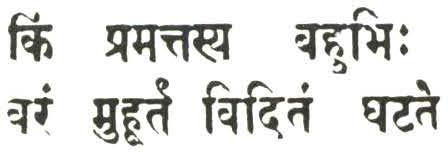
Text 12] The First Step in God Realization 21
w�����, �� '-A:
fulfilled. The supreme interest of life is eternal, with full knowledge and bliss. Those who are bewildered by the external features of the material world and are engaged in the matter of the animal propensities of the eatdrink-and-be-merry type of life are simply wasting their lives by the unseen passing away of valuable years. We should know in perfect consciousness that human life is bestowed upon the conditioned soul to achieve spiritual success, and the easiest possible procedure to attain this end is to chant the holy name of the Lord. In the previous verse, we have discussed this point to a certain extent, and we may further be enlightened on the different types of offenses committed unto the feet of the holy name. Srila Jiva Gosvami Prabhu has quoted many passages from authentic scriptures and has ably supported the statements in the matter of offenses at the feet of the holy name. From Vi§rtu-jiimala Tantra, Srila Jiva Gosvami has proven that one can be liberated from the effects of all sins simply by chanting the holy name of the Lord. Quoting from the Miirkaru)eya Puriira, Sri Gosvam�i says that one should neither blaspheme the devotee of the Lord nor indulge in hearing others who are engaged in belittling a devotee of the Lord. A devotee should try to restrict the vilifier by cutting out his tongue, and being unable to do so, one should commit suicide rather than hear the blaspheming of the devotee of the Lord. The conclusion is that one should neither hear nor allow vilification of a devotee of the Lord. As far as distinguishing the Lord's holy name from the names of the demigods, the revealed scriptures disclose (Bg. 10.41) that all extraordinarily powerful beings are but parts and parcels of the supreme energetic, Lord Krwa. Except the Lord Himself, everyone is subordinate; no one is independent of the Lord. Since no one is more powerful than or equal to the energy of the Supreme Lord, no one's name can be as powerful as that of the Lord. By chanting the Lord's holy name, one can derive all the stipulated energy synchronized from all sources. Therefore, one should notequalize the supremeholy name of the Lord with any other name. Brahma, Siva or any other powerful god can never be equal to the Supreme Lord Vi��u. The powerful holy name of the Lord can certainly deliver one from sinful effects, but one who desires to utilize this transcendental potency of the holy name of the Lord in one's sinister activities is the most degraded person in the world. Such persons are never excused by the Lord or by any agent of the Lord. One should, therefore, utilize one's life in glorifying the Lord by all means, without any offense. Such activity of life, even for a moment, is never to be compared with a prolonged life of ignorance, like the lives of the tree and other living entities who may live for thousands of years without prosecuting spiritual advancement.

22 Srimad-Bhagavatam (Canto 2, Ch. l
TEXT 13

kha!vango nama rajar�ir jiiatveyattam ihayu�a�
muhurtat sarvam utsrjya gatavan abhayam harim

khatvanga�-King Khatvanga; nama-name; rajar�*-saintly king;jiiatva -by knowing;iyattam-duration;iha-in this world;ayu�a�-of one's life; muhurtat-within only a moment; sarvam-everything; utsrjya-leaving aside;gatavan-hadundergone; abhayam-fully safe;harim-the Personality of Godhead.
TRANSLATION
The saintly King, Maharaja Khatvanga, after being informed that the duration of his life would· be only a moment more, at once got himself freed from all material activities and took shelter of the supreme safety, the Personality of Godhead.
PURPORT
A fully responsible man should always be conscious of the prime duty of the present human form of life. The activities of life to meet the immediate necessities of material life arenot everything. One should always be alert in his duty for attainment of the best situation in the next life. Human life is meant for preparing ourselves for that prime duty. Maharaja Khatvanga is mentioned herein as the saintly King because even within the responsibility of the state management, he was not at all forgetful of the prime duty of life. Such was the case with other rajar�is (saintly kings), like Maharaja Yudhi�thira and Maharaja Parik�it. They were all exemplary personalities on account of their being alert in discharging their prime duty. Maharaja Khatvanga was invited by the demigods in the higher planets to fight demons, and as a king, he fought the battles to the full satisfaction of the demigods. The demigods, being fully satisfied with him, wanted to give him some benediction for material enjoyment, but Maharaja
Text 13] The First Step in God Realization
23
<.
Khatvanga, being very much alert to his prime duty, inquired from the demigods about his remaining duration of life. This means that he was not as anxious to accumulate some material benediction from the demigods as he was to prepare himself for the next life. He was, however, informed by the demigods that his life would last only a moment longer. The King at once left the heavenly kingdom, which is always full of material enj oyment of the highest standard, and coming down on this earth, took ultimate shelter of the all-safe Personality of Godhead. He was successful in his great attempt and got liberation. This attempt, even for a moment, by the saintly King, was successful because he was always alert to his prime duty. Maharaj a Parik�it was thus encouraged by the great Sukadeva Gosvami, even though he had only seven days left in his life to execute the prime duty of hearing the glories of the Lord in the form of Srimad-Bhiigavatam. By the will of the Lord, Maharaj a Parik�it instantly met the great Sukadeva Gosvami, and the great treasure of spiritual success left by him is nicely mentioned in the Srimad-Bhiigavatam.
TEXT 14

taviipy etarhi kauravya
saptiiharh jivitiivadhift
upakalpaya tat sarvarh
tiivad yat siimpariiyikam
tava-your; api-also; etarhi-therefore; kauravya-born in the family of Kuru; saptiiham-seven days; jivita-duration of life; avadhift-up to the limit of; upakalpaya-get them performed; tat-those; sarvam-all; tiivatso long; yat-which are; siimpariiyikam-rituals for the next life.

TRANSLATION
Maharaja Par�it, now your duration of life is limited to seven more days, so during this time you can perform all those rituals which are needed for the best purpose of your next life.
24 Srimad - Bhagavatam [ Canto 2, Ch. l
Sukadeva Gosvami, after citing the example of Maharaja Khatvanga, who preparedhimself forthe nextlife within a very short time,encouraged Maharaja Parik�it that he had still seven days at his disposal and that he could easily take advantage of the time to prepare himself for the next life. Indirectly, the Gosvami told Maharaja Parik�it that he should take shelter of the sound representation of the Lord for the seven days still remaining in the duration of his life and thus get himself liberated. In other words, everyone can best prepare himself for the next life simply by hearing Snmad-Bhagavatam, as it was recited by Sukadeva Gosvami to Maharaja Parik�it. The rituals are not formal, but there are also some favorable conditions, which are required to be carried out, as instructed hereafter.

anta-kale tu puru§a agate gata-siidhvasa[t chindyiid asanga-sastrera sprhiirh dehe 'nu ye ca tam
anta-kiile-at the last stage of life; tu-but; puru§a{t-a person; agatehavingarrived;gata-siidhvasa{!-without any fear of death; chindyiit-must cut off; asariga -nonattachment; sastrera-by the weapon of; sprhiim-all desires; dehe-in the matter of the material tabernacle; anu-pertaining; ye-all that;ca-also; tam-them.
TRANSLATION
At the last stage of one's life, one should be bold enough not to become afraid of death. But he must cut off all attachment to the material body and everything pertaining to it and all desires thereof.
Text 15] The First Step in God Realization 25
PURPORT
3forij'til� � � atttFt •MeiG:t�: I t0;<UI�(1fi��armY �� � :q �II��II
TEXT 15
The foolishness of gross materialism is that people think of making a permanent settlement in this world, although it is a settled fact that one has to give up everything here that has been created by valuable human energy. Great statesmen, scientists, philosophers, etc., who are foolish, without any information of the spirit soul, think that this life of a few years only is all in all and that there is nothing more after death. This poor fund of knowledge, even in the so-called learned circles of the world, is killing the vitality of human energy, and the awful result is being keenly felt. And yet the foolish materialistic men do not care for what is going to happen in the next life. The preliminary instruction in the Bhagavad-g"ita is that one should know that the identity of the individual living entity is not lost even after the end of this present body, which is nothing but outward dress only. As one changes an old garment, so the individual living being also changes his body, and this change of body is called death. Death is, therefore, a process of changing the body at the end of the duration of the present life. An intelligent person must be prepared for this and must try to have the best type of body in the next life. The best type of body is a spiritual body, which is obtained by those who go back to the kingdom of God or enter the realm of Brahman. In the second chapter of this canto, this matter will be broadly discussed, but in as far as the change of body is concerned, one must prepare now for the next life. Foolish people attach more importance to the present temporary life, and thus the foolish leaders make appeals to the body and the bodily relations. The bodily relations not only extend to this body but also to the family members, wife, children, society, country and so many other things which end at the end of life. After death oneforgets everything about the present bodily relations; we have a little experience of this at night when we go to sleep. While sleeping, we forget everything about this body and bodily relations, although this forgetfulness is a temporary situation for only a few hours. Death is nothing but sleeping for a few months in order to develop another term of bodily encagement, which we are awarded by the law of nature according to our aspiration. Therefore, one has only to change the aspiration during the course of this present body, and for this, there is need oftraining inthe current duration ofhuman life. This training can be begun at any stage of life, or even a few seconds before death, but the usual procedure is for one to get the training from very early life, from the stage of brahmacarya, and gradually progress to the grhastha, viinaprastha and sannyiisa orders of life. The institution which gives such

26 Srimad-Bhagavatam [Canto 2, Ch. l
PURPORT
training is called varriisrama-dharma, or the system of saniitana-dharma, the best procedure for making the human life perfect. One is, therefore, required to give up the attachment to family or social or political lifejust at the age of fifty years, if not earlier, and the training in the viinaprastha and sannyasa asramas is given for preparation of the next life. Foolish materialists, in the garb of leaders of the people in general, stick to family affairs without attempting to cut offrelations with them, andthus they become victims of nature's law and get gross bodies again, according to their work. Such foolish leaders may have some respect from the people at the end of life, but that does not mean that such leaders will be immune from the natural laws under which everyone is tightly bound by the hands and feet. The best thing is, therefore, that everyone voluntarily give up family relations by transferring the attachment from family, society, country and everything thereof to the devotional service of the Lord. It is stated herein that one should give up all desires of family attachment. One must have a chance for better desires; otherwise there is no chance of giving up such morbid desires. Desire is the concomitant factor of the living entity. The living entity is eternal, and therefore his desires, which are natural for a living being, are also eternal. One cannot, therefore, stop desiring, but the subject matter for desires can be changed. So one must develop the desires for returning home, back to Godhead, and automatically the desires for material gain, material honor and material popularity will diminish in proportion to the development of devotional service. A living being is meant for service activities, and his desires are centered around such a service attitude. Beginning from the top executive head of the state, down to the insignificant pauper in the street, all are rendering some sort of service to others. The perfection of such a service attitude is only attained simply by transferring the desire of service from matter to spirit, or from Satan to God.
TEXT 16

grhat pravrajito dhira/;1

purya-tirtha-jaliipluta/;1
sucau vivikta asino
vidhivat kalpitasane
Text 16] The First Step in God Realization 27
grhiit-from one's home; pravrajita�-having gone out; dhira�-selfcontrolled; pu!lya-pious; tirtha-sacred place; jaliiplnta[!-fully washed; sueau-cleansed; vivikte-solitary; iisina�-seated; vidhivat-according to regulations;kalpita-being done; iisane-on a sitting place.
TRANSLATION

One should leave home and practice self-control. In a sacred place he should bathe regularly and sit down in a lonely place duly sanctified.
PURPORT
To prepare oneself for the better next life, one must get out of one's socalled home. The system of vamiisrama-dharma or saniitana-dharma prescribes retirement from family encumbrances as early as possible after one has passed fifty years of age. Modern civilization is based on family comforts, the highest standard of amenities, and therefore, everyone expects to live a very comfortable life after retirement in a well furnished home decorated with fine ladies and children, without any desire to get out of such a comfortable home. High government officers and ministers stick to their prize posts until death, and they neither dream nor desire to get out of homely comforts. Bound by such hallucinations, materialistic men prepare various plans for a still more comfortable life, but suddenly cruel death comes without mercy and takes away the great planmaker against his desire, forcing him to give up the present body for another body. Such a planmaker is thus forced to accept another body in one of the 8,400,000 species of life according to the fruits of the work which he might have performed. In the next life, generally, persons who are too much attached to family comforts are awarded lower species of life on account of sinful acts performed during a long duration of sinful life, and thus all the energy of the human life is spoiled. In order to be saved from the danger of spoiling the human form of life and being attached to unreal things, one must take warning of death at the age of fifty, if not earlier. The principle is that one should take it for granted that the death warning is already there, even prior to the attainment of fifty years of age, and thus at any stage of life one should prepare himself for a better next life. The system of the saniitana-dharma institution is so made that the follower is trained for the better next life without any chance of the human life being spoiled. The holy places all over the world are meant for the residential purposes of retired persons getting readyfor the better next life. Intelligent
28 Srimad-Bhagavatam [Canto 2, Ch. l
persons must go there at the end of life, and for that matter, after fifty years of age, to live a life of spiritual regeneration for the sake of being freed from family attachment, which is considered to be the shackle of material life. One is recommended to quit home just to get rid of material attachment, because one who sticks to family life until death cannot get rid of material attachment, and as long as one is materially attached, one cannot understand spiritual freedom. One should not, however, become self-complacent simply by leaving home or by creating another home at the holyplace either lawfully or unlawfully. Manypersons leave home and go to such holy places, but due to bad association, againbecome family men by illicit connection with the opposite sex. The illusory energy of matter is so strong that one is apt to be under such illusion at every stage of life, evenafter quitting one's happy home. Therefore, itis essential that one should practice self-control by celibacy without the least desire for sex indulgence. Sex indulgence, for a man desiring to improve the condition of his existence, is considered to be suicidal, or evenworse. Therefore, to live apart from family life means to become self-controlled from allsense desires, especiallysex desires. The method is that one should have a sitting place duly sanctified, made of straw, skin of the deer andcarpet, and thus sitting onit one should chantthe holy name of the Lord without offense, as prescribed above. The whole process is to drag the mindfrom material engagements and fix it on the lotusfeet of the Lord. Thissimple process alone willhelp one advanceto thehig,hest stage of spiritualsuccess.
TEXT 17

3l�=tre"1'1«,
f,rg�t �I
ifiA!itliit+iN�H.�II� \911
abhyasen manasa suddham
trivrd-brahmak§aramparam
mano yacchejjita-svaso
brahma-bijamavismaran
abhyaset-just get it into practice; manasa-by the mind; suddhamsacred; trivrt-composed of the three; brahmak§aram-transcendental letters;param-the supreme; mana�-mind; yacchet-get under control;jitasvasa�-by regulating the breathing air; brahma-absolute; bijam-seed; avismaram-without being forgotten.
Text 17) The First Step in God Realization 29
�
q;iT i4�0�ij�
TRANSLATION
After sitting in the above manner, make the mind remember the three transcendental letters [A.U.M.] , and by regulating the breathing process, control the mind so as not to forget the transcendental seed.
PURPORT
Omkiira or the prar-ava is the seed of transcendental realization,and it is composed of three transcendental letters A.U.M. By its chanting by the mind, in conjunction with the breathing process, which is a transcendental but mechanical way of getting into trance, as devised by the experience of great mystics, one is able to bring the mind, which is materially absorbed, under control. This is a way of changing the habit of the mind. The mind is not to be killed. Mind or desire cannot be stopped, but to develop a desire to function for spiritual realization, the quality of engagement by the mind has to be changed. The mind is the pivot of the active sense organs, and as such ifthe quality ofthinking,feeling and willingis changed, naturally the quality of actionsby the instrumental senses will also change. Omkiira is the seed of all transcendental sound,and it is the transcendental sound only which can bring about the desired change of the mind and the senses. Even a mentally deranged man can be cured by treatment of transcendental sound. In the Bhagavad-gitii, the prar-ava or omkiira has been accepted as the direct literal representation of the Supreme Absolute Truth. One who is not able to chant directly the holy name of the Lord, as recommended above, can easily chant the prartava or omkiira. This omkiira is a note of address, such as, "0 my Lord," just as "om hari om" means "0 my Lord, the Supreme Personality of Godhead." As we have explained before, the Lord's holy name is identical with the Lord Himself. So also is omkiira. But persons who are unableto realize thetranscendental personal form or name of the Lord on account of their imperfect senses (in other words, the neophytes) are trained to the practice of selfrealization by this mechanical process of regulating the breathing function and simultaneously repeating the prar-ava omkiira within the mind. As we have several times expressed, since the transcendental name, form, attributes, pastimes, etc., of the Personality of Godhead are impossible to be understood by the present material senses, it is necessary that through the mind, the center of sensual activities, such transcendental realization be set into motion. The devotees, however, directly fix their minds on the

30 Srimad-Bhagavatam [Canto 2, Ch. l
Person of the Absolute Truth. But one whois unable to accommodate such personal features of the Absolute is disciplined in that impersonality to train the mind to make further progress.
TEXT 18

fwP'4'0)0f§:'t��:��wmt :stf.l«ldv.r: I
�: ��8 �ij "-ll�f-§.�111��11
niyacched vi§ayebhyo 'k§iin manasii buddhi-siirath* mana� karmabhir iik§iptarh subhiirthe dhiirayed dhiyii
niyacchet-withdraw; vi§ayebhya�-from sense engagements; ak§iinthe senses; manasii-by dint of the mind; buddhi- intelligence; siirath*driver; mana�-the mind; karmabh*-by the fruitive work; iik§iptambeing absorbed in; subhiirthe-for the sake of the Lord; dhiirayet-hold up; dhiyii-in full consciousness.
TRANSLATION
Gradually, as the mind becomes progressively spiritualized, withdraw it from sense activities, and by intelligence the senses will be controlled. The mind, being too much absorbed in material activities, can be engaged in the service of the Personality of Godhead and become fixed in full transcendental consciousness.
PURPORT
The first process of spiritualizing the mind by mechanical chanting of the prar-ava omkiira and controlling the breathing system is technically called the mystic or yogic process of prii[tiiyiima, or fully controlling the breathing air. The ultimate state of this prii[tiiyiima system is to become fixed up in trance, technically called the stage of samiidhi. But experience has proven that even the samiidhi stage also fails to control the materiallyabsorbed mind. For example, the great mystic Visvamitra Muni, even in the stage of samiidhi, became a victim of the senses and cohabited with
Text 18] The First Step in God Realization 31
Menaka. History has already recorded it. The mind, although ceasing to think of sensual activities at present, remembers past sensual activities from the subconscious status and thus disturbs one from cent per cent engagement in self-realization. Therefore, Sukadeva Gosvamirecommends the next step of assured policy,namelytofix one's mindinthe service of the Personality of Godhead. Lord Sri Kr�':la, the Supreme Personality of Godhead, also recommends this direct process in the Bhagavad-gitii (Bg. 6.47). Thus, the mind being spiritually cleansed, one should at once engage himself in the transcendental loving service of the Lord by the different devotional activities o� hearing, chanting, etc. That is thesurest path of progress even for the disturbed mind, if performed under proper guidance. TEXT

tatraikiivayavarh dhyiiyed avyucchinnena cetasii mano nirvi§ayarh yuktvii
tata� kincana na smaret padarh tat paramarh vi§rwr mano yatra prasidati
tatra-thereafter; eka-one after one; avayavam-limbs of the body; dhyiiyet-should be concentrated upon; avyucchinnena-without being deviated from the complete form; cetasii-by the mind; mana�-mind; nirvi§ayam-without being contaminated by sense objects; yuktvii-being dovetailed; tata�-afterthat;kincana-anything;na-donot;smaret-think of; padam-personality; tat-that; paramam-Supreme; vi§r-o�-of Vi�':lu; mana�-themind; yatra-whereupon; prasidati- becomes reconciled.
TRANSLATION
Thereafter, you should meditate upon the limbs of Vi�pu, one after another, without being deviated from the conception of the complete
32 Srimad-Bhagavatam [Canto 2, Ch. l
�
�� Wf
!iHffa:RIII��II
19 a��lt�tt4 �tt1�a:��J0�'l
1 �f.lfttqtf� mr:
� 1 � �" � �
body,andthus the mind becomes freefrom all senseobjects. There should beno otherthing to be thought upon. Becausethe Supreme Personality of Godhead, Vi�J).U, is the Ultimate Truth, the mind becomes completely reconciledin Him only.
PURPORT
Foolish persons, bewildered by the external energy of Vi�I).U, do not know that the ultimate goal ofthe progressive search afterhappinessis to get into touch directly with Lord Vi�I).U, the Personality of Godhead. Vi§ru-tattva is an unlimited expansion of different transcendental forms of thePersonality of Godhead, and thesupremeor original form of Vi§rutattva isGovinda orLordKr�pa,thesupremecause ofall causes.Therefore, thinking of Vi�pu or meditation upon the transcendental form of Vi�pu, specificallyuponLord Kr�pa,is thelastwordonthe subjectofmeditation. This meditationmaybebegunfromthelotusfeetofthe Lord. Oneshould not, however, forget or be misled from the complete form of the Lord; thusoneshould practicethinkingofthe different partsof His transcendental body, one after another. Here inthis verse,itisdefinitely assured that the Supreme Lord is not impersonal. He is a person, but His body is different from those of conditioned persons like us. Otherwise, meditation beginning from the prarava omkiira up to the limbs of the personal body of Vi�pu would not have been recommended by Sukadeva Gosvami for the attainment of complete spiritual perfection. The Vi�pu forms of worship in great temples of India are not, therefore, arrangementsofidol worship,asitiswronglyinterpretedbya class ofmen with a poor fund of knowledge, butthey aredifferentspiritual centersof meditation on the transcendental limbs of the body of Vi�pu. The worshipable deity in the temple of Vi�pu is identical with Lord Vi�pubythe inconceivable potency ofthe Lord. Therefore,aneophyte'sconcentration or meditation upon the limbs of Vi�pu in the temple, ascontemplatedin the revealed scriptures, is an easy opportunity for meditationforpersons whoareunabletosit downtightly atoneplaceand thenconcentrateupon prarava omkiira orthelimbsofthebody of Vi�pu, as recommendedherein by Sukadeva Gosvami, the great authority. The common mancan benefit more by meditating on the form of Vi�pu in the temple than on the omkiira, the spiritual combination of A.U .M. asexplained before. Thereis no difference between omkiira and the forms of Vi�pu, but persons who are unacquainted with the science of Absolute Truth try to create dissension by differentiating between the forms of Vi�p.u and that of

Text 19] The First Step in GodRealization 33
omkiira. Here it is indicated that the Vi��u form is the ultimate goal of meditation, and as such it is better to concentrate upon the forms of Vi��u than on impersonal omkiira, as the latter process is more difficult than the former.
TEXT 20

��t¥0Ati'tl� R1{t qW{ 300R: I
�RUN(
�TU � �� � ll�oll
rajas-tamobhyiim iik�iptarh vimupharh mana iitmana� yacched dhiirar;wyii dhiro hanti yii tat-krtarh malam
raja�-passionate modes of nature; tamobhyiim-as well as by the ignorant modes of material nature; iik�iptam- agitated ; vimupham-bewildered; mana�-the mind ; iitmana�-of one's own; yacchet-get it rectified; dhiirar;wyii-by conception (of Vi��u); dhira�-the pacified; hanti- destroys; yii-all those; tat-krtam-done by them; malam-di rty things.
TRANSLATION
One's mind is always agitated by the passionate modes of material nature and bewildered by the ignorant modes of nature. But one can rectify such conceptions by the relation of Vi��u and thus become pacified by cleansing the dirty things created by them.
PURPORT
Persons generally conducted by the modes of passion and the modes of ignorance cannot be bona fide candidates for being situated in the transcendental stage of God realization. Only the persons conducted under the modes of goodness can have the knowledge of the Supreme Truth. Effects of the modes of passion and ignorance are manifested by too much hankering after wealth and women. And those who are too much after wealth and women can only rectify their leanings by constant remembrance of Vi��u in His potential impersonal feature. Generally the impersonalists or monists are influenced by the modes of passion and ignorance.
34 Srimad-Bhagavatam [Canto 2, Ch. l
Such impersonalists think of themselves as liberated souls, but they have noknowledge ofthetranscendental personal feature ofthe AbsoluteTruth. Actually they are impure in heart on account ofbeing devoid of knowledge of the personal feature of the Absolute. In the Bhagavad-gitii, it is said that after many hundreds of births, the impersonalist philosopher surrenders unto the Personality of Godhead. To acquire such a qualification of God realization in the personal feature, the neophyte impersonalist is given a chance to realize the relation of the Lord in everything by the philosophy of pantheism.
Pantheism in its higher status does not permit the student to form an impersonal conception of the Absolute Truth, but the conception of the Absolute Truth is extended in the field of the so-called material energy. Everything created by the material energy can be dovetailed with the Absolute by service attitude, which is the essential part of living energy. The pure devotee of the Lord knows the art of converting everything into its spiritual existence by this service attitude, and in that devotional way only can the theory of pantheism be perfected.
TEXT 21

yasyiirh sandhiiryamii[tiiyiirh yogino bhakti-lak§ara� iisu sampadyate yoga iisrayarh bhadram ik§ata�
yasyiim-by such systematic remembrance; sandhiiryamiirtiiyiim-and thus being fixed in the habit of; yogina�-the mystics; bhakti-lak§ara�being practiced to the devotional system; iisu-very soon; sampadyateattains success; yoga�-connection by devotional service; iisrayam-under the shelter of; bhadram-the aU-good; ik §ata�-which seeing that.
TRANSLATION
0 King, by this system of remembrance and by being fixed in the habit of seeing the ail-good personal conception of the Lord, one can very soon attain devotional service of the Lord under His direct shelter.
Text 21] The First Step in God Realization 35
��ltt¥\IOII�ilitftr.ft�Rfi��IJT: I � �� � 31t�;;f���: II��II
Success of mystic performances is achieved only by the help of the devotional attitude. Pantheism, or the system of feeling the presence of the Almighty everywhere, is a sort of training of the mind to become accustomed to the devotional conception, and it is this devotional attitude of the mystic that makes possible the successful termination of such mystic attempts. One is not, however, elevated to such a successful status without the tinge of mixture in devotional service. The devotional atmosphere created by such pantheistic vision develops into devotional service in later days, and that is the only benefit for the impersonalist. It is confirmed in the Bhagavad-gitii (Bg. 12.5) that the impersonal way of self-realization is more troublesome because it reaches the goal in an indirect way, although the impersonalist also becomes obsessed with the personal feature of the Lord after a long time.
TEXT 22

riijoviica
yathii sandhiiryate brahman
dhiira[l-ii yatra sammatii
yiidrsi vii hared iisu
puru§asya mano-malam
sri riijii uviica-the lucky king said; yathii-as it is; sandhiiryate-the conception is made; brahman-0 briihmarta; dhiirartii-conception; yatrawhere and how; sammatii-in a summary; yiidrsi-the way by which; viieither or; haret-extricated; iisu-without delay; puru§asya-of a person; manaly,-of the mind; malam-dirty things TRANSLATION
The lucky King Par�it, inquiring further, said, 0 brahmapa, please
36 S rimad- Bhagavatam [Canto 2, Ch. 1
PURPORT
��� tt?tl�� ��tt�� I ttmft qt � � ¥�it1¥�e4J\ ������
describe in full detail the process as to how and where the mind has to be applied and how the conception can be fixed so that the dirty things in a person's mind can be removed.

PURPORT
The dirty things in the heart of a conditioned soul are the root cause of all troubles for him. A conditioned soul is surrounded with the manifold miseries of material existence, but on account of his gross ignorance he is unable to remove the troubles due to dirty things in the heart, accumulated during the long prison life in the material world. He is actually meant to serve the will of the Supreme Lord, but on account of the dirty things in the heart, he likes to serve his concocted desires. These desires, instead of giving him any peace of mind, create new problems of life and thus bind him to the cycle of repeated birth and death. These dirty things of fruitive work and empiric philosophy can be removed only by his association with the Supreme Lord. The Lord, being omnipotent, can offer His association by His inconceivable potencies. Thus persons who are unable to pin their faith on the personal feature ofthe Absolute are given a chance to associate with His viriita rupa, or the cosmic impersonal feature of the Lord. The cosmic impersonal feature of the Lord is a feature of His unlimited potencies. Since the potent and potencies are identical, even the conception of His impersonal cosmic feature helps the conditioned soul to associate with the Lordindirectly and thus gradually rise to the stage of personal contact. Maharaja Parik�it was already directly connected with the personal feature of the Lord Sri Kr��a, and as such he had no business to inquire from Sukadeva Gosvam'i about where and how to apply the mind in the impersonal viriifa rupa of the Lord. But he inquired after a detailed description of the matter for the benef-it of others, who are unable to conceive of the transcendental personal feature of the Lord as the form of eternity, knowledge and bliss. The nondevotee class of men cannot think of the personal feature of the Lord. Because of their poor fund of knowledge, the personal form of the Lord, like Rama or Kf�l).a, is completely revolting to them. Theyhave a poor estimation of the potency of the Lord. In the Bhagavad-gitii, it is explained by the Lord Himself (Bg. 9.11) that people with a poor fund of knowledge deride the Supreme Personality of the Lord, taking Him to be a common man. Such men are ignorant of the inconceivable potency of the Lord. By the inconceivable potency of the Lord, He can move in the human society or any other society of living beings and yet remain the same omnipotent Lordwithout deviating in the
Text 22) The First Step in God Realization 37
slightest from His transcendentalposition. So, forthebenefit of men who are unable to accept the Lord in His personal eternal form, Maharaja Parilqit inquired from Sukadeva Gosvam1how to fix themind on Himin the beginning, and theGosvam1 replied in detail as follows.
TEXT 23

sri suka uviica
jitiisano jita-sviiso
jita-sango jitendriya�
sthule bhagavato riipe
mana� sandhiirayed dhiyii
sri suka uviica-Sukadeva Gosvam1 said; jitiisana�-controlled Sittmg posture; jita-sviisa�-controlled breathing process; jita-sanga�-controlled association; jitendriya�-controlled senses; sthule-in the gross matter; bhagavata�-unto the Personality of Godhead; riipe-in the feature of; mana�- the mind; sandhiirayet-must apply; dhiyii-byintelligence.
TRANSLATION
Sukadeva Gosvami answered, One should control the sitting posture, and regulate the breathing process by the yogic pra�ayama and thus control the mind and the senses, and with intelligence apply the mind to the gross potencies of the Lord [called the virata riipa].
PURPORT
The materially-absorbed mind of the conditioned soul does not allow him to transcend the limit of the bodily conception of self, and thusthe yoga system for meditation (fixing the mind upon the Supreme, controlling the sitting posture and breathing process) is prescribed in order to mold the character of the gross materialist. Unless such materialists are
38 Srimad-Bhagavatam [Canto 2, Ch. 1
��qy:q
�Q�a�: , � � � �: �������
Mijl«'1tRijSQI(1l
able to cleanse the materially absorbed mind, it is impossible for them to concentrate upon thoughts of transcendence. And to do so one may fix one's mind on the gross material or external feature of the Lord. The different parts of the gigantic form of the Lord are described in the following verses. The materialistic men are very anxious to have some mystic powers as a result of such controlling process, but the real purpose of yogic regulations is to eradicate the accumulated dirty things like lust, anger, avarice and all such material contaminations. If the mystic yogi is diverted by the accompanying feats of mystic control, then his mission of yogic success is a failure, because the ultimate aim is God realization. He is therefore recommended to fix his gross materialistic mind by a different conception and thus realize the potency of the Lord. As soon as the potencies are understood to be instrumental manifestations of the transcendence,thenext step isautomatically advanced, and gradually the stage of full realization becomes possible for him.
TEXT 24

vise§aS tasya deho'yarh
sthavi§thas ca sthaviyasiim yatredarh vyajyate visvarh
bhiitarh bhavyarh bhavac ca sat
vise§a[l-personal; tasya-his; dehaft-body; ayam-this; sthavi§tha[tgrossly material; ca-and; sthaviyasiim-of all matter; yatra-wherein; idam -allthesephenomenal; vyajyate-is experienced; visvam- universe; bhiitam -past; bhavyam-future; bhavat-present; ca-and; sat- resultant.
TRANSLATION
This gigantic manifestation of the phenomenal material world as a whole is the personal body of the Absolute Truth, wherein the universal resultant past, present and future of material time is experienced.
Text 24] The First Step in God Realization 39
� �� RW �� lml� ������
N�\lt(ij@ �Slf�� (lllq'l�HU¥( I
PURPORT
Anything either material or spiritual is but the expansion of the energy of the Supreme Personality of Godhead, and as stated in the Bhagavad-gitii (Bg. 13.13), the omnipotent Lord has His transcendental eyes, heads and other bodily parts distributed everywhere. He can see, hear, touch or manifest Himself from anywhere and everywhere, for He is present everywhere as the Supersoul of all infinitesimal souls, although He has His particular abode in the absolute world. This relative world is also His phenomenal representation because it is nothing but the expansion of His transcendental energy. Although He is in His abode, still His energy is distributed everywhere, just as the sun is localized as well as expanded everywhere and the rays of the sun, being nondifferent from the sun, are accepted as expansions of the sun disc. In the Vi§r-u Puriirw (V.P. 1.22.52) it is said that as fire expands its rays and heat from one place, similarly the Supreme Spirit, the Personality of Godhead, expands Himself by His manifold energy everywhere and anywhere. The phenomenal manifestation of the gigantic universe is only a part of His viriita body. The less intelligent class of men cannot conceive of the transcendental all-spiritual form of the Lord, but they are astounded by His different energies just as the aborigines are struck with wonder by the manifestation of lightning, a gigantic mountain or a hugely expanded banyan tree. The aborigines praise the strength of the tiger and the elephant because of their superior energy and strength. The asuras also cannot recognize the existence of the Lord, although there are vivid descriptions of the Lord in the revealed scriptures, although the Lord incarnates and exhibits His uncommon strength and energy, and although He isacceptedas the Supreme Personality of Godhead by learned scholars and saints like Vyasadeva, Narada, Asita and Devala in the past and by Arjuna in the Bhagavad-gitii, as also by the iiciiryas like Sankara, Ramanuja, Madhva and Lord Sri Caitanya in the modern age. The asuras do not accept any evidential proof from the revealed scriptures, nor do they recognize the authority of the great iiciiryas. They want to see eye to eye at once. Therefore they can see the gigantic body of the Lord as viriita, which will answer their challenge, and as they are accustomed to pay homage to superior material strength like that of the tiger, elephant, lightning, etc., they can offer respect to the viriita rupa. Lord Kr��a, by the request of Arjuna, exhibited His viriita riipa for the asuras. A pure devotee of the Lord, being unaccustomed to look into such mundane gigantic form of the Lord, requires special vision for the purpose. The Lord, therefore, favored Arjuna with special vision for looking into His viriita riipa,

40 Srimad-Bhagavatam [Canto 2, Ch. 1
described in the Eleventh Chapter of the Bhagavad-gitii. This viriita riipa of the Lord was especially manifested, not for the benefit of Arjuna, but for that unintelligent class of men who accept anyone and everyone as the incarnation of the Lord and so mislead the general mass of people. For them,theindicationisthat one should ask the cheap incarnation to exhibit his viriita riipa and thus be established as an incarnation. The viriita rupa manifestation of the Lord is simultaneously a challenge to the atheist and a favor for the asuras who can think of the Lord as viriita and thus gradually cleanse the dirty things in their hearts in order to become qualified to actually see the transcendental form of the Lord in the near future. This is a favor of the all-merciful Lord to the atheists and the gross materialists.
TEXT 25

3fo:si\� �ffisf� «m�IJl� 1
�u�:�ffll �tS«T +til�'{ �HIJIT��: 11�'-\ll
ar�a-kose sarire 'smin saptiivarara-sarhyute vairiija� puru§O yo 'sau bhagaviin dhararasraya�
ar�a -kose-within the universal shell;sarire-in the body of;asmin-this; sapta-sevenfold ; avarara-co verings ; sarhyut e-being so done; vairiija�the gigantic universal; puru§a�-form of the Lord; ya�- lhat; asau:-1-lc; bhagaviin-the Personality of Godhead; dharara-conception; iisraya{tobject of.
TRANSLATION
The gigantic universal form of the Personality of Godhead, within the body of the universal shell, which is covered by sevenfold material elements, is the subject for virata conception.
PU RPORT
Simultaneously, the Lord has multifarious other forms, and all of lhcm are identical with the original fountainhead form of the Lord Sri Kr�1.1a.
Text 25] The First Step in God Realization 41
In the Bhagavad-gitii, it has been proven that the original transcendental eternalformof the Lordis Sri Kr��a, the Absolute Personality of Godhead, but by His inconceivable internal potency, iitma-miiyii, He can expand Himself by multifarious forms and incarnations simultaneously, without being diminished in His full potency. He is complete, and although innumerablecomplete forms are being emanated from Him, He is still complete without any loss. That is His spiritual or internal potency. In the Eleventh Chapter of the Bhagavad-gitii, the Personality of Godhead, Lord Kr��a, manifested His viriita riipa just to convince the less intelligent class of men, who cannot conceive of the Lord as appearing just like a human being, that He factually has the potency of His claim to be the Supreme Absolute Person without any rival or superior. Materialistic men can think, although very imperfectly, of the huge universal space, comprehending an innumerable number of planets as big as the sun. They can see only the circular sky overhead, without any information that this universe, as well as many other hundreds of thousands of universes, are each covered by sevenfold material coverings of water, fire, air, sky, ego, noumenon and material nature, just like a huge football, pumped and covered, floating on the water of the Causal Ocean, wherein the Lord is lying as Maha-Viwu. All the universes in seedare emanating from the breathing of the Maha-Vi��u, who is but part of a partial expansion of the Lord, and all the universes presided over by the Brahmiis vanish when the Mahii-Vi��u withdraws His great breathing. In this way, the material worlds are being created and vanished by the supreme will of the Lord. The poor foolish materialist can just imagine how ignorantly he puts forward an insignificant creature to become His rival incarnation, simply on the allegations of a dying man. The viriita riipa was particularly exhibited by the Lordjust to give lessons to such foolish men, so that one can accept a person as the incarnation of Godhead only if such a person is able to exhibit such viriita riipa as Lord Kr��a did. The materialistic person may concentrate his mind upon the viriita orgiganticformof the Lord in his own interest and as recommended by Sukadeva Gosviimi, but he must be on his guard not to become misled by pretenders who claim to be the identical person with Lord Kr��a but are not able to act like Him or exhibit the virii{a riipa, comprehending the whole of the universe.
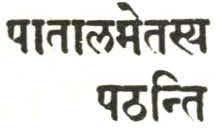

42 Srimad-Bhagavatam [Canto 2, Ch. l
TEXT 26 ft qy��� " � "' ' 'ffitiJfstq� ��- I
piitiilam etasya hi piida-mulam pathanti piir§rzi-prapade rasiitalam mahiitalarh viSva-srjo 'tha gulphau taliitalarh vai puru§asya janghe

piitiilam- the planet in the bottom of the universe; etasya-of his; hiexactly; piida-mulam-soles of the feet;pathanti-they study it;piir§rzi-of the ankles; prapade-under the foot; rasiitalam-the planets named Rasatala; mahiitalam-the planet named l\1ahatala; visva-srja�-of the creator of the universe; atha-thus; gulphau-the calves; tala-the planet named Tala;atala-the planet named Atala; vai-as they are;puru§asya-of the gigantic person; janghe-on the knees.
TRANSLATION
Persons who have realized it have studied that the planets known as Patala constitute the bottom of the feet of the Universal Lord, and the ankles and the soles are the Rasatala planets. The calves are Mahatala planets, and His knees constitute the Tala and Atala planets.
PURPORT
Outside the bodily existence of the Supreme Personality of Godhead, the manifested cosmic existence has no reality. Everything and anything of the manifested world rests on Him, as confirmed in the Bhagavad-gitii (Bg. 9.4), but that does not imply that everything and anything in the vision of a materialist is the Supreme Personality. The conception of the universal form of the Lord gives a chance to the materialist to think of the Supreme Lord, but the materialist must know for certain that his visualization of the world in a spirit of lording over it is not God realization. The materialisticviewof exploitation of the material resources is occasioned by the illusion ofthe external energy of the Lord, and as such, if anyone war1ts to realize the Supreme Truth by conceiving of the universal form of the Lord, one must cultivate the service attitude. Unless the service attitude is revived, the conception of viriita realization will have very little effect on
Text 26] The First Step in God Realization
�� N��1� �(!'f.t �Ft� � � �� 11��11
43
the seer. The transcendental Lord, in any conception of Hisform, is never a part of the material creation. He keeps His identity as Supreme Spirit in all circumstances and is never affected by the three material qualities, for everythingmaterialiscontaminated. The Lord alwaysexists by His internal energy.
Theuniverse is divided into fourteen planetary systems. Seven planetary systems, called Bhur, Bhuvar, Svar, Mahar, Jana, Tapas, and Satya, are upward planetary systems, one above the other. There are also seven planetary systems downward, known as Tala, Atala, Vitala, Rasatala, Taliitala, Mahatala and Piitiila, gradually, one below the other. Inthisverse, thedescription begins from the bottom because it is in the line of devotion thattheLord'sbodilydescription should be begun from His feet. Sukadeva Gosviimi is a recognized devotee of the Lord, and he is exactly correct in the description.
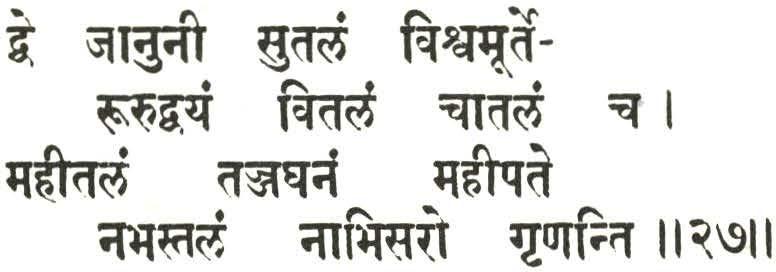
TEXT 27

dvejiinuni sutalam visva-murter urudvayam vitalam ciitalam ca mahitalam taj-jaghanam mahipate nabhastalarh niibhisaro grr-anti
dve-two; jiinuni -leg joints; sutalam-the planetary system named Sutala; viSva-murte�-of the universal form; urudvayam-two thighs; vitalam-the planetary system named Vitala; ca-also; atalam-the planets named Atala; ca-and; mahitalam-the planetary system named Mahitala; tat-of their; jaghanam-lower portion of the thighs; mahipate-king; nabhastalam-outer space; niibhisara�-depression of the navel; grrwntithey take it so.
TRANSLATION
The joints of the legs of the universal form are the planetary system of the name Sutala, and the lower portions of the thighs are the Vitala and
44 Srimad-Bhagavatam [Canto 2, Ch. l
Atalaplanetarysystems.Theupper portion ofthethighsare Mahitala,and outerspaceisthedepressionofHisnavel.
ura�-sthalarh jyotir-anikam asya grivii mahar vadanarh vai jano'sya tapa variitirh vidur iidi-purhsa� satyarh tu sir§ii[l-i sahasra-sir§r-a�

ura�-high; sthalam-place (the chest); jyo tir-a nikam-the luminary planets; asya-of Him; grivii-the neck; maha{t-the planetary system above the luminaries; vadanam-mouth ; vai-exactly; jan a�-the planetary system above Jano; asya-of Him; tapa�-the planetary system above the Maha�; variitim- forehead; vidu�-is known; iidi-the original; purhsa�-personality; satyam-the topmost planetary system; tu-but; sir§ii[l-i- the head; sahasra -one thousand; sir§rta�-one with heads.
TRANSLATION
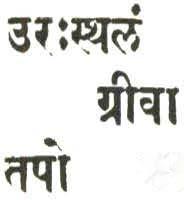
The chest of the Original Personality of the gigantic form is the luminaryplan�tary system, HisneckistheMaharplanets, Hismouthisthe Janaplanets,andHisforeheadistheTapasplanetarysystem. Thetopmost planetarysystem,knownastheSatyaloka,istheheadofHimwhohasone thousandheads.
PURPORT
The effulgent luminary planets like the sun and the moon are situated almost in the midplace of the universe, and as such they are to be known as the chest of the original gigantic form of the Lord. And above the luminary planets, called also the heavenly places of the universal directorate
Text 28) The FirstStepinGodRealization 45
���I
f��: � � iMttul ij��'Ttof:
TEXT 28 �1m;r'T� ��;f �
etuif
11��11
demigods, there are the Mahar, Jana, Tapas planetary systems, and, above all, the Satyaloka planetary system, where the chief directors of the modes of material nature reside, namely Vi�pu, Brahma, and Siva. This Vi�p.u is known as the K�irodakasayi Vi�p.u, and He acts as the Supersoul in every living being. There are innumerable universes floating on the causal ocean, and in each of them the representation of the vinita form of the Lord is there along with innumerable suns, moons, heavenly demigods, Brahmas, Vi�p.us and Sivas, and all of them are situated in one part of the inconceivable potency of Lord Kr�p.a, as it is stated in the Bhagavad-gitii (Bg. 10.42).
indriidayo biihava iihur usrii�
kaqwu diSa� srotram amu§ya sabda� niisatya-dasrau paramasya niise

ghriirw'sya gandho mukham agnir iddha�


indriidaya�-demigods headed by the heavenly king, Indra; biihava�arms; iihu{l.-are called; usrii{l.-the demigods; ka111au-the ears; di.Sa{l.-the four directions; srotram-sense of hearing; amu§ya-of the Lord;sabda�sound; niisatya-dasrau-the demigods known as Asvinikumaras;paramasya -of the Supreme;niise-nostrils;ghriirw�-sense of smelling;asya-of Him; gandha�-flavor;mukham-mouth;agn*-fire;iddha�-blazing.
TRANSLATION
His arms are the demigods headed by Indra, the ten directional sides are His ears, and physical sound is the sense of His hearing. His nostrils are the two Asvinikumaras, and the material flavor is the sense of His smelling. His mouth is the blazing fire.
46 Srimad-Bhagavatam [Canto 2, Ch. l
��
�: ;uJ1����1
ilm
�fit�:
TEXT 29 ... �;:�
r.firfrl
tm.{�
�nun� rr;�
II�<!_,II
The descriptionof the gigantic form of the Personality of Godhead made in the eleventh chapter of the Bhagavad-gitii is further explained here in the Srimad-Bhiigavatam. The description in the Bhagavad-gitii (Bg. 11.30) runs as follows: "0 Vigm, I see You devouring all people in Your blazing mouths and covering all the universe by Your immeasurable rays. Scorching the worlds, You are manifest." In that way, Srimad-Bhiigavatam is the postgraduate study for the student of the Bhagavad-gitii. Both of them are the science of Kr��a, the Absolute Truth, and so they are interdependent. The conception of the viriita-puru�a or the gigantic form of the Supreme Lord is said to include all the dominating demigods as well as the dominated livingbeings. Even the minutest part of a living being is controlled by the empowered agency of the Lord. Since the demigods are included in the gigantic form of the Lord, worship of the Lord whether in His gigantic material conception or in His eternal transcendental form as Lord Sri Kr��a also appeases the demigods and all the other parts and parcels, as much as watering the root of the tree distributes energy to all other parts. Therefore, for a materialist also, worship of the universal gigantic form of the Lord leads one to the right path. One need not risk being misled by approaching many demigods for fulfillment of different desires. The real entity is the Lord Himself, and all others are imaginary, for everything is included in Him only.
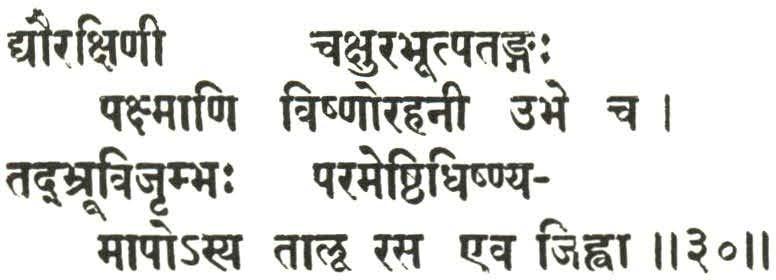
TEXT 30

Text 30) The First Step in God Realization 47
PURPORT
dyaur ak§i[Licak§ur abhUt patmiga[l pak�mii[Li v4por ahani ubheca tad-bhrii-vijrmbha[l parame§fhi-dhi§fl yam iipo'sya tiilii rasa eva jihvii
dyau�-sphere of outer space; ak�i!l i-the eyeballs; cak�u�- of eyes (senses); abhut-it so became; patangal} - the sun; pak§ma!li- eyelids; v4!lo�- of the Personality of Godhead, Sri Vi��u; ahan i-day and night; ubhe-both; ca-and; tat-His; bhrii-eyebrows; vijrmbha�- movements; parame§fhi- the supreme entity(Brahma); dhi�!lyam- post; iipa�- Varu�a, the director ofwater; asya- His;taW-palate; rasa�- juice;eva-certainly; jihva- thetongue.
TRANSLATION
The sphere of outer space constitutes His eyepits, and the eyeball is the sun as the power of seeing; His eyelids are both the day and night, and in the movements of His eyebrows, the Brahma and similar supreme personalities reside. His palate is the director of water, Varu�a, and the juice or essence of everything is His tongue.
PURPORT
To common sense the description in thisverseappearstobesomewhat contradictorybecausesometimesthesunhasbeendescribedastheeyeball and sometimes as the outer space sphere. But there is no room for common sense in the injunctions of the sastras. We must accept the description of the siistras and concentrate more on the form of the viriita riipa than on common sense. Common sense is always imperfect, whereas description in the sastras is alwaysperfectandcomplete. Ifthere is any incongruity, it is duetoour imperfection andnotthe sastras'. That is the method of approaching Vedic wisdom.
TEXT 31

�i�'19'ij� ftRt �f9'ij'
� �: ��T f�tf;rI m:n \i\itflt��u :r.t �m
�9'ij�m ����:II��II
chandarhsy anantasya siro g[!lanti dam§tra yama� sneha-kalii dvijani haso janonmadakari ca maya duranta-sargo yad-apanga-mok§a�
48 Srimad-Bhagavatam [Canto 2, Ch. l
chandarhsi-the Vedic hymns; anantasya-of the Supreme; sira�-cerebral passage; gnwnti-they say; darh§tra�-jaws of teeth; yama�- Yamaraj a, the director of sinners; sneha-kala�-the art of affection; dvijani - the set of teeth; hasa�-smile; janonmadakari-the most alluring; ca-also; mayaillusory energy; duranta-unsurpassable; sarga�-the material creation; yad-apanga-whose glance; mok§a�-casting over.
TRANSLATION
They say that the Vedic hymns are the cerebral passage of the Lord, and the jaws of the teeth are Yama, god of death, who punishes the sinners. The art of affection is his set of teeth, and the most alluring illusory material energy is His smile. This great ocean of material creation is but the casting of His glance over us.
PURPORT
According to Vedic assertion, this material creation is the result of the Lord's casting a glance over the material energy, which is described herein as the most alluring illusory energy. The conditioned souls who are allured by such materialism should know that the material temporary creation is simply an imitation of the reality and that those who are captivated by such alluring glances of the Lord are put under the direction of the controller of sinners called Yamaraja. The Lord smiles affectionately, displaying His teeth. The intelligent person who can grasp these truths about the Lord becomes a fully surrendered soul unto Him.
TEXT 32

�-s1'iji1it� � itm
vri!lottarau§{ho,dhara eva lobho
dharma[£ stano,dharma-patho ,sya p[§{ham
kas tasya me!ihrarh V[§arwu ca mitrau
kuk§* samudrii girayo,sthi-sanghiil;t
Text 32] The First Step in God Realization 49
�aJ:
f�sf�ij"fY: ������
�: ��s�� Wl_ 1 � �t i'fun � f�r
ij�
vri!fa-modesty; uttara-upper;o�tha-lip;adhara�-chin;eva-certainly; lobha�-hankering;dharma�-religiousness;stana�-breast;adharma-irreligiousness;patha�-way;asya-His;pntham-back;ka�-Brahma;tasya-His; me!fhram-genitals; Vf§U!WU- testicles; ca-also; mitrau-the Mitravarw;1as; kuk�*-waist; samudrii�-the oceans; giraya�-the hills; asthi-bones; smighii�-stack.

TRANSLATION
Modesty is the upper portion of His lips, hankering is His chin, religiousness is thebreastofthe Lord, and irreligionisHisback. Brahmaji, whogeneratesalllivingbeingsinthematerialworldisHisgenitals, andthe Mitravar�as are His two testicles. The ocean is His waist, and the hills andmountainsarethestacksofHisbones.
PURPORT
The Supreme Lord is not impersonal, as misconceived by less intelligent thinkers. Rather, He is the Supreme Person, as confirmed in all authentic Vedic literatures. But His personality is different from what we can conceive. It is stated here that Brahmaji acts as His genitals and the Mitravaru�as are His two testicles. This means that, as person, He is complete with all organs of the body, but they are of different types with different potencies. When the Lord is, therefore, described as impersonal, it should be understood that His personality is not exactly of the type of personality found within our imperfect speculation. One can, however, worship the Lord even by seeing the hills and mountains or the ocean and the sky as different parts and parcels of the gigantic body of the Lord, the viriita puru§a. The viriita riipa, as exhibited by Lord Kr��a to Arjuna, is a challenge to the unbelievers.

50 Srimad-Bhagavatam [Canto 2, Ch. 1
TEXT 33 '"' ... �� �S?.f �nor Ff�ijWflofq"?, I �Wf;:ijfihi: 'elf� mcrft� ¥(���� cd �orwm: ������
nadyo'sya niil)yo'tha tanii-ruhiirti
mahiruhii viSva-tanor nrpendra
ananta-virya�svasitarh miitariSvii gatir vaya� karma gura-praviiha�
nadya�-the rivers;asya-of Him;niil)ya�-veins;atha-and thereafter; tanii-ruhiirz,i-hairsonthe body;mahiruhii�-theplantsandtrees;visva-tano� -of the universal form;nrpendra-0 King;ananta-virya�-of the omnipotent;svasitam-breathing;miitariSvii-air;gat*-movement;vaya�-passing ages;karma-activity;gurz,a-praviiha�-reaction of the modes of nature.
TRANSLATION
0 King, the rivers are the veins of the gigantic body, the trees are hairs of His body, and the omnipotent air is His breathing. The passing ages are His movements, and His activities are the reactions of the three modes of material nature.
PURPORT
The Personality of Godhead is not a dead stone, nor is He inactive, as is poorly thought by some schools. He moves with the progress of time, and, therefore, He knows all about the past and future, along with His present activities. There is nothing unknown to Him. The conditioned souls are driven by the reactions of the modes of material nature, which are the activities of the Lord. As it is stated in the Bhagavad-gitii (Bg. 7.12), the modes of nature act under His direction only, and as such no natural functions are blind or automatic. The power behind the activities is the supervision of the Lord, and as such, the Lord is never inactive as is wronglyconceived. The Vedas saythatthe Supreme Lord hasnothing todo personally, as is always the case with superiors, but everythingis done by Hisdirection. As it is said,not a blade of grass moves without His sanction. In the Brahma-smhhita (verse 48), it is said that all the universes and the heads of them (the Brahmas) exist only for the duration of His breathing period. The same is confirmed here. The air on which the universes and the planets within the universes exist is nothing but a bit of breathing of the unchallengeable virata puru§a. So even by studying the rivers, trees, air and the passing ages, one can conceive of the Personality of Godhead without being misled by the formless conception of the Lord. In the Bhagavad-gita (Bg. 12.5) it is stated that those who are

Text 33] The First Step in God Realization
51
much inclined to the formless conception of the Supreme Truth are more troubled than those who can intelligently conceive of the personal form.
TEXT 34

iSasya kesiin vidur ambuviihiin viisas tu sandhyiirh kuru-varya bhumna�
avyaktam iihur hrdayarh manaS ca sa candramii� sarva-vikiira-kosa�
iSasya-of the supreme controller;kesiin-hairs on the head;vidu�-you may know it from me;ambuviihiin-the clouds which carry water;viisas tu -the dress;sandhyiim-terminationofdayand night;kuru-varya-0 best of the Kurus; bhumna�-of the Almighty; avyaktam-the prime cause of material creation; iihu�-it is said; hrdayam-intelligence; manas ca-and the mind; sa�-He; candramii�-the moon; sarva-vikiira-kosa�-reservoir of all changes.

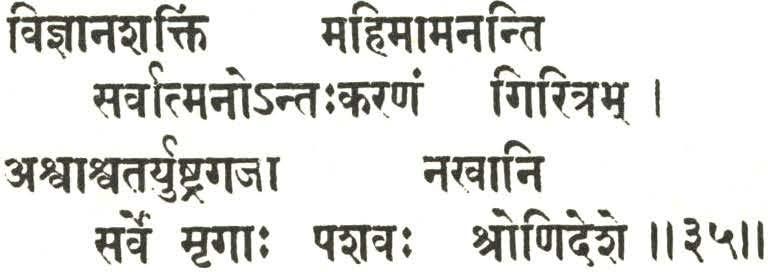
TRANSLATION
0 best amongst the Kurus, the clouds which carry water are the hairs on His head, the termination of days or nights are His dress, and the supreme cause of material creation is His intelligence. His mind is the moon, the reservoir of all changes.
TEXT 35
52 Srimad-Bhagavatam [Canto 2, Ch. 1
� - f��m-3: qm� «�1ft �v.t� �w: 1 (;' « �m: �� (;',...,. .. «ttf.f��: II��II
vijniina-saktirh mahim iimananti sarviitmano 'nta�-karar-am giritram
a8viisvatary-u�tra-gajii nakhiini sarve mrga� pasava� sror-i-dese
vijiiiina-saktim-consciousness; mahim-principle of matter; iimanantithey call it so; sarviitmana�-of the omnipresent; anta�-karar-am-ego; giritram- Rudra (Siva); asva-horse; asvatari-mule; U§tra-camel; gajii�elephant; nakhiini-nails; sarve-all other; mrgii�- stags; pasava�-quadrupeds; sror-i-dese-on the region of the belt-
TRANSLATION
The principle of matter [ mahat-tattva] is the consciousness of the omnipresent Lord, as asserted by the experts, and Rudradeva is His ego. Horse, mule, camel and elephant are His nails, and wild animals and all quadrupeds are situated in the belt zone of the Lord.
TEXT 36

vayiimsi tad vyiikarar-am vicitram manur mani§ii manujo niviisa�
gandharva-vidyiidhara-ciirartiipsara�
svara-smrtir asuriinika-virya�
vayiirhsi-varieties of birds; tad vyiikarar-am-vocables; vicitram-artistic; manu�-the father of mankind; mani§ii-thoughts; manuja�-mankind (the sons of Manu); niviisa�- residence; gandharva-the human beings named Gandharvas; vidyiidhara-the Vidyadharas; ciirar-a-the Cara�as; apsara�the angels; svara-musical rhythm; smrtih-remembrance; asuriinika-the demoniac soldiers; virya�- prowess.
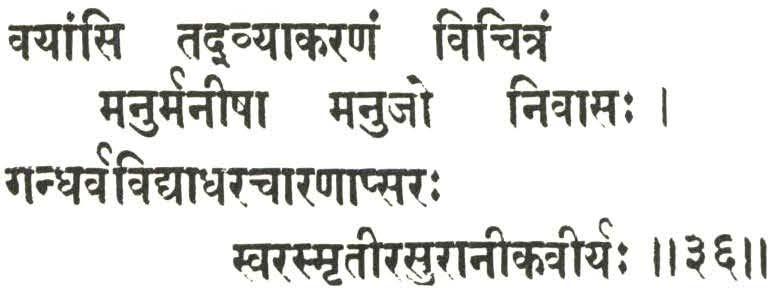
Text 36] The First Step in God Realization
53
Varieties of birds are indications of His masterful artistic sense. Manu: the father of mankind, is the emblem of His standard intelligence, and humanity is His residence. The celestial species of human beings,likethe Gandharvas, Vidyadharas, Cara�as, and angels, all represent His musical rhythm, and the demoniac soldiers are representations of His wonderful prowess.
PURPORT
The aesthetic sense of the Lord is manifested in the artistic, colorful creation of varieties of birds like the peacock, parrot, cuckoo and others. The celestial species of human beings, like the Gandharvas and Vidyadharas, can sing wonderfully and can entice even the minds of the heavenly demigods. Their musical rhythm represents the musical sense of the Lord. How then can He be impersonal? His musical taste, artistic sense and standard intelligence,which is never fallible, are different signs of His Supreme Personality. The Manu-sarhhitii is the standard law book for humanity, and every human being is advised to follow this great hook of social knowledge. The human society is the residential quarters for the Lord-this means the human being is meant for God realization and association with God. This life is a chance for the conditioned soul to regain his eternal God consciousness and thus fulfill the mission of life. Maharaja Prahlada is the right type of the Lord's representative in the family of asuras. None of the living beings is away from the Lord's gigantic body. Each and every one has a particular duty in relation to the supreme body. Disruption in the matter of discharging the specific duty assigned to each and every living being is the cause of disintegration between one living being and another, but when the relation is reestablished in relation with the Supreme Lord, there is complete unity between all living beings, even up to the limit of the wild animals and human society. Lord Caitanya Mahiiprahhu displayed this living unity in the jungle of Madhya Pradesh, where even the tigers, elephants and many other ferocious animals perfectly cooperated in glorifying the Supreme Lord. That is the way to peace and amity all over the world.

54 Srimad-Bhagavatam [Canto 2, Ch. l
TRANSLATION
� f€rn;r;rm: ���\911
brahmiinanam k§atra-bhujo mahiitmii vil) urur anghri.Srita-knra-varywfl niiniibhidhiibhijyagaropapanno dravyiitmakafl karma vitiina-yoga[l

brahma-the briihmaras;iinanam-face; k§atra-the k§atriyas; bhuja[l-the arms; mahiitmii-the viriifa puru§a; vi{-the vaisyas; iirufl-thighs; ahghrisrita -under the protection of his feet; kr§ra-varrafl-lhe sudras; niinii-various; abhidhii-by names; abhijyagara-the demigods; upapanna{t -being overtaken; dravyiitmakafl-with feasible goods; karma-activilics; vitiina-yoga[l -performances of sacrifice.
TRANSLATION
The vira1a puru�a's face is the brahmru;tas, His arms are the �atriyas, His thighs are the vaisyas, and the siidras are under the protection of His feet. All the demigods who are worshipable are also overtaken by Him, and it is the duty of everyone to perform sacrifices with feasible goods to appease the Lord.
PURPORT
Monotheism is practically suggested here. Offering sacrifices to many demigods under different names is mentioned in the Vedic literatures, but the suggestion made in this verse is that all those varieties of demigods are included in the form of the Supreme Personality of Godhead; they are only the parts and parcels of the original whole. Similarly, the divisions of the orders of the human society, namely the briihmaras or the intelligent class, the k§atriyas or the administrators, the vaisyas or the mercantile community and the sudras or the laborer class, are all included in the body of the Supreme. As such, sacrifice by every one of them in terms of pleasing
Text 37) The First Step in God Realization
TEXT 37 ;{� �w �"' rer�wr��:, ��aftqq?j', ���:
55
the Supreme by feasible goods is recommended. Generally, the sacrifice is offered with clarified butter and grains, but with the progress of time, human society has produced varieties of goods by transforming materials supplied by God's material nature. Human society, therefore, must learn to offer sacrifices not only with clarified butter, but also with other manufactured goods in the propagation of the Lord's glory, and that wiU bring about perfection in human society. The intelligent class of men, or briihmar-as, may give direction for such sacrifices in consultation with the previous iiciiryas; the administrators may give all facilities to perform such sacrifices; the vaisya class or mercantile community, who produce such goods, may offer them for sacrifice, and the sudra class may offer their manual labor for the successful termination of such sacrifice; Thus by the cooperation of all classes of human beings, the sacrifice recommended in this age, namely the sacrifice of congregational chanting of the holy name of the Lord, may be executed for the common welfare for all the people of the world.
TEXT 38

�41;{ijjt)��
�: ij�: ��t ��f ij I
'fw{: � Wi �ijtsf�fitif'�ll��II
iyiin asiiv isvara-vigrahasya
ya� sannivesa� kathito mayii te sandhiiryate'smin vapu§i sthavi§the
mana� svabuddhyii na yato'sti kiiicit
iyiin-all these; asau-that; iSvara-Supreme Lord; vigrahasya-of the form; ya�-whatsoever; sannivesa�-as they are located; kathita�-explained; mayii-by me; te-unto you; sandhiiryate-one may concentrate; asmin-in this; vapu§i-form of viriita; sthavi§the-in the gross; mana�mind; svabuddhyii-by one's intelligence; na-not; yata�-beyond Him; asti-there is; kiiicit- anything else.
56 Srimad-Bhagavatam [Canto 2, Ch. l
��s�� qWt �
I have thus explained to you the gross material gigantic conception of the Personality of Godhead. One who seriously desires liberation concentrates his mind on this form of the Lord, because there is nothing more than this in the material world.
PURPORT
In the Bhagavad-gitii, the Supreme Personality of Godhead has verily explained that the material nature is only an order-carrying agent of His (Bg. 9.10). She is one of the different potencies of the Lord, and she acts under His direction only. As the Supreme transcendental Lord, He simply casts a glance over the material principle, and thus agitation of the matter begins, and the resultant actions are manifested one after another by six kinds of gradual differentiations. All material creation is moving in that way, and as such, it so appears and disappears in due course.
Lessintelligentpersons with a poor fund ofknowledge cannotaccommodate the thought of this inconceivable potency of the Lord Sri Kr��a, by which He appearsjust like a human being (Bg. 9.11). His appearance in the material worldasoneofusis also His causeless mercy upon the fallen souls. Although He is transcendental to all material conceptions, still by His unbounded mercy upon His pure devotees, He comes down and manifests Himself as the Personality of Godhead. Materialistic philosophers and scientists are too much engrossed with atomic energy and the gigantic situation of the universal form, and they offer respect more seriously to the external phenomenal feature of material manifestations than to the noumenal principle of spiritual existence. The transcendental form of the Lord is beyond the jurisdiction of such materialistic activities, and it is very difficult to conceive that the Lord can be simultaneously localized andall-pervasive, because the materialistic philosophers and scientists think of everything in terms of their own experience. Because they are unable to accept the personal feature of the Supreme Lord, the Lord is kind enough to demonstrate the virii!a feature of His transcendental form, and herein Srila Sukadeva Gosvami has vividly described this form of the Lord. He concludes there is nothing beyond this gigantic feature of the Lord. None of the materialistic thoughtful men can go beyond this conception of the gigantic form. The minds of the materialistic men are flickering and con-

Text 38] The First Step in God Realization 57 TRANSLATION
stantly changing from one aspect to the other. Therefore, one is advised to think of the Lord by thinking of any part of His gigantic body and by one's intelligence only. One can think of Him in any manifestation of the material world-the forest, the hill, the ocean, the man, the animal, the demigod, the bird, the beast or anything else. Each and every item of the material manifestation entails a part of the body of the gigantic form, and thus the flickering mind can be fixed in the Lord only and nothing else. This process of concentrating on the different bodily parts of the Lord will gradually diminish the demoniac challenge of godlessness and bring about gradual development of devotional service of the Lord. Everything being the part and parcel of the Complete Whole, the neophyte student willgradually realize thehymnsof lsopani§ad which state that the Supreme Lord is everywhere, and thus he will learn the art of not committing any offense on the body of the Lord. This sense of God-mindedness will diminish one's pride of challenging the existence of God. Thus one can learn to show respect to everything, forallthings are the parts and parcels of the supreme body.
TEXT 39

sa saroa-dhi-vrtty-anubhiita-sarva iitmii yathii svapnajanek§itaika� tam satyam iinanda-nidhirh bhajeta niinyatra sajjed yata iitma-piita�
sa�- He, the Supreme Person; saroa-dhi-vrtti-the process of realization by all sorts of intelligence; anubhiita-cognizant; sarve-everyone; iitmiiSupersoul; yathii-as much as; svapnajana-a person dreaming; ik§ita-seen by; eka�-one and the same; tam-unto Him; satyam-Supreme Truth; iinanda-nidhim-the ocean of bliss; bhajeta-must one worship; na-never; anyatra-anything else; sajjet-be attached; yata�-whereby; iitma-piita�degradation of oneself.
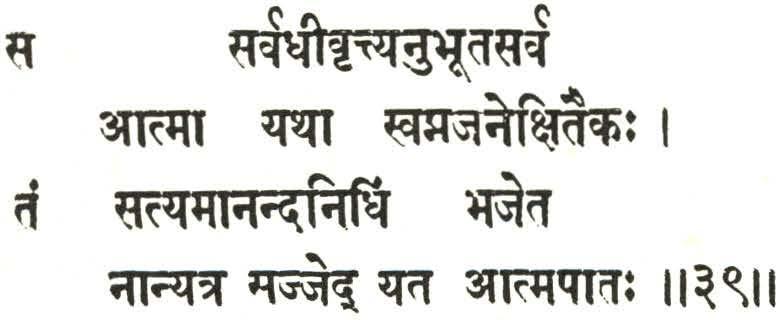
58 Srimad-Bhagavatam [Canto 2, Ch. 1
One should concentrate his mind upon the Supreme Personality of Godhead, who alone is distributed in so many manifestations, as much as ordinary persons create thousands of manifestations in dream. One must concentrate the mind on Him who is the only all-blissful Absolute Truth. Otherwise one will be misled and will cause his own degradation.
PURPORT
In this verse, the process of devotional service is indicated by the great Gosvami, Srila Sukadeva. He tries to impress upon us that instead of diverting our attention to several branches of self-realization, we should concentrate upon the Supreme Personality of Godhead as the supreme object of realization, worship and devotion. Self-realization is, as it were, offering a fight for eternal life against the material struggle for existence, and therefore by the illusory grace of the external energy, the yogi or the devotee is faced with many allurements which can entangle a great fighter again in the bondage of material existence. A yogi can attain miraculous successesinthematterofmaterial achievements, and they are called artimii, laghimii, etc., by which one can become more minute than the minutest or lighter than the lightest, or in the ordinary sense, may achieve material benedictions in the shape of wealth and women. But he is warned against such allurements because to become again entangled in such illusory pleasure means degradation of the self and further imprisonment in the material world. By this warning, one should follow one's vigilant intelligence only.
The Supreme Lord is one, and His expansions are various. He is, therefore,the Supersoul of everything. When a man sees anything, he must know that his seeing is secondary and the Lord's seeing is primary. One cannot see anything without the Lord's having first seen it. That is the instruction of the Vedas and the Upani§ads. So whatever we see or do, the Supersoul of all acts of seeing or doing is the Lord. This theory of simultaneous oneness and difference between the individual soul and the Supersoul is propounded by Lord Sri Caitanya Mahaprabhu as the philosophy of acintya-bhediibhedii-tattva. The virii{a riipa, or the gigantic feature of the Supreme Lord, includes everything materially manifested, and therefore the virii{a or gigantic feature of the Lord is the Supersoul of all livingandnonliving entities. But the viriita riipa is also the manifestation ofNaraya!laor Vi�!lu, and going further on and on one will eventually see

Text 39] The First Step in God Realization 59 TRANSLATION
that Lord Kr��a is the ultimate Supersoul of everything that be. The conclusion is that one should unhesitatingly become a worshiper of Lord Kr��a, or, for that matter, His plenary expansion, Naraya�a, and none else. In the Vedic hymns, it is clearly said that first of all Naraya�a cast a glance over matter and thus there was creation. Before creation, there was neither Brahma nor Siva, and what to speak of others. Sripad Sarikaracarya has definitely accepted this, that Naraya�a is beyond the materialcreation and all others are within the material creation. The whole material creation is, therefore, one and different from Naraya�a, simultaneously, and this supports the philosophy of acintya-bhediibhedii-tattva of Lord Sri Caitanya Mahaprabhu. Being an emanation from the glancing potency of Naraya�a, the whole material creation is nondifferent from Him. But because it is the effect of His external energy (bahiranga-miiyii) and is aloof from the internal potency (iitma-miiyii), the whole material creation is different from Him at the same time. The example given in this verse very nicely is that of the dreaming man. The dreaming man creates many things in the dream, and thus he himself becomes the entangled seer of the dream and is also affected by the consequences. This material creation is also exactly a dream-like creation of the Lord, but He, being the transcendental Supersoul, is neither entangled nor affected by the reactions of such a dream-like creation. He is always in His transcendental position, but essentially He is everything, and nothing is apart from Him. One should therefore concentrate on Him only as His part and parcel without deviation, otherwise one is sure to be overcome by the potencies ofthe material creation, one after another. It is confirmed in the Bhagavadgitii as follows:
sarva-bhiitani kaunteya prakrtirh yiinti miimikiim kalpak§aye punas tiini kalpiidau visrjiimy aham
"0 son of Kunti, at the end of the millennium every material manifestation entersinto My nature, and at the beginning of another millennium, by My potency I again create." (Bg. 9.7)
The human life is, however, an opportunity to get out of this repetition of creation and annihilation. It is a means whereby one may escape the Lord's external potency and ertter into His internal potency.
Thus end the Bhaktivedanta purports of the Second Canto, First Chapter, of the Srimad-Bhagavatam, entitled "The First Step in God Realization."

60 Srimad-Bhagavatam [Canto 2, Ch. l
CHAPTER TWO

The Lord in the Heart 1EXT 1
�mtt-��: II� II
sri suka uviica evam purii dhiirartayiitma-yonir n01tiim smrtim pratyavarudhya tu�tiit tathii sasarjedam amogha-dr�tir yathiipyayiit priig vyavasiiya-buddhil;t
sri: suka� uvaca-Sri Sukadeva Gosvami said; evam-just in the same way; purii-prior tothe manifestation ofthe cosmos; dhiirartayii-by such conception; iitma-yonil;t-of Brahmaji; na�tiim-lost; smrtim- remembrance; pratyavarudhya-by regaining consciousness; tu�tiit- because of appeasing the Lord; tathii-thereafter; sasarjedam-created this material world; amoghadnt*-one who has attained clear vision; yathii-as; apyayiit- created ; priik-as formerly; vyavasaya-ascertained; buddh*-intelligence.


TRANSLATION

Sri Sukadeva Gosvami said: Formerly, prior to the manifestation of the cosmos, Lord Brahma, by meditating on the virata rupa, regained his lost consciousness by appeasing the Lord. Thus he was again able to rebuild the creation as it was before.
PURPORT
The example cited herein of Sri Brahmaji is one of forgetfulness. Brahmaji is the incarnation of one of the mundane attributes of the Lord.
��
���
���·
�s���
�(l_l
61
Being the incarnation of the passion-mode of material nature, he is empowered bythe Lord to generate the beautiful material manifestation. Yet, due to his becoming one of the numerous living entities, he is apt to forget the art of his creative energy. This forgetfulness of the living being-beginning from Brahma down to the lowest insignificant ant-is a tendency which can be counteracted by meditation on the viriifa mpa of the Lord. This chance is available in the human form of life, and if a human being follows the instruction of Srimad-Bhiigavatam and begins to meditate upon the viriifa mpa, then revival of his pure consciousness and counteraction to the tendency of his forgetfulness of his eternal relationship with the Lord can follow simultaneously. And as soon as this forgetfulness is removed, at once the vyavasiiya-buddhi, as it is stated here and in the Bhagavad-gitii (2.41), follows at once. This ascertained knowledge ofthe living being leads to loving service of the Lord, which the living being requires. The kingdom of God is unlimited; therefore the number of the assisting hands of the Lord is also unlimited. The Bhagavad-gitii asserts that the Lord has His hands, legs, eyes and mouths in every nook and corner of His creation (Bg. 13.13). This means that the expansions of differentiated parts and parcels, called jivas or the living entities, are assisting hands of the Lord, and all of them are meant for rendering a particular pattern of service to the Lord. The conditioned soul, even in the position of a Brahmii, forgets this by the influence of illusory material energy generated out of false egoism. Such false egoism can be counteracted by invoking God consciousness. Liberation means getting out of the slumber of forgetfulness and becoming situated in the real loving service of the Lord, as it is exemplified in the case of Brahmii. The service of Brahma is the sample of service in liberation distinguished from the so-called altruistic services full of mistakes and forgetfulness. Liberation is never inaction, but service without human mistakes.

62 Srimad-Bhagavatam [Canto 2, Ch. 2
TEXT 2 �·;a:� ft qJT � � tpsuqfi{Q.J� �: qft-�4(ij?l Wf ��t.t �� 611(1���1 �A: II � II siibdasya hi brahmarta e�a panthii yan niimabhir dhyiiyati dhir apiirtha* paribhramams tatra na vindate 'rthiin miiyiimaye viisanayii sayiinafi.
siibdasya-of the Vedic sound; hi-certainly; brahmar-a�-of the Vedas; e§a�-these;panthii-the way;yat- what is; niimabhi"{l -by different names; dhyiiyati-ponders over, dhily,-intelligence; apiirthai�-by meaningless ideas; paribhraman-wandering; tatra-there; na-never ; vindate-enjoys; arthiinrealities; miiyiimaye-in illusory things; viisanayii-by different desires; sayiina�-as if dreaming in sleep.

TRANSLATION
The way of presentation of the Vedic sounds is so bewildering that the intelligence of the people is directed to meaningless things, like the heavenly kingdoms, etc. The conditioned souls hover in a dream of such heavenly illusory pleasures, but actually they do not relish any tangible happiness in such places.
PURPORT
The conditioned soul is always engaged in laying out plans for happiness within the material world, even up to the end of the universal limit. He is not even satisfied with available amenities within this planet earth, where he has exploited the resources of nature tc the best of his capacity. He wants to go to the moon or the planet Venus to exploit resources there. But the Lord has warned us in the Bhagavad-gitii (Bg. 8.16) about the worthlessness of all the innumerable planets of this universe, as well as those planets within other systems. There are innumerable universes and also innumerable planets in each of them. But none of them is immune to the chief miseries of material existence, namely the pangs of birth, the pangs of death, the pangs of old age and the pangs of disease. The Lord says that even the topmost planet known as the Brahmaloka or Satyaloka (and what to speak of other planets, like the heavenly planets, etc.) is not a happy land for residential purposes due to the presence of material pangs, as above mentioned. Conditioned souls are strictly under the laws of fruitive activities, and as such they go up to Brahmaloka sometimes and again come down to the Patalaloka, as if they were unintelligent children on a merry-go-round. The real happiness is in the kingdom of God, where no one has to undergo the pangs of material existence. Therefore, the Vedic ways of fruitive activities by the living entities are misleading. One thinks of a superior way of life in this country or that, or in this planet or another, but nowhere in the material world can he fulfill his real desire of
Text 2) The Lord in the Heart 63
life, namelyeternal life, full intelligence and complete bliss. Indirectly Srila Sukadeva Gosvami affirms that Maharaja Parik�it, in the last stage of life, should not desire to transfer himself to the so-called heavenly planets, but should prepare himself for going back home, back to Godhead. None of the material planets, nor the amenities available there for living conditions, is everlasting; therefore one must have a factual reluctance to enjoy such temporary happiness as they afford.
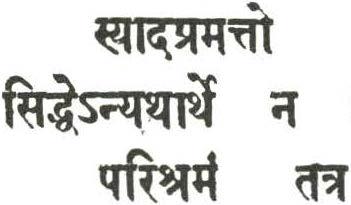
TEXT 3

ata� kavir niimasu yiivad artha� syiid apramatto vyavasiiya-buddh*
siddhe'nyathiirthe na yateta tatra parisramam tatra samik§amarw�
ata�-for this reason; kav*-the enlightened person; niimasu-in the matter of names only; yiivat-minimum; artha�-necessity;syiit-must be; apramatta�-without being mad after them; vyavasiiya-buddhi�- intelligently fixed; siddhe-for success; anyatha-otherwise; arthe-in the interest of;na-should never;yateta-endeavor for;tatra- there;parisramam-laboring hard;tatra-there;samik§amarw�-one who sees practically.
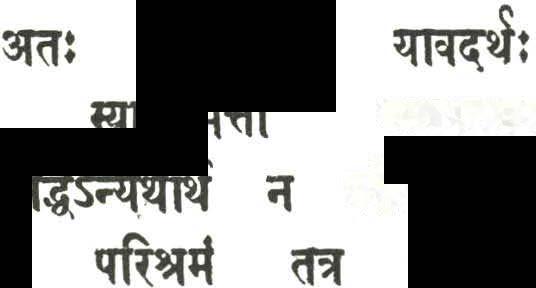
TRANSLATION
For this reason the enlightened person should endeavor only for the minimum necessities of life while in the world of names. He should be intelligently fixed and never endeavor for unwanted things, being competent to perceive practically that all such endeavors are merely laboring hard for nothing.
64 Srimad-Bhagavatam [Canto 2, Ch. 2
�� Oiltt('(itt;fa:: I �� il � � m{�lOT: II � II
The Bhiigavata-dharma or the cult of Srimad-Bhiigavatam is perfectly distinct from the way of fruitive activities, which are considered by the devotees to be merely a waste of time. The whole universe, or for that matter all material existence, is moving on as jagat, simply for planning business to make one's position very comfortable or secure, although everyonesees that this existence is neither comfortable nor secure, nor can it ever become comfortable or secure at any stage of development. Those who are captivated by the illusory advancement of material civilization (following the way of phantasmagoria) are certainly madmen. The whole material creation is a jugglery of names only; in fact, it is nothing but a bewildering creation of matters like earth, water and fire. The buildings, furniture, cars, bungalows, mills, factories, industries, peace, war or even the highest perfection of material science, namely the atomic energy and electronics,areallsimplybewilderingnamesof material elements with their concomitant reactions of the three modes. Since the devotee of the Lord knowsthemperfectlywell, he is not interested in creating unwanted things for a situation which is not at all reality, but simply names of no more significance than the babble of sea waves. The great kings, leaders and soldiers fight with one another in order to perpetuate their names in history. They are forgotten in due course of time, and they make place for another era in history. But the devotee realizes how much history and historical persons are useless products of flickering time. The fruitive worker aspires after a big fortune in the matter of wealth, woman and worldly adoration, but those who are fixed in perfect reality are not at all interested in such false things. For them it is all a waste of time. Since every second of human life is important, an enlightened man should be very careful to utilize time very cautiously. One second of human life wastedin the vain research of planning happiness in the material world can never be replaced, even by spending millions of coins of gold. Therefore, the transcendentalist desiring freedom from the clutches of miiyii, or the illusory activities of life, is warned herewith not to be captivated by the external features of fruitive actors. Human life is never meant for sense gratification, butforself-realization. Srimad-Bhiigavatam instructs us solely on this subject from the very beginning to the end. Human life is simply meant for self-realization. The civilization which aims at this utmost perfection never indulges in creating unwanted things, and such a perfectional civilization prepares men only to accept the bare necessities of life

Text 3] The Lord in the Heart 65
PURPORT
or to follow the principle of the best use of a bad bargain. Our material bodies and our lives in that connection are bad bargains because the living entity is actually spirit, and spiritual advancement of the living entity is absolutely necessary. Human life is intended for the realization of this important factor, and one should act accordingly, accepting only the bare necessities of life and depending more on God's gift without diversion of human energy for any other purpose, such as being mad for material enjoyment. Such materialistic advancement of civilization is called "the civilization of the demons," which ultimately ends in wars and scarcity. The transcendentalist is specifically warned herewith to be fixed in mind, so thateven if thereisdifficultyin plain living and high thinking he will not budge even an inch from his stark determination. For a transcendentalist, it is a suicidal policy to be intimately in touch with the sense-gratifiers of the world, because such a policy will frustrate the ultimate gain of life.
Sukadeva Gosvamimet MaharajaParik�itwhenthe latter felt a necessity for such a meeting. It is the duty of a transcendentalist to help persons who desire real salvation and to support the cause of salvation. One might note that Sukadeva Gosvaminever met MaharajaParik�it while he was ruling as a great king. For a transcendentalist, the mode of activities is explained in the next sloka.
TEXT 4

�ftRtfttfiftrqt:wOOifiit ��fu:{ !qqt.q: � I tt?tt�e1 � �1'14rst�t
ft:•���el�l� ft w: II \? II
satyiim k§itau kim kasipol:t prayiisair biihau svasiddhe hy upabarhar-ail:t kim saty aiijalau kim purudhiinna-piitryii dig-valkaliidau· sati kim dukiilail:t
satyiim-being in possession; k�itau-earthly flats; kim-where is the necessity; kaSipol:t-of bed and cots; prayiisail:t-endeavoring for; biihauthe arms; svasiddhe-being self-sufficient;hi-certainly; upabarhar-ail:t-bed and bedstead; kim-what is the use;sati-being present; aiijalau-the palms
66 Srimad-Bhagavatam [Canto 2, Ch. 2
of the hands; kim-what is the use;pumdha-varieties of; anna-eatables; piitryii-by the utensils;dik-open space; valkala-iidau-skins of trees; satibeing existent;kim-what is the use of;dukulai[l,-clothes.

TRANSLATION
When there are ample earthly flats to lie on, then what is the necessity of cots and beds? When one can use his own arms, what is the necessity of a pillow? When one can use the palms of his hands, then what is the necessity of varieties of utensils? When there is ample covering, or the skins of trees, then what is the necessity of clothing?
PURPORT
The necessities of life for the protection of the body, etc., must not be unnecessarily increased. Human energy is spoiled in a vain search after such illusory happiness. If one is able to lie down on the floor, then why should one endeavor to get a good bedstead or soft cushion to lie on? If one can rest without any pillow and make use of the soft arms endowed by nature, there is no necessity of searching after a pillow. If we make a study of the general life of the animals, we can see that they have no intelligence to build big houses, furniture, a.'ld other household paraphernalia, and yet theymaintain a healthylife by lying down on the open land. They do not know how to cook or prepare foodstuff, yet they still live healthy lives more easily than the human being. This does not mean that human civilization should revert to animal life nor that the human being should live naked in the jungles without any culture, education, and sense of morality. An intelligent human cannot live the life of an animal; rather, man should try to utilize his intelligence in arts and science, poetry and philosophy. In such a way he can further the progressive march of human civilization. But here the idea given by Snl.a Sukadeva Gosvami is that the reserve energy of human life, far superior to that of animals, should simply be utilized for self-realization. Advancement of human civilization must be towards the goal of establishing our lost relationship with God, which is not possible in any form of life other than the human. One must realize the nullity of the material phenomenon, considering it a passing phantasmagoria, and must endeavor tomakea solution to the miseries of life. Self-complacence with a polished type of animal civilization geared to sense gratification is deluswn, and
Text 4] The Lord in the Heart 67
such a "civilization" is not worthy of the name. In pursuit of such false activities, a human being is in the clutches of miiyii, or illusion. Great sages and saints in the days of yore were not living in palatial buildings furnished with good furniture and so-called amenities of life. They used to live in huts and groves and sit on the flat ground, and yet they have left immense treasures of high knowledge with all perfection. Srila Ri:ipa Gosvami and Srila Saniitana Gosvami were high-ranking ministers of state, but they were able to leave behind them immense writings on transcendental knowledge, while residing only for one night underneath one tree. They did not live even two nights under the same tree, and what to speak of well-furnished rooms with modern amenities. And still they were able to give us most important literatures of self-realization. So-called comforts of life are not actually helpful for progressive civilization; rather, they are detrimental to such progressive life. In the system of saniitana-dharma of four divisions of social life and four orders of progressive realization, there are ample opportunities and sufficient directions for a happy termination of theprogressive life, and the sincere followers are advised there to accept a voluntary life of renunciation in order to achieve the desired goal of life. If one is not accustomed to abide by the life of renunciation and selfabnegation from the beginning, one should try to get into the habit at a later stage of life as recommended by Srila Sukadeva Gosvami, and that will help one to achieve the desired success.
TEXT 5

�IJf'*qf?.r ;{ ���flWf
��nf�t: �: IDm�� I
qJ �: �� •t')q(hU"{
� �f� cmtft '"l��� II'-\ II
ciriirti kim pathi na santi diSanti bhik§iirh naiviinghripii� parabhrta� sarito 'py asu§yan ruddhii guhii� hm ajito 'vati nopasanniin kasmiid bhajanti kavayo dhana-durmadiindhiin
ciriiri-torn clothes; kim-whether; pathi-on the road; na- not; santithere is; diSanti-give in charity; bhik§iim-alms; na-not; eva-also; anghri-
68 Srimad-Bhagavatam [Canto 2, Ch- 2
pii�-the trees; parabhrta�-one who maintains others; sarita�-the rivers; api-also; asu§yan-have dried up; ruddhii�-closed; guhii�-caves; kimwhether; ajita�-the Almighty Lord; avati-give protection; na-not; upasanniin-the surrendered soul; kasmiit-what for then; bhajanti-flatters ; kavaya�-the learned; dhana- wealth; dur-mada-andhiin-too intoxicated by.
TRANSLATION

Are there no torn clothes lying on the common road? Do the trees, which exist for maintaining others, no longer give alms in charity? Do the rivers, being dried up, no longer supply water to the thirsty? Are the caves of the mountains now closed, or, above all, does the Almighty Lord not protect the fully surrendered souls? Why then do the learned sages go to flatter those who are intoxicated by hard-earned wealth?
PURPORT
The renounced order of life is never meant for begging nor living at the cost of others as a parasite. According to the dictionary, a parasite is a sycophant wholives at the costof society without making any contribution to that society. The renounced order is meant for contributing something substantial to the society and not depending on the earnings of the householders. On the contrary, acceptance of alms from the householders by the bona fide mendicant is an opportunity afforded by the saint for tangible benefit of the donor. In the saniitana-dharma institution, almsgiving to the mendicant is part of a householder's duty, and it is advised in the scriptures that the householders should treat the mendicants as their family children and should provide them with food, clothing, etc., without being asked. Pseudo-mendicants, therefore, should not take advantage of the charitable disposition of the faithful householders. The first duty of a person in the renounced order of life is to contribute some literary work for the benefit of the human being in order to give him realized direction toward self-realization. Amongst the other duties in the renounced order of life of Srila Sanatana, Snia Riipa and the other Gosvamis of Vrndavana, the foremost duty discharged by them was to hold learned discourses amongst themselves at Sevakuiija Vrndavana (the spot where Sri Radha-Damodara Temple was established by Srila Jiva Gosvami and where the actual samadhi tombs of Snia Riipa Gosvami and Snia Jiva Gosvami are laid). For the benefit of all in human society, they
Text 5) The Lord in the Heart 69
left behind them immense literatures of transcendental importance. Similarly, all the iiciiryas who voluntarily accepted the renounced order of life aimed at benefiting the human society and not at living a comfortable or irresponsible life at the cost of others. However, those who cannot give any contribution should not go to the householders for food, for such mendicantsasking bread from the householders are an insult to the highest order. Sukadeva Gosvami gave this warningespecially for those mendicants who adopt this line of profession to solve their economic problems. Such mendicants are in abundance in the age of Kali. When a man becomes a mendicant willfully or by circumstances, he must be of firm faith and conviction that the Supreme Lord is the maintainer of all living beings everywhere in the universe. Why, then, would He neglect the maintenance of a surrendered soul who is cent percent engaged in the service of the Lord? A common master looks to the necessities of his servant, so how much more would the all-powerful, all-opulent Supreme Lord look after the necessities of life for a fully surrendered soul. The general rule is that a mendicant devotee will accept a simple small loincloth without asking anyone to give it in charity. He simply salvages it from the rejected torn cloth thrown in thestreet. When he is hungry he may go to a magnanimous tree which drops fruits, and when he is thirsty he may drink water from the flowing river. He does not require to live in a comfortable house, but should find out a cave in the hills and may not be afraid of jungle animals, keeping faith in God, who lives in everyone's heart. The Lord may dictate to tigers and other jungle animals not to disturb His devotee. Haridas Thakur, a great devotee of Lord SriCaitanya, used to live in such a cave, and by chance a great venomous snake also was a copartner of the cave. Some admirer of Thakur Haridas, who had to visit the Thakur every day, feared the snake and gave a suggestion to the Thakur to leave that place. Because his devotees were afraid of the snake and they were regularly visiting the cave, Thakur Haridas agreed to the proposal on their account. But as soon as this was settled, the snake actually crawled out of its hole in the cave and left the cave for good before everyone present. By the dictation of the Lord, who lives also within the heart of the snake, the snake gave preference to Haridas and decided to leave the place and not disturb him. So this is a tangible example of how the Lord gives protection to a bona fide devotee like Thakur Haridas. According to the regulations of the saniitana-dharma institution, one is trained from the beginning to depend fully on the protection of the Lord in all circumstances. The path of renunciation is recommended for acceptance by one who is fully accomplished and fully purified in one's existence. This stage is described

70 Srimad-Bhagavatam [Canto 2, Ch. 2
also in the Bhagavad-gitii as daivi sampad (Bg. 16.5). A human being is required to accumulate daivi sampad, or spiritual assets; otherwise, the next alternative, iisuri sampad, or material assets, will overcome him disproportionately, and thus one will be forced into the entanglement of different miseries of the material world. A sannyiisi should alwayslive alone without company, and he must be fearless. He should never be afraid of living alone, although he is never alone. The Lord is residing in everyone's heart, and unless one is purified by the prescribed process, one will feel that he is alone. But a man in the renounced order of life must be purified by the process; thus he will feel the presence of the Lord everywhere and will have nothing to fear (such as being without any company). Everyone can become a fearless and honest person if his very existence is purified by discharging the prescribed duty for each and every order of life. One can become fixed in one's prescribed duty by faithful aural reception of Vedic instructions and assimilation of the essence of Vedic knowledge by devotional service of the Lord. TEXT

evam svacitte svata eva siddha
iitmii priyo'rtho bhagaviin ananta� tarh nirvrto niyatiirtho bhajeta
samsiira-hetiiparamas ca yatra
evam-thus; svacitte-in one's own heart; svata�-by His omnipotency; eva-certainly; siddha�-fully represented; iitmii-the Supersoul; priya�very dear; artha[l.-substance; bhagaviin-the Supreme Personality of Godhead; ananta�-the eternal unlimited; tam-unto Him; nirvrtah-being detached from the world; niyata-permanent; artha�-the supreme gain; bhajeta-one must worship; samsiira-hetu-the cause of the conditioned state of existence; uparama�-cessation; ca-certainly; yatra-in which.
Text 6] The Lord in the Heart 71
��: I � r..#t f.t4iji¥il �
II� II
6 ����fiq: � fWiTs�
d�u<«_�(+t� �
TRANSLATION
Thus being fixed, one must render service unto the Supersoul situated in one's own heart by His omnipotency. Because He is the Almighty Personality of Godhead, eternal and unlimited, He is the ultimate goal of life, and by worshiping Him one can end the cause of the conditioned state of existence.
PURPORT
The Supreme Personality of Godhead Sri Kr��a, as it is confirmedinthe Bhagavad-gitii (Bg. 18.61), is the all-pervading omnipresent Supersoul. Therefore one who is a yofi can only worship Him because He is the substance and not illusion. Every living creature is engaging in the service of something else. A living being's constitutional position is to render service, but in the atmosphere of miiyii, or illusion, or the conditional state of existence, the conditioned soul seeks the service of illusion. A conditioned soul works in the service of his temporary body, bodily relatives like the wife and children, and the necessary paraphernalia for maintaining the body and bodily relations, namely the house, land, wealth, society, country, etc., but he does not know that all such renderings of service are totally illusory. As we have discussed many times before, this material world is itself an illusion, like the mirage in the desert. In the desert there is an illusion of water, and the foolish animals become entrapped by such illusion and run after water in the desert, although there is no water at all. But because there is no water in the desert, one does not conclude that there is no water at all. The intelligent person knows well that there is certainly water, water in the seas and oceans, but such vast reservoirsof water are far, far awayfrom the desert. One should therefore search for water in the vicinity of seas and oceans and not in the desert. Every one of us is searching after real happiness in life, namely eternal life, eternal or unlimited knowledge and unending blissful life. But foolish people who have no knowledge of the substance search after the reality of life in the illusion. This material body does not endure eternally, and everything in relation with this temporary body, namely the wife, children, society, country, etc., also changes along with the change of body. This is called samsiira or repetition of birth, death, old age and disease. We would like to find a solution for all theseproblems oflife, but wedo notknowtheway. Hereinit issuggestedthat anyonewho

72 Srimad-Bhagavatam [Canto 2, Ch. 2
wants to make an end of these miseries of life, namely repetition of birth, death, disease, and old age, must take to this process of worshiping the Supreme Lord and not others, as it is also ultimately suggested in the Bhagavad-gitii (Bg. 18.65). If we at all want to end the cause of our con· ditioned life, we must take to the worship of Lord Sri Kr�tJ.a, who is present in everyone's heart by His natural affection for all living beings, who are actually the parts and parcels of the Lord (Bg. 18.61). The baby in the lap of his mother is naturally attached to the mother, and the mother is attached to the child. But when the child grows up and becomes overwhelmed by circumstances, he gradually becomes detached from the mother, but the mother always expects some sort of service from the grown·up child, and she is equally affectionate for her child, even though the child is forgetful. Similarly, because we are all part and parcel of the Lord, the Lord is always affectionate to us, and He always tries to get us back home and back to Godhead. But we, the conditioned souls, do not care for Him and run instead after the illusory bodily connections. We must therefore extricate ourselves from all illusory connections of the world and seek reunion with the Lord, trying to render service unto Him because He is the ultimate truth. Actually we are hankering after Him as the child seeks the mother. And to search out the Supreme Personality of Godhead, we need not go anywhere else, because the Lord is within our hearts. This does not, however, suggest that we should not go to the places of worship, namely the temples, churches and mosques. Such holy places of worship are also occupied by the Lord because the Lord is omnipresent. For the common man these holy places are centers of learning about the scienceof God. When the temples are devoid of activities, the people in general become disinterested in such places, and consequently the mass of people gradually become godless, and a godless civilization is the result. Such a hellish civilization increases artificially the conditions of life, and existence becomes intolerable for everyone. The foolish leaders of a godless civilization try to devise various plans to bring about peace and prosperity in the godless world under a patent trademark of materialism, and because such attempts are illusory only, the people elect incompetent, blind leaders one after another who are incapable of offering solutions. If we want at all to end this anomaly of a godless civilization, we must follow the principles of revealed scriptures like the Srimad-Bhiigavatam and follow the instruction of a person like Sri Sukadeva Gosvami who has no attraction for material gain.

Text 6] The Lord in the Heart 73
kas tiirh tv aniidrtya pariinucintiim rte pasiin asatirh niima kuryiit pasyaii janarh patitarh vaitararyarh sva-karma-jiin paritiipiiii ju§iiram
ka�-who else; tiim-that; tu-out; aniidrtya-by neglecting; pariinucintiim-transcendental thoughts; rte-without; pa8iin-the materialists; asatim-in the nonpermanent; niima-name; kuryiit-will adopt; pa8yanseeing definitely; janam-the general mass of people; patitam-fallen; vaitarary�m-in Vaitara!li, the river of suffering; sva-karma-jiin-produced from one's own work;paritiipiin-suffering;ju§ii[lam-being overtaken by.


TRANSLATION
Who else but the gross materialists will neglect such transcendental thought and take to the nonpermanent names only, seeing the mass of people fallen in the river of suffering as the consequence of accruing the result of their own work?
PURPORT
In the Vedas it is said that persons who are attachedto demigods to the exclusion of the Supreme Personality of Godheadare like the animals who follow the herdsman even though they are taken to the slaughterhouse. The materialists, like animals, also do not know how they are being misdirected by neglecting the transcendentalthoughtof the Supreme Person. No one canremain vacant of thought. It is saidthat an idle brain is adevil's workshop because a person who cannot thinkin the right waymust think of something which may bring about disaster. The materialists are always worshiping some minor demigods, although this is condemned in the Bhagavad-gitii (Bg. 7.20). As long as a person is illusioned by material

74 Srimad-Bhagavatam
� �;mm ;m� ;:��rq_ . . � .
;r�o� ��ilil'{ 'lftm'n�'tlat�
"'J
TEXT 7 m �� rromVffl
q'��;r
II \9 II
[Canto 2, Ch. 2
gains, he petitions the respective demigods to draw some particular benefit which is, after all, illusory and nonpermanent. The enlightened transcendentalist is not captivated by such illusory things; therefore he is always absorbed in the transcendental thought of the Supreme in different stages of realization, namely Brahman, Paramatma and Bhagavan. In theprevious verse it is suggested that one should think of the Supersoul, which is one step higher than the impersonal thought of Brahman, as it was suggested in the case of contemplating the viriita riipa of the Personality of Godhead. Intelligent persons who can see properly may look into the general conditions of the living entities who are wandering in the cycle of the 8,400,000 species of life, as well as in different classes of human beings. It is said that there is an everlasting belt of water called the River Vaitara�i at the entrance of the plutonic planet of Yamaraja, who punishes sinners in different manners. After being subjected to such sufferings, a sinner is awarded a particular species of life according to his deeds in the past. Such livingentities as are punished by the Yamaraja are seen in different varieties of conditioned life. Some of them are in heaven, and some of them are in hell. Some of them are briihmarws, and some of them are misers. But no one is happy in this material world, and all of them are either class A., B. or C. prisoners suffering because of their own deeds. The Lord is impartial to all circumstances of sufferings of the living entities, but to one who takes shelter at His lotus feet, the Lord gives proper protection, and He takes such a living entity again back home, back to Himself.
TEXT 8

kecit sva-dehiintar-hrdayiivakii.Se priidesa-miitram puru§arh vasantam catur-bhujam kafija-rathiinga-sankhagadiidharam dhiira[layii smaranti
kec it- others; sva-deha-antar-within the body; hrdaya-avakiise-in the region of the heart; priidesa-miitram-only measured by eight inches;
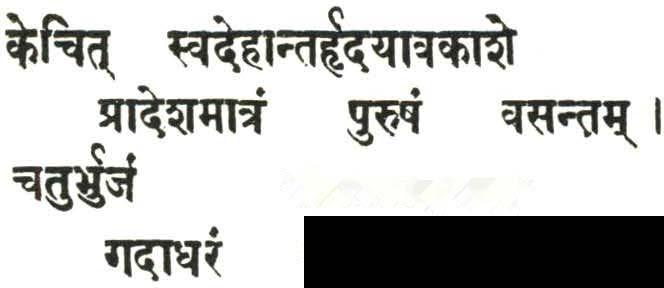
Text 8] The Lord in the Heart 75
"-ti��lfll�� ��11�11
puru§am-the Personality of Godhead; vasantam-residing; catu�-bhujamwith four hands; kafija-lotus; ratha-a�iga-the wheel of a chariot; sankhaconchshell; gadii-dharam-and with a club in the hand; dhiirar-ayii-conceiving in that way; smaranti-do meditate upon Him.
TRANSLATION
Others conceive of the Personality of Godhead residing within the body in the region of the. heart and measured only by eight inches, with four hands carrying a lotus, a wheel of a chariot, a conchshell and a club respectively.
PURPORT
The all-pervading Personality of Godhead resides as Paramatma in the heart of each and every living entity. The measurement of the localized Personality of Godhead is estimated to expand from the ring finger to the end of the thumb, more or less eight inches. The form of the Lord described in this verse with distribution of different symbols-beginning from the lower right hand up and down to the lower left hand with lotus, wheel of a chariot, conchshell and club respectively-is called J anardana, or the plenary portion of the Lord that controls over the general mass. There are many other forms of the Lord with varied situations of the symbols of lotus, conchshell, etc., and they are differently known as Puru�ottama, Acyuta, Narasimha, Trivikrama, Hr�ike8a, Kesava, Madhava, Aniruddha, Pradyumna, Sankar�a�a, Sridhara, Vasudeva, Diimodara, J aniirdana, Naraya�a, Hari, Padmanabha, Vamana, Madhusiidana, Govinda, Kr��a, Vi��umiirti, Adhok�aja and Upendra. Such twenty-four forms of the localized Personality of Godhead are worshiped in different parts of the planetary system, and in each of them there is an incarnation of the Lord having a different Vaiku�tha planet in the spiritual sky, which is called the Paravyoma. There are many other hundreds and scores of different forms of the Lord, and each and every one of them has a particular planet in the spiritual sky, of which this material sky is only a fragmental offshoot. The Lord exists as puru§a, or the male enjoyer, although there is no comparing Him to any male form in the material world. But all such forms, advaita, are nondifferent from one another, and each of them is eternally young. The young Lord with four hands is nicely decorated, as described below.

76 Srimad-Bhagavatam [Canto 2, Ch. 2
TEXT 9

Sf�hNfl ;{fe�lii�oi �<!�ftl������I
�rnm�Oltll\S� 11�11
prasanna-vaktram naliniiyate k§ar-am
kadamba-kiiijalka-piswiga-viisasam lasanmahiiratna-hirar-mayiingadarh
sphuranmahiiratna-kirita-kur!Ialam
prasanna-expresses happiness; vaktram- mouth; nalina-iiyata-spread like the petals of a lotus; ik§ar-am-eyes; kadamba-kadamba flower; kiiijalka- saffron; piswiga-yellow; viisasam- garments; lasan- hanging; mahiiratna-valuable jewels; hirar-maya-made of gold; arigadam- ornament; sphuran-glowing; mahiiratna-valuable jewels ; kinta- headdress; kur-!ialam-earrings.


TRANSLATION
His mouth expresses His happiness. His eyes are spread like the petals of a lotus, and His garments are yellowish like the saffron of a kadamba flower and bedecked with valuable jewels. His ornaments are all made of gold, set with jewels, and He wears a glowing headdress and earrings. TEXT
Text 10) The Lord in the Heart
,.. .
�R{lfl�0fl�l'fi•i!>
77
�fostM;c:q�lj(�� tftif�(lqIG\q�q'f_ ��ijUf �����""Rfl��TSsl� II�oil
10
unnidra-hrt-pankaja-kaf"!likiilaye
yogesvariisthiipita-piida-pallavam
sri-lak§aram kaustubha-ratna-kandharam
amliina-lak§myii vana-miilayiicitam
unnidra-blooming; hrt-heart; pankaja-1otus flower; kaf"!likii-iilaye-on the surface of the whorl; yogesvara-the great mystics; iisthiipita-placed; piida-pallavam-lotus feet; sri-goddess of fortune, or a beautiful calf; lak§ar-am-marked in that way; kaustubha-Kaustubha jewel; ratna-other jewels ;kandharam-on the shoulder; amliina-quite fresh; lak�mya-beauty; vana-miilayii-by a flower garland; iic itam- spread over.
TRANSLATION
His lotus feet are placed over the whorl of the lotus-like hearts of great mystics. On His chest there is the Kaustubhajewel engraved with a beautiful calf, and there are other jewels on His shoulders, and the complete torso is garlanded with fresh flowers.
PURPORT
The ornaments, flowers, clothings and all other decorations on the transcendental body of the Personality of Godhead are identical with the body of the Lord. None of them are made of material ingredients, otherwise there is no chance of their decorating the body of the Lord. As such, in the Paravyoma, spiritual varieties are also distinguished from the material variegatedness.
TEXT

vibhii§itam mekhalayiinguliyakair
mahiidhanair niipura-kankar-adibhily, snigdhiimalii-kuiicita-nlla-kuntalair
virocamiiniinana-hiisa-pesalam
78
Srimad-Bhagavatam
[Canto 2, Ch. 2
ll
iRci���Woi�otm:fu: �Ttf��t��
II��II
�Aij
�¥tl�l��iii('tq��
vibhil§itam-well decorated; mekhalayii-with an ornamental wreath about the waist; miguliyakai�-by finger rings; mahiidhanai�-all highly valuable; nupura-ringing leglet; karikap,a-iidibh*-also by bangles; snigdha -greasy; amalii-spotless; kuiicita-curling; nila-bluish; kuntala*-hair; virocamiina-very pleasing; iinana-face; hiisa-smile; pesalam-beautiful.

TRANSLATION
He is well decorated with an ornamental wreath about His waist and rings on His fingers studded with valuablejewels. His leglet, bangles, oiled hair curling with bluish tint, and His beautiful smiling face are all very pleasing.
PURPORT
The Supreme Personality of Godhead is the most beautiful person amongst all others, and Snla Sukadeva Gosvami describes every part of His transcendental beauty, one after another, in order to teach the impersonalist that the Personality of Godhead is not an imagination by the devotee for facility of worship, but that He is the Supreme Person in fact and figure. The impersonal feature of the Absolute Truth is but His radiation, as the sun rays are but radiations from the sun.
TEXT

lil"'������ I (iJ"ij M;o{11+ttt���t
ttl�,.+titl �IJ141o:tRte�II��II
adina-lilii-hasitek§a!lollasad
bhm-bhariga-sarhsucita-bhury-anugraham
ik§eta cintiimayam enam isvararh
yiivan mano dhiira!layiivati§thate
adina-very magnanimous; lila-pastimes; hasita-smiling ; ik§a!la-by glancing over; ullasat-glowing; bhm-bhariga-signals of the eyebrow; sarhsiicita-indicated; bhuri-extensive; anugraham-benediction; ik§eta-
Text 12] The Lord in the Heart 79
��zm:�
12
one must concentrate on; cintamayam-transcendental; enam-this particular; isvaram-the Supreme Lord; yavat-as long as; mana�-the mind; dhiirar wya-by meditation; avat4thate-can be fixed on.
TRANSLATION
The Lord's magnanimous pastimes and the glowing glancing of His smiling face are all indications of His extensive benedictions. One must therefore concentrate on this transcendental form of the Lord, as long as the mind can be fixed on Him by meditation.
PURPORT

In the Bhagavad-gita (Bg. 12-5) it is said that the impersonalist undergoes a series of difficult programs on account of his impersonal meditation. But the devotee, due to the Lord's personal service, gets through very easilyImpersonal meditation is therefore a source of suffering for the impersonalist. Here, the devotee has an advantage over the impersonalist philosopher. The impersonalist is doubtful about the personal feature of the Lord, and therefore he always tries to meditate upon something which is not objective- For this reason there is an authentic statement in the Bhiigavatam regarding the positive concentration of the mind on the factual form of the Lord_
The process of meditation recommended herein is bhakti-yoga, or the process of devotional service after being liberated from the material conditions. ]niina-yoga is the process of liberation from the material conditions. After one is liberated from the conditions of material existence, i.e., when one is nivrtta, as previously stated herein, or when one is freed from all material necessities, one becomes qualified to discharge the process of bhakti-yoga. Therefore bhakti-yoga includes jiiana-yoga, or, in other words, the process of pure devotional service simultaneously serves the purpose ofjiiana-yoga; liberation from material conditions is automatically achieved by the gradual development of pure devotional service. These effects of bhakti-yoga are called anartha-nivrtti. Things which are artificially acquired gradually disappear along with the progress of bhakti-yoga. Meditation on the lotus feet of the Personality of Godhead, the first processional step, must show its effect by anartha-nivrtti. The grossest type of anartha which binds the conditioned soul in the material existence is sex desire, and this sex desire gradually develops in the union of the male and
80 Srimad-Bhagavatam [Canto 2, Ch. 2
female. When the male and female become united, the sex desire is further aggravated by the accumulation of buildings, children, friends, relatives, and wealth. When all these are acquired, the conditioned soul becomes overwhelmed with such entanglements, and the false sense of egoism, or the sense of myself and mine, becomes prominent, and the sex desire expands to various political, social, altruistic, philanthropical, and many other unwanted engagements, which are all like the foam of the sea waves which becomes very prominent at one time and the next moment vanishes as quickly as a cloud in the sky. The conditioned soul is encircled by such products, as well as products of sex desire, and therefore bhakti-yoga leads to gradual evaporation of the sex desire, which is summarized in three headings, namely profit, adoration, and distinction. All conditioned souls are mad after these different forms of sex desires, and one shall see himself how much he has been freed from such material hankerings based primarily on the sex desire. As a person feels his hunger satisfied after eatingeach morsel of foodstuff, he must similarly be able to see the degree to which he has been freed from sex desire. The sex desire is diminished along with its various forms by the process of bhakti-yoga because bhakti-yoga automatically, by the grace of the Lord, effectively results in knowledgeandrenunciation, even if the devotee is not materially very well educated. Knowledge means to know things as they are, and if by deliberation it is found that there are things which are at all unnecessary, naturally theperson who has acquired knowledge leaves aside such unwanted things. When the conditioned soul finds by culture of knowledge that material necessities are unwanted things, he becomes detached from such unwanted things. This stage of knowledge is called vairiigya, or detachment from unwanted things. We have previously discussed that the transcendentalist is required to be self-sufficient and should not beg from the rich blind persons to fulfill the bare necessities of life. Sukadeva Gosvami has suggested some alternatives for the bare necessities of life, namely the problem of eating, sleeping and sheltering, but he has not suggested any alternative for sex satisfaction. One who has the sex desire still with him shouldnotatalltry to accept the renounced order of life. For one who has not attainedto this stage, there is no question of a renounced order of life. So by gradual process of devotional service under the guidance of a proper spiritual master, and following the principles of the Bhiigavatam, one must be able at least to control the gross sex desire before one accepts the renounced order of life factually.
So purification means getting free gradually from sex desire, and this is attained by meditation on the person of the Lord as described herein,

Text 12] The Lord in the Heart 81
beginning from the feet. One should not try to go upwards artificially without seeing for himself how much he has been released from the sex desire. The smiling face of the Lord is the Tenth Canto of SrimadBhiigavatam, and there are many upstarts who at once try to begin with the Tenth Canto and especially with the five chapters which delineate the rasa-lila of the Lord. This is certainly improper. By such improper study or hearing of Bhiigavatam, the material opportunists have played havoc by indulgence of sex life in the name of Bhiigavatam. This vilification of Bhiigavatam isrendered by the acts of the so-called devotees;one should be free from all kinds of sex desire before he tries to make a show of recital of Bhiigavatam. SriVisvanatha CakravartiThakur clearly defines the import of purification as cessation from sex indulgence. He says "yathii yathii dhis ca sudhyati vi§aya-liimpatyarh tyajati tathii tathii dhiirayed iti cittasuddha-tiiratamyenaiva dhyiina-tiiratamyam." And as one gets free from the intoxication of sex indulgence by purification of intelligence, one shouldstepforwardfor thenextmeditation,or in other words, the progress of meditation on the different limbs of the transcendental body of the Lord should be enhanced in proportion to the progress of purification of the heart. The conclusion is that those who are still entrapped by sex indulgence should never progress to meditation above the feet of the Lord; thereforerecital of Srimad-Bhiigavatam by them should be restricted within the First and Second Cantos of the great literature. The purificatory process must be completed by assimilating the contents of the first nine cantos. Then one should be admitted into the realm of the Tenth Canto of Srimad-Bhiigavatam.

82 Srimad-Bhagavatam [Canto 2, Ch. 2
TEXT 13 %�n�n;r �i«r. '00� �ft.Rf �: I m m �'"'¥tqli!l � q�q� ��fu �?.ff � II��II ekaikaso 'ngiini dhiyiinubhiivayet piidiidi yiivadd hasitarh gadii-bhrta� jitarh jitarh sthiinam apohya dhiirayet pararh pararh suddhyati dhir yathii yathii
ekaikasa[t-one to one, or one after another; migani-limbs; dhiya-by attention; anubhavayet-meditate upon; pada-adi-legs, etc.; yavat-until; hasitam-smiling; gada-bhrta[t-the Personality of Godhead; jitarit jitamgraduallycontrollingthemind;sthanam-place;apohya-leaving;dharayetmeditate upon; pararit param-higher and higher; suddhyati-purified; dhill-intelligence; yatha yatha-as much as.
TRANSLATION

The process of meditation should begin from the lotus feet of the Lord and progress to His smiling face. The meditation should be concentrated upon the lotusfeet, then the calves, then the thighs, and in this way higher and higher. The more the mind becomes fixed upon the different parts of the limbs, one after another, the more the intelligence becomes purified.
PURPORT
The process of meditation recommended in the Srimad-Bhagavatam is not to fix one's attention on something impersonal or void. The meditation should concentrate on the Person of the Supreme Godhead, either in His virata riipa, the gigantic universal form, or in His sac-cid-anandavigraha, as described in the scriptures. There are authorized descriptions of Vi�!lu forms, and there are authorizedrepresentations of Deities in the temples. Thus one can practice meditating upon the Deity, concentrating his mind on the lotus feet of the Lord and gradually rising higher and higher, up to His smiling face.
According to the Bhagavata school, the Lord's rasa dancing is the smiling face of the Lord. Since it is recommended in this verse that one should gradually progress from the lotus feet up to the smiling face, we shallnotjumpat once to understand the Lord's pastimes in the rasa dance. Itisbetter to practice to concentrate our attention by offering flowers and tulasi to the lotus feet of the Lord. In this way, we gradually become purified by the arcana process. We dress the Lord, bathe Him, etc., and all these transcendental activities help us purify our existence. When we reach the higher standard of purification, if we see the smiling face of the Lord or hear the rasa dance pastimes of the Lord, then we can relish His activities. In the Srimad-Bhiigavatam, therefore, the riisa dance pastimes are delineated in the Tenth Canto (Chapters 29-34).
Text 13] The Lord in the Heart 83
The more one concentrates on the transcendental form of the Lord, either on the lotus feet, the calves, the thighs or the chest, the more one becomespurified. In thisverse it is clearly stated, "the more the intelligence becomes purified," which means the more one becomes detached from sense gratification. Our intelligence in the present conditioned state of life is impure due to being engaged in sense gratification. The result of meditation on the transcendental form of the Lord will be manifested by one's detachment from sense gratification. Therefore, the ultimate purpose of meditation is purification of one's intelligence.
Those who are too engrossed in sense gratification cannot be allowed to participate in arcanii or to touch the transcendental form of the RadhaKr��a or Vi��u Deities. For them it is better to meditate upon the gigantic virii{a rupa of the Lord, as is recommended in the next verse. The impersonalists and the voidests are therefore recommended to meditate upon the universal form of the Lord, whereas the devotees are recommended to meditate on the Deity worship in the temple. Because the impersonalists and the voidists are not sufficiently purified in their spiritual activities, arcanii is not meant for them.
TEXT 14 qm{

yiivan na jiiyeta pariivare ,smin visvesvare draHari bhakti-yoga�
tiivat sthaviya� puru§asya riipam kriyiivasiine prayata� smareta
yiivat-as long as; na-does not; jiiyeta-develop; para-transcendental; avare-mundane; asmin-in this form of; viSvesvare-the Lord of all worlds; dra§tari-unto the seer; bhak ti-yoga�-devotional service; tiivat-so long; sthaviya�-the gross materialist; puru§asya-of the viriita puru§a; riipamuniversal form; kriyii-avasiine-at the end of one's prescribed duties; prayata{l-with proper attention; smareta-one should remember.
84 Srimad-Bhagavatam [Canto 2, Ch. 2
� Fi�� ��:
�sWwJ. � ��:1
nt14WH'ti9\
� �q w.«t: � II�\lll
Unless the gross materialist develops a sense of loving service unto the Supreme Lord, the seer of both the transcendental and material worlds, he should remember or meditate upon the universal form of the Lord at the end of his prescribed duties.

PURPORT
The Supreme Lord is the seer of all worlds, both material and transcendental. In other words, the Supreme Lord is the ultimate beneficiary and enjoyer of all worlds, as it is confirmed in the Bhagavad-gitii (Bg. 5.29). The spiritual world is the manifestation of His internal potency, and the material world is the manifestation of His external potency. The living entities are also His marginal potency and they can, by their own choice, live in either the transcendental or material worlds. The material world is not a fit place for living entities because they are spiritually one with the Lord, and in the material world the living entities become conditioned by the laws of the material world. The Lord wants all living entities, who are His parts and parcels, to live with Him in the transcendental world, and for enlightening conditioned souls in the material world, all the Vedas and the revealed scriptures are there-expressly to recall the conditioned souls back home, back to Godhead. Unfortunately, the conditioned living entities, although suffering continually the threefold miseries of conditioned life, are not very serious about going back to Godhead. It is due to their misguided way of living, complicated by sins and virtues. Some of them who are virtuous by deeds begin to reestablish the lost relation with the Lord, but they are unable to understand the personalfeature of the Lord. The real purpose of life is to make contact with the Lord and be engaged in His service. That is the natural position of living entities. But those who are impersonalists and are unable to render any loving service to the Lord have been advised to meditate upon His impersonal feature, the viriipa or universal form. But some way or other, one must try to reestablish one's forgotten relation with the Lord if one at all desires real happiness in life, to reclaim his natural unfettered condition. For the less intelligent beginners, meditation on the impersonal feature, the viriita or universal form of the Lord, will gradually qualify one to rise up to the personal contact. One is advised herewith to meditate upon the viriipa riipa specified in the previous chapters in order to understand how the different planets, seas, mountains, rivers, birds, beasts, human beings, demigods and all that we can conceive are but different parts and limbs of the Lord's viriita form.

Text 14] The Lord in the Heart 85 TRANSLATION
This sort of thinking is also a type of meditation on the Absolute Truth, and as soon as such meditation begins, one develops one's godly qualities, and the whole world appears to be a happy and peaceful residence for all the people of the world. Without such meditation on God, either personal or impersonal, all good qualities of the human being become covered with misconceptions regarding his constitutional position, and without such advanced knowledge, the whole world becomes a hell for the human being.
TEXT 15

sthirarh sukharh casanam asthito yatir yada jihiisur imam anga lokam
kale ca dese ca mano na sajjayet pral)an niyacchen manasii jitasu[l, sthiram-without being disturbed; sukham-comfortable; ca-also; iisanam-sitting accommodation; asthita[l,-being situated; yati[l,-the sage; yadii-whenever; jihiisu[!,-desires to give up; imam-this; anga-0 King; lokam-this body; kale-in time; ca-and;dese-in proper place; ca-also; mana[l,-mind; na-not; sajjayet-may not be perplexed ; pral)iin-the senses;niyacchet-must control;manasa-by the mind;jitiisu[l,-conquering the life air.
TRANSLATION
0 King, whenever the yogi desires to leave this planet of human beings, he should not be perplexed about the proper time or place, but should comfortably sit without being disturbed and, regulating the life air, should control the senses by the mind.
PURPORT
In the Bhagavad-gita (Bg. 8.14) it is clearly stated that a person who is totally engaged in the transcendental loving service of the Lord, and who
86 Srimad-Bhagavatam [Canto 2, Ch. 2
�� � �l('l"t'IT�� �� ��rnw �� m:q���;{� ���m�: 11�'-\11
constantly remembers Him in every step, easily obtains the mercy of the Lord by entering into His personal contact. Such devotees do not need toseekanopportunemomenttoleave the present body. Rather, those who are mixed devotees, alloyed with fruitive action or empirical philosophic speculation, require an opportune moment for quitting this body. For them the opportune moments are statedin theBhagavad-gitii (Bg. 8.23-26). But these opportune moments are not as important as one's being a successful yogi who is able to quit this body as he likes. However, such a yogi must be competent to control his senses by the mind. Mind is easily conquered simply by engaging it at the lotus feet of the Lord. Gradually, by such service, all the senses become automatically engaged in the service of the Lord. That is the way of merging into the Supreme Absolute.
TEXT 16
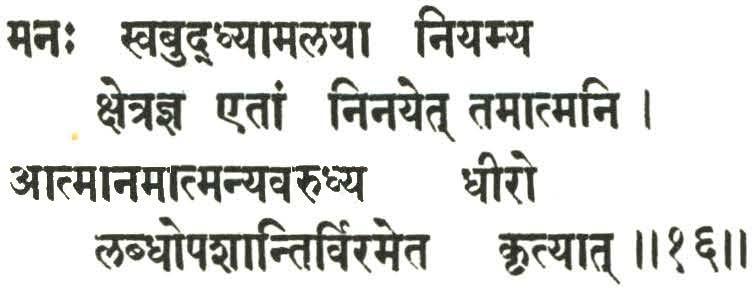

�mf'w:ijfff(4(1
mana� svabuddhyiimalayii niyamya k§etra-jna etiirit nilayet tam iitmani iitmiinam iitmany avarudhya dhiro labdhopa.Siintir virameta krtyiit
mana�-the mind; sva-buddhyii-by his own intelligence; amalayiiunalloyed-niyamya- by regulating ;k§etra-jne-unto the living entity; etiim -all of them; nilayet-merge; tam-that; iitmani-the self; iitmiinam- the self; iitmani-in the Superself; avarudhya- being locked up; dhira[t-the fully satisfied; labdha-upasiinti[t-one who has attained full bliss; virameta -ceases from; krtyiit-all other activities.

TRANSLATION
Thereafter, the yogi should merge his mind, by his unalloyed intelligence, into the living entity, and then merge the living entity into the Superself. And by doing this, the fully satisfied living entity becomes
Text 16] The Lord in the Heart 87
situated in the supreme stage of satisfaction, so that he ceases from all other activities.

PURPORT
The functions of the mind are thinking, feeling, and willing. When the mind is materialistic, or absorbed in material contact, it acts for material advancement of knowledge, destructively ending in discovery of nuclear weapons. But when the mind acts under spiritualurge, it acts wonderfully for going back home and back to Godhead for life in complete bliss and eternity. Therefore mind has to be manipulated by good and unalloyed intelligence. Perfect intelligence is to render service unto the Lord. One should be intelligent enough to understand that the living being is, in all circumstances, a servant of the circumstances. Every living being is serving the dictates of desire, anger, lust, illusion, insanity, and enviousness-all materially affected. But even executing such dictations of different temperaments, he is perpetually unhappy. When one actually feels this and turns his intelligence to inquire about it from the right sources, he gets information of the transcendental loving service of the Lord. Instead of serving materially for the above-mentioned different humors of the body, the living entity's intelligence then becomes freed from the unhappy illusion of materialistic temperament, and thus,by unalloyed intelligence, the mind is brought into the service of the Lord. The Lord and His service are identical, being on the absolute plane. Thereforethe unalloyed intelligence and the mind are merged into the Lord, and thus the living entity does not remain a seer himself but becomes seen by the Lord transcendentally. When the living entity is directly seen by the Lord, and the Lord dictates to him to act according to His desire, and the living entityfollowsHimperfectly, the living entity ceases to discharge any other duty for his illusory satisfaction. In his pure unalloyed state, the living being attains the stage of labdhopasanti and ceases all material hankerings.
88 Srimad-Bhagavatam [Canto 2, Ch. 2
TEXT 17 � q;r �sf;{flm 'R: 3{ij! � � �l ���I ;r��;r��� 91 �Am"�� Sf� ���\SII
na yatra kalo 'nimi§arh para� prabhu� kuto nu devii jagatarh ya isire na yatra sattvarh na rajas tamas ca na vai vikaro na mahan pradhanam
na-not; yatra-wherein; kala�-destructive time; animi§am-of the heavenly demigods; para�- superior; prabhu�-controller; kuta�-where is there; nu-certainly; deva�-the demigods; jagatam-the mundane creatures; ye-those; isire-rules; na-no; yatra-therein; sattvam-mundane goodness; na-nor; raja�-mundane passion; tama�-mundane ignorance; ca- also; na-nor; vai-certainly; vikara�-transformation; na-nor; mahanthe material causal ocean; pradhanam-material nature.
TRANSLATION

In that transcendental state of labdhopasanti there is no supremacy of devastating time, which controls even the celestial demigods (and what to speak of the demigods themselves?) who are empowered to rule over mundane creatures. Nor is there the mode of material goodness, nor passion, nor ignorance, nor even the false ego, nor the material Causal Ocean, nor the material nature.
PURPORT
Devastating time, which controls even the celestial demigods by its manifestations of past, present and future, does not act on the transcendental plane. The influence of time is exhibited by the symptoms of birth, death, old age and disease, and these four principles of material conditions are present everywhere in any part of the material cosmos up to the planet Brahmaloka, wherethe duration of life of the inhabitants appears to us to be fabulous. Insurmountable time even brings about the death of Brahma, so what to speak of other demigods like lndra, Candra, Siirya, Vayu, Varul)a, etc.? The astronomical influence directed by the different demigods overmundane creatures is also conspicuous by its absence. In the material existence, the living entities are afraid of Satanic influence, but for a devotee on the transcendental plane there is no such fear at all. The living entities change their material bodies in different shapes and forms under the influence of the different modes of material nature, but in the transcendental state the devotee is gur-atita, or above the material modes of goodness, passion or ignorance, and as such the false ego of "I am the
Text 17] The Lord in the Heart
89
Lord of all I survey" does not arise there. In the material world the false ego of the living being trying to lord it over the material nature is something like the moth's falling in the blazing fire. The moth is captivated by the glaring beauty of the fire, and when he comes to enjoy it, the blazing fire consumes him. In the transcendental state the living being is pure in his consciousness, and as such he has no false ego to lord it over the material nature, but his pure consciousness dictates him to surrender unto the Supreme Lord, as stated in the Bhagavad-gita (7.19): "vasudeva� sarvam iti sa mahatma sudurlabha�." All this indicates that on the transcendentalstate there isneither material creation nor the Causal Ocean for material nature.
The above-mentioned state of affairs is factual on the transcendental plane, but is factually revealed in a transcendentalist's knowledge of the advanced state of pure consciousness. Such transcendentalists are of two types, namely the impersonalists and the devotees. For the impersonalist the ultimate goal or destination is the brahmajyoti of the spiritual sky, but for the devotees the ultimate goal is the Vaiku�tha planets. The devotees, however, experience the above-mentioned state of affairs by attainment of spiritual forms for activity in the transcendental loving service of the Lord. But the impersonalist, because of his neglecting the association of the Lord, does not develop a spiritual body for spiritual activity, but remains a spiritual spark only, merged in the effulgent spiritual rays of the Supreme Personality of Godhead. The Lord is the full-fledged form of eternity, bliss and knowledge, but the formless brahmajyoti is simply eternity and knowledge. The Vaiku�tha planets are also forms of eternity,blissand knowledge, and therefore the devotees of the Lord, who areadmittedin theabode of the Lord,also get a bodyof eternity, bliss and knowledge. Assuchthereis no difference between one another. The Lord's abode, name, fame, entourage, etc., are of thesame transcendental quality, and how this transcendental quality differs from the material world is explained herewith in this verse. In the Bhagavad-gita, three principal subjects have been explained by Lord Sri Kr��a, namely karma-yoga, jniina-yoga and bhakti-yoga, but one can reach the Vaikutttha planets by the practice of bhakti-yoga only. The other two are incompetent in helping one to reach the Vaikuttthalokas, although they can, however., conveniently take one to the effulgent brahmajyoti, as described above.

90 Srimad · Bhagavatam [Canto 2, Ch. 2
TEXT 18 t# � �t�W{f;ij � � i{�(ffl����: I � G.l(l�¥404+\iiril(ii«l 004WRI�qa: q� � 11��11
parmn padarh vai§r-avam iimananti tad yan neti netity atad utsisrk§ava�
visrjya dauriitmyam ananya-sauhrdii
hrdopaguhyiirha-padarh pade pade
param-the supreme; padam-situation; vai§r-avam-in relation with the Personality of Godhead; iimananti-do they know; tat-that; yat-which; neti-not this; neti-not this; iti-thus; atat-godless; utsisrk§ava�-those who desire to avoid; vis!jya-giving it up completely; dauriitmyamperplexities; ananya-absolutely; sauhrda-in good will; hrda upaguhyataking them into his heart; arha-that which is only worshipable;padamlotus feet; pade pade-every moment.
TRANSLATION
The transcendentalists desire to avoid everything which is godless, knowing that supreme situation in which everything is in relation with the Supreme Lord Vi�':lu. Therefore a pure devotee who is in absolute harmony with the Lord does not create perplexities, but worships the lotus feet of the Lord at every moment, taking them into his heart.
PURPORT
In the Bhagavad-gitii, "mad-dhiima" ("My abode") is mentioned several times, and according to the version of the Supreme Personality of Godhead Sri Kr�':la there exists the unlimited spiritual sky wherein the planets are called Vaiku':lthas, or the abode of the Personality of Godhead. In that sky, which is far, far beyond the material sky and its sevenfold coverings, there is no need of the sun or the moon, nor is there necessity of electricity for illumination because the planets are self-illuminating and more brilliant than the material suns. Pure devotees of the Lord are absolutely in

Text 18] The Lord in the Heart
91
harmony with the Personality of Godhead, or in other words, they always think ofthe Lord as their only dependable friend and well-wisher. They do not care for any mundane creature up to the status of Brahma, the lord of the universe. They only can definitely have a clear vision of the Vaiku�tha planets. Such pure devotees, being perfectly directed by the Supreme Lord, do not create any artificial perplexity in the matter of transcendental understanding by wasting time in discussing what is Brahman or what is not Brahman or maya, nor do they falsely think of themselves as one with the Lord, or argue that there is no existence of the Lord separately, or that there is no God at all, or that living beings are themselves God, or when God incarnates Himself He assumes a material body. Nor do they concern themselves with many obscure speculative theories, which are in actuality so many stumbling blocks on the path of transcendental understanding. Apart from the class of impersonalists or nondevotees, there are other classes also who pose themselves as devotees of the Lord but at heart maintain the idea of salvation by becoming one with the impersonal Brahman. They manufacture their own way of devotional service wrongly by open debauchery and mislead others who are simpletons or debauchees like themselves. All these nondevotees and debauchees are, according to Visvanatha Cakravarti, duratmas, or the crooked souls in the dress of mahatmas, or the great souls. Such nondevotees and debauchees are completely excluded from the list of transcendentalists by presentation of this particular verse by Sukadeva Gosvami.
So the Vaiku�tha planets are factually the supreme residential places called the param padam. The impersonal brahmajyoti is also called the param padam due to its being the rays of the Vaiku�tha planets, as the sun rays are the rays of the sun. In the Bhagavad-gita (Bg. 14.27) it is clearly said that the impersonal brahmajyoti rests on the person of the Lord, and because everything rests on the brahmajyoti directly and indirectly, everything is generated from the Lord, everything rests on Him, and after annihilation, everything is merged in Him only. Therefore, nothing is independent from Him. A pure devotee of the Lord no longer wastes valuable time in discriminating the Brahman from non-Brahman because he knows perfectly well that the Lord Param Brahman, by His Brahman energy, is interwoven in everything, and thus everything is looked upon by a devotee as the property of the Lord. The devotee tries to engage everything in His service and does not create perplexities by falsely lording it over the creation of the Lord. He is so faithful that he engages himself, as well as everything else, in the transcendental loving

92 Srimad-Bhagavatam [Canto 2, Ch. 2
service of the Lord. In everything, the devotee sees the Lord, and he sees everything in the Lord. The specific disturbance created by a duriitmii, or crooked soul, is due to his maintaining that the transcendental form of the Lord is something material.
ittham munis tuparamed vyavasthito vijiiiina-drg-virya-surandhitiisaya� sva-piir�r-iniipipya gudam tato 'nilam sthiine�u �a{sunnamayej jita-klama�
ittham-thus, by Brahman realization; mun*- the philosopher; tu-but; uparamet-should retire; vyavasthita�- well situated; vijiiana-drk-by scientific knowledge; virya- strength; su-randhita-well regulated; iisaya�-aim of life; sva-piir�r-inii-with the heel of one's foot; iipidya-by blocking; gudam-air hole; tata�-thereafter; anilam-life air; sthiine�u-in the places; �a{su-six primary; unnamayet-must be lifted; jita-klama�-by extinguishing material desires.



TRANSLATION
By the strength of scientific knowledge, one should be well situated in absolute realization and thus be able to extinguish all material desires and then give up the material body by blocking the air hole [through which stool is evacuated] with the heel of one's foot and lifting the life air from one place to the other in the six primary places.

PURPORT
There are many duriitmiis who claim to have realized themselves as Brahman and yet are unable to conquer material desires. In the Bhagavad-
Text 19] The Lord in the Heart 93
�����mflsFre � ��f!l$f+i�M�tfi�H
'
TEXT 19 � ijRf�(�lt Ptij1'1t��4ij(f..�:
II��II
gitii it is clearly explained (Bg. 18.54) that an absolute self-realized soul becomes completely aloof from all material desires. Material desires are based on the false ego of the living being and are exhibited by his childish and useless activities to conquer the laws of material nature and by his desire to lord it over the resources of the five elements. With such mentality, one is led to believe in the strength of material science up to the discovery of atomic energy and space travel by mechanical vehicles, and by such tiny advancements of material science the false egoist tries to challenge even the strength of the Supreme Lord, who can finish all man's tiny endeavors in less than a second. The well-situated self, or Brahmanrealized soul, perfectly understands that the Supreme Brahman or the Personality of Godhead is the all-powerful Vasudeva and that he (the selfrealized living being) is a part and parcel of the supreme whole. As such, his constitutional position is to cooperate with Him in all respects in the transcendental relation of the served and the servitor. Such a self-realized soul ceases to exhibit his useless activities by attempting to lord it over material nature and fully engages himself in faithful devotion to the Lord, scientifically well informed.
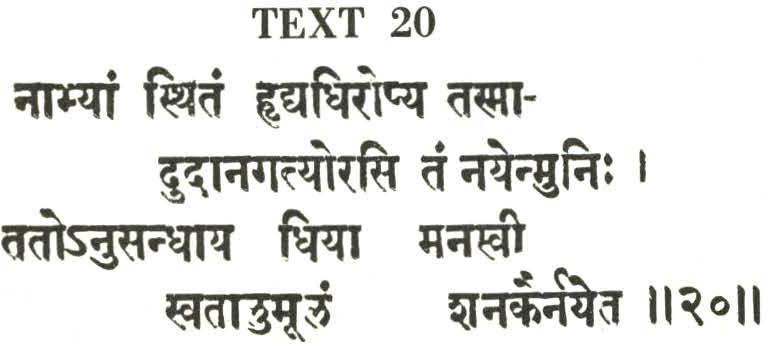
The expert yogi who has thoroughly practiced the control of the life air by the prescribed method of the yoga system is advised to quit thebody as follows. He should plug up th� evacuating hole by the heel of the foot and then progressively move the life air on and on to six places: navel, abdomen, heart, chest, palate, the eyebrows and the cerebral pit. Controlling the life air by the prescribed yogic process is mechanical, and the practice is more or less a physical endeavor for spiritual perfection. In olden days such practice was very common for the transcendentalist, for the mode of life and character in those days were favorable. But in modern days, when the influence of Kali Age is so disturbing, practically everyone is untrained in this art of bodily exercise. Concentration of the mind is more easily attained in these days by the chanting of the holy name of the Lord. The results are more effective than those derived from the inner exercise of the life air.

94 Srimad-Bhagavatam [Canto 2, Ch. 2
niibhyiirh sthitarh hrdy-adhiropya tasmiid
udiina-gatyorasi tarh nayen mun*
tato 'nusandhiiya dhiyii manasvi
sva-tiilu-mularh sanakair nayeta
niibhyiim-on the navel;sthitam-situated;hrdi-in the heart;adhiropyaby placing;tasmiit-from there;udiina-soaring;gatya-force;urasi-on the chest; tam-thereafter; nayet-should draw; muni[l-meditative devotee; tata[l-them; anusandhaya-just to search out; dhiyii-by intelligence, manasvi-the meditative; sva-tiilu-mulam-at the root of the palate; sanaka*-slowly; nayeta-may be brought m.
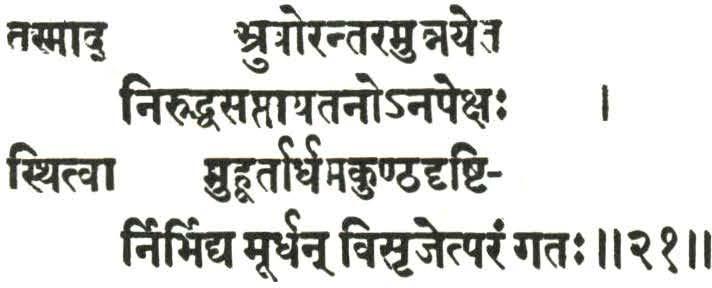
TRANSLATION
The meditative devotee should push up the life air from the navel to the heart, from there to the chest and from there to the root of the palate, slowly, and search out the proper places with intelligence.
PURPORT
There are six circles of the movement of the life air, and the intelligent bhakti-yogi should search out the places with intelligence and in a meditative mood. Among these, mentioned above is the sviidhi§thiinacakra, or the powerhouse of the life air, and above this, just below the abdomen navel, there is the mar-ipuraka-cakra. When upper space is further searched out in the heart, it is called the aniihata-cakra, and further up, when it is placed at the root of the palate, it is called the viSuddhi-cakra.
TEXT 21

Text 21] The Lord in the Heart
95
tasmiid bhruvor antaram unnayeta
niruddha-saptiiyatano 'napek�a�
sthitvii muhiirtiirdham akurtha-dr�tir nirbhidya murdhan visrjet pararh gata�
tasmiit-from there; bhruvo�-of the eyebrows; antaram-in between, unnaye ta - should be brought in; niruddha-by blocking up;sapta-seven ayatan a�-outlets of the life air; anapek§a�-independent of all material enjoyment; sthitvii-by keeping; muhurta-moment; ardham-half of a; akurtha- back home, back to Godhead; dnt*-one whose aim is targetted like that;nirbhidya-punching ; murdhan-the cerebral hole;visrjet-should give up this body;param-the Supreme;gata�-having gone to.
TRANSLATION

Thereafter the bhakti-yogi should push up the life air in between the eyebrows, and then, blocking up the seven outlets of the life air, he should maintain his aim for going back home, back to Godhead. If he is completely free from all desires for material enjoyment, he should then reach the cerebral hole and give up this material connection, having gone to the Supreme.
PURPORT
The process of giving up all material connection and returning home, back to Godhead, the Supreme, is recommended herein. The condition is that one should be completely freed from desire for material enjoyment. There are different grades of material enjoyments in respect to duration of life and sensual gratification. The highest plane of sensual enjoyment for the longest period of life is mentioned in the Bhagavad-gitii (Bg. 9.20). All are but material enjoyments, and one should be thoroughly convinced that he has no need of such long duration of life, even in the Brahmaloka planet. He must return home, back to Godhead, and must not be attracted by any amount of material facilities. In the Bhagavad-gitii (Bg. 2.59) it is said that this sort of material detachment is possible to attain when one is acquainted with the supreme association of life. Pararh dr�(vii nivartate. One cannot be freed from material attraction unless he has complete understanding of the nature of spiritual life. The propaganda by a certain class of impersonalists that spiritual life is void of all varieties is dangerous propaganda to mislead the living beings into becoming more and more
96 Srimad-Bhagavatam [Canto 2, Ch. 2
attracted by material enjoyments. As such, persons with a poor fund of knowledge cannot have any conception of the param; they try to stick to the varieties of material enjoyments, although they may flatter themselves to be Brahman-realized souls. Such less intelligent persons cannot have any conception of the param, as mentioned in this verse, and therefore they cannot reach the Supreme. The devotees have full knowledge of the spiritual world, the Personality of Godhead and His transcendental association in unlimited spiritual planets called Vaikupthalokas. Herein akurtha-dr§tifl is mentioned. Akurtha and vaikurtha convey the same import, and only one who has his aim fixed upon that spiritual world and personal association withthe Godhead can give upthis material connection even while living in the material world. This param and the para�n dhiima mentioned in several places of the Bhagavad-gitii are one and the same thing. One who goes to the pararh dhiima does not return again to this material world. This is not possible even by reaching the topmost loka of the material world.

The life air passes through seven openings, namely two eyes, two nostrils, two ears and one mouth. Generally it passes through the mouth at the time of an ordinary man's death. But the yogi, as above mentioned, who controls the life air in his own way, generally releases the life air by puncturing the cerebral hole in the head. The yogi therefore blocks up all the above-mentioned seven openings, so that naturally the life air will burst forth through the cerebral hole, whic,_ is the sure sign of leaving the material connection by the great devotees. TEXT

Text 22] The Lord in the Heart 97
22 � sp.m:�'{ � q'l� �tJ4«1'1Hft' � f� I ace1Nq�4 g� m •1�0rit01ij�� ������ yadi prayiisyan nrpa piirame§{hyarh vaihiiyasiiniim uta yad vihiiram a§{iidhipatyarh gur-a-sanniviiye sahaiva gacchen manasendriyais ca
yadi-however; pra _yasyan-maintaining a desire; nrpa-0 King; parame§thyam-the governing planet of the material world; vaihayasanam-of the beings known as the Vaihayasas; uta-it is said; yat- what is; viharamplace of enjoyment; a§ta-lidhipatyam -lording over with eightfold achievements; gurw-sannivaye-in the world of three modes ofnature; saha- along with; eva-certainly; gacchet-should go; manasa-accompanied by mind; indriya* -and the senses;ca-also.
TRANSLATION
0 King, if however, a yogi maintains a desire for improved material enjoyments, like transference to the topmost planet of Brahmaloka, or the achievement of the eightfold perfections and traveling in outer space along with the V aihayasas, or a situation in one of the millions of planets, then he has to take away with him the mind and the senses materially moulded.

PURPORT
In the upper status of the planetary systems there are thousands and thousands of times greater facilities for material enjoyments than in the lower planetary systems. The topmost planetary systems are comprised of planets like Brahmaloka, Dhruvaloka (the pole star), etc., and all of them are situated beyond the Maharloka. The inhabitants of those planets are empowered with eightfold achievements of mystic perfections. They do not have to learn and practice the mystic processes of yoga perfection and achieve the power of becoming small, particle-like (a[Lima-siddhi), or lighter than a soft feather (laghima-siddhi). They do not have to get anything and everything from anywhere and everywhere (prapti-siddhi), to become heavier than the heaviest (mahima-siddhi), to act freely even to create something wonderful or to annihilate anything at will (isitii-siddhi), to control over all material elements (vasita-siddhi), to possess such power as will never bring about frustration in any desire (priikamya-siddhi), or to assume any shape or form as one may desire even whimsically (kiimiivasiiyitii-siddhi). All these expediencies are as common as natural gifts for the inhabitants of those higher planets. They do not require any mechanical help to travel in outer space, and they can move and travel at will from one planet to any other planet within no time. The inhabitants of the earth cannot move even to the nearest planet except by mechanical vehicles like spacecraft, but the highly talented inhabitants of such higher planets can do everything very easily.
98 Srimad-Bhagavatam [Canto 2, Ch. 2
Since a materialist is generally inquisitive to experience what is actually in such planetary systems, he wants to see everything personally. As inquisitive persons tour all over the world to gain direct local experience, similarly the less intelligent transcendentalist also desires to have some experience of those planets about which he has heard so many wonderful things. The yogi can, however, easily fulfill his desire by going there with the present materialistic mind and senses. The prime factor of the materialistic mind is to lord it over the material world, and all the siddhis mentioned above are features of domination over the world. The devotees of the Lord are not ambitious to dominate a false and temporary phenomenon. On the other hand, a devotee wants to be dominated by the supreme predominator, the Lord. A desire to serve the Lord, the supreme predominator, is spiritual or transcendental, and one has to attain this purification of the mind and the senses to get an admission into the spiritual kingdom. With the materialistic mind one can reach the best planet in the universe, but no one can enter into the kingdom of God. Senses are called spiritually purified when they are not involved in sense gratification. Senses require engagements, and when the senses are engaged totally in the transcendental loving service of the Lord, they have no chance to become contaminated by material infections.
TEXT 23


tflit��UUIJ
yogesvariirtiirh gatim iihur antarbahis-tri-lokyii� pavaniintar-atmaniim na karmabhis tiirh gatim iipnuvanti
vidyii-tapo-yoga-samiidhi-bhiijiim

yogesvariirtiim-of the great saints and devotees; gatim-destinations; iihu�-it is said; antar-within; bah*-without; tri-tokyiifl,-of the three planetary systems; pavana-antar-within the air; iitmaniirh-of the subtle body; na-never; karmabh*-by fruitive activities; tam-that; gatim-

Text 23] The Lord in the Heart 99
� ilfd+tl"*'f.:a "
qfijl\�-�rnf(;cJliJ:tl: I WI
II��II
speed; apnuvanti-achieve; vidya-devotional service; tapa�-austerities; yoga-mystic power;samadhi-knowledge;bhiijiim-ofthose who entertain.


TRANSLATION
The transcendentalists are concerned with the spiritual body. As such, by the strength of their devotional service, austerities, mystic power and transcendental knowledge, their movements are unrestricted within and without the material worlds. The fruitive workers, or the gross materialists, can never move in such an unrestricted manner.

PURPORT
The material scientist's endeavor to reach other planets by mechanical vehicles is only a futile attempt. One can, however, reach heavenly planets by virtuous activities, but one can never expect to go beyond Svarga or Janaloka by such mechanical or materialistic activities, either gross or subtle. The transcendentalists who have nothing to do with the gross material body can move anywhere within or without the material worlds. Within the material worlds they move in the planetary system of the Mahar, Jana, Tapas, and Satyalokas, and beyond the material worlds they can move in the Vaiku!lthas as unrestricted spacemen. Narada Muni is one of the examples of such spacemen, and Durvasa Muni is one of such mystics. By the strength of devotional service, austerities, mystic powers and transcendental knowledge, everyone can move like Narada Muni or Durvasa Muni. It is said that Durvasa Muni traveled over the complete material space and part of spiritual space within one year only. The speed of the transcendentalists can never be attained by the gross or subtle materialists.
100 Srimad-Bhagavatam [Canto 2, Ch. 2
TEXT 24 �� �Rr P-4�1tl«l ;rn: ij\Wittl JUN� �:qtfT I Fr-{dtt;(!i\� �'(t�R=.tl_ . w:nffl � � ijW\Rt{ II�'clll
vai.Sviinararh yiiti vihiiyasii gata�
SU§Umr-ayii brahma-pathena soci§ii vidhuta-kalko 'tha harer udastat
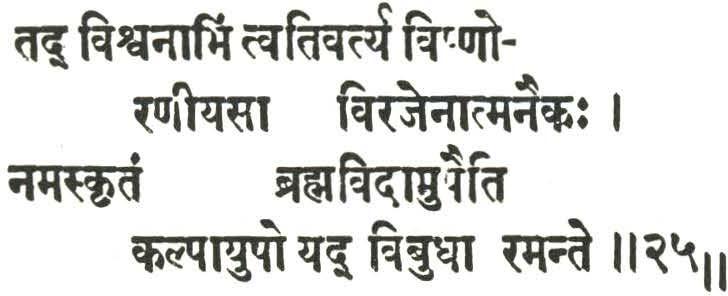
prayiiti cakrarh nrpa sai.Sumiiram
vaisviinaram-the controlling deity of fire; yiiti-goes; vihiiyasii-by the path in the sky (the Milky Way); gata�-by passing over; SU§umr-ayii-by the Su�Uml).ii; brahma-Brahmaloka; pathena-on the way to; soci§iiilluminating; vidhUta-being washed off; k alk a� -dirt; atka-thereafter; hare�-of Lord Hari; udastiit- upwards; prayiiti-does reach; cakramcircle; nrpa-0 King;saisumaram-named Sisumara.
TRANSLATION
0 King, such a mystic, when he passes over the Milky Way by the illuminating Su�umQ.a to reach the highest planet, Brahmaloka, goes first to Vai�vanara, the planet of the deity of fire, wherein he becomes completely cleansed of all contaminations, and thereafter he still goes higher, to the circle of Sisumara, to relate with Lord Hari, the Personality of Godhead.
PURPORT
The polar star of the universe and the circle thereof is called the Sisumara circle wherein the local residential planet of the Personality of Godhead (K�irodakasayi Vi�l).u) is situated. Before reaching there, the mystic passes over the Milky Way to reach the Brahmaloka, and while going there he reaches first the Vaisvanaraloka, where the demigod controls the fire. In this planet the yogi becomes completely cleansed of all dirty sins acquired while in contact with the material world. The Milky Way in the sky is indicated herein as the way leading to theBrahmaloka, the highestplanet of the universe.
TEXT 25

Text 25] The Lord in the Heart
101
Srimad-Bhagavatam
tad visva-niibhirh tv ativartya vi�r-or ar-iyasii virajeniitmanaika[l. namaskrtarh brahma-vidiim upaiti kalpiiyu�o yad vibudhii ramante
tat-that; viSva-niibhim-navel of the universal Personality of Godhead; tu-but;ativartya-crossing over;vi�rw[l.-ofLord Vi��u, the Personality of Godhead; aniyasa-due to mystic perfection; virajena-by the purified; iitmanii-by the living entity; eka[l.-alone; namaskrtam-worshipable; brahma-vidiim-by those whoaretranscendentallysituated; upaiti- reaches; kalpa-iiyu�af!-a period of 4,300,000,000 solar years; yat-the place; vibudhii[l.-self-realized souls; ramante-do enjoy.


TRANSLATION
This Sisumara is the pivot for the turning of the complete universe, and it is called the navel of Vi��u [Garbhodakasayi Vi��u]. The yogi alone goes beyond this circle of Sisumara and attains the planet [Maharloka] where the purified saints like Bhrgu enjoy a duration of life of 4,300,000,000 solar years. This planet is worshipable even by the saintswho aretranscendentallysituated.
TEXT 26 � a<cno:te�

G;�&1'U;f « f;rit�"1Jfffl'{I
atho anantasya mukhiinalena
dandahyamiinarh sa nin7£§ya viSvam niryiiti siddhesvara-yu§ta-dhi§ f!yam yadd vai pariirdhyarh tad u piirame§thyam
atha[l.-thereupon; anantasya-of Ananta, the resting incarnation of Godhead; mukha-analena-by thefire emanatingfrom His mouth; dandah-
102
[Canto 2, Ch. 2
�rm �a.���� � ��qi(�B�����II
yamiinam-burning into ashes; sa�-he; nirik§ya-be seeing this; viSvamthe universe;niryiiti-goes out; siddhesvara-yu§!a-dhi§[tyam-airplanes used by the great purified souls; yat-the place; vai-wherein; pariirdhyam15,480,000,000,000 solar years; tat- that; u-the exalted; piirame§!hyam -Satyaloka, where Brahmii resides.
TRANSLATION

At the time of final devastation of the complete universe [the end of the duration of the life of Brahma], a flame of fire emanates from the mouth of Ananta [from the bottom]. He sees all the planets of the universe burning into ashes, and thus he leaves for the Satyaloka by airplanes used by the great purified souls. The duration of life in Satyaloka is calculated to 15,400,000,000,000 years.
PURPORT
It is indicated herein that the residents of Maharloka, where the purified living entities or demigods possess a duration of life that is calculated to be 4,300,000,000 solar years, have airships by which they reach the Satyaloka, the topmost planet of the universe. In other words, the SrimadBhiigavatam gives us many clues about other planets far, far away from us which modern planes and spacecraft cannot reach, even by imaginary speeds. The statements of Srimad-Bhiigavatam are accepted by great iiciiryas like Sridhara Svami, Ramiinujiiciirya, Vallabhiiciirya, etc. Lord Sri Caitanya Mahiiprabhu specifically accepts Srimad-Bhiigavatam as the spotless Vedic authority, and as such no sane man can ignore the statements of Srimad-Bhiigavatam when it is spoken by the self-realized soul Srila Sukadeva Gosvami, who followsthe footsteps of his great father Srila Vyasadeva, the compiler of all Vedic literatures. In the creation of the Lordthere are many wonderfulthings which we can see with our own eyes every day and night, but we are unable to reach them equipped by modern materialistic science. We should not, therefore, depend on the fragmentary authority of materialistic science for knowing things beyond the range of scientific purview. For a common man, both modern science and Vedic wisdom are simply to be accepted only because none of the statements, either of modern science or of Vedic literature, can be verified by him. The alternative for a common man is to believe either of them or both of them. The Vedic way of understanding is, however, more authentic because it
Text 26] The Lord in the Heart 103
has been accepted by the iicaryas who are not only faithful and learned men. but are also liberated souls without any of the flaws of conditioned souls. The modern scientists are, however, conditioned souls liable to so many errors and mi:3takes; therefore the safe side is to accept the authentic \ersion of \"edic literatures, like Srimad-Bhiigavatam, which is accepted unanimous!�- by the great c7ciiryas.
TEXT 27

na yatra soko na jarii na mrtyur niirtir na codvega rte kutascit yac cit tato 'dafl k[payiinidam vidiim duranta-dufl kha-prabhaviinudarsaniit
na-never; _yatra-there are; sokafl-bereavement; na-nor;jarii-old age; na-nor; mrtyufl-death; na-nor; iirtifl-pains;na-nor;ca-also; udvega{l.anxieties; rte-save and except; kutascit-sometimes; yat-because of; citconsciousness; tatafl-therefore;adafl-compassion;krpayii-out of heartfelt sympathy; anidam vidiim-of those who are ignorant of the process of devotional service; duranta-unsurpassable; du{l.kha-misery; prabhavaaggrandizement: anudarsaniit-by successive experience.
TRANSLATION
In that planet of Satyaloka, there is neither bereavement, nor old age nor death. There is no pain of any kind and therefore no anxieties, save that sometimes, due to consciousness, there is a feeling of compassion for those who, unaware of the process of devotional service, become subjected to the aggrandizement of unsurpassable miseries in the material world.
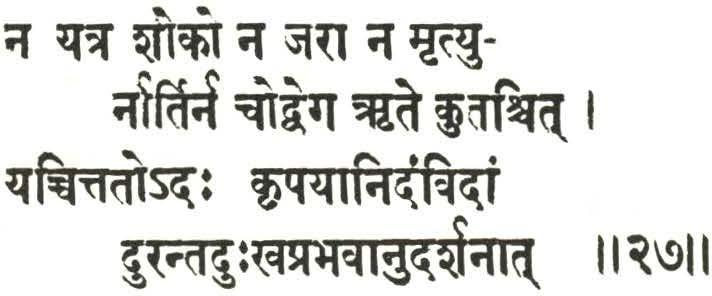
104 Srimad-Bhagavatam [Canto 2, Ch. 2
Foolish men of materialistic temperament do not take advantage of successive authorized knowledge. The Vedic knowledge is authorized and is acquired not by experiment but by authentic statements of the Vedic literatures explained by bona fide authorities. Simply by becoming an academic scholar one cannot understand the Vedic statements,but one has to approach the real authority who has received the Vedic knowledge by disciplic succession, as it is clearly explained in the Bhagamd-gitii (Bg. 4.2). Lord Kr�!la affirmed that the system of knowledge as explained in the Bhagavad-gitii was explained to the sun-god, and the knowledge descended by disciplic succession from the sun-god to his son .\lanu, and from .\lanu to King Ik�vaku (the forefather of Lord Ramacandra), and thus the system ofknowledge was explained down theline of great sages one after another. But in due course of time the authorized succession was broken, and therefore, just to reestablish the true spirit of the knowledge, the Lord again explained the same to Arjuna because he was a bona fide candidate for understanding due to his becoming a pure devotee of the Lord. Bhagavad-gitii, as it was understood by Arjuna, is also explained (Bg. 10. 12-13), but there are many foolish men who do not follow the footsteps of Arjuna in understanding the spirit of Bhagavad-gitii. They create instead their own interpretations, which are as foolish as themselves, and thereby only help to put a stumbling block on the path of real understanding, misdirecting the innocent followers who are less intelligent, or the sudras. It is said that one should become a briihmarw before one can understand the Vedic statements,and this stricture is as important as the stricture that no one shall become a lawyer who has not qualified himself as a graduate. Such a stricture is not an impediment in the path of progress for anyone and everyone, but it is necessary for an unqualified understanding of a particular science. Vedic knowledge is misinterpreted by those who are not qualified briihma[!as. A qualified briihma[!a is one who has undergone strict training under the guidance of a bona fide spiritual master.
The Vedic wisdom guides us to understand our relation with the Supreme Lord Sri Kr�pa and to act accordingly in order to achieve the desired result of returning home, back to Godhead. But materialistic men do not understand this. They want to make a plan to become happy in a place where there is no happiness. For false happiness they try to reach other planets, either by Vedic rituals or by spacecraft, but they should knowfor certainthat any amount of materialistic adjustmentforbecoming

Text 27) The Lord in the Heart 105 PURPORT
happy in a place which is meant for distress cannotbenefit the misguided man because, after all, the whole universe with all its paraphernalia will come to an end after a certain period. Then all plans of materialistic happiness will automatically come to an end. The intelligent persontherefore makes a plan to return home, back to Godhead. Such an intelligent person surpasses all the pangs ofmaterial existence, like birth, death, disease and old age. Actually he is happy because he has no anxieties of material existence, but as a compassionate sympathizer he feels unhappiness for the suffering materialistic men, and thus he comes occasionally before the materialistic men to teach them the necessity of going back to Godhead. All the bona fide iiciiryas preach this truth of returning home, back to Godhead, and warn men not to make a false plan for happiness in a place where happiness is only a myth.
tato viSe�arh pratipadya nirbhayas
teniitmaniipo'nala-miirtir atvaran
jyotirmayo viiyum upetya kiile
viiyv-iitmanii kharh brhad-iitma-lingam
tata�- thereafter; viSe�am-particularly; pratipadya-by obtaining; nirbhaya�- without anydoubt; tena-bythat; iitmanii-pure self;apa�- water; anala-fire; miirti�-forms; atvaran-by surpassing; jyotirmaya�- effulgent; viiyum- atmosphere; upetya -having reached there; kiile-indue course of time; viiyu-air; iitmanii-by the self; kham-ethereal; brhat-great; iitmalingam-real form of the self.



TRANSLATION
After reaching Satyaloka, the devotee is specifically able to be incorporated fearlessly by the subtle body in an identification similar to that of
106 Srimad-Bhagavatam [Canto 2, Ch. 2
S91�'{Rl(�(o{ I
����� m �llil�+tf<-5�11 ��II
TEXT 28 miT����691k+i91ltft
�rn4�
the gross body, and one after another he gradually attains stages of existence from earthly to watery, fiery, glowing, and airy until he reaches the ethereal stage.
PURPORT
Anyone who can reach the Brahmaloka or Satyaloka by dint of spiritual perfection and practice is qualified to attain three different types of perfection. One who has attained a specific planet by dint of pious activities attains places in terms of comparative pious activities. One who has attained the place by dint of viriita or Hiral)yagarbha worship is liberated along with the liberation of Brahma. But one who attains the place by dint of devotional service is specifically mentioned here, in relation to how he can penetrate into the different coverings of the universe and thus ultimatelydisclosehis spiritual identity in the absolute atmosphere of supreme existence.

According to Srila ]Iva Gosvami, all the universes are clustered together up and down, and each and every one of them is separately sevenfoldcovered. The watery portion is beyond the sevenfold coverings, and each covering is ten times more expansive than the previous covering. The Personality of Godhead who creates all such universes by His breathing period lies above the cluster of the universes. The water of the Causal Ocean is differently situated than the covering water of the universe. The water that serves as covering for the universe is material, whereas the water of the Causal Ocean is spiritual. As such, the watery covering mentioned herein is considered to be the false egoistic covering of all living entities, and the gradual process of liberation from the material coverings one after another, as mentioned herein, is the gradual process of being liberated from false egoistic conceptions of the material gross body, and then being absorbed in the identification of the subtle body till the attainment of the pure spiritual body in the absolute realm of the kingdom of God.
Srila Sridhara Svami confirms that a part of the material nature, after being initiated by the Lord, is known as the mahat-tattva. A fractional portion of the mahat-tattva is called the false ego. A portion of the ego is the vibration of sound, and a portion of sound is atmospheric air. A portion of the airy atmosphere is turned into forms, and the forms constitute power of electricity or heat. Heat produces smell of flavor of the earth, and the gross earth is produced by such flavor. And all these combined together constitute the cosmic phenomenon. Extension of the cosmic
Text 28] The Lord in the Heart 107
phenomenon is calculated to be diametrically (both ways) 4,500,000,000 miles. Then the coverings of the universe begin. The first stratum of the co,·ering is calculated to extend eight million miles, and the subsequent coverings of the universe are respectively of fire, effulgence, air and ether, one after another, each extending ten times further than the previous. The fearless de,·otee of the Lord penetrates each one of them and ultimately reaches the absolute atmosphere where everything is of one and the same spiritual identity. Then the devotee enters one of the Vaikup.tha planets where he assumes the exact form of the Lord and engages in the loving transcendental service of the Lord. That is the highest perfection of deYotional life. Beyond this there is nothing to be desired or achieved by the perfect yogi.
TEXT 29

ghriirzena gandharh rasanena vai rasarh
ntparh ca d�tyii svasanarh tvacaiva
srotrerza copetya nabho-gurzatvam
priirzena ciikutim upaiti yogi
ghrii[lena-by smelling;gandham-flavor; rasanena-by taste; vai-exactly; rasam-palate; riipam- forms; ca-also; d�tyii-by vision; svasanam-contact; tvacii-touch; eva-as it were; srotre[la-by vibration of the ear; caalso; upetya-by achieving; nabhas-gurzatvam -identification of ether; priirena-by sense organs; ca-also; iikiitim-material activities; upaiti-attains; yogi-the devotee.
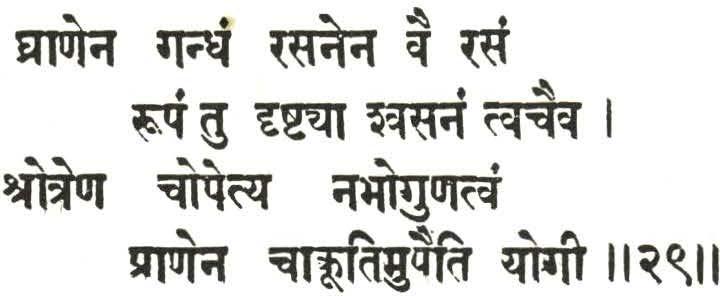
TRANSLATION
The devotee thus surpasses the subtle objects of different senses like the flavor by smelling, the palate by tasting, the vision by seeing forms, the touch by contacting, the vibration of the ear by ethereal identification, and the sense organs by material activities.
108 Srimad-Bhagavatam [Canto 2, Ch. 2
Beyond the sky there are subtle coverings, as in the case of the elementary coverings of the universes. The gross coverings are a develop· ment of partial ingredients of the subtle causes. So the yogi or devotee, along with liquidation of the gross elements, relinquishes the subtle causes like the flavor by smelling, etc. The pure spiritual spark, the living entity, thusbecomes completely cleansed of all material contamination to become eligible for entrance into the kingdom of God.
TEXT 30

sa bhiita-siik�mendriya-sannikar�am manomayam devamayam vikiiryam samsiidya gatyii saha tena yiiti vijniina-tattvam gurw-sannirodham
sa�-he (the devotee); bhiita-the gross; siik�ma-and the subtle; indri_ya -senses; sannikar�am-the point of neutralization; manomayam-mental plane ; devamayam-in the mode of goodness; vikiiryam-egoism; samsiidya -surpassing; gatyii-by the progress; saha- along with; tena- them; yii.tigoes; vijntina-perfect knowledge; tattvam-truth ; gura-material modes; sannirodham-completely suspended.
TRANSLATION
The devotee, thus surpassing the gross and the subtle forms of coverings,enters theplane of egoism.And inthatstatushe mergesthematerial modes of nature [ignorance and passion] in this point of neutralization and thus reaches egoism of goodness. After this, all egoism is merged in themahat-tattva, and he comestothe point of pure self-realization.
Text 30] The Lord in the Heart 109
PURPORT
ij {�itPs;:t�('i�
� � � iR trffir fet�l'1�iti g�II� o II
�����
Pure self-realization, as we have several times discussed, is the pure consciousness of admitting oneself as the eternal servitor of the Lord. Thus one is reinstated in his original position of transcendental loving service of the Lord, as it will be clearly explained in the following verse. This stage of rendering transcendental loving service to the Lord without any hopes of emolument from the Lord, or any other way, can be attained when the material senses are purified and the original pure state of the senses revived. It is suggested herein that the process of purifying the senses is by the yogic way, namely the gross senses are merged in the modes of ignorance, and the subtle senses are merged in the mode of passion. The mind belongs tothe mode of goodness and therefore is called devamaya, or godly. Perfect purification of the mind is made possible when one is fixed in the conviction of being the eternal servitor of the Lord. Therefore simple attainment of goodness is also amaterial mode; one hasto surpass thisstage of materialgoodness and reach the point of purified goodness, or viisudeva-sattva. This viisudevasattva helps one to enter into the kingdom of God.
We may also remember in this connection that the process of gradual emancipation by the devotees in the manner mentioned above, although authoritative, is not viable at the present age because of people's becoming primarily unaware of the yoga practice. The so-called yoga practice bythe professional protagonists may bephysiologically beneficial, but such small successes cannot help one in the attainment of spiritual emancipation as mentioned herein. Five thousand years ago, when the social status of human society was in perfect Vedic order,the yoga process mentioned herein was a common affair for everyone because everyone, specifically the briihmartas and k§atriyas, was trained in the transcendental art in the custody ofthe spiritual master far away from home,in the status of brahmacarya. Modern man, therefore, is incompetent to understand it perfectly.
Lord Sri Caitanya, therefore, made it easier for the prospective devotee of the present age in the following specific manner. Ultimately there is no difference in the result. The first and foremost point is that one must understand the prime importance of bhakti-yoga. The living beings in different species of life are undergoing different terms of encagement according to their fruitive actions and reactions. But in the execution of different activities, one who secures some resources of bhakti-yoga can understand the importance of service to the Lord through the causeless mercy of the Lord, as well as of the spiritual master. A sincere soul is

no Srimad-Bhagavatam [Canto 2, Ch. 2
PURPORT
helped by the Lord by meeting a bona fide spiritual master, the representative of the Lord. By the instruction of such a spiritual master, one gets the seed of bhakti-yoga. Lord Sri Caitanya Mahaprabhu recommends the devotee to sow the seed of bhakti-yoga in his heart and nurture it by the watering of hearing and chanting the holy name, fame, etc., of the Lord. The simple process of offenseless chanting and hearing the holy name of the Lord will gradually promote one very soon to the stage of emancipation. There are three stages of chanting the holy name of the Lord. The first stage is the offensive chanting of the holy name, and the second is the reflective stage of chanting the holy name. The third stage is the offenseless chanting of the holy name of the Lord. In the second stage only, the stage of reflection via media between the offensive and offenseless stages, the stage of emancipation is automatically attained. And in the offenseless stage, one actually enters into the kingdom of God, although physically he may be apparently within the material world. To attain the offenseless stage, one must be on guard in the following manner.
When we speak of hearing and chanting, it means one should not only chant and hear of the holy name of the Lord as Rama, Kr��a, (or systematically the sixteen names of Hare Kr��a, Hare Kr��a, Kr��a Kr��a, Hare Hare/ Hare Rama, Hare Rama, Rama Rama, Hare Hare), but one should also read and hear the Bhagavad-gitii and Srimad-Bhiigavatam in the association of devotees. The primary practice of bhakti-yoga will cause the seed already sowed in heart to sprout, and by a regular watering process, as mentioned above, the bhakti-yoga creeper will begin to grow. By systematic nurturing, the creeper will grow to such an extent that it will penetrate the coverings of the universe, as we have heard in the previous verses, reach the effulgent sky, the brahmajyoti, and go farther and farther and reach the spiritual sky where there are innumerable spiritual planets called Vaikunthalokas. Above all of them there is Krsnaloka or Goloka . . ... Vrndavana, wherein the growing creeper enters and takes repose at the lotus feet of Lord Sri Kr��a, the original Personality of Godhead. When one reaches the lotus feet of Lord KHIJa at Goloka V�ndavana, the watering process of hearing and reading, as also chanting of the holy name in the pure devotional stage, fructifies, and the fruits grown there in the form of love of God are tangibly tasted by the devotee, even though he is here in this material world. The ripen fruits of love of God are relished only by the devotees constantly engaged in the watering process as described above. But the working devotee must always be mindful that the creeper which has so grown may not be cut off. Therefore he should be mindful of the following considerations:
1) Offense by one at the feet of a pure devotee may be likened to

Text 30] The Lord in the Heart lll
the mad elephant who devastates a very good garden if it enters.

2) One must be very careful to guard himself against such offenses at the feet of pure devotees, as much as a creeper is protected by all round fencing.

3) It so happens that by the watering process some weeds are also grown, and unless such weeds are uprooted, the nurturing of the main creeper, or the creeper of bhakti-yoga, may be hampered.
4) Actually these weeds are material enjoyment, merging the self in the Absolute without separate individuality, and many other desires in the field of religion, economic development, sense enjoyment and emancipation.
5) There are many other weeds, like disobedience of the tenets of the revered scriptures, unnecessary engagements, killing animals and hankering after material gain, prestige and adorations.
6) If sufficient care is not taken, then the watering process may only help to breed the weeds, stunting the healthy growth of the main creeper and resulting in no fructification of the ultimate requirement: love of God.
7) The devotee must therefore be very careful to uproot the different Weeds in the very beginning. Only then the healthy growth of the main creeper will not be stunted.
8) And by so doing, the devotee is able to relish the fruit of love of God and thus live practically with Lord Kr�!J.a, even in this life, and be able to see the Lord in every step. The highest perfection of life is to enjoy life constantly in the association of the Lord, and one who can relish this does not aspire after any temporary enjoyment of the material world via other media.
ll2 Srimad-Bhagavatam [Canto 2, Ch. 2
TEXT 31 6;u�'i'11�qfa �ll������ �t tlfl ill•lctffl mft �: � � �� �sw ''���� teniitmaniitmiinam upaiti siintam iinandam iinandamayo 'vasiine
etiirh gatirh bhiigavatirh gato ya�
sa vai punar neha vi§ajjate 'nga
tena-by that purified; iitmanii-by the self; iitmiinam-the Supersoul; upaiti-attains; siintam-rest;iinandam-satisfaction;iinandamaya�-naturally so being; avasiine-being freed from all material contamination; etiimsuch; gatim-destination; bhiigavatim-devotional; gata�-attained by;ya� -the person; sa�-he; vai-certainly; puna�-again; na-never; iha-in this material world; vi§ajjate-becomes attracted; anga-0 Maharaja Parik�it.
TRANSLATION
Only the purified soul can attain the perfection of associating with the Personality of Godhead in complete bliss and satisfaction in his constitutional state, and whoever is able to renovate such devotional perfection is never again attracted by this material world, and he never returns.
PURPORT
We should specially note in this verse the description of bhiigavatirh gati. To become merged in the rays of the Param Brahman, the Supreme Personality of Godhead, as it is desired by the brahmaviidi impersonalist, is not bhiigavati perfection. The Bhiigavatas never accept merging in the impersonal rays of the Lord, but always aspire after personal association with the Supreme Lord in one of the Vaiku�tha spiritual planets in the spiritual sky. The whole of the spiritual sky, of which the total number of the material skies is an insignificant part only, is full of unlimited numbers of Vaiku�tha planets, and the destination of the devotee (the Bhagavata) is to enter into one of the Vaiku�tha planets in each of which the Personality of Godhead, in His unlimited personal expansions, enjoys Himself in the association of unlimited numbers of pure devotee associates. The conditioned souls in the material world, after gaining emancipation by devotional service, get promoted in these planets. But the number of everliberated souls is far, far greater than the conditioned souls in the material world, and the ever-liberated souls in the Vaiku�tha planets never care to visit this miserable material world.
The impersonalists who aspire to merge in the impersonal brahmajyoti effulgence of the Supreme Lord, but have no conception of loving devotional service to Him in His personal form in the spiritual manifestation,

Text 31] The Lord in the Heart
ll3
may be compared to certain species of fish, who, being born in the rivers and rivulets, migrate to the great ocean. They cannot stay in the ocean indefinitely, for their urge for sense gratification brings them back to the rivers and streams to spawn. Similarly, when the materialist becomes frustrated in his attempts to enjoy himself in the limited material world, he may seek impersonalliberationby merging either withthe Causal Ocean or with the impersonal brahmajyoti effulgence.However, as neither the Causal Ocean nor the impersonal brahmajyoti effulgence afford any superior substitute for association and engagement of the senses, the impersonalist will fall again into the limited material world to become entangled once more in the wheel of births and deaths, drawn on by the inextinguishable desire for sense engagement. But any devotee who enters the kingdom of God by transcendental engagement of senses in devotional service, and associates with the liberated souls and the Personality of Godhead there, will never be attracted to the limited surroundings of the material world.
In the Bhagavad-gita (Bg. 8.15) also the same is confirmed, as the Lord says, "The great mahatmas, or the bhakti-yogis, after attaining My association, never come back to this material world, which is full of miseries and is nonpermanent." The highest perfection of life istherefore to attain His association, and nothing else. The bhakti-yogi, being completely engaged in the Lord's service, has no attraction for any other process of liberation like jiiiina or yoga. A pure devotee is a one hundred percent devotee of the Lord and nothing more.

Weshouldfurthernotein this verse the two words siintam and iinandam, which denote that devotional service of the Lord can really bestow upon the devotee two important benedictions, namely peace and satisfaction. The impersonalist is desirous of becoming one with the Supreme, or in other words, he wants to become the Supreme, which is a myth only; and the mystic yogis become encumbered by various mystic powers and so have neither peace nor satisfaction. So neither the impersonalist nor the yogi canhave real peace and satisfaction, but the devotee can become fully peaceful and satisfied because of his association with the complete whole. Therefore merging in the Absolute or attaining some mystic powers have no attraction for the devotee.
Attainment of love of Godhead means complete freedom from any other attraction. The conditioned soul has many attractions, such as becoming a religious man, or a rich man, or a first-class enjoyer or becoming Godhimself,orbecomingpowerfullike the mystics and acting wonderfully by getting anything or doing anything, but all these aspirations should be
114 Srimad-Bhagavatam [Canto 2, Ch. 2
rejected by the prospective devotee who actually wants to revive his dormant love of God. The impure devotee aspires after all of the abovementioned material things by perfection of devotion. But a pure devotee has none of the tinges of the above contaminations influenced by material desires, impersonal speculations and attainment of mystic powers. One can attain the stage of love of God by pure devotional service, or by "learned labor of love," for the sake of the devotee's lovable object, the Personality of Godhead.
To be moreclear,if anyonewants to attain the stage of love of Godhead, he must give up all desires for material enjoyment, he should refrain from worshiping any of the demigods and should devote himself only to the worship of the Supreme Personality of Godhead. He must give up the foolish idea of becoming one with the Lord and the desire to have some wonderful powers just to get the ephemeral adoration of the world. The pure devotee is only favorably engaged in the service of the Lord without any hope of emolument. This will bring about love of Godhead, or the stage of siintam and iinandam, as stated in this verse.
TEXT 32

ete srti te nrpa veda-gite tvayiibhip[§fe ca saniitane ca ye vai purii brahma[!a iiha tu§{a iiriidhito bhagaviin viisudevaft
ete-all that is described; srti-way; te-unto you; nrpa-0 Maharaja Parilqit; veda-gite-according to the version of the Vedas; tvaya-by Your Majesty; abhipr§te-being properly inquired; ca-also; saniitane-in the matter of eternal truth; ca-verily;ye-which; vai-certainly ;purii-before; brahma[!e-unto Lord Brahma; aha-said; tu§{aft-being satisfied; iiriidhitaft -being worshiped; bhagaviin-the Personality of Godhead; viisudevaftLord Kr��a.
Text 32] The Lord in the Heart 115
�ij�ij��� �� :q- �� :q I � � �ij��(j{! 3lrof�) �F{ �: 11��11
TRA�SLATIOX
"Your '\lajesty '\laharaja Par�it, know that all that I have described in reply to your proper inquiry is just according to the version of the Vedas, and it is eternal truth. This was described personally by Lord Kr��a unto Brahma, with whom theLord was satisfied upon being properly worshiped.
PURPORT
The two different ways of reaching the spiritual sky and thereby getting emancipation from all material bondage, namely either by the direct process of reaching the kingdom of God or by gradual process through the other higher planets of the universe, are set forth exactly according to the version of the Vedas. The Vedic versions in this connection are, yada sarve pramucyante kama ye'sya hrdi sthita�/ atha martyo 'mrto bhavanty atra brahma sama.Snute and te'rcir abhisambhavanti: "Those who are free from all material desires, which are diseases of the heart, are able to conquer death and enter the kingdom of God through the Arci planets." These Vedic versions corroborate the version of the Srimad-Bhagavatam, and the latter is further confirmed by Sukadeva Gosvami, who affirms that the truthwas disclosed by the Supreme Personality of Godhead Lord Sri K�I).a, Vasudeva, to Brahmii, the first authority of the Vedas. The disciplic succession holds that the Vedas were uttered by Lord Kr��a to Brahma, from Brahma to Narada, and from Narada to Vyasadeva, and then from Vyasadeva to Sukadeva Gosvami and so on.So there is no difference between the version of all the authorities. Nor do they differ from one another. The truth is eternal, and as such there cannot be any new opinion about the truth. That is the way of knowing the knowledge contained in the Vedas. It is not a thing to be understood by one's erudite scholarship or by the fashionable interpretations of mundane scholars. There is nothing to be added and nothing to be subtracted, because the truth is the truth. One has to accept, after all, some authority. The modern scientists are also authorities for the common man for some scientific truths. The common man follows the version of the scientist. This means that the common man follows the authority. The Vedic knowledge is also received in that way. The common man cannot argue what is beyond the sky or beyond the universe, but he must accept the versions of the Vedas as they are understood by the authorized disciplic succession. In the Bhagavad-gitii also the same process of understanding the Gitii is stated in the Fourth Chapter.lf one does not

116 Srimad-Bhagavatam [Canto 2, Ch. 2
follow the authoritative version of the iiciiryas, he will vainly search after the truth mentioned in the Vedas.
TEXT 33

;(mtt�: ftR: �A�: d�<td�( I
�� �Rti�•n � � ������
na hy ato'nyaft sivaft panthii
vi.Sataft samsrtiiv iha viisudeve bhagavati
bhakti-yogo yato bhavet
na-never; hi- certainly; ataft -beyond this; anyaft-any other; siva'{lauspicious; panthiift-means; vi.Sataft-wandering ; samsrtau-in the material world; iha-in this life; viisudeve-unto Lord Vasudeva, Kr�!ia; bhagavatithe Personality of Godhead; bhakti-yogaft - directly devotional service; yataft-wherein; bhavet -may result in.
TRANSLATION
"Forthose whoarewanderinginthematerialuniverse,there isno more auspicious means of deliverance than what is aimed at in the direct devotionalserviceofLord Kr�!ia.
PURPORT
As will be clarified in the next verse, devotional service, or direct bhak tiyoga, is the only absolute and auspicious means of deliverance from the gripof material existence. There are many indirect methods for deliverance from the clutches of material existence, but none of them are as easy and auspicious as bhakti-yoga. The means of jiiiina and yoga and other allied disciplines are not independent to deliver a performer. Such activities help -one to reach the stage of bhakti-yoga after many, ma·ny years. In the Bhagavad-gitii (Bg. 12.5) it is said that those who are attached to the impersonal feature of the Absolute are liable to many troubles in the pursuit of their desired goal, and the empiricist philosophers, searching
Text 33] The Lord in the Heart lli
after the Absolute Truth (Bg. 7 .19) realize the importance of Vasudeva realization as all in all after many, many births. As far as yoga systems are concerned, it is also said in the Bhagavad-gitii (Bg. 6.47) that amongst the mystics who are after the Absolute Truth, the one who is always engaged in the service of the Lord is the greatest of all. And the last instruction in the Bhagavad-gitii (Bg. 18.66) advises fully surrendering unto the Lord, leaving aside all other engagements or different processes for self-realization and liberation from material bondage. And the purport of all Vedic literatures is to induce one to accept the transcendental loving service of the Lord by all means.
As it is already explained in the texts of Srimad-Bhiigavatam (First Canto), either direct bhakti-yoga or the means which ultimately culminate in bhakti-yoga, without any tinge of fruitive activity, constitute the highest form of religion. Everything else is simply a waste of time for the performer.
Srila Sridhara Svami and all other iiciiryas, like ]iva Gosvami, etc., agree that bhakti-yoga is not only easy, simple, natural and free from trouble, but that it is the only source of happiness for the human being.
TEXT 34

�iltlt���("'�m��(f444lq�1 I

�tl��( �Wt(l��������II
bhagaviin brahma kiirtsnyena
trir anvik�ya mani§ayii tad adhyavasyat kiitastho
ratir iitman yato bhavet
bhagaviin-the greatpersonality Brahmii; brahma-the Vedas; kiirtsnyena -by summarization; tri�-three times; anvik§ya-scrutinizingly examined; mani§ayii-with scholarly attention; tat-that; adhyavasyat-ascertained it; kiitasthah-with concentration of the mind; ratih-attraction; iitman (iit.mani):_unto the Supreme Personality of Godhe;d Sri Kr��a; yata�by which; bhavet-it so happens.
118 Srimad-Bhagavatam [Canto 2, Ch. 2
The great personality Brahma, with great attention and concentration of the mind, studied the Vedas three times and, after scrutinizingly examining them, ascertained that attraction for the Supreme Personality of Godhead Sri Kr��a is the highest perfection of religion.
PURPORT
Srila Sukadeva Gosvamiis referring to the highest Vedic authority, Lord Brahma, who is the qualitative incarnation of Godhead. The Vedas were taught to Brahmaji in the beginning of the material creation. Although Brahmaji was to hear Vedic instructions directly from the Personality of Godhead, in order to satisfy the inquisitiveness of all prospective students of the Vedas, Brahmaji, just like a scholar, studied the Vedas three times, as is generally done by all scholars. He studied with great attention, concentrating on the purpose of the Vedas, and after scrutinizingly examining the whole process, he ascertained that becoming a pure unalloyed devotee oftheSupreme Personalityof Godhead Sri Kr��a is the topmost perfection of all religious principles. And this is the last instruction of the Bhagavadgitii directly presented by the Personality of Godhead. The Vedic conclusion is thus accepted by all iiciiryas, and those who are against this conclusion are only veda-viida-ratas, as explained in the Bhagavad-gitii (Bg. 2.42).

TEXT
bhagaviin sarva-bhute�u
lak§ita[t sviitmanii hari[t
drsyair buddhyiidibhir dra§{ii
lak§artair anumiipakai[t
bhagaviin-the Personality of Godhead; sarva-all; bhute�u-in the living entities; lak§ita[t-is visible; sva-iitmanii-along with the self; hari[t-the
Text 35] The Lord in the Heart 119
TRANSLATION
35
d� �: (ql€¥4'11 �: I � ��(a+tN*: ''��''
�
Lord; drsya*-by what is seen; buddhi-adibhilJ-by intelligence; dra§taone who sees;lak§ana*-by different signs;anumiipaka*-by hypothesis.
TRANSLATION
The Personality of Godhead Lord Sri Kr�!la is there in every living being along with the individual soul. And this fact is perceived and hypothesized in our acts of seeing and taking help of the intelligence.
PURPORT
The general argument of the common man is that since the Lord is not visible to our eyes, how can one either surrender unto Him or render transcendental loving service unto Him? To such a common man, here is a practical suggestion given by Snla Sukadeva Gosvamias to how one can perceive the Supreme Lord by reason and perception. Actually the Lord is not perceivable by our present materialized senses, but when one is convinced of the presence of the Lord by practical service attitude, there is a revelation by the Lord's mercy, and such a pure devotee of the Lord can perceive the Lord'spresence always and everywhere. He can, however, perceive that intelligence is the form-direction of the Paramatma plenary portion of the Personality of Godhead. Presence of Paramatma in everyone's company is not very difficult to realize, evenfor the common man. The procedure is as follows. One can perceive one's self-identification and feelpositively thathe exists. He may not feel it very abruptly, but by using alittleintelligence, he can feel that he is not the body. He can feel that the hand, the leg, the head, the hair, and the limbs are all his bodily parts and parcels, but as such the hand, the leg, the head, etc., cannot be identified with his self. Therefore just by using intelligence he can distinguish and separate his self from other things that he sees. So the natural conclusion is that the living being, either man or beast, is theseer, and he sees besides himself all other things. So there is a difference between the seer and the seen. Now, by a little use of intelligence we can also readily agree that the living being who sees the things beyond himself, by ordinary vision, has no power to see or to move independently. All our ordinary actions and perceptions depend on various forms of energy supplied to us by nature in various combinations. Our senses of perception and of action, that is to say, our five perceptive senses of l) hearing, 2) touch, 3) sight, 4) taste, and 5) smell, as well as our five senses of action, namely l) hands, 2) legs,

120 Srimad- Bhagavatam [Canto 2, Ch. 2
3) speech, 4) evacuation organs and 5) reproductive organs, and also our three subtle senses, namely 1) mind, 2) intelligence, and 3) ego, (thirteen senses in all), are supplied to us by various arrangements of gross or subtle forms of natural energy. And it is equally evident that our objects of perception are nothing but the products of the inexhaustible permutations and combinations of the forms taken by natural energy. As this conclusively proves that the ordinary living being has no independent power of perception or of motion, and as we undoubtedly feel our existence being conditioned bynature's energy, we conclude that he who sees is spirit, and the senses as well as the objects of perception are material. The spiritual quality of the seer is manifest in our dissatisfaction with the limited state of materially conditioned existence. That is the difference between spirit and matter. There are some less intelligent arguments that matter develops the power of seeing and moving as a certain organic development, but such an argument cannot be accepted because there is no experimental evidence that matter has produced anywhere a living entity. Trust no future, however pleasant. Idle talks regarding future development of matter into spirit are actually foolish because no matter has ever developed the power of seeing or moving in any part of the world. Therefore it is definite that matter and spirit are two different identities, and this conclusion is arrived at by the use of intelligence. Now we come to the point that the things which are seen by a little use of intelligence cannot be automatic unless we accept someone as the user of or director of the intelligence. Intelligence gives one direction like some higher authority, and the living being cannot see or move or eat or do anything without the use of intelligence. When one fails to take advantage of intelligence he becomes a deranged man, so a living being is dependent on intelligence or the direction of a superior being. Such intelligence is all-pervading. Every living being has his intelligence, and this intelligence, being the direction of some higher authority, isjust like the father's giving direction to his son. The higher authority, who is present and residing within every individual living being, is the Superself.
At this point in our investigation, we may consider the following question: on the one hand we realize that all our perceptions and activities are conditioned by arrangements of material nature, yet we also ordinarily feel and say, "I am perceiving" or "I am doing." Therefore we can say that our material senses of perception and action are moving because we are identifying the self with the material body, and that the superior principle of Superself is guiding and supplying us according to our desire. By taking advantage of the guidance of Superself in the form of intelligence, we can eithercontinueto study and to put into practice our conclusion that "I am

Text 35] The Lord in the Heart 121
not this body," or we can choose to remain in the false material identification, fancying ourselves to be the possessors and doers. Our freedom consists in orienting our desire either toward the ignorant material misconception or the true spiritual conception. We can easily attain to the true spiritual conception by recognizing the Superself (Paramatma) to be our friend and guide and by dovetailing our intelligence with the superior intelligence of Paramatma. The Superself and the individual self are both spirit, and therefore the Superself and the individual self are both qualitatively one and distinguished from matter. But the Superself and the individual self cannot be on an equal level because the Superself gives direction or supplies intelligence and the individual self follows the direction, and thus actions are performed properly. The individual is completely dependent on the direction of the Superself because in every step the individual self follows the direction of the Superself in the matter of seeing, hearing, thinking, feeling, willing, etc.
So far as common sense is concerned, we come to the conclusion that there are three identities, namely matter, spirit and Superspirit. Now if we go to the Bhagavad-gitii, or the Vedic intelligence, we can further understand that all the three identities, namely matter, individual spirit, and the Superspirit, are all dependent on the Supreme Personality of Godhead. The Superself is a partial representation or plenary portion of the Supreme Personality of Godhead. The Bhagavad-gitii affirms that the Supreme Personality of Godheaddominates all over the material world by His partial representation only. God is great, and He cannot be simply an order supplier of the individual selves; therefore the Superself cannot be a full representation of the Supreme Self, Puru�ottama, the Absolute Personality of Godhead. Realization of the Superself by the individual self is the beginning of self-realization, and by the progress of suchself-realization one is able to realize the Supreme Personality of Godhead by intelligence, by the help of authorized scriptures, and principally, by the grace of the Lord. The Bhagavad-gitii is the preliminary conception of the Personality of Godhead Sri Kr��a, and Srimad-Bhiigavatam is the further explanation of thescience ofGodhead. So if westick to our determination and pray for the mercyofthe directorof intelligence sitting within the same bodily tree, like two birds (as explained in the Upani§ads), certainly the purport of the revealed informations in the Vedas becomes clear to our vision and there is no difficultyin realizing the Supreme Personality of Godhead, Vasudeva. The intelligent man therefore, after many births of such use of intelligence, surrenders himself at the lotus feet of Vasudeva, as confirmed by the Bhagavad-gitii (Bg. 7.19). ·

122 Srimad-Bhagavatam [Canto 2, Ch. 2
TEXT 36

�(Ni�'1T mlW{&ft: �� I �:t\Maot��mli•NI'"iOIII(II��Il
tasmiitsaroiitmanii riijan hari�saroatrasaroadii srotavya�kirtitavya5ca smartavyo bhagaviin nf!l-iim
tasmiit-therefore; saroa-all; iitmanii-soul; riijan-0 King; hari[t-the Lord; saroatra-everywhere; saroadii-always; srotavya�-must be heard; kirtitavya�-glorified; ca-also; smartavya�-be remembered; bhagaviinthe Personality of Godhead; nf!1-iim-by the human being.
TRANSLATION
0 King, it is therefore essential that every human being hear, glorify and remember the Supreme Lord Personality of Godhead always and everywhere.
PURPORT
Snl.a Sukadeva Gosvami begins this verse with the word tasmiit, or "therefore," because in the previous verse he has already explained that there is no auspicious means for salvation other than the sublime process of bhakti-yoga. The bhakti-yoga process is practiced by the devotees in different methods like hearing, chanting, remembering, serving the lotus feet of the Lord, worshiping, praying, rendering service of love, becoming friendly, and offering all that one may possess. All nine methods are bona fide methods, and either all of them, some of them or even one of them can bring about the desired result for the sincere devotee. But out of all the nine different methods, the first one, namely hearing, is the most important function in the process of bhakti-yoga. Without hearing sufficiently and properly, no one can make any progress by any of the practicing methods. And for hearing only, all the Vedic literatures are there, compiled by authorized persons like Vyasadeva, who is the powerful incarnation of Godhead. And as it is ascertained that the Lord is the
Text 36] The Lord in the Heart
123
Supersoul of everything, He should therefore be heard and glorified everywhere and always. That is the special duty of the human being. And the human being, when he gives up the process of hearing about the all-pervading Personality of Godhead, becomes victim to hearing rubbish transmitted by man-made machines. Machinery is not bad because through themachineonecan take advantage of hearingabout theLord, but because machinery is used for ulterior purposes, it is creating rapid degradation in thestandard of human civilization. It is said here that it is incumbent upon thehumanbeings to hear because thescriptureslike Bhagavad-gttii, SrimadBhiigavatam, etc., are made for that purpose. Living beings other than human beings have no capacity to hear such Vedic literatures. If the human society gives itself to the process of hearing the Vedic literature, it will not become victim to the impious sounds vibrated by impious men who degrade the standards of the total society. Hearing is solidified by the process of chanting. One who has perfectly heard from the perfect source becomes convinced about the all-pervading Personality of Godhead and thus becomes enthusiastic in the matter of glorifying the Lord. All the great iiciiryas, like Ramanuja, Madhva, Caitanya, SarasvatiThakur or even, in other countries, Mohammed, Christ and others, have all extensively glorified the Lord by chanting always and in every place. Because the Lord is all-pervading, it is essential to glorify Him always and everywhere. In the process of glorifying the Lord there should be no restriction of time and space. This iscalled saniitana-dharma or bhiigavata-dharma. Saniitana means eternal, always and everywhere. Bhiigavata means pertaining to Bhagavan, the Lord. The Lord is the master of all time and all space, and therefore theLord'sholyname must be heard, glorified and remembered everywhere in the world, and that will bring about the desired peace and prosperity so eagerly awaited by the people of the world. The word ca includes all the remaining processes or methods of bhakti-yoga, as mentioned above. TEXT 37

124 Srimad-Bhagavatam [Canto 2, Ch. 2
� it� 3lmR: m �lfld �tl"Ul�l� �®'( I � a w'i4�tfq�u�•4 ��{I!Q�Uj(1(t� 11�\SII
pibanti ye bhagavata iitmana� satiirh kathiimrtarh sravarw-pute�u sambhrtam
pibanti-who drink; ye- those; bhagavata�-of the Personality of Godhead; iitmana�-of the most dear; satiim-of devotees; kathii-amrtam-the nectar of the messages; sravar-a-pute�u-within the earholes; sambhrtamfully filled; punanti- purify ; te-their ; vi�aya-material enj oyment; vidii§itiisayam-polluted aim of life; vrajanti-do go back; tat-the Lord's; carar-a -feet; saroruha-antikam-near the lotus.
TRANSLATION

Those who drink through aural reception, fully filled with the nectarean message of Lord Kr��a, the beloved of the devotees, purify the polluted aim of life known as material enjoyment and thus go back to Godhead, to the lotus feet of Him [the Personality of Godhead].
PURPORT
The sufferings ofhuman societyare due to a polluted aim of life, namely lording it over the material resources. The more the human society is engaged in the exploitation of undeveloped material resources for sense gratification, the more it will be entrapped by the illusory material energy of the Lord, and thus the distress of the world will be intensified instead of diminished. The human necessities of life are fully supplied by the Lord in the shape of foodgrains, milk, fruit, wood, stone, sugar, silk, jewels, cotton, salt, water, vegetables, etc., in sufficient quantity to feed the human race of the world as well as those on each and every planet within the universe. Thesupply source is complete, and only a little energy by the human being is required to get them into the proper channel. There is no need of machines and tools or huge steel plants for artificially creating comfortsoflife. Lifeisnever made comfortable by creating artificial needs, but by plain living and high thinking. The highest perfectional thinking for human society is suggested here by S ukadeva Gosvami, namely, hearing sufficiently $rimad-Bhiigavatam. For men in this age of Kali, when they have lost the perfect vision of life, this $rimad-Bhiigavatam is the torch-
Text 37] The Lord in the Heart
te vi�aya-vidii�itiisayarh vrajanti tac-carar-a-sarornhiintikam 125
punanti
light by which to see the real path. Snla Jlva Gosviiml Prahhupada has commented on the kathiimrtam mentioned in this verse and has indicated Snmad-Bhiigavatam to he . the nectarean message of the Personality of Godhead. By sufficiently hearing the Snmad-Bhiigavatam, the polluted aim of life, namely lording it over matter, will subside, and the people in general in all parts of the world will he able to live a peaceful life of knowledge and bliss.

For a pure devotee of the Lord, any topics iri relation with His name, fame, quality, entourage, etc., are all pleasing, and ·because such topics have been approved by great devotees like Narada, Hanuman, Nanda Maharaja and other inhabitants of Vrndavana, certainly such messages are transcendental and pleasing to the heart and soul.
And by the constant hearing of the messages of the Bha avad-gitii and later of Snmad-Bhiigavatam, one is assured herein by Snla Sukadeva Gosvami that he will reach the Personality of Godhead and render Him transcendental loving service in the spiritual planet of the name Goloka vrndavana, which resembles a huge lotus flower.
Thus by the process of bhakti-yoga, directly accepted as suggested in this verse by hearing sufficiently the transcendental message of the Lord, thematerial contamination is directly eliminated without one's attempting to contemplate the imp�rsonal virii!a conception of the Lord. And by practicing bhakti-yoga, if the performer is not purified from the material contamination, he must he a pseudo-devotee. For such an imposter there is no remedy for being freed from the material entanglement.

Thus end the Bhaktivedanta purports of the Second Canto, Second Chapter, of the Snmad-Bhagavatam, entitled "The Lord in the Heart.,

126 Srimad-Bhagavatam [Canto 2, Ch. 2
CHAPTER THREE
Pure Devotional service: TheChange in Heart
TEXT I �""�
���;ftfqun'( II � II �m�
��ll�

wrr-r �� l{ll , sri suka uviica evam etan nigaditarh
p[§{aviin yad bhaviin mama n[!liirh yan mriyamiirtiiniim manu§ye§U mani§ir-iim
sri: suka� uvaca-Sri Sukadeva Gosvami said; evam-so; etat-all these; nigaditarh�answered; p[§{aviin-as you inquired; yat-what; bhaviin-your good self; mama-unto me; nrr-iim- of the human being; yat-one; mriyamii[liiniim-on the threshold of death; manu§ye§u-amongst the human beings; mani§ir-iim-of the intelligent men.
TRANSLATION
Sri Sukadeva Gosvami said: Maharaja Pan�it, as you have inquired from me as to the duty of the intelligent man who is on the threshold of death, so I have answered you.
PURPORT
In the human society all over the world there are millions and billions of men and women, and almost all of them are less intelligent because they have very little knowledge of spirit soul. Almost all of them have a wrong conception of life, for they identify themselves with the gross and subtle material bodies, which they are not, in fact. They may be situated indifferent high and low positions in the estimation of human society, but one should know definitely that unless one inquires about his own self
127
beyond the body and the mind, all his activities in human life are total failures. Therefore out of thousands and thousands of men, one may inquire about his spirit self and thus consult the revealed scriptures like Vediinta-sutras, Bhagavad-gitii and Srimad-Bhiigavatam. But in spite of reading and hearing such scriptures, unless one is in touch with a realized spiritual master, he cannot actually realize the real nature of self, etc. And out of thousands and hundreds of thousands of men, someone may know what Lord Kr�'!a is in fact. In the Caitanya-caritiimrta (Madhya 20/122-123) it is said that Lord Kr�l).a, out of His causeless mercy, prepared the Vedic literatures in the incarnation of Vyasadeva for reading by the intelligent class of men in a human society which is almost totally forgetful of the genuine relation with Kr�l).a. Even such an intelligent class of men may be forgetful in their relation with the Lord. The whole bhakti-yoga process is therefore a revival of the lost relation. This revival is possible in the human form of life, which is obtained only out of the evolutionary cycle of 8,400,000 species of life. The intelligent class of human being must take a serious note of this opportunity. All human beings are not intelligent, so the importance of human life is not always understood.Therefore man�i[Liim, meaning thoughtful, is particularly used here. Such a mani§irtiim person, like Maharaja Parik�it, must therefore take to the lotus feet of Lord Kr�'!a and fully engage himself in devotional service, hearing, chanting, etc., of the holy name and pastimes of the Lord which are all hari-kathiimrta. This action is especially recommended when one is preparing for death.







128 Srimad-Bhagavatam [Canto 2, Ch. 3
TEXTS 2-7 BUR'4�(1€f,l�� � ;mut: qf� I Hf'IPS::tt€f;l'44:« ��: �.mfr.{II�II �mtrr��1€f;l'i�iil%1'�l�I '4trtii.U��q��q'Phl'{ll�ll \<C•i€f;l+\l��:W.Fll (litf€f;I¥Hm-o��\1 ��smift��rn€f;l'4�t�1 sR6@qillf. � OOU�roII�II �i{t��(il€fd.{ls"(1(34'�'(I $11�4�tfqill\: �'ritf� II�II
·· Pure Devotional Service: The Changein Heart �� it�f.%1q:if�1�1q: ���«4{ I
fttfW((1"4�r�\illf�Tf{_II \9II

brahma-varcasa-kiimas tu yajeta brahmar-a� patim indram indriya-kiimas tu prajii-kiima� prajii-patin
devirh miiyiirh tu sn-kiimas
tejas-kiimo vibhiivasum vasu-kiimo vasun rudriin
virya-kiimo'tha viryaviin
anniidya-kiimas tv aditirh svarga-kiimo'dite� sutiin visviin deviin riijya-kiima� siidhyiin sarhsiidhako visiim iiyu�-kiimo'svinau devau pu�fi-kiima iliirh yajet prat4fhii-kiima� puru�o rodasi loka-miitarau
riipiibhikiimo gandharviin stn-kiimo'psara urvasim iidhipatya-kiima� sarve�iirh yajeta parame�{hinam
yajiiarh yajed yasas-kiima� kosa-kiima� pracetasam vidyii-kiimas tu giriSarh
diimpatyiirtha umiirh satim
brahma-the absolute; varcasa-effulgenc e; kamas tu-but one who desires in that way;yajeta-do worship; b rohmar- a�-of the Vedas; patimmaster; indram-the King of heaven; indriya-kiimas tu-but one who desires strong sense organs;prajii-kiima�-one who desires many offspring; prajii-patin- the Prajapatis; devim-the goddess;miiyiirh-unto the mistress of the material world; tu-but;sn-kiima�- one who desires beauty; teja�power;kiima�- one who so desires; vibhiivasum- the fire-god; vasu-kiima�one who wants wealth; vasun-the Vasu demigods; rudriin-the Rudra expansion of Lord �iva; virya-kiima�-one who wants to be very strongly


Text2-7]
129
built; atka-therefore; viryavan-the most powerful; anna-adya-grains; kiimafl-one who so desires; tu-but; aditim-Aditi, mother of the demigods; svarga-heaven;kiimafl-so desiring; adite� sutan-the sons of Aditi; visviin-Visvadeva; deviin-demigods; riijya-kamafl-those who hanker for kingdoms; siidhyiin-the Sadhya demigods;samsiidhaka�-what fulfills the wishes;viSiim-of the mercantile community; iiyu�-kiima�-desirious of long life; asvinau-the two demigods known as the Asvini brothers;devau- the two demigods; pu�ti-kiimafl-one who desires a strongly built body;iliimthe earth; yajet-must worship; prati§thii-kamafl-one who desires good fame, or stability in a post; puru§a�-such men; rodasi"-the horizon; loka-miitarau-and the earth;riipa-beauty;abhikiima�-positively aspiring for; gandharvan-the residents of the Gandharva planet, who are very beautiful and are expert in singing; stn-kamafl.-one who desires a good wife;apsara� urvaSim-the society girls of the heavenly kingdom;iidhipatyakiimafl.-one who desires to dominate others;sarve§iim-everyone; yajetamust worship;parame§thinam-Brahma, the head of the universe;yajfiamthe Personality of Godhead; yajet-must worship; yasas-kiima�-one who desires to be famous; kosa-kiimafl-one who desires a good bank balance; pracetasam-the treasurer of heaven, known as Kuvera; vidyii-kiimas tubut one who desires education; girisam-the Lord of the Himalayas, Lord Siva; diimpatya-artha�-and for conjugal love; umiim satim-the chaste wife of Lord Siva, known as Uma.
TRANSLATION
One who desires to be absorbed in the impersonal brahmajyoti effulgence should worship the master of the Vedas (Lord Brahma or Brhaspati, the learned priest), one who desires powerful sex should worship the heavenly King, lndra, and one who desires good progeny shouldworship the greatprogenitorscalled thePrajapatis. One whodesires good fortune should worship Durgadevi, or the superintendant of the material world. One desiring to be very powerfulshould worship fire, and one who aspires after money only should worship the Vasus. One should worship the Rudra incarnation of Lord Siva if he wants to be a great hero. One who wants a large stock of grains should worship Aditi. One who desires a worldly kingdom should worship Visvadeva, and one who wants to be popular with the general mass of population should worship the Sadhya demigod. One who desires a long span of life should worship the demigods known as ASvim1mmaras, and a person desiring a strongly

130 Srimad-Bhagavatam [Canto 2, Ch. 3
built body should worship the earth. One who desires stabilization in his post should worship the horizon and the earth combined. One who desires to be beautiful should worship the beautiful residents of the Gandharva planet, and one who desires a good wife should worship the Apsaras and the Urva.Si society girls of the heavenly kingdom. One who desires tangible fame should worship the Personality of Godhead, and one who desires a good bank balance should worship the demigod VaruJ)a. If one desires to be a greatly learned man he should worship Lord Siva, and if one desires a good marital relation he should worship the chaste goddess, Uma, wife of Lord Siva.
PURPORT
There are different modes of worship for different persons desiring success in particular subjects. The conditioned soul living within the purview of the material world cannot be an expert in every type of materially enjoyable asset, but one can have considerable influence over a particular matter by worshiping a particular demigod, as mentioned above. Rava!la was made a very powerful man by worshiping Lord Siva, and he used to offer severed heads to please Lord Siva. He became so powerful by the grace of Lord Siva that all the demigods were afraid of him, until he at last challenged the Personality of Godhead Sri Ramacandra and thus ruined himself. In other words, all such persons who aspire after gaining some or all of the material objects of enjoyment, or the gross materialistic persons, are on thewhole less intelligent, as it is confirmed in the Bhagavadgitii (Bg. 7 .20). It is said there that those who are bereft of all good sense, or those whose intelligence is withdrawn by the deluding energy of miiyii, aspire after all sorts of material enjoyment in life by pleasing the respective demigods, or by advancing the material civilization under the heading of scientific progress. The real problem of life in the material world is to solve the question of birth, death, old age and disease. No one wants to change his birthright, no one wants to meet death, no one wants to be old or invalid, and no one wants diseases. But these problems are solved neither by the grace of any demigod nor by the so-called advancement of material science. In the Bhagavad-gitii, as well as in the Snmad-Bhiigavatam, such less intelligent persons have been described as devoid of all good sense. Sukadeva Gosvami said that out of the 8,400,000 species of living entities, the human form of life is rare and valuable, and out of those rare human beings those who are conscious of the material problems are rarer

Text 2-7] Pure Devotional Service: The Change in Heart 131
still, and the still more rare persons are those who are conscious of the value of the Srimad-Bhiigavatam because it contains the messages of the Lord and His pure devotees. Death is inevitable for everyone, intelligent and foolish. But Panlqit Maharaja has been addressed by the Gosvami as the mani§i, or the man of highly developed mind, because at the time of death he left all material enjoyment and completely surrendered unto the lotus feet of the Lord by hearing His messages from the right person, like Sukadeva Gosvami. But aspiration for material enjoyment by endeavoring persons is condemned. Such aspirations are something like the intoxication of the degraded human society. Intelligent persons should try to avoid it and seek instead the permanent life by returning home, back to Godhead.
TEXT 8

dharmiirtha uttama-slokam tantu� tanvan pitfn yajet rak§ii-kiima� pur-ya-janiin ojas-kiimo marud-gar-iin
dharma-artha�-for spiritual advancement; uttama-slokam-the Supreme Lord or persons attached to the Supreme Lord; tantu�-for offspring; tanvan-and for their protection; pitfn-the residents of the Pitrloka; yajet-must worship; rak§ii-kiima�-one who desires protection; pur-yajanan-pious persons; ojas-kama�-one who desires strength should worship;marud-gar-an-the demigods.
TRANSLATION
One should worship Lord Vi�I).U or His devotee for spiritual advancement of knowledge, and for protection of heredity and advancement of the dynasty one should worship the different demigods.
PURPORT
The path of religion entails making progress on the path of spiritual advancement, ultimately reviving the eternal relation with Lord Viwu in
132 Srimad-Bhagavatam [Canto 2, Ch. 3
�����: �fqg.r_tr�l oom: ��lil�ltftli!Wil� �IJIFI. 11 � 11
His impersonal effulgence, localized Paramiitma feature, and ultimately in His personal feature by spiritual advancement of knowledge. And one who wants to establish a good dynasty and be happy in the progress of temporary bodily relations should take shelter of the pitas and the demigods in other pious planets. Such different classes of worshipers of different demigods may ultimately reach the respective planets within the universe, but he who reaches the spiritual planets in the brahmajyoti achieves the highest perfection.
TEXT 9

II � II
riijya-kiimo manundeviin nirrtim tvabhicaranyajet kiima-kiimoyajetsomam akiima�pum�amparam
riijya-kiimaft-anyonedesiringanempireorkingdom;manun-the Manus, semi-incarnations of God; deviin-demigods; nirrtim-demons; tu-but; abhicaran-desiring victory over the enemy;yajet-should worship; kamakama�- one who desires sense gratification;yajet-should worship; somam -the demigod named Candra; akiima�-one who has no material desires to be fulfilled; pum�am-the Supreme Personality of Godhead;param-the Supreme.
TRANSLATION
One who desires domination over a kingdom or an empire should worship the Manus. One who desires victory over an enemy should worship the demons, and one who desires sense gratification should worship the moon. But one who desires nothing of material enjoyment should worship the Supreme Personality of Godhead.
PURPORT
For a liberated person, all the enjoyments listed above are considered to be absolutely useless. Only those who are conditioned by the material modes of external energy are captivated by different types of material
Text 9] Pure Devotional Service: The Change in Heart 133
(IJilt.l'tl���fa'�� I Efil'iEti14i\ �m�: � �
enjoyment. In other words, the transcendentalists have no material desires tobe fulfilled,whereasthe materialisthas all types ofdesires to befulfilled. The Lord has proclaimed that the materialists, who desire material enjoyment and thus seek the favor of different demigods, as above mentioned, are not in control of their senses and so give themselves to nonsense. One should therefore not desire any sort of material enjoyment, being sensible enough to worship the Supreme Personality of Godhead. The leaders of nonsensical persons are still more nonsensicalbecause they preach openly and foolishly that one can worship any form of the demigods and get the same result. This sort of preaching is not only against the teachings of the Bhagavad-gitii, or those of the Srimad-Bhiigavatam, but it is also foolish, just as it is foolish to claim that with the purchase of any travel ticket one may reach the same destination. No one can reach Bombay from Delhi by purchasing a ticket for Baroda. It is clearly defined herein that persons impregnated with different desires have different modes of worship, but one who has no desire for material enjoyment should worship the Supreme Lord Sri Kr�!la, the Personality of Godhead. And this worshiping process is called devotional service. Pure devotional service means service of the Lord without any tinge of material desires, including desire for fruitive activity and empiric speculation. For fulfillment of material desires one may worship the Supreme Lord, but the result of such worship is different, as it willbe explained inthe next verse. Generally the Lord does not fulfill anyone's material desires for sense enjoyment, but He awards such benediction to worshipers of the Lord, for they ultimately come to the point of not desiring material enjoyment. The conclusion is that one must minimize the desires for material enjoyment, and for this one should worship the Supreme Personality of Godhead, who is described here as param, or beyond anything material. Sripada Sarikaracarya has also stated, niiriiya[La� paro 'vyaktiit: the Supreme Lord is beyond the material encirclement. TEXT

134 Srimad-Bhagavatam [Canto 2, Ch. 3
�: �1ft qt �r�11�l I � 'IRfitTtir.t trn � tR1{ II�ott akiima� sarva-kiimo vii mok�a-kiima udiira-dhi{t tivrerta bhakti-yogena yajeta puru�am param
10
akiima�-one who has transcended all material desires; sarva-kiima�-one who has the sum total of material desires; va-either; moksa-kamah-one who desires liberation; udiira-dhi?l-with broader intelligence; tivrerzd-with great force; bhakti-yogena-by devotional service of the Lord; yajetashould worship; puru�am-the Lord;param-supreme whole.
TRANSLATION

A person who has broader intelligence, who may be full of all material desire or may be without any material desire, and who also desires liberation, by all means must worship the Supreme Whole Personality of Godhead.
PURPORT
The Supreme Personality of Godhead Lord Sri Kr��a is described in the Bhagavad-gitii as the Puru�ottama, or the Supreme Personality. It is He only who can award liberation to the impersonalists by absorbing such aspirants in the brahmajyoti, the bodily rays of the Lord. The brahmajyoti is not separate from the Lord, as the glowing sun ray is not independentof the sun disc. Therefore one who desires to merge into the supreme impersonal brahmajyoti must also worship the Lord by bhakti-yoga, as it is recommended here in the Srimad-Bhiigavatam. Bhakti-yoga is especially stressed here as the means of all perfection. In the previous chapters it has been stated that bhakti-yoga is the ultimate goal of both karma-yoga and jniina-yoga, and in the same way in this chapter it is emphatically declared that bhakti-yoga is the ultimate goal of the different varieties of worship of the different demigods. Bhakti-yoga, thus being the supreme means of self-realization, is recommended here. Everyone must therefore seriously take up the methods of bhakti-yoga, even though one aspires for material enjoyment or liberation from material bondage.
Akiimafl is one who has no material desire. A living being, naturally being the part and parcel of the supreme whole puru§am piirrzam, has as his natural function to serve the Supreme Being, j ust as the parts and parcels of the body, or the limbs of the body, are naturally meant to serve the complete body. Desireless means, therefore, not to be inert like the stone but to he conscious of one's actual position and thus desire satisfaction only from the Supreme Lord. Srila ]Iva Gosvaml has explained this desirelessness as bhajaniya-parama-puru�a-sukha-miitra svasukhatvam in his Sandharbha. This means that one should only feel happy by experiencing
Text 10) Pure Devotional Service: The Change in Heart 135
the happiness of the Supreme Lord. This intuition of the living being is sometimes manifested even during the conditioned stage of a living being in the material world, and such intuition is expressed in the manner of altruism, philanthropism, socialism, communism, etc., by the undeveloped minds of less intelligent persons. In the mundane field such an outlook of doing good to others in the form of society, community, family, country or humanity is a partial manifestation of the same original feeling in which a pure living entity feels happiness by the happiness of the Supreme Lord. Such superb feelings were exhibited by the damsels of Vrajahhumi for the happiness of the Lord. The gopis loved the Lord without any return, and this is the perfect exhibition of the akama� spirit. Kama spirit, or the desire for one's own satisfaction, is fully exhibited in the material world, whereas the spirit of akama� is fully exhibited in the spiritual world.
Thoughts of becoming one with the Lord, or being merged in the brahmajyoti, can also he exhibitions of kama spirit if they are desires for one's own satisfaction to he free from the material miseries. A pure devotee does not want liberation so that he may be relieved from the miseries of life. Even without so-called liberation, a pure devotee is aspirant for the satisfaction of the Lord. Influenced by the kama spirit, Arjuna declined to fight in the Kuruk�etra battlefield because he wanted to save his relatives for his own satisfaction. But being a pure devotee, he agreed to fight on the instruction of the Lord because he came to his senses that satisfaction of the Lord at the cost of his own satisfaction was his prime duty. Thus he became akama�. That is the perfect stage of a perfect living being.
Udara-dhift means one who has broader outlook. People with desires for material enjoyment worship small demigods, and such intelligence is condemned in the Bhagavad-gitii (Bg. 7.20) as hrta-jiiiina, the intelligence of one who has lost his senses. No one can obtain any result from demigods without getting sanction from the Supreme Lord. Therefore a person with a broader outlook can see that the ultimate authority is the Lord, even for material benefits. Under the circumstances, one with a broader outlook, even with the desire for material enjoyment or for liberation, should take to the worship of the Lord directly. And everyone, either an akama� or a sakiima or mok§a-kiima, should worship the Lord with great expedience. This implies that bhakti-yoga may be perfectly administered without any mixture of karma and jiiiina. As the unmixed sun ray is very forceful and is therefore called tivra, similarly unmixed bhakti-yoga of hearing, chanting, etc., may be performed by one and all regardless of inner motive.

136 Srimad-Bhagavatam [Canto 2, Ch. 3
etiiviin eva yajatiim iha n*sreyasodaya� bhagavaty acalo bhiivo yad bhiigavata-smigata�

etiiviin-all these different kinds of worshipers; eva-certainly; yajatiimwhile worshiping; iha-in this life; n*sreyas a- highest benediction; udayaft -development; bhagavati-unto the Supreme Personality of Godhead; ac ala�-unflinching ; bhiiva�-spontaneous attraction;yat-which; bhiigavata -pure devotee of the Lord; sarigatafr.-association .

TRANSLATION
All the different kinds of worshipers of multi-demigods can attain the highest perfectional benediction, which is spontaneous attraction unflinchingly fixed upon the Supreme Personality of Godhead, only by the association of the pure devotee of the Lord.
PURPORT
All living entities within the material creation, beginning from the first demigod Brahma down to the small ant in different statuses of life, are conditioned under the law of material nature or the external energy of the Supreme Lord. The living entity in his pure state is conscious of the fact that he is a part and parcel of the Lord, but when he is thrown into the material world on account of his desire to lord it over material energy, he becomes conditioned by the three modes of material nature and thus struggles for existence for the highest benefit. This struggle for existence is something like following the will-o'-the-wisp under the spell of material enjoyment. All plans of material enjoyment, either by worship of different demigods as described in the previous verses of this chapter or by modernized advancement of scientific knowledge without the help of God or demigod,are illusory only because,despite all such plans for happiness, the conditioned living being within the compass of material creation can never
Text ll) Pure Devotional Service: The Change in Heart
TEXT ll �m �l� f;{:�4Htla>�: I +t•N���jt llllt � lWltnfll:Y: II��II
137
solve the problems of life, namely birth, death, old age and disease. The history of the universe is full of such planmakers, and many kings and emperors come and go, leaving a planmaking story only. But the prime problems of life remained unsolved despite all endeavors by such planmakers.
Actually human life is meant for making a solution to the problems of life. Such problems can never be solved by satisfying the different demigods, bydifferentmodesofworship, or by so-called scientific advancement of knowledge without the help of God or the demigods. Apart from the gross materialists, who care very little either for God or for the demigods, the Vedas recommendworshipof different demigods for different benefits, so they are neither false nor imaginary. The demigods are as factual aswe are, but they are much more powerful due to their being engaged in the direct service of the Lord by managing different departments in the universal government. The Bhagavad-gitii affirms this, and the different planets of the demigods are mentioned there, including the one of the supreme demigod Lord Brahmii. The gross materialists believe neither in the existence of God nor the demigods. Nor do they believe that different planets are dominated by different demigods. They are creating a great commotion about reaching the closest celestial body, the Candraloka or the moon, but even after much mechanical research, they have only very scanty information of this moon, and in spite of muchfalse advertisement for selling land on the moon, the puffed up scientists or gross materialists cannot live there,and what to speak of reaching other innumerable planets which they are unable even to count. However, the followers of the Vedas have a different method of acquiring knowledge. They accept the statements of the Veclic literatures as authority in toto, as we have already discussed in Canto One, and therefore they have full and reasonable knowledge of God and demigods and of their different residential planets situated within the compass of the material world and beyond the limit of the material sky. The most authentic Vedic literature accepted by the great Indian iiciiryas like Sankara, Ramiinuja, Madhva, Vi�!J.usvami, Nimbiirka, Caitanya, etc., and studied by all important personalities of the world, is the Bhagavad-gitii, in which theworship of the demigods and their respective residential planets are mentioned. The Bhagavad-gitii affirms:
yiinti deva-vratii deviin pitfn yiinti pitr-vratii[l.
bhutiini yiinti bhutejyii yiinti mad-yiijino 'pi miim

138 Srimad - Bhagavatam [Canto 2, Ch. 3
"The worshipers of demigods reach the respective planets of the demigods,and the worshipers offorefathers reach the planets of the forefathers_ The gross materialist remains in the different material planets, but the devotees of the Lord reach the kingdom of God." (Bg. 9.25)

We also have information from the Bhagavad-gitii that all the planets within the material world, including the Brahmaloka, are but temporarily situated, and after a fixed period they are all annihilated. Therefore the demigods and their followers are all annihilated at the period of devastation, but one who reaches the kingdom of God gets a permanent share in eternal life. That is the verdict of Vedic literature. The worshipers of the demigods have one facility more than the unbelievers due to their conviction of the Vedic version by which they can get information of the benefit of worshiping the Supreme Lord in the association of the devotees of the Lord_ The gross materialist, however, without any faith in the Vedic version, remains eternally in darkness, driven by a false conviction on the basis of imperfect experimental knowledge, or the so-called material science,which can never reach into the realm of transcendentalknowledge. Therefore unless they come in contact with a transcendentalist like the pure devotee of the Lord, the attempts of the gross materialists or the worshipers of the temporary demigods are simply a waste of energy. Only by the grace of the divine personalities, the pure devotees of the Lord, can one achieve pure devotion, which is the highest perfection of human life. Only a pure devotee of the Lord can show one the right way of progressive life. Otherwise both the materialistic way of life, without any information of God or the demigods, and the life engaged in the worship of demigods in pursuit of temporary material enjoyments, are all different phases of phantasmagoria. They are nicely explained in the Bhagavad-gitii also, but the Bhagavad-gitii can be understood in the association of pure devotees only, and not by the interpretations of politicians or dry philosophical speculators.


Text 12) Pure Devotional Service: The Change in Heart 139
TEXT 12 ��srRtfYttqgafl�ffi+U<:+ist«l<::� � gUl'4«S\·: I ��: 'litf.rimd{4itlltl� wt��II��II
jiiiinam yad iipratinivrtta-gurwrmi-cakram iitma-prasiida uta yatra gure�vasmiga�
kaivalya-sammata-pathas tv atha bhakti-yoga� ko nirvrto hari-kathiisu ratirh na kuryiit
jiiiinam-knowledge; yat- that which; ii-up to the limit of; pratinivrtta- completelywithdrawn; gura-urmi-the wavesofthematerialmodes; cakram-whirlpool;iitma-prasiida�-self-satisfaction; uta-moreover; yatrawhere there is; gure�u- in the modes of nature; asariga�-no attachment; kaivalya-transcendental; sammata- approved;patha�-path; tu-but; atha -therefore; bhakti-yoga�-devotional service; ka�-who; nirvrta�- absorbed in; hari-kathiisu-in the transcendental topic of the Lord; ratimattraction;na-shallnot; kuryiit-do.

TRANSLATION
Transcendental knowledge in relation with the Supreme Lord Hari is knowledge resulting in the complete suspension of the waves and whirlpools of the material modes. Such knowledge is self-satisfying due to its being free from material attachment, and being transcendental it is approved by authorities. Who could fail to be attracted?
PURPORT
According to Bhagavad-gitii the characteristics of pure devotees are wonderful (Bg. 10.9). Thecompletefunctional activitiesof a puredevotee are always engaged in the service of the Lord, and thus they exchange feelings ofecstasybetweenthemselvesandrelish transcendental bliss. This transcendental bliss is experiencedeveninthestageofdevotionalpractice (siidhana-avasthii), if properly undertaken under the guidance of a bona fidespiritual master.Andinthematurestagethedevelopedtranscendental feeling culminates in realization of the particular relationship with the Lord by which a living entity is originallyconstituted (uptotherelationship of conjugal love with the Lord, estimated as highest transcendental bliss). Thus bhakti-yoga, being theonlymeansofGod realizationiscalled kaivalya. SrilaJlvaGosvamiquotestheVedicversion (eko niiriiyarto deva[l. pariivariiriirh parama iiste kaivalya-sangita[l.) in this connection and establishes that Naraya!J.a, the Personality of Godhead, is known as kaivalya, and the means which enables one to approach the Lord is called the
140 Srimad-Bhagavatam [Canto 2, Ch. 3
kaivalya-panthii, orthe onlymeans ofattainmentof Godhead. This kaivalyapanthii begins from sravarw, or hearing those topics that relate to the Personality of Godhead, and the natural consequence of hearing such hari-kathii is attainment of transcendental knowledge, which causes a detachment from all mundane topics, for which a devotee has no taste at all. For a devotee, all mundane activities, social and political, become unattractive, and in the mature state such a devotee becomes disinterested even in his own body, and what to speak of bodily relatives. In such a state of affairs one is not agitated by the waves of the material modes. There are different modes of material nature, and all mundane functions in which a common man is very much interested or takes part become unattractive for the devotee. This state of affairs is described herein as pratinivrtta-gurwrmi, and it is possible by iitma-prasiida, or complete selfsatisfaction without any material connection. The first-class devotee of the Lord attains this stage by devotional service, but despite his loftiness, still, for the matter of the Lord's satisfaction,he may play the voluntary part of a preacher of the Lord's glory and dovetail all into devotional service, even mundane interest, just to give a chance to the neophytes to transform mundane interest into transcendental bliss. Srila Rupa Gosvami has described this action of a pure devotee as "nirbandhaft knrw-sambandhe yuktarh vairiigyam ucyate. "Evenmundaneactivities dovetailed with service of the Lord are also calculated to be transcendental or approved kaivalya affairs.
TEXT 13

f�ril � Cli�II� �J.l
saunaka uviica
ity abhivyiihrtarh riijii
nisamya bharatar§abhaft
kim anyat pf§taviin bhiiyo

vaiyiisakim nirh kavim
iti-thus; abhivyiihrtarh-all that was spoken; riijii-the king; niSamyaby hearing; bharata-nabhaft-Maharaja Parik�it; kim-what ; anyat-more;




Text 13] Pure Devotional Service: The Change in Heart 141
���Tl
�mtf�-:1
Pr�tavan-did he inquire from him; bhuya�- again; vaiyasakim- unto the son of Vyasadeva; r�im- one who is well versed; kavim -poetic.
TRANSLATION
Saunaka said, The son of Vyasadeva, Srila Sukadeva Gosvami, was a highly learned sage and was able to describe things in a poetic manner. What did Maharaja Parik�it again inquire from him after hearing all that he said?
PURPORT
A pure devotee of the Lord automatically develops all godly qualities, and some of the prominent features of those qualities are as follows:
He is kind, peaceful, truthful, equable, faultless, magnanimous, mild, clean, nonpossessive, a well-wisher to all, satisfied, surrendered to Kr�pa, without hankering, simple, fixed, self-controlled, a balanced eater, sane, mannerly, prideless, grave, sympathetic,friendly,poetic, expert,and silent. Out of these twenty-six prominent features of a devotee, as described by Kr�padasa Kaviraja in his Caitanya-caritamrta, the qualification of being poetic is especially mentioned herein in relation to Sukadeva Gosvami. The presentation of Srimad-Bhagavatam by his recitation is the highest poetic contribution. He was a self-realized learned sage. In other words, he was a poet amongst the sages.
TEXT

e tac chusrii§atam vidvan siita no 'rhasi bha§itum katha hari-kathodarka� satam syu� sadasi dhmvam
etat-this; susrii§atam-of those eager to hear; vidvan-0 learned; siitaSiita Gosvami; n a�-unto us; arhasi-may you do it; bha§itum-just to
142 Srimad-Bhagavatam [Canto 2, Ch. 3
ffi:;{ tm ;il�[t{lll� I � m:�v:i1"�1:·m�:�m�'4t:t u����
14 ��
explain it; kathii�-topics ; hari-kathii-udarkii� - result in the topics of the Lord; satiim-of the devotees; syu�-may be; sadasi-in the assembly of; dhruvam- certainly.
TRANSLATION
0 learned Suta Gosvami! Please continue to explain such topics to us because we are all eager to hear. Besides that, topics which result in the discussion of the Lord Hari should certainly be discussed in the assembly of devotees.
PURPORT
As we have already quoted above from the Bhakti-rasiimrta-sindhu of Riipa Gosvami, even mundane things, if dovetailed in the service of the Lord Sri Kr�!J.a, are accepted as transcendental. For example, the epics or the histories of Riimiiya[La and Mahiibhiirata, which are specifically recommendedfortheless intelligentclasses ofmen (women, siidras and unworthy sons of the higher castes), are also accepted as Vedic literature because they are compiled in connection with the activities of the Lord. Mahiibhiirata is accepted as the fifth division of the Vedas after its first four divisions, namely Siima, Yajus, l;{k and Atharva. The less intelligent class of men do not accept Mahiibhiirata as part of the Vedas, but great sages and authorities accept it as the fifth division of the Vedas. Bhagavad-gitii is also part of the Mahiibhiirata, and it is full of the Lord's instruction for the less intelligent class of men. Some less intelligent men say that Bhagavad-gitii is not meant for the householders, but such foolish men forget that Bhagavad-g�--tii was explained to a grhastha like A�una and spoken by the Lord in His role as a grhastha (family man). So Bhagavadgitii, although containing the high philosophy of the Vedic wisdom, is for the beginners in the transcendental science, and Srimad-Bhiigavatam is for graduates and postgraduates in the transcendental science. Therefore literatures like Mahiibhiirata, the Purii[tas, and similar other literatures which are full of the pastimes of the Lord, are all transcendental literatures, and they should be discussed with full confidence in the society of great devotees.
The difficulty is that such literatures, when discussed by professional men, appear to be mundane literature like histories or epics because there are so many historical facts and figures. It is said here, therefore, that such literatures should be discussed in the assembly of the devotees. Unlessthey

Text 14) Pure Devotional Service: The Change in Heart 143
are discussed by devotees, such literatures cannot be relished by the higher class of men. So the conclusion is that the Lord is not impersonal in the ultimate issue. He is the Supreme Person, and He has His different activities. He is the leader of all living entities, and He descends at His will and by His personal energy to reclaim the fallen souls, playing exactly like the social, political or religious leaders. Because such roles ultimately culminate in the discussion of topics of the Lord, all such preliminary topics are also transcendental. That is the way of spiritualizing the civic activities of human society. Men have inclinations for studying history and many other mundane literatures, stories, fiction, dramas, magazines, newspapers, etc., so let them be dovetailed with the transcendental service of the Lord,and all of them willturn to the topics relished by all devotees. The propaganda that the Lord is impersonal, that He has no activity, and that He is a dumb stone without any name and form has encouraged people to become godless, faithless demons, and the more they deviate from the transcendental activities of the Lord, the more they become accustomed to mundane activities that only clear their path to hell instead of return them home, back to Godhead.* Stimad-Bhiigavatam begins from the history of the Pa�9avas (with necessary politics and social activities), and yet Stimad-Bhiigavatam is said to be the Piiramharhsa-sarhhitii, or the Vedic literature meant for the topmost transcendentalist, and in the Stimad-Bhiigavatam, paramjfiiina, highest transcendental knowledge, is described. Pure devotees of the Lord are all paramaharhsas, and they are like the swans, who know the art of sucking milk out of a mixture of milk and water.
TEXT 15

« � lll•�=:tJl um q•u�4ti't �: 1
�w: �:v��� ������
*Even fifty years ago, the social structure of all Indians was so arranged that they would not read any literature which was not connected with the activities of the Lord. They would not play any drama which was not connected with the Lord. They would not organize a fair or ceremony which was not connected with the Lord. Nor would they visit a place which was not holy and sanctified by the pastimes of the Lord. Therefore even the common man in the village would talk about Riimiiya�:�a and Mahiibhiirata, Gi'tii and Bhiigavatam, even from his very childhood. But by the influence of the age of Kali, they have been dragged to the civilization of the dogs and hogs, laboring for bread without any sense of transcendental knowledge.
144 Srimad-Bhagavatam [Canto 2, Ch. 3
Devotional Service: The Change in Heart
sa vai bhagavato raja
par!Javeyo maha-ratha�
bala-kriljanakai� kriljan
kmw-kriljarh ya adade
sa�-he; vai-certainly; bhagavata�-great devotee of the Lord; rajaMaharaja Panlqit; par!Javeya�-grandson of the Pa��avas; maha-ratha�-a great fighter; biila-while a child; kn!Janakai�-with play dolls; kriljanplaying; kr§ra-Lord Kr��a; kriljiim-activities ;ya�-who;iidade-accepted.
TRANSLATION

Maharaja Parik�it, the grandson of the Pa��avas, was from his very childhood a great devotee of the Lord. Even while playing with dolls, he used to worship Lord Kr�':la by imitating the worship of the family Deity.
PURPORT
In the Bhagavad-gita it is stated (Bg. 6.41) that even a person who has failed in the proper discharge of the yoga practice is given a chance to take birth in the house of devout brahmar-as or in the houses of rich men like the k§atriya kings or rich merchants. But Maharaja Parik�it was more than that because he was a great devoteeof the Lord since his previous birth, and as such he took his birth in an imperial family of the Kurus, and especially that of the Pa��avas. So from the very beginning of his childhood he had the chance of knowing intimately the devotional service of Lord Kr�pa in his own family. The Pal).�avas, all being devotees of the Lord, certainly venerated family Deities in the royal palace for worship. Children who appear in such families fortunately generally imitate such worship of the Deities, even in the way of childhood play. By the grace of Lord Sri Kr�l).a, we had the chance of being born in a Vai��ava family, and in our childhood we imitated the worship of Lord Kr��a by imitating our father, and our father encouraged us in all respects to observe all functions such as the Ratha-yatra and Dola-yatra ceremonies, and he used to spend money liberally for distributing prasadam to us children and our friends. Our spiritual master, who also took his birth in a Vai��ava family, got all inspirations from his great Vai��ava father Thakur Bhaktivinode. That is the way of all lucky Vaiwava families. The celebrated Mirabai was a staunch devotee of Lord Kr��a as the great lifter of Govardhana Hill.
Text 15)
Pure
145
The life history of many such devotees is almost the same because there is always symmetry between the early lives of all great devotees of the Lord. According to Jiva Gosvami, Maharaja Parik�it must have heard about the childhood pastimes of Lord Kr��a at Vrndavana, for he used to imitate the pastimes with his young playmates. According to Sridhara Svami, Maharaja Par�it used to imitate the worship of the family Deity by elderly members. Srila Visvanatha Cakravarti also confirms the viewpoint of Jiva Gosvami. So accepting either of them, Maharaja Parik�it was naturally inclined to Lord Kr��a from his very childhood, and he might have imitated either of the above-mentioned procedures, and all of them establish his great devotion from his very childhood, a symptom of a mahiibhiigavata. Such mahiibhiigavatas are called nit_ya-siddhas, or souls liberated from birth. But there are also others who may not be liberated from birth but who develop a tendency for devotional service by association, and they are called siidhana-siddhas. There is no difference between the two in the ultimate issue, and so the conclusion is that everyone can become a siidhana-siddha, a devotee of the Lord, simply by association with the pure devotees. The concrete example is our great spiritual master Sri Narada Muni. In his previous life he was simply a boy of a maidservant, but through association with great devotees he became a devotee of the Lord of his own standard, unique in the history of devotional service.
TEXT 16

� ;:u!!a.;cq(lqar: I
'3t4ll!11�: mlf �i �����II
vaiyiisakiS ca bhagaviin
viisudeva-pariiya[!aft
urugii_ya-gu[!odiiriift satiim syur hi samiigame
vaiyiisakift-the son of Vyasadeva;ca-also;bhagaviin-full in transcendental knowledge;viisudeva-Lord Kr��a;pariiyaf!aft-attached to; urugiiya -of the Personality of Godhead Sri Kr��a, who is glorified by great philosophers;gu[ta-udiiriif!,-great qualities;satiim-of the devotees;syuf!,-must have been;hi-as a matter of fact;samiigame-by the presence of.


146 Srimad-Bhagavatam [Canto 2, Ch. 3
Sukadeva Gosvami, the son of Vyasadeva, is also full in transcendental knowledge and a great devotee of Lord Kr�l)a, son of Vasudeva. So there must have been discussion of Lord Kr�l)a, who is glorified by great philosophers and in the company of great devotees.
PURPORT
The word satiim is very important in this verse. Satiim means the pure devotees who have no other desire than to serve the Lord. In the association of such devotees, only the transcendental glories of Lord Kr�!la are properly discussed. It is said by the Lord that His topics are all full of spiritual significance, and once one properly hears about Him in the association of the satiim, certainly one senses the great potency and so automatically attains to the devotional stage of life. As already described, Maharaja Parik�it was a great devotee of the Lord from his very birth and so was Sukadeva Gosvami. Both of them were on the same level, although it appeared that Maharaja Panl<�it was a great King accustomed to royal facilities whereas Sukadeva Gosvami was a typical renouncer of the world, so much so that he did not even put a cloth on his body. Superficially, Maharaja Par�it and Sukadeva Gosvami might seem to be opposites, but basically they were both unalloyed pure devotees of the Lord. When such devotees are assembled together, there can be no topics save discussions of the glories of the Lord, or bhakti-yoga. In the Bhagavad-gitii also, when there were talks between the Lord and his devotee Arjuna, there could not be any other topic except bhakti-yoga, however the mundane scholars may specul�te on it in their own ways. The use of the word ca after vaiyiisakift suggests, according to Sn!a Jlva Gosvami, that both Sukadeva Gosvami and Maharaja Par�it were of the same category, settled long before, although one was playing the part of the master and the other the disciple. Since Lord Krwa is the center of the topics, the word viisudeva-pariiyarza[l., or devotee of Vasudeva, suggests devotee of Lord Kr�!J.a, the common aim. Although there were many others who assembled at the place where Maharaja Parik�it was fasting, the natural conclusion is that there was no other topic except the glorification of Lord Kr�!J.a, because the principal speaker was Sukadeva Gosvami, and the chief audience was Maharaja Parik�it. So Srimad-Bhiigavatam, as it was spoken and heard by two principal devotees of the Lord, is only for the glorification of the Supreme Lord Personality of Godhead, Sri Kf�l)a.

Text 16] Pure Devotional Service: The Change in Heart 147 TRANSLATION
TEXT 17

�Rr � �IQWSI«i � �I �1 tmlofl ;fm �itiifi'!{ld�111��1j
iiyur harati vai pumsiim
udyann astam ca yann asau
tasyarte yat-k§aro nita
uttama-sloka-viirtayii
iiyu�-duration of life; harati-decreases; va i-certainly;pumsiim- of the people; udyan-rising; astam- se tting; ca-also;yan-moving;asau-the sun; tas_ya-of one who glorifies the Lord; rte-except; yat-by whom;k§ara�time; nita�- utilized ; uttama-sloka-the aU-good Personality of Godhead; viirtayii-in the topics of.
TRANSLATION
Both by rising and setting, the sun decreases the duration of life of everyone, except one who utilizes the time by discussing topics of the ailgood Personality of Godhead.
PURPORT
This verse indirectly confirms the greater importance of utilizing the human form of life to realize our lost relationship with the Supreme Lord by acceleration of devotional service. Time and tide wait for no man. So the time indicated by the sunrise and the sunset will be uselessly wasted if such time is not properly utilized for realizing identification of spiritual values. Even a fraction of the duration of life wasted cannot be compensated by any amount of gold. Human life is simply awarded to a living entity (jiva) so he can realize his spiritual identity and his permanent source of happiness. A living being, especially the human being, is seeking happiness, because happiness is the natural situation of the living entity. But he is vainly seeking happiness in the material atmosphere. A living being is constitutionally a spiritual spark of the complete whole, and his happiness can be perfectly perceived in spiritual activities. The Lord is the complete spirit whole, and His name, form, quality, pastimes, entourage and per· sonality are all identical with Him. Once a person comes into contact with any one of the above-mentioned energies of the Lord through the proper
148 Srimad-Bhagavatam [Canto 2, Ch. 3
channel of devotional service, the door of perfection is immediately opened. In the Bhagavad-gitii the Lord has explained such contact in the following words: "Endeavors in devotional service are never baffled. Nor is there failure. A slight beginning of such activities is sufficient even to deliver a person from the great ocean of material fears." (Bg. 2.40) As a highly potent drug injected intravenously acts at once on the whole body, similarly the transcendental topics of the Lord injected through the car of the pure devotee of the Lord can act very efficiently. Aural realization of the transcendental messages implies total realization, just as fructification ofonepartofatree implies fructification of all other parts. This realization for a moment in the association of pure devotees like Sukadeva Gosvami prepares one's complete life for eternity. And as such, the sun fails to rob the pure devotee of his duration of life inasmuch as he is constantlybusy in the devotional service of the Lord, purifying his existence. Death is a symptom of the material infection of the eternal living being, and due to material infection only the eternal living entity is subjected to the law of birth, death, old age and disease.
The materialistic way of pious activities, like charity, etc., is recommended in the smrti siistras as quoted by Srila Visvanatha Cakravarti Thakur. Money given in charity to a suitable person is guaranteed bank balance in the next life. Such charity is recommended to be given to a briihmar-a. If the money is given in charity to a non·briihmar-a (without brahmanical qualification) the money is returned in the next life in the same proportion.lf it is given in charity to a half·cducatcd briihmar-a, even then the money is returned double. If the money is given in charity to a learned and fully qualified briihmar-a, the money isreturned a hundred and thousand times, and if the money is given to a veda-piiraga (one who has factually realized the path of the Vedas), it is returned by unlimited multiplication. The ultimate end of Vedic knowledge is to realize the Personality of Godhead Lord Kr�':la, as it is stated in the Bhagavad-gitii (vedais ca sarvair aham eva vedyafl,). There is a guarantee of money being returned if given in charity, regardless of the proportion. Similarly, a momentpassed inthe association of apure devotee by hearing and chanting the transcendental messages of the Lord is a perfect guarantee for eternal life, for returning home, back to Godhead. Mad-dhiima gatvii punar janma na vidyate. In other words, a devotee of the Lord is guaranteed eternal life. A devotee's old age or disease in the present life is but an impetus to such guaranteed eternal life.

Text 17] Pure Devotional Service: The Change in Heart 149
TEXT 18

m: ft ;r �•q� lRU: ft.;r SQ«�91(1' 1
91 WI � Ai mij �sq� II��II
tarava[l kim na jivanti
bhastrii[l kim na svasanty uta na khiidanti na mehanti
kim griime pasavo 'pare
tarava[l-the trees; kim-whether;na-do not;jivanti-live; bhastrii[lbellows;kim-whether;na-do not;svasanti-breathe;uta-also;na-do not; khiidanti-eat;na-do not;mehanti-discharge semen;kim-whether;griime -in the locality;pasava[l.-beastly living being;apare-others.


TRANSLATION
Do the trees not live? Do the bellows of the blacksmith not breathe? All around us, do the beasts not eat and discharge semen?
PURPORT
The materialistic man of the modern age will argue that life, or part of it, is never meant for discussion of theosophical or theological arguments. Life is meant for the maximum duration of existence for eating, drinking, sexualintercourse,makingmerryand enjoying life. The modern man wants to live forever by the advancement of material science, and there are many foolish theories for prolonging life to the maximum duration. But the Srimad-Bhiigavatam affirms that life is not meant for so-called economic development or advancement of materialistic science for the hedonistic philosophy of eating, mating, drinking and merrymaking. Life is solely meant for tapasya, for purifying existence so that one may enter into eternal life just after the end of the human form of life.
The materialists want to prolong life as much as possible because they have no information of the next life. Therefore they want to get the maximum comforts of life only in this present life, thinking conclusively that there is no life after death. This ignorance about the eternity of the living being and the change of covering in the material world has played
150 Srimad-Bhagavatam [Canto 2, Ch 3
havoc in the structure of the modern human society. Consequently there are many problems multiplied by various plans of modernized man. The plans for solving the problems of society have only aggravated the troubles. Even if it is possible to prolong life more than one hundred years, advancement of human civilization does not necessarily follow. The Bhiigavatam says that certain trees live for hundreds and thousands of years. At Vrndavana there is a tamarind tree (the place is known as Imlitala) which is said to be existing since the time of Lord Kr��a. In the Calcutta Botanical Garden there is a banyan tree said to be older than five hundred years, and there are many such trees all over the world. Svami Sari.karacarya lived only thirty-two years, and Lord Caitanya lived forty-eight years. Does it mean that the prolonged lives of the above-mentioned trees are moreimportant than Sankara or Caitanya? Prolonged life without spiritual value is not very important. One may doubt that trees have life because they do not breathe. But modern scientists like Bose have already proved that there is life in plants, so breathing is no sign of actual life. The Bhiigavatam says that the bellows of the blacksmith breathes very soundly, but that does not mean that the bellows has life. The materialist will argue that life in the tree and life in the man cannot be compared because the tree cannot enjoy life by eating palatable dishes or by enjoying sexual intercourse. In reply to this, the Bhiigavatam asks whether other animals like the dogs and hogs, living in the same village with human beings, do not eat and enjoy sexual life. The specific utterance of Srimad-Bhiigavatam in this connection regarding "other animals" means that persons who are simply engaged in the matter of planning a better type of animal life consisting of eating, breathing, and mating are also animals in the shape of human beings. A society of such polished animals cannot benefit suffering humanity, for an animal can easily harm another animal but rarely do good.



Text 19] Pure Devotional Service: The Change in Heart 151
TEXT 19 ...HW�(f4U ��\,: �: �: I ;r q�ai4¥.�'iqcf1 �ll ;n1l �: II��II. sva-vir)-variiho�tra-kharaift samstutaft puru�aft pasuft na yat-kan:w-pathopeto jiitu nama gadiigrajaft
sva-a dog; vi(i-varaha-the village hog who eats stool;U§{ra-the camel; khara*-and by the asses; samstuta[I-perfectly praised;puru�a�-a person; pasu�-animal; na-never; yat-of him; karrta-ear; patha-path; upeta�reached;jatu-at any time;nama-the holy name;gada-agraj�-Lord Kr�!la, the deliverer from all evils.

TRANSLATION


Men who are like dogs, hogs, camels and asses raise those men who never listen to the transcendental pastimes of Lord Sri Kr��a, the deliverer from evils.
PURPORT
The general mass of people, unless they arc trained systematically for a higher standard of life in spiritual values, arc no better than the animals, and in this verse they have been particularly put on the level of the dogs, hogs, camels and asses_ Modern university education practically prepares one to acquire a doggish mentality to accept the service of a greater master. Like the dogs, after finishing a so-called education, the so-called educated persons move from door to door with applications for some service, and mostly they are driven away, informed of no vacancy. As the dogs arc negligible animals and serve the master faithfully for bits of bread, similarly one serves a master without sufficient rewards.
Persons who have no discrimination in the matter of foodstuff and who eat all sorts of rubbish are compared with lhe hogs. Hogs arc very much attached to eating stools. So the stool is a kind of foodstuff for a particular type of animal. And even the stones arc eatable by a particular type of animal or bird. But the human being is not meant for eating everything and anything, save grains, vegetables, fruits, milk, sugar, etc. Animal food is not meant for the human being. For chewing solid food, the human being has a particular type of teeth meant for cutting fruits and vegetables. The human being is endowed with two canine teeth as a concession for such persons who will eat animal food at any cost. It is known to everyone that one man's food is another man's poison. Human beings are expected to accept the remnants of food offered to Lord Sri Kr�':la, and the Lord accepts foodstuff from the categories of leaves, flowers, fruits, etc. (Bg. 9.26) No animal food is offered to the Lord, as prescribed by Vedic scriptures. Therefore, a human being is meant to eat a particular type of food. He should not imitate the animals to derive so-
152 Srimad-Bhagavatam [Canto 2, Ch. 3
called vitamin values. Therefore, a person who has no discrimination in regard to eating is compared with the hogs.
The camel is a kind of animal which takes pleasure in eating thorns. Similarly, a person who wants to enjoy family life or the worldly life of so-called enjoyment is compared with the camel. Materialistic life is full of thorns, so one should live only by the prescribed method of Vedic regulations just to make the best use of a bad bargain. Life in the material world is maintained by sucking one's own blood. The central point of attraction for material enjoyment is sex life. To enjoy sex life is to suck one's own blood, and there is not much more to be explained in this connection. The camel also sucks its own blood while chewing the thorny twigs. The thorns that the camel eats cut the tongue of the camel, and so blood begins to flow within the camel's mouth. The thorns, mixed with fresh blood, create a taste for the foolish camel, and so he enjoys the thorn-eating business with false pleasure. Similarly, the grcat business magnates, industrialists who work very hard to earn money by different ways and questionable means, eat the thorny result of their action mixed up with their own blood. Therefore the Bhiigavatam has situated these diseased fellows along with the camels.
The ass is another animal who is celebrated as the greatest fool, even amongst the :1nimals. The ass works very hard and carries burdens of the maximum weight without making profit for itself.* The ass is generally engaged by the washerman, whose social position is not very respectable. And the &pecial qualification of the ass is that it is very much accustomed to being kicked by the opposite sex. The ass, when he begs for sexual intercourse, is kicked by the fair sex, yet he still follows the female for such sexual pleasure. A henpecked man is compared, therefore, with the ass. The general mass of people work very hard, especially in the age of Kali. In this age the human being is actually engaged in the work of anass,carrying heavy burdens and driving thela and rickshaws. The so-called advancementof human civilization has engaged a human being in the work of an ass. The laborers in great factories and workshops are also engaged in such burdensome work, ami after working hard during the day, the poor laborer has to be again kicked by the fair sex, not only for sex enjoyment but also for so many household affairs.
*!Iuman life is meant for earning values. This life is called arthadam. or that which can deliver values. And what is the greatest value of life"? It is returning horne, back to Codlwad, as indicated in the Bhagavad-gitii (Bg. 8.15). One's selfishness must be aimed

Text 19] Pure Devotional Service: The Change in Heart 153
So Srimad-Bhiigavatam's categorization of the common man without any spiritual enlightenment into the society of the dogs, hogs, camels and asses is not at all an exaggeration. The leaders of such ignorant masses of people may feel very proud of being adored by such a number of dogs and hogs, but that is not very flattering. The Bhiigavatam openly declares that a person, although a great leader of such dogs and hogs disguised as men, may have no taste for being enlightened in the science of Kr�J).a. Such a leader is also an animal and nothing more. He may be designated as a powerful, strong animal, or a big animal, but in the estimation of SrimadBhiigavatam he is never given a place in the category of man on account of his atheistic temperament. Or, in other words, such godless leaders of dogs and hog-like men are bigger animals with animal qualities in greater proportion.
at the point of going back to Godhead. The ass does not know his self-interest, and it works very hard for others only. Similarly, a person who works very hard for others only, forgetting his personal interest available in the human form of life, is compared to the ass. In the Brahma-vaivarta Purii!W it is said:
asitim caturas caiva lak§iirhs tan jiva-jiiti§u bhramadbhi� puru§ai� priipyarh miinu§yam janma-paryayiit

tad apy abhalatiim jiita� te§iirh iitmiibhimiininiim variikiiriim aniisritya govinda-carara-dvayam
The human life is so important that even the demigods in the higher planets sometimes aspire after a human body on this earth because in the human body only can one easily go back to Godhead. And in spite of having obtained such an important body, if one does not reestablish his lost eternal relation with Govinda, Lord Kr��a, he is certainly a fool who has forgotten his self-interest. This human form of material body is obtained by a gradual process of evolution of one body after another in the cycle of 8,400,000 varieties of life. And the poor man, forgetting this importance for his own interest, involves himself in so many illusory engagements for uplifting the position of others as leader of political emancipation and economic development. There is no harm in trying for political emancipation or economic development, but one should not forget the real aim of life: all such philanthropic activities must be dovetailed to returning to Godhead. One who does not know this is compared to the ass who works only for others without their or his own welfare in mind.
154 Srimad-Bhagavatam [Canto 2, Ch. 3
;rm I
bile batornkrama-vikramiin ye na srrwatal; karyw-pu{e narasya jihviisati diirdurikeva siita na copagiiyaty urngiiya-giithii�
bile-snake holes; bata-like; urnkrama-the Lord, who acts marvelously; vikramiin-prowess ; ye-all these; na-never; snwatal;-heard; karr-a-pu{ethe earholes; narasya-of the man, jihvii-tongue; asati-useless; diirdurikii -of the frogs; eva-exactly like that; siita-0 Suta Gosvami; na-never; caalso; upagiiyati-chants loudly; urngiiya-worth singing; giithii�-songs.

TRANSLATION


One who has not listened to the messages about the prowess and marvelous acts of the Personality of Godhead and has not sung or chanted loudly the worthy songs about the Lord is to be considered to possess earholes like that of the snakes and a tongue like that of the frogs.
PURPORT
Devotional service of the Lord is rendered by all limbs or parts of the body. It is the transcendental dynamic force of the spirit soul; therefore a devotee is engaged one hundred percent in the service of the Lord. One can engage in devotional service when the senses of the body are purified in relation with the Lord, and one can render service to the Lord with the help of all senses. As such, the senses and the action of the senses are to be considered as impure or materialistic as long as they are employed in sense gratification only. The purified senses are engaged not in sense gratification but in the service of the Lord in toto. The Lord is the Supreme with all senses, and the servitor who is part and parcel of the Lord also has the
Text 20] Pure
Devotional Service: The Change in Heart
TEXT 20 � mat�liR*"'fit. �
�qtll��!i�•u�•n'?.fn
Wf Sll,trnr: ri�
��•1Jt �rm �
ll':(oll
155
same senses. Service of the Lord is the completely purified use of the senses, as it is described in the Bhagavad-gitii. The Lord imparted instructions with full senses, and Arjuna received them with fuLl senses, and thus there was a perfect exchange of sensible and logical understanding between the master and the clisciple. Spiritual understanding is nothing like an electrical charge from the master to the disciple, as it is foolishly claimed by some propaganda-mongers. Everything is full of sense and logic, andthe exchange of viewsbetweenthe master anddisciple is possible when the reception is submissive and real only. In the Caitanya-caritiimrta it is said that one should receive the teaching of Lord Caitanya with intellect and full senses so that one can logically understand the great miSSIOn.
In the impure state of a living being, the respective senses are fully engaged in mundane affairs. If the car is not engaged in the service of the Lord by hearing about Him in the Bhagavad-gitii or in the SrimadBhiigavatam, certainly the holes of the ear will be filled up with some rubbish. Therefore the messages of the Bhagavad-gitii and the Srimad


Bhiigavatam should be preached all over the world very loudly. That is the duly of a pure devotee who has actually heard about them from the perfect sources. Many want to speak something to others, but because they are not trained up to speak on the subject matter of Vedic wisdom they are all speaking nonsense, and the people are receiving them \vith no sense. There are hundreds and thousands of sources for distributing mundane news of the world, and people of the world arc also receiving them. Similarly, the people of the world should be taught to hear the transcendental topics of the Lord, and the devotee of the Lord must speak loudly so that they can hear. The frogs loudly croak, with the result that they invite the snakes to eat them. The human tongue is especially given for chanting the Vedic hymns and not for croaking like the frogs. The word asati used in this verse is also significant. Asati means a woman who has become a prostitute. A prostitute has no reputation for good womanly qualities. Similarly, the tongue, which is given to the human being for chanting the Vedic hymns, will be considered a prostitute when it is engaged in the matter of chanting some mundane nonsense.

156 Srimad-Bhagavatam [Canto 2, Ch_ 3
TEXT 21 lm:: 'ri '&��h:�e�'i*�¥t1W � I
�1 �1 m �ij �1 rufu�€fil�alt tn II�� II
bhiira� param pat{a-kirita-ju§tam apy uttamiiligam na namen mukundam siivau karau no kurute saparyiim harer lasat-kiiiicana-kwikal)aU vii

bhiira�-a greatburden; param-heavy; pat[a-silk; kirita-turban; ju§tam -dressed with; api-even; uttama-upper ; wigam- parts of the body; nanever; namet-bow down; mukundam-Lord Kr�l).a, the deliverer; siivaudead bodies; karau-hands; no-do not; kurute-do; saparyiim-worshiping; hare�-of the Personality of Godhead; lasat-glittering ; kiiiicana-made of gold; kwikanau- bangles; vii-even though.
TRANSLATION
The upper portion of the body, though crowned with a silk turban, if not bowed down before the Personality of Godhead who can award mukti [freedom], is a heavy burden only. And the hands, though decorated with glittering bangles, if not engaged in the service of the Personality of Godhead Hari, are like those of a dead man.
PURPORT
As stated hereinbefore, there are three kinds of devotees of the Lord. The first-class devotee does not see at all anyone who is not in the service of the Lord, bul the second-class devotee makes distinctions between devotees and nondevotees. The second-class devotees are therefore meant for preaching work, and as referred to in the above verse, they musl loudly preach the glories of the Lord. The second-class devotee accepts disciples from the section of third-class devotees, or nondevotees. Sometimes the first-class devotees also come down to the category of the second-class devotee for preaching work. But the common man who is expected to become at least a third-class devotee is advised herein to visit the temple of the Lord and bow down before the Deity, even though he may be a very rich man or even a king with a silk turban or crown. The Lord is the Lord of everyone, including the great kings and emperors, and
Text 21] Pure Devotional Service: The
in Heart
Change
157
as such, rich men in the estimation of mundane people must therefore make a pointto visit the temple of Lord Sri Kr��a and regularly bow down before the Deity. The Lord in the temple in the worshipable form is never to be considered to be made of stone or wood because the Lord in His arcii incarnation as the Deity in the temple shows immense favor to the fallen souls by His auspicious presence. By the hearing process, as mentioned hereinbefore, this realization of the presence of the Lord in the temple is made possible. As such, the first process of hearing in the routine work of devotional service is the essential point. Hearing by all classes of devotees from the authentic sources like Bhagavad-gitii and Srimad-Bhiigavatam is essential. The common man who is puffed up with his material position and does not bow down before the Deity of the Lord in the temple, or who defies temple worship without any knowledge of the science, must know that his so-called turban or crown will only succeed in further drowning him in the water of the ocean of malerial existence. A drowning man with a heavy weight on his head is sure to go down more swiftly than others who have no heavy weight. A foolish, puffed up man defies the science of God and says God has no meaning for him, but when he is in the grip of God's law and is caught upby some disease like cerebral thrombosis, that godless man sinks into lhe ocean of nescience by the weight of his material acquisition. Advancement of material science without God consciousness is a heavy load on the head of human sociely, so one must take heed of this great warning.
The common man, if he has no time to worship the Lord, may at least engage his hands for a few secondswashing orsweepingthe Lord's temple. Maharaja Prataparudra, the greatly powerful king of Orissa, was always very busy with heavy state responsibilities, yet he made it a point to sweep the temple of Lord Jagannatha at Puri once a year during the festival of the Lord. The idea is that, however important a man one may be, he must accept the supremacy of the Supreme Lord. This God consciousness will help a man even in his material prosperity. Maharaja Prataparudra's subordination before the Lord Jagannatha made him a powerful king, so much so that even the great Pathan in his time could not enter into Orissa on account of the powerful Maharaja Prataparudra. And at last Maharaja Prataparudra was graced by Lord Sri Caitanya on the very grounds of his acceptance of subordination to the Lord of the universe. So even though a rich man's wife has glittering bangles made of gold on her hands, she must engage herself in rendering service to the Lord.

158 Srimad-Bhagavatam [Canto 2, Ch. 3
TEXT 22

barhiiyite te nayane nariir-iim lirigiini vi§l}OT na nirik§ato ye
piidau nrr-am tau drnma-janma-bhiijau k§etrii!li niinuvrajato harer yau
barhiiyite-like plumes of a peacock; te- those; nayane-eyes; nariirtiimof men; li1i giini-forms; vi§f!O�-of the Personality of Godhead; na-does not; nirik§ata�-look on; ye-all such; piidau-legs ; nrr-iim- of men; tauthose; drn ma-janma-being born of the tree; bhiijau-like that, k§etriirtiholy places; na-never; anuvrajata�-goes after; hare�- of the Lord; yauwhich.
TRANSLATION
The eyes which do not look at the symbolic representations of the Personality of Godhead Vi�I)U [His forms, name, quality, etc.] are like those printed on the plumes of the peacock, and the legs which do not move to the holy places [where the Lord is remembered] are considered to be like tree trunks.
PURPORT
Especially for the householder-devotees, the path of Deity worship is strongly recommended. As far as possible, every householder, by the direction of the spiritual master, must install the Deity of Vi�r;tu, forms like Riidha-Kr�r;ta, Lak�mi-Niiriiyar;ta or Sitii-Riima especially, or any other form of the Lord, like Nrsimha, Variiha, Gaura-Nitai, Matsya, Kurma, siilagriima-silii and many other forms of Vi�r;tu, like Trivikrama, Kesava, Acyuta, Vasudeva, Niiriiyar;ta, Diimodara, etc., as they are recommended inthe Vai§rtava Tantras or Puriirtas, and one's family should worship strictly following the directions and regulations of arcanii-vidhi. Any member
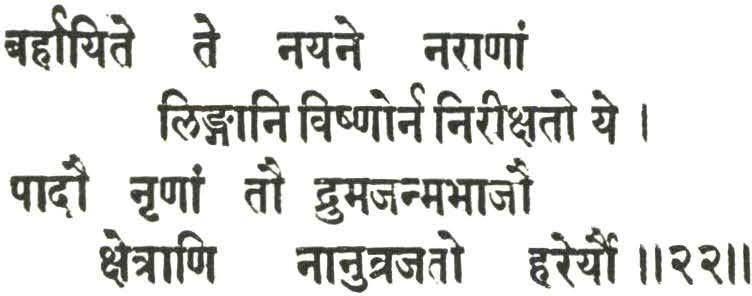
Text 22) Pure Devotional Service: The Change in Heart
159
of the family who is above twelve years of age should be initiated by a bona fide spiritual master,and all the members of the household should be engaged in the daily service of the Lord, beginning from morning (4 a.m.) tillnight (J 0 p.m.) by performing mangala-iiriitrika, niranjana, arcana, pujii, kirtana, srngiira, bhoga vaikiili, sandhyii-iiriitrika, patha, bhoga (at night), sayana-iiriitrika, etc. Engagement in such worship of the Deity, under the direction of a bona fide spiritual master, will greatly help the householders to purify their very existence and make rapid progress in spiritual knowledge. Simple theoretical book knowledge is not sufficient for a neophyte devotee. Book knowledge is theoretical, whereas the arcana process is practical. Spiritual knowledge must be developed by a combination of theoretical and practical knowledge, and that is the guaranteed way for attainment of spiritual perfection. The training of devotional service by a neophyte devotee completely depends on the expertspiritualmasterwho knows howto lead his disciple to make gradual progress towards the path back home, back to Godhead. One should not become a pseudo-spiritual master as a matter of business to meet one's family expenditure, but one must be an expert spiritualmaster to deliver the disciple from the clutches of impending death. Srila Visvanatha Cakravartl Thakur has defined the bona fide qualities of a spiritual master, and one of the verses in that description reads:
sri'-vigrahiiriidhana-nitya-niiniisrngiira-lan-mandira-miirjaniidau yuktasya bhaktiims ca niyunjato'pi vande guroft sri-carmy,iiravindam.

Sri-vigraha is the arcii or suitable worshipable form of the Lord, and the disciple should be engaged in worshiping the Deity regularly by srngiira, by proper decoration and dressing, as also mandira-miirjaniidau, the matter of cleansing the temple. The spiritual master teaches the neophyte devotee all these kindly and personally to help him gradually in the realization of the transcendental name, quality, form, etc., of the Lord.
Attention engaged in the service of the Lord, especially in dressing and decorating the temple, accompanied by musical ki'rtana and spiritual instructions from scriptures, can only save the common man from the hellish cinema attraction and rubbish sex-songs broadcast everywhere by radios. If one is unable to maintain a temple at home, he should go to another's temple where all the above performances are regularly executed. Visiting the temple of a devotee and looking at the profusely decorated
160 Srimad-Bhagavatam [Canto 2, Ch . 3
forms of the Lord well dressed in a well decorated sanctified temple naturally infuse the mundane mind with spiritual inspiration. People should visit holy places like Vrndavana where such temples and worship of the Deity are specifically maintained. Formerly all rich men like kings and rich merchants constructed suchtemples under the direction of expert devotees of the Lord, like the six Gosvamis, and it is the duty of the common man to take advantage of these temples and festivals observed in the holy pilgrimages by following the footprints of great devotees (anuvraja). One should not visit all these sanctified pilgrimages and temples with sightseeing in mind, but one must go to such templesand sanctified places immortalized by the transcendental pastimes of Lhc Lord and guided by proper men who know the science. This is called wwvraja. Anu means to follow. It is therefore best to follow the instruction of Lhc bona fide spiritual master, even in visiting temples and the holy places of pilgrimage. One who does not move in that way is as good as a standing tree condemned by the Lord not to move. The moving tendency of the human being is misused by visiting places for sightseeing. The best purpose of such traveling tendencies could be fulfilled by visiting the holy places established by great iiciiryas and thereby not being misled by the atheistic propaganda of moneymaking men who have no knowledge of spiritualmatters.
jivaiichavo bhiigavatiinghri-rer-um na jiitu mart_yo'bhilabheta yas tu sri-vi�r-u-padyii manu-jas tulasyiift svasaii chavo yas tu na veda gandham
jivan-whileliving; savaft-a dead body; bhiigavata-anghri-rer-um-dust of the feet of a pure devotee; na-never;jiitu- at any time; martyaft -mortal; abhilabheta- particularly received; yaft-a person; tu-but; sri-with opulence; v�r-u-padyiift-of the lotus feet of Vi�I).U; manu-jaft-a descendantof

Text 23) Pure Devotional Service: The Change in Heart 161
G\�l lii4Nijl¥f��'?.t " ��m���;:r�' ��'1'ltl if���!: �ij!i{§i}�;r��� ������
TEXT 23
Manu (a man); tulasyii�-leaves of the tulasi tree; svasan-while breathing; sava�-still a dead body; ya�-who; tu-but; na veda- never experienced; gandham-the flavor.
TRANSLATION

The person who has not at any time received the dust of the feet of a pure devotee of the Lord upon his head certainly is a dead body. And the person who has never experienced the flavor of the tulasi leaves from the lotus feet of the Lord is also a dead body, although breathing.
PURPORT
According to Snla Visvanatha Cakravarti Thakur, the breathing dead body is a ghost. When a man dies, he is called dead, but when he again appears in a subtle form not visible to the present vision and yet acts, such a dead body is called a ghost. Ghosts are always very bad elements, always creating a fearful situation for others. Similarly, the ghost-like nondevotees who have no respect for the pure devotees, nor for the Vi�!J.U Deity in the temples, create a fearful situation for the devotees at all times. The Lord never accepts any offering by such impure ghosts. There is a common saying that one should first love the dog of the beloved before one shows any loving sentiments for the beloved. The stage of a pure devotee is attained by sincerely serving a pure devotee of the Lord. The first condition of devotional service of the Lord is therefore to be a servant of a pure devotee, and this condition is fulfilled by the statement "reception of the dust of the lotus feet of a pure devotee who also served another pure devotee." That is the way of pure disciplic succession, or devotional paramparii.
Maharaja Rahuga!J.a inquired from the great saint Ja�bharata as to how he attained such a liberated stage of a paramahamsa, and in answer the great saint replied as follows:
rahiiga[Laitat tapasii na yiiti na cejyayii nirvapa[Liid grhiid vii na cchandasii naiva jaliigni-suryair vinii mahat-piida-rajo 'bhi§ekam
"0 King Rahuga!la, the perfectional stage of devotional service or the paramahamsa stage of life cannot be attained without being blessed by the
162 Srimad-Bhligavatam [Canto 2, Ch. 3
dust of thefeet ofgreat devotees. It isneverattained by tapasya (austerity), the Vedic worshiping process, acceptance of renounced order of life, the discharge of the duties ofhousehold life, the chanting of the Vedic hymns, or the performance of penances in the hot sun, within cold water or beforethe blazing fire."
In other words, Lord SriKr�r;ais theproperty of Hispure unconditional devotees, and as such only the devotees can deliver Kr�r;a to another devotee; Kr��1a is never obtainable directly. Lord Caitanya therefore designated Himself as the "gopi-bhartur diisa-diisa-diisiinudiisa," or "the most obedient servant of the servants ofthe Lord whomaintains the gopi damsels at V�ndavana." A pure devotee therefore never approaches the Lord directly, but tries to please the Lord's servant of servants, and thus the Lord becomes pleased, and the devotee then only can relish the taste of the tulasi leaves stuck to His lotus feet. In the Brahma-samhitii it is said that the Lord is never to be found by becoming a great scholar of the Vedic literatures, but He is very easily approachable through His pure devotee. In Vrndavana all the pure devotees pray for the mercy of Srlmatl Radharar;l,the pleasure potencyof Lord Kr�r;a. Srlmatl Radharii'!l is a tender-hearted feminine counterpart of thesupreme whole, resembling the perfectional stage of the worldly feminine nature. Therefore, the mercy of Radharar;l is available very readily by the sincere devotees, and once She recommends such a devotee to Lord Kr�r;a, the Lord at once accepts the devotee's admittance in His association. The conclusion is, therefore, that one should be more serious about seeking the mercy of the devotee than that of the Lord directly, and by doing so (by the good will of the devotee) the natural attraction for the service of the Lord will be revived.







Text 24) Pure Devotional Service: The Change in Heart 163
24 ea:�«l( � � � � � � iii� •nOJt�!! ri: ������ tad asmasiirarh hrdayarh batedam yad grhyamiirwir hari-niima-dheya* na vikriyetiitha yadii vikiiro netre jalarh giitra-ruhe�u har§a[l,
TEXT
tat-that;asmasiiram-is steel-framed;hrdayam-heart;batedam-certainly that; yat-which; grhyamiinai�-in spite of chanting; hari-niima-the holy name of the Lord;dheyai�-by concentration of the mind;na-does not; vikriyeta-change;atha-thus;yadii-when;vikiira�-reaction;netrein the eyes;jalam-tears;giitra-mhe§u-at the pores;har§a�-eruptions of ecstasy.
TRANSLATION
Certainly that heart is steel-framed which, in spite of chanting the holy name of the Lord with concentration, does not change when ecstasy takes place and tears fill the eyes and hairs stand on end.
PURPORT
We should note with profit that in the first three chapters of the Second Canto, a gradual process of development of devotional service is being presented. In the First Chapter the first step in devotional service for God consciousness by the process of hearing and chanting has been stressed, and a gross conception of the Personality of Godhead in His universal form for the beginners is recommended. By such a gross conception of God through the material manifestations of His energy, one is enabled to spiritualize the mind and the senses and gradually concentrate the mind upon Lord Vi�rw, the Supreme, who is present as the Supersoul in every heart and everywhere, in every atom of the material universe. The system of paiica-upiisanii, recommending five mental attitudes for the common man, is also enacted for this purpose, namely gradual development, worship of the superior that may be in the form of fire, electricity, the sun, the mass of living being, Lord Siva and at last, the impersonal Supersoul, the partial representation of Lord Vi�r;tu. They are all nicely described in the Second Chapter, but in the Third Chapter further development is prescribed after one has actually reached the stage of Viwu worship, or pure devotional service, and the mature stage of Vi�r;tu worship is suggested herein in relation to the change of heart.
The whole process of spiritual culture is aimed at changing the heart of the living being in the matter of his eternal relation with the Supreme Lord as subordinate servant, his eternal constitutional position. So with the progress of devotional service, the reaction of change in the heart is exhibited by gradual detachment from the sense of material enjoyment by a false sense of lording it over the world and an increase in the attitude of

164 Srimad-Bhagavatam [Canto 2, Ch. 3
rendering loving service to the Lord. Vidhi-bhakti, or regulated devotional service by the limbs of the body (namdy the eyes, the ears, the nose, the hands, the legs, as already explained hereinbefore), is now stressed herein in relation to the mind, which is the impetus of all activities of the limbs of the body. It isexpectedby allmeans that by discharging regulated devotional service one must manifest the change of heart. If there is no such change, the heart must be considered as steel-framed, for it is not melted even when thereis chanting of the holyname of Lhe Lord. We must always remember that hearing and chanting are the basic principles of discharging devotional duties, and if Lhcy are properly performed there will follow the reactional ecstasy with signs of lears in the eyes and standing of the hairs on the body. These arc natural consequences and are the preliminary symptoms of bhiiva stage, which occurs before one reaches the perfectional stage of prema, love of Godhead.

If the reaction does nol take place, even after continuous hearing and chanting of the holy name of the Lord, it may be considered to be due to offenses only. That is the opinion of the Sandharbha. In the beginning of chanting of the holy name of the Lord, if the devotee has not been very careful about evading the ten kinds of offenses at the feet of the holy name, certainly the reaction of feelings of separation will not be visible by tears in the eyes and standing of the hair on end.
The bhiiva stageismanifestedbyeighttranscendental symptoms, namely stuntedncss, perspiration, standing of hairs on end, failing in voice, trembling, paleness of the body, tears in the eyes and finally trance. The Nectar of Devotion, a summary study of Snla Rupa Gosvami's Bhaktirasiimrta-sindhu, explains those symptoms and vividly describes other transcendental developments, both in steady and accelerating manifestations.
Srila Visvanatha CakravartlThakur has verycritically discussed all these bhava displays inconnection with some unscrupulous neophyte's imitating the above symptoms for cheap appreciation. Not only Visvanatha Cakravarti but also Srila Rupa Gosviimi treated them very critically. Sometimes all the above eight symptoms of ecstasy are imitated by the mundane devotees (prakrta sahajiyas), but the pseudo symptoms are at once detected when one sees the pseudo devotee addicted to so many forbidden things. A person addicted to smoking, drinking or illegitimate sexwithwomen, even thoughdecoratedwith thesigns of a devotee, cannot have all the above-mentioned ecstatic symptoms. But it is seen that sometimes they are willfully imitated, and for this reason Srila Visvanatha Cakravartiaccuses the imitators of being stone-hearted men. They are even
Text 24] Pure Devotional Service: The Change in Heart 165
affected sometimes by the reflection of such transcendental symptoms, yet if they still do not give up the forbidden habits, then they are hopeless cases for transcendental realization.
When Lord Caitanya met Srila Ramananda Raya of Kavaur on the bank of Godavari, the Lord developed all these symptoms, but because of the presenceofsome nondevotee briihma!ws who were attendants of the Raya, the Lord surpressed these symptoms. So sometimes they are not visible even in the body of the first-class devotee for certain circumstantial reasons. Therefore real steady bhiiva is definitely displayed in the matter of cessation of material desires (k§iinti), utilization of every moment in the transccndental loving service of the Lord (avyiirtha-kiilatvam), eagerness for glorifying the Lord constantly (niima-giine sadii rnci), attraction for living in the land of the Lord (pritis tad-vasati sthale), complete detachment from material happiness (virakti), and pridelessness (miinasunyatii). One who has developed all these transcendental qualities is really possessed of the bhiiva stage, as distinguished from the stone-hearted imitator or mundane devotee.

The whole process can be summarized as follows: the advanced devotee who chants the holy name of the Lord in a perfectly offenseless manner and is friendly to everyone can actually relish the transcendental taste of glorifying Lhe Lord. And the result of such realization is reflected in the cessation of all material desires, etc., as mentioned above. The neophytes, due to their being in the lower stage of devotional service, are invariably envious, so much so that they invent their own ways and means of devotional regulations without following the iiciiryas. As such, even if they make a show of constantly chanting the holy name of the Lord, they cannot relish the transcendental taste of the holy name. Therefore, the show of tears in the eyes, trembling, perspiration or unconsciousness, etc., are all condemned. They can, however, get into touch with a pure devotee of the Lord and rectify their bad habits; otherwise they shall continue to be stone-hearted and unfit for any treatment. A complete progressive march on the return path home, back to Godhead, will depend on the instructions of the revealed scriptures directed by a realized devotee.
TEXT 25

166 Srimad-Bhagavatam [Canto 2, Ch. 3
11�'-\11

athabhidhehy miga mano'nukularh prabha§ase bhiigavata-pradhiinaJ:t yad aha vaiyasakir atma-vidyavisarado nrpatirh sadhu pr§taJ:t
atka- therefore; abhidhehi-please explain; miga-0 S uta Gosvami; manaJ:t-mind;anukulam-favorable to our mentality;prabha§ase-you do speak; bhagavata-the great devotee; pradhanaJ:t-the chief;yad aha-what he spoke ;vaiyasakiJ:t- Sukadeva Gosvami;atma-vidya-transcendentalknowledge; visaradaJ:t-expert; nrpatim-unto the king; sadhu-very good; pntaJ:t-being asked.
TRANSLATION
0 Siita Gosvami, your words are pleasing to our minds. Please therefore explain this to us as it was spoken by the great devotee Sukadeva Gosvami, who is very expert in transcendental knowledge, and who spoke to Maharaja Parilqit upon being asked.
PURPORT
Knowledge explained by the previous acarya like Sukadeva Gosvami and followed by the next like Siita Gosvami is always powerful transcendental knowledge, and it is therefore penetrating and useful to all submissive students.
Thus end the Bhaktivedanta purports of the Second Canto, Third Chapter, of the Srimad-Bhagavatam, entitled "Pure Devotional Service: The Change in Heart. "
Text 25] Pure Devotional
Service: The Change in Heart � �ttm�u�+tNQI��II<&:l � �l �:
167
CHAPTER FOUR
The Process of creation TEXT

suta uviica vaiyiisaker iti vacas tattva-niscayam iitmana�
upadhiirya matim kr§rte auttareya� satim vyadhiit
suta� uvaca- S i:i ta Gosvami said; vaiyasake�I-of Sukadeva Gosvami; itithus; vaca�-speeches; tattva-niscayam-that which verifies the truth; iitmana�-in the self; upadhiirya- ju st having realized; matim-concentrution of the mind; kr§rte-unto Lord Kr�t;�a; auttareya�-the son of Uttara; satim-chaste; vyadhiit-applied.
TRANSLATION
Suta Gosvami said: Maharaja Parikl?it, the son of Uttara, after hearing the speeches of Sukadeva Gosvami, which were all about the truth ofthe self, applied his concentration faithfully upon Lord Kr�J)a.
PURPORT
The word satim is very significant. This means existing and chaste. And both imports are perfectly applicable in the case of l\laharaja Parlk§it. The whole Vedic adventure is to draw one's attention entirely unto the lotus feet of Lord Kr§pa without any diversion, as it is instructed in the Bhagavad-gitii (Bg. 15.15). Fortunately Maharaja Parlk�it had already been attracted to the Lord from the very beginning of his body, in the womb of his mother. In the womb of his mother, he was struck by the brahmiistra
�qf:et' �ttl«%.f(ffr fl��f;{��;J: I � ijfif �itmnvff� n � 11
1 �
169
atomic bomb released by Asvatthama, but by the grace of the Lord he was saved from being burnt by the fiery weapon, and since then the King continually concentrated his mind upon Lord KH�a, which made him perfectly chaste in devotional service. So by natural sequence he was a chastedevoteeof the Lord, andwhen he further heard from Snla Sukadeva Gosvami that one should worship the Lord only and no one else, even though full of all desires or desireless, his natural affection for Kr��a was strengthened. We have already discussed these topics in this connection.
To become a pure devotee of Lord Kr��a, two things are very much essential, namely having a chance of being born in the family of a devotee and having the blessings of a bona fide spiritual master. By the grace of Lord Kr��a, Parik�it Maharaja had both opportunities. He was born in a family of devotees like the Pa��avas, and just to continue the dynasty of the Pa��avas, Maharaja PanK.�it was specifically saved by the Lord just to show special favor to the Pa��avas, and later on, by the arrangement of the Lord, Maharaja Parik�it was cursed by the boy of a briihmm;w and was able to get the association of a spiritual master like Sukadeva Gosvami. In the Caitanya-caritamrta it is said that a fortunate person, by the mercy of the spiritual master and Lord Kr��a, achieves the path of devotional service. This was perfectly applicable in the case of Maharaja Parik�it. By way of being born in the family of devotees, he automatically came in touch with K��a, and after being so contacted he constantly remembered Him. Consequently Lord Kr��a gave the King a further chance of development in devotional service by introducing him to Sukadeva Gosvami, a stalwart devotee of the Lord with perfect knowledge in self-realization. And by hearing from a bona fide spiritual master, he was perfectly able to concentrate his chaste mind further upon Lord Kr��a, as a matter of course.
TEXT 2

311��1Sli�IW11•11(4�fct�i! I
�:;:nN�� ���II"< II
iitma-jiiyii-sutiigiirapasu-dravirw-bandhu�u riijye ciivikale nityam
vimflhiim mamatiirh jahau
iitma-body; jiiyii-wife; suta-son; agiira-palace; pasu-horses and elephants; dravira-treasury house; bandhu�u-unto friends and relatives;
170 Srimad-Bhagavatam [Canto 2, Ch. 4
rajye-inthe kingdom; ca-also; avikale-without being disturbed; nityamconstant;virn�hiim-deep-rooted; mamatiim- affinity ; jahau - gave up.
TRANSLATION
Maharaja Parik�it, as a result of his wholehearted attraction for Lord Kr�!la, was able to give up all deep-rooted affection for his personal body, wife, children, palace, animals, horses and elephants, treasury house, friends and relatives, and his undisputed kingdom.
PURPORT
To become liberated means to become free from dehiitma-buddhi, the illusory attachment for personal bodily coverings and everything connected with the body, namely the wife, children and all other entanglements. One selects a wife for bodily comforts, and the result is children. For wife and children one requires a dwelling place, and as such the residential house is also necessary. The animals like horses, elephants, cows, dogs, etc., are all household animals, and a householder has to keep them as household paraphernalia. In the modern civilization the horses and elephants have been replaced by cars and conveyances with considerable horsepower. To maintain all the household affairs, one has to increase the bank balance and be careful about the treasury house, and in order to display the opulence of material assets, one has to keep good relations with friends and relatives, as well as become very careful about maintaining the status quo. This is called material civilization of material attachment. Devotion for Lord Kr�t�a means negation of a11 material attachments as detailed above. By the grace of Lord Kr�r;J.a, Maharaja Pari1(�it was awarded all material amenities and an indisputed kingdom to enjoy the undisturbed position of king, but by the grace of the Lord he was able to give up all connection with material attachment. That is the position of a pure devotee. Maharaja Parilqit, due to his natural affection for Lord Kr�':la as a devotee of the Lord, was always executing his royal duties on behalf of the Lord, and as a responsible king of the world he was always careful to see that the influence of Kali would not enter his kingdom. A devotee of the Lord never thinks of his household paraphernalia as his own, but surrenders everything for the service of the Lord. Thereby living entities under a devotee's care get the opportunity for God realization by the management of a devotee master.
Attachment for household paraphernalia and for Lord Krwa go poorly together. One attachment is the path of darkness, and the other attachment is the path of light. Where there is light, there is no darkness, and

Text 2) The Process of Creation 171
where there is darkness, there is no light. But an expert devotee can turn everythingto the path of light by service attitude of the Lord,and the best example here is the Pii��avas. Maharaja Yudhi�thira and householders like him can turn everything intolight by dovetailing the so-called material assets in the service of the Lord,but one who is not trained up or is unable toturneverythingtotheservice of the Lord (nirbandha� k[§[W-sambandhe) must give up all material connection before he can be fit to hear and chant the glories of the Lord, or in other words, one who has seriously heard Srimad-Bhagavatam for one day even, like Maharaja Parik�it, from a fit personality like Sukadeva Gosvami, may be able to lose all affinity for material things. There is no utility simply in imitating Maharaja Parik�it and hearing Bhi.igavatam from professional men, even for seven hundred years. To take Srimad-Bhi.igavatam as a means of maintaining family expenditure is the grossest type of ni.imi.ipari.idha offense at the feet of the Lord (sarva-subha-kriya-si.imyam api prami.idaft).
TEXTS 3-4

papraccha cemam eviirtham yan mi.irh prcchatha sattami.ift
kmranubhiiva-sravarte
sraddadhiino mahii-maniift
sarhsthiirh vijniiya sannyasya
karma
trai-vargikarh ca yat
viisudeve bhagavati
iitma-bhiivarh dp:Jharh gataft
papraccha-asked; ca-also; imam-this; eva-exactly like; arthampurpose; yat-that; miim-unto me; prcchatha-you are asking; sattamii/:t0 great sages; kr§rta-anu bhiiva-rapt in the thought of Kr��a; sravarte-in hearing; sraddadhiina�-full of faith; mahii-maniift-great soul; sarhsthiim-
172 Srimad-Bhagavatam [Canto 2, Ch. 4
� �en� �fliT � �: I ��� �� �;n: II� II �t� �� ��ffrt�� I �� �Fr ��� � il'Jt II 'd II
death; vijiiaya-being informed; sannyasya-renouncing; karma-fruitive activities; trai-vargikam-three principles of religion, economic development and sense gratification; ca-also; yat-what it may be; vasudeve-unto Lord Kr�r;ta; bhagavati-the Personality of Godhead; atma-bhavam-attraction of love; dn:lham-firmly fixed; gata[l-achieved.

TRANSLATION
0 great sages, the great soul Maharaja Parik�it, constantly rapt in the thought of Lord Kr�r;ta, knowing well of his imminent death, renounced all sorts of fruitive activities, namely acts of religion, economic development and sense gratification, and thus fixed himself firmly in his natural love for Kr�r;ta and asked exactly all these questions, as you are asking me.
PURPORT
The three actiVIties of religion, economic development and sense gratification are generally attractive for conditioned souls struggling for existence in the material world. Such regulated activities prescribed in the Vedas are called the karma-karu.Jiya conception of life, and householders are generally recommended to follow the rules just to enjoy material prosperity both in this life and in the next. Most people are attracted by such activities. Even in the activities of their modern godless civilization, people are more concerned with economic development and sense gratification without any religious sentiments. As a great emperor of the world, Maharaja Parik�it had to observe such regulations of the Vedic karmakarpiya section, but by the slight association with Sukadeva Gosvami he could perfectly understand that Lord Kf�p.a, the Absolute Personality of Godhead (Vasudeva), for whom he had a natural love since his birth, is everything, and thus he fixed his mind firmly upon Him, renouncing all modesof Vedickarma-kar,Piya activities. This perfectional stage is attained by a jiiiini after many, many births. The jiianis, or the empiric philosophers endeavoring for liberation, are thousands of times better than the fruitive workers, and out of hundreds of thousands of such jiianis one is liberated factually. And out of hundreds of thousands of such liberated persons, even one person is rarely found who can firmly fix his mind unto the lotus feet of Lord Sri Kr�r;ta, as it is declared by the Lord Himself in the Bhagavad-gitii (Bg. 7.19). Maharaja Parik�it is specially qualified with the
Texts 3-4] The Process of Creation 173
word mahiimanii�, which puts him on an equal level with the mahiitmiis described in the Bhagavad-gitii. In the later age also there were many mahiitmiis of this type, and they also gave up all karma-kiir-!f,iya conceptions of life, solely and wholly depending on the Supreme Personality of Godhead Kr�p.a. Lord Caitanya, who is Lord Kr�p.a Himself, taught us in His Sik§ii§takam:
iisli§ya vii piida-ratiirit pina�tu miim adarsaniin marma-hatiirit karotu vii yathii tathii vii vidadhiitu lampato mat-priirw-niithas tu sa eva niipara�.

"Lord Kr�p.a, who is the lover of many devotees (women), may embrace this fully surrendered maidservant or may trample me with His feet, or He may render me brokenhearted by not being present before me for a long duration of time, still He is nothing less than the Absolute Lord of my heart."
Snla Rupa Gosvami spoke thus:
viracaya mayi dar-!f,am dina-bandho dayiirit vii gatir iha na bhavatta� kiicid anyii mamiisti nipatatu sata-koti nirbhararit vii naviimbha� tad api kila payoda� stuyate ciitakena.
"0 Lord of the poor, do what you like with me, give me either mercy or punishment, but in this world I have none to look after except Your Lordship. The ciitaka bird always prays for the cloud, regardless of whether it showers. rains. or throws a thunderbolt."
Srlla Madhavendra Pur!, the grand-spiritual master of Lord Caitanya, took leave of all karma-kar�iya obligations in the following words:
sandhyii-vandana bhadram astu bhavato bho[l, sniina tubhyarit namo bho deva[l, pitaras ca tarpar-a-vidhau niiharit k§ama[l, k§amyatam yatra kviipi ni§adya yiidava-kulottamasya karitsa-dvi§a�
smiirarit smiiram agharit hariimi tad alarit manye kim anyena me.
"0 my evening prayer, all good unto you. 0 my morning bath, 1 bid you good-bye. 0 demigods and forefathers, please excuse me. I am unable to perform any more offering for your pleasures. Now I have decided to free myself from all reactions of sins simply by remembering anywhere and everywhere the great descendant of Yadu and the great enemy of Kamsa [Lord Kr�p.a] . I think this is sufficient for me. So what is the use of further endeavors?"
174 Srimad-Bhiigavatam [Canto 2, Ch. 4
The Process of Creation
Srila Madhavendra Purisaid further:

mugdham miim nigadantu niti-nipu[Lii bhriintam muhur vaidikiiJ:t
mandam biindhava-saiicayii jat;la-dhiyam muktiidariiJ:t sodariiJ:t
unmattam dhanino viveka-caturiiJ:t kiimam mahii-diimbhikam moktum na k§iimate maniig api mano govinda-piida-sprham.
"Let the sharp moralist accuse me of being illusioned; I do not mind it. Experts in Vedic activities may slander me as being misled, friends and relatives may call me frustrated, my brothers may call me a fool, the wealthy mammonites may point me out as mad, and the learned philosophers may assert that I am much too proud; still my mind does not budge im inch from the determination of serving the lotus feet of Govinda, though I be unable to do it."
And also Prahlada Maharaja said:
dharmiirtha-kiima iti yo'bhihitas trivarga ik§ii trayi naya-damau vividhii ca viirtii. manye tad etad akhilam nigamasya satyam sviitmiirpa[Larh svasuhrdaJ:t paramasya pumsaJ:t.
"Religion, economic development and sense gratification are celebrated as three means of attaining the path of salvation. Of these, ik§ii trayi especially, i.e., knowledge of the self, knowledge of fruitive acts and logic and also politics and economics, are different means of livelihood. All these are different subjects of Vedic education, and therefore I consider them temporary engagements. On the other hand, surrendering unto the Supreme Lord Vi��u is a factual gain in life, and I consider it the ultimate truth."
The whole matter is concluded in the Bhagavad-gitii (Bg. 2.41) as vyavasiiyiitmikii buddhiJ:t, or the absolute path ofperfection. Sri Baladeva Vidyabhu�a�a, a great Vai��ava scholar, defines this as bhagavad-arcaniiriipaika-ni§kiima-karmabhir visuddha-cittaJ:t, acceptingtranscendentalloving service of the Lord as the prime duty, free from fruitive reaction.
So Maharaja Parik�it was perfectly right when he accepted firmly the lotus feet of Lord Kf��a, renouncing all karma-kii[Ll}iya conceptions of life.
Texts 3-4]
175
TEXT 5 '{rnrerr;;r

ijl\'Rhf ;:r�) if�. ij��� ifcf1'N I qlttf�ij�� ��: �: �11�11
riijoviica samicinarh vaco brahman sarva-jiiasya taviinagha tamo visiryate mahyarh hare� kathayata� kathiim
riijii uviica-the King said; samicinam-perfectly right; vaca�- speeches; brahman-0 learned briihmarw; s arva-jii asya-one who knows all; tavayour; anagha-without any contamination; tama�-darkness of ignorance; viSiryate- gradually disappearing; mahyam-unto me; hare�- of the Lord; kathayata�-as youare speaking; kathiim- topics.
TRANSLATION
Maharaja Par�it said: 0 learned brahmap.a, you know everything because you are without material contamination. Therefore whatever you have spoken to me appears to be perfectly right. Your speeches are gradually destroying the darkness of my ignorance, for you are narrating the topics of the Lord.
PURPORT
The practical experience of Maharaja Paril(�it is disclosed herein, revealingthat transcendental topics of theLord act like injections when they are received by the sincere devotee froma person who is perfectly uncontaminated by material tinges. In other words, reception of the messages of Srimad-Bhiigavatam from professional men, heard by a karma-kiir-fliya audience, never acts miraculously as it is stated here. Devotional hearing of the messages of the Lord is not like hearing ordinary topics;therefore the action will be felt by the sincere hearer by experience of the gradual disappearance of ignorance.
yasya deve para bhaktir yathii deve tathii gurau. tasyaite kathitii hy arthii� prakiisante mahiitmanaft (Svetiisvatara Upani§ad 6.23)
176 Srimad-Bhagavatam
2, Ch. 4
[Canto
When a hungry man is given food to eat, he feels satiation of hunger and the pleasure of dining simultaneously. Thus he does not have to ask whetherhe has actuallybeen fed or not. The crucial test ofhearing SrimadBhiigavatam is that one should get positive enlightenment by such an act.
TEXT 6

bhuya eva vivitsiimi bhagaviin iitma-miiyayii yathedarh srjate viSvarh duroibhiivyam adhiSvara*
bhiiya[t-again; eva-also; vivitsiimi-I wish to learn; bhagaviin-the Personality of Godhead; iitma- personal ; miiyayii-by the energies; yathii-as; idam-this phenomenal world; srjate-does create; visvam-universe; durvibhiivyam-inconceivable ; adhisvaraih-by the great demigods.

TRANSLATION
I beg to know from you how the Personality of Godhead, by His personal energies, creates these phenomenal universes as they are, which are inconceivable even by the great demigods.
PURPORT
In every inquisitive mind the important question of the creation of the phenomenal world arises, and therefore for a personality like Maharaja PanK.�it, who was to know all activities of the Lord from his spiritual master, such inquiry is not uncommon. For every unknown thing, we have to learn and inquire from a learned personality. The question of creation is also one of such inquiries to be made from the right person. The spiritual master, therefore, must be one who is sarva-jiia, as stated hereinbefore in connection with Sukadeva Gosvami. Thus all inquiries on God which are unknown to the disciple may be made from the qualified
Text 6] The Process of Creation 177
spiritual master, and here the practical example is set by Maharaja Parik�it. It was, however, already known to Maharaja Parik�it that everything that we see is born out of the energy of the Lord, as we have all learnt in the very beginning of Srimad-Bhiigavatam (janmiidy asya yata[t). So MaharajaParik�it wanted toknow the process of creation. The origin of creation wasknowntohim; otherwisehe would not have inquired how the Personality of Godhead, by His different energies, creates this phenomenal world. The common man also knows that the creation is made by some creator and is not created automatically. We have no experience in the practical world that a thing is created automatically. Foolish people say thatthe creative energy is independent and acts automatically, as electrical energy works. Butthe intelligent manknowsthat eventhe electrical energy is generated by an expert engineer in the localized powerhouse, and thus the energy is distributed everywhere under the resident engineer's supervision. The Lord's supervision in connection with creation is mentioned even in the Bhagavad-gitii (Bg. 9.10), and it is clearly said there that material energy is a manifestation of one of many such energies of the Supreme (pariisya saktir vividhaiva sruyate). An inexperienced boy may be struck with wonder by seeing the impersonal actions of electronics or many other wonderful things conducted by electrical energy, but an experienced man knows that there is a living man behind the action, who creates suchenergy. Similarlythe so-called scholars andphilosophers ofthe world may, by mental speculation, present so many Utopian theories about the impersonal creation of the universe, but an intelligent devotee of the Lord, by studying the Bhagavad-gitii, can know that behind the creation is the hand of the Supreme Lord, just as in the generating electrical powerhouse there is the resident engineer. The research scholar finds out the cause and the effect of everything, and the research scholars as great as Brahma, Siva, Indra and many other demigods are sometimes bewildered by seeing the wonderful creative energy of the Lord, so what to speak of the tiny mundane scholars dealing in petty things. As there are differences in the living conditionsof different planets of the universe, and as one planet is superior to others, similarly the brains of the living entities in those respective planets are also of different categorical values. As it is stated in the Bhagavad-gitii, one can compare the long duration of life of the inhabitants of Brahmii's planet, which is inconceivable to the inhabitants of this planet earth, to the categorical value of the brain of Brahmiiji, also inconceivableby any great scientist of this planet. And with such high brain power, even Brahmiiji has described in his great Samhitii (Brahma-samhitii) as follows:

178 Srimad-Bhagavatam [Canto 2, Ch. 4
The Process of Creation
iSvara� parama� kmw�
sac-cid-iinanda-vigraha�
aniidir iidir govinda�
sarva-kiirar-a-kiirar-am
(Bs. 5.1)
Brahmiijladmits Lord Kmw to be the supreme cause of all causes. But persons with tiny brains within this petty planet earth think of the Lord as one of them. Thus when the Lord says in the Bhagavad-gitii that He (Lord Kr��a) is all in all, the speculative philosophers and the mundane wranglers deride Him, and the Lord regretfully says:
avajiinanti miim mut;lhii
miinu§irh tanum iisritam
param bhiivam ajiinanto
mama bhuta-mahesvaram.
(Bg. 9.11)

Brahmii and Siva (and what to speak of other demigods) are bhutas or created powerful demigods that manage universal affairs, much like min· isters who are appointed by the king. The ministers may be isvaras or controllers, but the Supreme Lord is mahe5vara or the creator of the controllers. Persons with a poor fund of knowledge do not know this, and therefore they have the audacity to deride Him because He comes before us by His causeless mercy occasionally as a human being. The Lord is not like the human being. He is sac-cid-iinanda-vigraha, or the Absolute Personality of Godhead, and there is no difference between His body and His soul. He is both the power and the powerful.
Maharaja Parik�it did not ask his spiritual master, Sukadeva Gosvami, to narrate Lord Kr��a's pastimes in Vrndavana, but he wanted to hear first about the creation of the Lord. Sukadeva Gosvami did not say that the King should hear about the direct transcendental pastimes of the Lord. The time was very short, and naturally Sukadeva Gosviimi could have gone directly to the Tenth Canto to make a shortcut of the whole thing, as it is generally done by the professional reciters. But neither the King nor the great speaker of Srimad-Bhagavatam jumped up like the organizers of Bhaga.vatam, but both of them proceeded systematically, so that both future readers and hearers may take lessons from the example of the procedure of reciting Srimad-Bhagavatam. Those who are in control of the external energyofthe Lord, orinother words those who are in the material
6]
Text
179
world, must first of all know how the external energy of the Lord is working under the direction of the Supreme Personality, and afterwards one may try to enter into the activities of His internal energy. The mundaners are mostly worshipers of Durga Devi, the external energy of �9'!a, but they do not know that Durga Devi is but the shadow energy of the Lord. Behind her astonishing display of material workings, the direction of the Lord is there, as it is confirmed in the Gitii (Bg. 9.10). The Brahma-samhitii affirms that Durga-sakti is working by the direction of Govinda, and without His sanction the powerful Durga-sakti cannot move even a blade of grass. Therefore the neophyte devotee, instead of jumping at once on the platform of transcendentalpastimes presented by the internal energy of the Lord, may know how great the Supreme Lord is by inquiring about the process of His creative energy. In the Caitanyacaritiimrta also, descriptions of the creative energy and the Lord's hand in il are explained, and the author of Caitanya-caritiimrta has warned the neophyte devotees to be seriously on guard against the pitfall of neglecting the knowledge about K��rya as to how great He is. Only when one knows Lord K�§rya's greatness can one firmly put one's unflinching faithin Him; otherwise, like the common man, Lord K�9'!a will be mistaken as one of the many demigods, or a historical personality, or a myth only, even by the great leaders of men. The transcendental pastimes of the Lord in V�ndavana, or even at Dvarakii, are relishable by persons who have already qualified themselves in advanced spiritual techniques, and the common man maybe able to attain to such a plane by the gradual process of service andinquiries, as we shall see in the behavior of Mahiir·aja Parik�?it.

180 Srimad - Bhagav at am [Canto 2, Ch. 4
TEXT 7 � mqp:ffir � ��ij- �: , ���RfiuqTf��wRti:�:� 1 �stfh��"J}tft�wr_��)fij :q II 1.911 yathii gopiiyati vibhur yathii sarhyacchate puna� yiirh yiirh saktim upii.sritya puru-sakt* para� pumiin
yathii- as; gopiiyati-maintains; vibhuft-the great; yathii-as; sarhyacchate-winds up;puna�-again ;yiirh yiim-as; saktim-energies; upiisrityabyemploying; pur u-saktift-the all-powerful;paraft-the Supreme; pumiinPersonality of Godhead; iitmiinam-plenary expansion; kriflayan-having engaged them; kriflan-as also personally being engaged; karoti- do them; vikaroti-and causes to be done;ca-and.
TRANSLATION

Kindly describe how the Supreme Lord, who is all-powerful, engages His different energies and different expansions in maintaining and again winding up the phenomenal world in the sporting spirit of a player.
PURPORT
In the Kathopani§ad the Supreme Lord is described as the chief eternal being amongst all other eternal individual beings (nityo nityiiniirh cetanas cetaniiniim) and the one Supreme Lord who maintains innumerable other individual living beings (eko bahiiniirh yo vidadhiiti kiimiin). So all living entities, both in conditioned state and in liberated state, are maintained by the Almighty Supreme Lord. Such maintenances arc effected by the Lord through His different expansions of Self and three principal energies, namely the internal, external and marginal energies. The living entities are His marginal energies, and some of them, in the confidence of the Lord, are entrusted with the work of creation also, as are Brahma, Marici, etc., and the acts of creation are inspired by the Lord unto them (tene brahma hrdii). The external energy {miiyii) is also impregnated with the jivas or conditioned souls. The unconditioned marginal potency acts inthespiritual kingdom, and the Lord, by His different plenary expansions, maintains them in different transcendental relations displayed in the spiritual sky. So the one Supreme Personality of Godhead manifests Himself in many (bahu syiima), and thus all diversities are in Him and He is in all diversities, although He is nevertheless different from all of them. That is the inconceivable mystic power ofthe Lord, and as such everything is simultaneously one and different from Him by His inconceivable potencies {acintyabhediibheda-tattva).
Text 7]
181
The Process of Creation iitmiinarh kriflayan kriflan karoti vikaroti ca
TEXT 8

;@ � Jm'l «®N��ut: I �f'ffimm ��� �� 11 � 11
nunarh bhagavato brahman
harer adbhuta-karmar-a� durvibhiivyam iviibhiiti
kavibhiS ciipi ce�fitam
nunam-still insufficient; bhagavata�-of the Personality of Godhead; brahman-0 learned briihmar-a; hare�-of the Lord; adbhuta-wonderful; karmara�-one who acts; durvibhiivyam-inconceivable ; iva-like that; iibhiiti-appears; kavibh*-even by the highly learned; ca-also ; api-in spite of; ce§titam-being endeavored for.
TRANSLATION
0 learned brahma�a, the transcendental activities of the Lord are all wonderful, and they appear to be inconceivable because even great endeavors by many learned scholars have still proved to be insufficient.
PURPORT
The acts of the Supreme Lord, in the creation ofjust this one universe, appear tobe inconceivably wonderful. Andthere are innumerable universes, and all of them aggregated together are known as the created material world. And this part of His creation is only a fractional portion of the complete creation. The material world stands as a part only (ekiirhsena sthito jagat). Supposing that the material world is a display of one part of His energy, the remaining three parts consist of the Vaikur-tha-jagat or spiritual world described in the Bhagavad-gitii as mad-dhiima or saniitanadhiima, or the eternal world. We have marked in the previous verse that He creates and again winds up the creation. This action is applicable in the material world only because the other greater part of His creation, namely the Vaiku�tha world, is neither created nor annihilated; otherwise the Vaiku!ltha-dhama would not have been called eternal. The Lord exists with dhiima; Hiseternal name, quality, pastimes, entourage and personality are all a display of His different energies and expansions. The Lord is
182 Srimad-Bhagavatam [Canto 2, Ch. 4
called aniidi, or having no creator, and iidi, or the origin of all. We think in our own imperfect way that the Lord is also created, but the Vedanta informs us that He is not created. Rather, everything else is created by Him (niiriiyap,a[l, paro'vyaktiit). Therefore for the common man these are all very wonderful matters for consideration. Even for the great scholars they are inconceivable, and thus such scholars present theories contradictory to one another. Even for the insignificant part of His creation, this particular universe, they have no complete information as to how far this limited space is extended, or how many stars and planets are there, or the different conditions of those innumerable planets. Modern scientists have insufficient knowledge of all this. Some of them assert that there are 100,000,000 planets scattered all over space. In a news release from Moscow dated 21/2/60, the following piece of knowledge was relayed:
"Russia's well-knownprofessorofastronomy Boris Vorontsov-Velianino said that there must be an infinite number of planets in the universe inhabited by beings endowed with reason.
"It could be that life similar to that on earth flourishes on such planets. "Doctor of Chemistry Nikolat Zhirov, covering the problem of atmosphere on other planets, pointed out that the organism of a Martian, for instance, could very well adapt itself to normal existence with a low body temperature.
"Hesaid thathefeltthat thegaseouscomposition of Martian atmosphere was quite suitable to sustain life of beings which have become adapted to it."
This adaptibility of an organism to different varieties of planets is described in the Brahma-samhitii as vibhuti-bhinnam, i.e., each and every one of the innumerable planets within the universe is endowed with a particulartype ofatmosphere,andtheliving beingsthere are more perfectly advanced in science and psychology because of a better atmosphere. Vibhuti means specific powers, and bhinnam means variegated. Scientists who are attempting to explore outer space and are trying to reach other planets by mechanical arrangements must know for certain that organisms adapted to the atmosphere of earth cannot exist in the atmospheres of other planets (Easy Journey to Other Planets). One has to prepare himself, therefore, to be transferred to a different planet after being relieved of the present body, as it is said inthe Bhagavad-gitii, yiinti deva-vratii deviin pitfn yiinti pitr-vratii� bhUtiini yiinti bhutejyii yiinti mad-yiijino 'pi miim: "Those who worship the demigods will take birth among the demigods; those who worship ghosts and spirits will take birth among such beings, and those who worship Me will live with Me." (Bg. 9.25)

Text 8] The Process of Creation 183
Maharaja Parlk�it's statement regarding the working of the creative energy of the Lord discloses that he knew everything of the process of creation. Why then did he ask Sukadeva Gosvami for such information? Maharaja Parlk�it, being a great emperor, a descendant of the Pap�avas and a great devotee of Lord Kr�pa, was quite able to know considerably about the creation of the world, but that much knowledge was not sufficient. He said therefore that even greatly learned scholars fail to know about that, even after great effort. The Lord is unlimited, and His activities are also unfathomed. Any living being, up to the standard of Brahmaji, the highest perfect living being within the universe, with a limited source of knowledge and with imperfect senses can never imagine knowing about the unlimited. We can know something of the unlimited when it is explained by the unlimited, as it hasbeen donebythe Lord Himself in the unique statements of the Bhagavad-gitii, and it can also be known to some extent from realized souls like Sukadeva Gosvami, who learned it from Vyasadeva, a disciple of Narada, and thus the perfect knowledge can descend by the chain of disciplic succession only, and not by any form of experimental knowledge, old or modern.

TEXT 9

yathii gu[tiims tu prakrter yugapat kramaio'pi vii bibharti bhurisas tv ekafl. kurvan karmiirti janmabhifl.
yathii-as they are; gu[tiin-the modes of; tu-but; prakrte[l-of the material energy; yugapat-simultaneously; kramasa[l-gradually; api-also; vii-either; bibharti-maintains; bhiiriSa[l-many forms; tu-but; eka[l-the supreme one; kurvan-acting; karmari- activities; janmabhifl.- by incarnations.
TRANSLATION
The Supreme Personality of Godhead is one, whether He alone acts with the modes of material nature, or simultaneously expands in many forms, or expands consecutively to direct the modes of nature.
184 Srimad-Bhagavatam [ Canf.u 2, Ch. 4
f4f�fffld�d� ;r;�'fG � � I
�i1lff'ot�:qu��ll� ll�oll
vicikitsitam etan me bravitu bhagaviin yathii siibde brahmar-i ni§r-iita[t parasmirhs ca bhaviin khalu
vicikitsitam-doubtful inquiry; etat-this; me-of me; bravitu-just clear up; bhagavan-powerful like the Lord; yathii-as much as; siibde-sound transcendental; brahmar-i-Vedic literature; ni§[tiita[t- fully realized; parasmin- in transcendence; ca-also; bhaviin-your good self; khalu-as a matter of fact.
TRANSLATION
Kindly clear up all these doubtful inquiries, because you are not only vastly learned in the Vedic literatures and self-realized in transcendence, but youare also a great devotee of the Lord, and therefore you are as good as the Personality of Godhead.
PURPORT

In the Brahma-sarhhitii it is said that the Supreme Absolute Truth, Govinda, the Personality of Godhead, although one without a second, is infallibly expanded by innumerable forms nondifferent from one another, and although He is the original person, He is still ever young with permanent youthful energy. He is very difficult to be known simply by learning the transcendental science of the Vedas, but He is very easily realized by His pure devotees.
The expansion of different forms of the Lord, as from Kr��a to Baladeva to Sankar�a�a, from Sankar�a�a to Vasudeva, from Vasudeva to Aniruddha, from Aniruddha to Pradyumna and then again to second Sankar�a�a and from Him to the Naraya�a-Puru�avataras, and innumerable other forms, which are compared to the constant flowing of the uncountable waves of a river, are all one and the same. They are like lamps of equal power which kindle from one lamp to another. That is the transcendental potencyof the
10)
Text
The Process of Creation TEXT 10
185
Lord. The Vedas say that He is so complete that even though the whole complete identity is emanated from Him, He still remains the same complete whole (pur[tasya purr-am adiiya purr-am eviivasisyate). As such, there is no validity in a material conception of the Lord by the mental speculators. Thus He remains always a mystery for the mundane scholar, even if he is vastly learned in the Vedic literatures (vede§u durlabham adurlabham iitma-bhaktau). Therefore, the Lord isbeyond thelimit of conception for mundane learned scholars, philosophers or scientists. He is easily understandable by the pure devotee because the Lord declares in the Bhagavad-gitii that after surpassing the stage of knowledge, when one is able to be engaged in the devotional service of the Lord, then only can one know the true nature of the Lord (Bg. 18.54). No one can have any clear conception of the Lord or His holy name, form, attributes, pastimes, etc., unless one is engaged in His transcendental loving service. The statement of the Bhagavad-gitii that one must first of all surrender unto the Lord, being freed from all other engagements, means that one must become a pure unconditional devotee of the Lord. Only then can one know Him by the strength of devotional service.
Maharaja Parik�it admitted in the previous verse that the Lord is inconceivable even for the greatest learned scholars. Why then should he again request Sukadeva Gosvami to clarify his insufficient knowledge about the Lord? The reason is clear. Sukadeva Gosviimi was not only vastly learned in the Vedic literatures, but he was also a great self-realized soul and a powerful devotee of the Lord. A powerful devotee of the Lord is, by the gr ce of the Lord, more than the �ord Himself. _ The Personality of Go?head Ramacandra attempted to bndge the Indian Ocean to reach the Island of Lanka, but Sri Hanumanji, the unalloyed devotee of the Personality of Godhead, could cross the ocean simply by jumping over it. The Lord is so merciful upon His pure devotee that He presents His beloved devotee as more powerful than Himself. The Lord expressed Himself to be unable to saveDurvasa Muni, although the Muni was so powerful that he could reach the Lord directly in these material conditions. But Durvasa Muni was saved by Maharaja Ambari�a, a devotee of the Lord. Therefore, a devotee of the Lord is not only more powerful than the Lord, but also worship of the devotee is considered more effective than direct worship of the Lord (mad-bhakta pujiibhyadhikii).


The conclusion is, therefore, that a serious devotee must first approach a spiritual master who is not only well versed in the Vedic literatures but is also a great devotee with factual realization of the Lord and His different energies. Without the help of such a devotee spiritual master, no one can

186 Srimad-Bhagavatam [Canto 2, Ch . 4
make progress in the transcendental science of the Lord. And a bona fide spiritual master like Sukadeva Gosvami does not speak about the Lord only in the matter of His internal potencies, but also explains how He associates with His external potencies.
The Lord's pastimes, in the internal potency, are displayed in His activities in Vrndavana, but His external potential works are directed in His features of Kara�aq1.avasayi Vi��u, Garbhodakasayi Vi��u, and K�irodakasayi Vi��u. Srila Visvanatha Cakravarti offers his good counsel to the interested Vai��avas when he says that they should not only be interested to hear about the Lord's activities (like riisa-lilii, etc.), but that they must be keenly interested in His pastimes in His features of the Puru�iivatiiras in connection with sr�ti-tattva, creational functions, following the examples of Maharaja Parik�it, the ideal disciple, and Sukadeva Gosvami, the ideal spiritual master.
TEXT ll


� �e{f:;;f
(t:9141li� mT ��?.T?( �: I
�'T�:a'l�\'ilt:� smr� 31�� II��II
siita uviica
ity upiimantrito riijiiii gu[tiinukathane hare� h�ikesam anusmrtya prativakturh pracakrame
siita uviica-Siita Gosvami said;iti-thus;upiimantrita�-beingrequested; riijiiii-by the King; gur-a-anukathane-in describing the transcendental attributes of the Lord;hare�-of the Personality of Godhead;hr�ikesamthe master of the senses;anusmrtya-properly remembering;prativaktumjust to reply;pracakrame-executed the preliminaries.
TRANSLATION
SiitaGosvamisaid, WhenSukadevaGosvamiwasthusrequestedbythe King to describe the creative energy of the Personality of Godhead, the former then systematically remembered the master of the senses [Sri Kr�!la],andtoreplyproperlyhespokethus.
Text ll] The Process of Creation 187
..:»
PURPORT
Thedevotees of the Lord, while delivering some speeches and describing the transcendental attributes of the Lord, do not think that they can do anything independently. They think that they can speak only what they are induced to speak by the Supreme Lord, the master of the senses. The senses of the individual being are not his own, and the devotee knows that such senses belong to the Supreme Lord and that they can be properly used when they are employed for the service of the Lord. The senses are instruments, and elements are ingredients, all endowed by the Lord; therefore whatever an individual can do, speak, see, etc., is under the direction of the Lord only. The Bhagavad-gitii confirms this (Bg. 15.15): saroasya ciiharh hrdi sannivi§to matta� smrtir jiiiinam apohanarh ca. No one is free to act freely and independently, and as such, one should always seek the permission of the Lord to do or eat or speak, and by the blessing of the Lord everything done by a devotee is beyond the principles of four defects typical of the conditioned soul.
TEXT 12 &T�<ii �etA

�'nroRm���
�3lt�P�I!j4cl��i{
sri suka uviica
nama� parasmai puru§iiya bhiiyase
sad-udbhava-sthiina-nirodha-lilayii
grhita-sakti-tritayiiya dehiniim
antarbhaviiyiinupalak§ya-vartmane
nama�-offering obeisances; parasmai-the Supreme; puru§iiya- Personality of Godhead; bhiiyase-unto the complete whole; sad-udbhavacreation of the material world; sthiina-its maintenance; nirodha-and its winding up; lilayii-by the pastime of; grhita-having accepted; saktipower; tritayiiya-three modes; dehiniim-of all who possess material
188 Srimad-Bhagavatam [Canto 2, Ch. 4
;p{: � � � (1�:�;H41tt��
II r�ll
bodies; antarbhaviiya-unto Him who resides within; anupalak§ya-incon
ceivable; vartmane-one who has such ways.
TRANSLATION
Sukadeva Gosvami said: Let me offer my respectful obeisances unto the Supreme Personality of Godhead who, for the creation of the material world,acceptsthethree modesofnature. He is the complete whole residing within the body of everyone, and His ways are inconceivable.
PURPORT
This material world is a manifestation of the three modes of goodness, passion and ignorance, and the Supreme Lord, for the creation, maintenance and destruction of the material world, accepts three predominating formsofBrahma, Vi�!lu and Sankara (Siva). As Vi�!lu He enters into every body materially created. As Garbhodakasayi Vi�!lu He enters into every universe, and as K�irodakasayi Viwu He enters in the body of every living being. Lord Sri Kr�!la, being the origin of all Vi§r-u-tattvas, is addressed here as paraf! pumiin, or Puru�ottama, as described in the Bhagavad-gitii (Bg. 15.18), or the complete whole. The puru§iivatiiras are therefore His plenary expansions. Bhakti-yoga is the only process by which one can become competent to know Him. Because the empiric philosophers and mystic yogis cannot conceive of the Personality of Godhead, He is called anupalak§ya-vartmane, the Lord of the inconceivable way, or bhakti-yoga.
TEXT 13

bhuyo namaf! sad-vrjina-cchide 'satam
asambhaviiyiikhila-sattva-murtaye

purhsiirh punaf! piiramaharhsya iisrame
vyavasthitiiniim anumrgya-diiSU§e
Text 13] The Process of Creation 189
� ;rq: (1!fifJt'1f�smn�mTRcr�(1��'{� ��:���
i!JPi4&\I'Mq II��II
Ql'4�ijlf11ij
bhuyaft-again; namaft-my obeisances; sat-of the devotees or of the pious; vrjina- distresses; chide-the liberator; asatiim-of the atheist, nondevotee demons; asambhaviiya-cessation of further unhappiness; akhilacomplete; sattva-goodness; murtaye-unto the Personality; purhsiim-of the transcendentalists; punaf!,-again; piiramaharhsye-highest stage of spiritual perfection; iisrame-in the status; vyavasthitiiniim-particularly situated; anumrgya-destination; diisu�e-one who delivers.
TRANSLATION
I again offer my respectful obeisances unto the form of complete existence and transcendence, who is the liberator from all distresses of the pious devotees and the destroyer of the further advances in atheistic temperament of the nondevotee demons. For the transcendentalists, who are situated in the topmost spiritual perfection, He grants their specific destinations.

PURPORT
Lord Sri Kr�rta is the complete form of all existence, both material and spiritual. Akhila means complete, or that which is not khila, inferior. As stated in the Bhagavad-gitii, there are two kinds of nature (prakrti), namely the material nature and the spiritual nature, or the external and internal potencies of the Lord. The material nature is called anarva, or inferior, and the spiritual nature is called superior or transcendental. Therefore the form of the Lord is not of the inferior material nature. He is complete transcendence. And He is miirti, or having transcendental form. The less intelligent men, who are unaware of His transcendental form, describe Him as impersonal Brahman. But Brahman is simply the rays of His transcendental body (yasya prabhii). The devotees, who are aware of His transcendental form, render Him service; therefore the Lord also reciprocates by His causeless mercy and thus delivers His devotees from all distresses. The pious men who follow the rulings of the Vedas are also dear to Him, and therefore the pious men of this world are also protected by Him. The impious and the nondevotees are against the principles of the Vedas, so such persons are always hampered from making advances in their nefarious activities. Some of them, who are specially favored by the Lord, are killed by Him personally, as in the cases of Ravarta, Hirartyakasipu, Kamsa, etc., and thus such demons get salvation and are thereby checked from further progress in their demoniac activities. Just like a kind father, either in His favor upon
190 Srimad-Bhagavatam [Canto 2, Ch. 4
thedevotees or Hispunishment of the demons, He isever kind to everyone because He is complete existence for all individual existence.

The paramahamsa stage of existence is the highest perfectional stage of spiritual values. According to Srimati Kuntidevi, the Lord is factually understood by the paramahamsas only. As there is gradual realization of the transcendence from impersonal Brahman to localized Paramatma to the Personality of Godhead, Puru�ottama Lord Kr��1a, similarly there is gradual promotion of one's situation in the spiritual life of sannyiisa. Kuticaka, bahiidaka, parivriijakiiciirya and paramahamsa are gradual progressive stages in the renounced order of life, sannyiisa, and Queen Kuntidevi, the mother of the Pap9-avas, has spoken about them in her prayers for Lord Kr�pa (CantoOne, ChapterEight). The paramaharhsas are generally !ound both among th� i�1personalists and thede�ote�s, but according to Snmad-Bhiigavatam (as It IS clearly stated by KunbdeVI), pure bhaktt-yoga is understood by the paramaharhsas, and she has especially mentioned that the Lord descends (paritrii[tiiya siidhiiniim) especially to award bhaktiyoga to the paramahamsas. So ultimately the paramaharhsas, in the true sense of the term, are unalloyed devotees of the Lord. Snla Jiva Gosvami has directly accepted that the highest destination is bhakti-yoga, by which one accepts the transcendental loving service of the Lord. Those who accept the path of bhakti-yoga are the factual paramahamsas.

Since the Lord is very kind to everyone, the impersonalists, who accept bhakti as the means of being merged in the existence of the Lord in His impersonal brahmajyoti, are also awarded their desired destination. He has assuredeveryone inthe Bhagavad-gitii: ye yathii miirh prapadyante. According to Srila Visvanatha Cakravarti, there are two classes of paramahamsas, namelythe brahmiinandis (impersonalists)and the premiinandis (devotees), and both are awarded their desired destinations, although the premiinandis are more fortunate than the brahmiinandis. But both the brahmiinandis and the premiinandis are transcendentalists, and they have nothing to do with the inferior material nature full of the existential miseries of life.


Text 14] The Process of Creation 191
TEXT 14 ;rijt��� N\N·i2P�il: fZt(tttQIRIIRfm <Nm �;mfGr�� ;rt{: II�\?II
namo namas te'stv r§abhiiya siitvatiim vidura-kii§thiiya muhu� ku-yoginiim nirasta-siimyiitiSayena riidhasii sva-dhiimani brahmari ramsyate nama�
. nama� namas te-let me offer my obeisances unto You; astu-are; nabhiiya-unto the great associate; siitvatiim-of the members of the Yadu dynasty; vidura-kii�thaya- one who is far from mundane wranglers; muhu� -always; ku-yoginiim-of the nondevotees; nirosta-vanquished; siimyaequal status; atisayena-by greatness; riidhasii- by opulence; sva-dhiimaniinHis own abode; brahmari-in the spiritual sky; ramsyate-enjoys; nama� -1 do bow down.
TRANSLATION
Let me offer my respectful obeisances unto Him who is the associate of the members of the Y adu dynasty and who is always a problem for the nondevotees. He is the supreme enjoyer of both the material and spiritual worlds, yet He enjoys His own abode in the spiritual sky. There is no one equal to Him because His transcendental opulence is immeasurable.
PURPORT
There are two sides of the transcendental manifestations of the Supreme Lord, Sri Kr��a. For the pure devotees He is the constant companion, as in the case of His becoming one of the family members of the Yadu dynasty, or His becoming the friend of Arjuna, or His becoming the associate neighbor of the inhabitants of Vrndavana, as the son of Nandayasoda, the friend of Sudama, Sridama and Madhumari.gala, or the lover of the damsels of Vrajabhumi, etc. That is part ofHis personal features. And by His impersonal feature He expands the rays of the brahmajyoti, which is limitless and all-pervasive. Part of this all-pervasive brahmajyoti, which is compared with the sun rays, is covered by the darkness of mahat-tattva, and this insignificant part is known as the material world. In this material world there are innumerable universes like the one we can experience, and in each of them there are hundreds of thousands of planets like the one we are inhabiting. The mundaners are more or less captivated by the unlimited expansion of the rays of the Lord, but the devotees are concerned more with His personal form, from which everything is emanating (janmiidy asya yata�). As the sun rays are concentrated in the sun disc, so

192 Srimad-Bhagavatam [Canto 2, Ch. 4
the brahmajyoti is concentrated inGoloka Vrndavana,thetopmost spiritual planetinthe spiritual sky. The immeasurable spiritual sky is full of spiritual planets, named Vaiku�thas, far beyond the material sky. The mundaners have no sufficient information of even the mundane sky, so what can they think of the spiritual sky? Therefore the mundaners are always far, far away from Him. Even if they are able to manufacture some machine, in the future, whose speed may be accelerated to the velocity of the air or mind, the mundaners will still be unable to imagine reaching the planets in the spiritual sky. So the Lord and His residential abode will always remain a myth or a mysterious problem, but for the devotees the Lord will always be available as an associate.
In thespiritualsky His opulence is immeasurable. The Lord resides in all the spiritual planets, or innumerable Vaiku�tha planets, by expanding His plenary portions along with His liberated devotee associates, but the impersonalists who want to merge in the existence of the Lord are allowed to merge as one of the spiritual sparks of brahmajyoti. They have no qualifications for becoming one of the associates of the Lord either in the Vaikur;Itha planets or in the supreme planet Goloka Vrndii.vana, described in the Bhagavad-gitii as the mad-dhiima, and here in this verse as the sva-dhiima of the Lord.
This mad-dhiima or sva-dhiima is described in the Bhagavad-gitii as follows:
na tad bhiisayate suryo na sasiihko na piivka[t yad gatvii na nivartante tad-dhiima paramam mama.
(Bg. 15.6)

The Lord's sva-dhiima does not require any sunlight or moonlight or electricityfor illumination. That dhiima, or place, is supreme, and whoever goes there never comes back to this material world.
The Vaikur;Itha planets and the Goloka Vrndii.vana planet are all selfilluminating, and the rays are scattered by those sva-dhiima of the Lord which constitute the existence of the brahmajyoti. It is further confirmed in the Vedas like the Mur-!laka, Katha and Svetiisvatara Upani§ads:
na tatra suryo bhiiti na candratiirakam nemii vidyuto bhiinti kuto ayam agnifl, tam eva bhiintam anubhiiti sarvam tasya bhiisii sarvam idam vibhiiti.
Text 14] The Process of Creation 193
In the sva-dhiima of the Lord there is no need of sun, moon, or stars for illumination. Nor is there need of electricity, so what to speak of ignited lamps? On the other hand, it is because of those planets being selfilluminating that all effulgencehas become possible, and whatever there is that is dazzling is due to the reflection of that sva-dhiima.
One who is dazzled by the effulgence of the impersonal brahmajyoti cannot know the personal transcendence; therefore in the lsopan�ad it is prayed that the Lord shift His dazzling effulgence so that the devotee can see the real reality. It is spoken thus:
hirar-mayena piitrer-a satyasyiipihitam mukham
tat tvam pii�ann apiivrr-u satya-dharmiiya dntaye.
"0 Lord, You are the maintainer of everything both material and spiritual, andeverything flourishesby Yourmercy. Your devotional service, or bhakti-yoga, is the actual principle of religion, satya-dharma, and I am engaged in that service. So kindly protect me by showing Your real face. Please,therefore,removetheveilof Your brahmajyoti rays so that I can see Your form of eternal bliss and knowledge."
TEXT 15

yat-kirtanam yat-smarar-am yad-ik§ar-am
yad-vandanam yac-chravar-am yad-arhar-am
lokasya sadyo vidhunoti kalma�am
tasmai subhadra-sravase nama nama�
yat-whose; kirtanam-glorification; yat-whose; smarar-am-remembrances; yat-whose; ik�ar-am-audience; yat-whose; vandanam-prayers ; yat-whose; sravar-am-hearing about; yat-whose ; arhar-am-worshiping; lokasya-of all people; sadya�-forthwith; vidhunoti-specifically cleanses; kalma§am-effects of sins; tasmai-unto Him; subhadra- all-auspicious; sravase-one who is heard; nama�-by due obeisances; nama{t-again and agam.
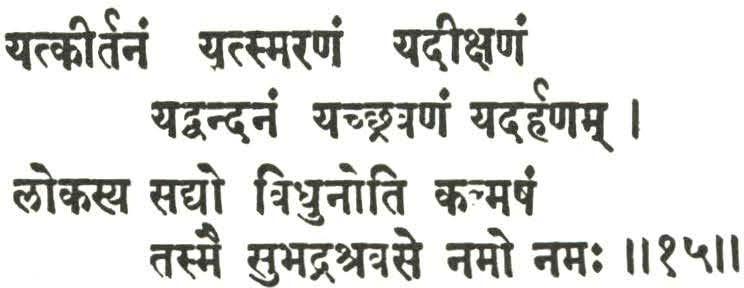
194 Srimad-Bhagavatam [Canto 2, Ch. 4
Let me offer my respectful obeisances unto the all-auspicious Lord Sri Kf�J)a, about whom glorification, remembrances, audience, prayers, hearing and worship can at once cleanse the effects of all sins of the performer.
PURPORT
The sublime form of religious performances to free oneself from all reactions of sins is suggested herein by the greatest authority, Sri Sukadeva Gosvami. Kirtanam, or glorifying the Lord, can be performed by very many ways, such as remembering, visiting temples to see the Deity, offering prayers in front of the Lord, and hearing recitations of glorification of the Lord as they are mentioned in the Srimad-Bhiigavatam or in the Bhagavadgitii. Kirtana can be performed both by singing the glories of the Lord in accompaniment with melodious music and by recitation of scriptures like Srimad-Bhiigavatam or Bhagavad-gitii.
The devotees may not be disappointed in the absence of the Lord physically, though they may think of not being associated with Him. The devotional process of chanting, hearing, remembering, etc., (either all or some of them, or even one of them) can give us the desired result of being associated with the Lord by discharging the transcendental loving service of the Lord in the above manner. Even the very sound of the holy name of Lord Kr�J)a or Rama can at once surcharge the atmosphere spiritually, and we must know definitely that the Lord is present wherever such pure transcendental service is performed, and thus the performer of offenseless kirtana has positive association with the Lord. Similarly, remembrance and prayers also can give us the desired result if they are properly done under expert guidance. One should not concoct forms of devotional service. One may worship the form of the Lord in a temple, or one may impersonally offer the Lord devotional prayers in a mosque or a church. One is sure to get free from the reactions of sins, provided one is very careful about not committing sins willingly in expectation of getting free from the reactions of sins by worshiping in the temple or by offering prayers in the church. This mentality of committing sins willfully on the strength of devotional service is called niimno baliit piipa-buddhily, the greatest offense in the discharge of devotional service. Hearing is, therefore, essential in order to keep oneself strictly on guard against such pitfalls of sins. And in order to give special stress to the hearing process, the Gosvami invokes all auspicious fortune in this matter.

Text 15) The Process of Creation 195
TRANSLATION
TEXT 16

vicak§a[tii yac-cararopasiidaniit swigarh vyudasyobhayato'ntar-iitmanaft vindanti hi brahma-gatirh gata-klamiis tasmai subhadra-sravase namo namaft
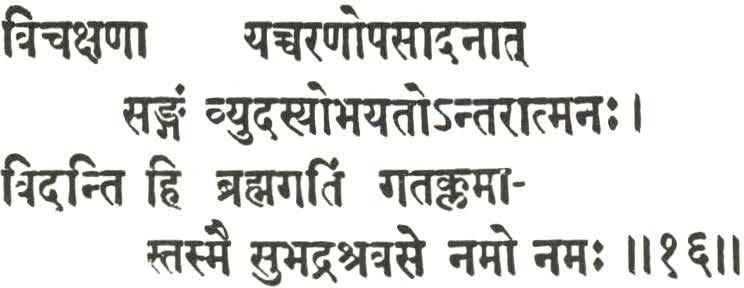
vic ak§ar-iift-highly intellectual; yat-whose ; carar-a-upasiidaniit-simply dedicating oneself unto the lotus feet; swi gam-attachment; vyudasyagiving up completely; ubhayata[t-for present and future existence; antariitmana[t-of the heart and soul; vindanti-moves progressively; hi-certainly; brahma-gatim-towards spiritual existence; gata-klamiift-without difficulty; tasmai-unto Him; subhadra-all-auspiciou s; sravase-unto one who is heard; namaft-my due obeisances; namaft -again and again.
TRANSLATION
Let me offer my respectful obeisances again and again unto the allauspicious Lord Sri Kr��a. The highly intellectual, simply by surrendering unto His lotus feet, are relieved of all attachments to present and future existences and without difficulty progress towards spiritual existence.
PURPORT
Lord Sri Kr��a has repeatedly instructed Arjuna, or for that matter everyone concerned with becoming His unalloyed devotee. In the last phase of His instruction in the Bhagavad-gitii (Bg. 18.64-66) He instructed most confidentially as follows:
sarva-guhyatamarh bhiiyaft snm me paramarh vaca[l
i§!o'si me dpjham iti tato vak§yiimi te hitam
manmanii bhava mad-bhakto madyiifi miirh namaskuru
miim evai§yasi satyarh te pratijiine priyo'si me
196
[Canto 2, Ch. 4
Srimad-Bhagavatam
The Process of Creation

"My dear Arjuna, you are very dear to Me, and therefore only for your good I will disclose the most secret part of My instructions. It is simply this: become a pure devotee of Mine and give yourself unto Me only, and I promise you full spiritual existence, by which you may gain the eternal right of transcendental loving service unto Me. Just give up all other ways of religiosity and exclusively surrender unto Me and believe that I will protect you from your sinful acts, and I shall deliver you. Do not worry any more."
Persons who are intelligent take serious notice of this last instruction of the Lord. Knowledge of the self is the first step in spiritual realization, which is called confidential knowledge, and a step further is God realization, which is called more confidential knowledge. The culmination of the knowledge of Bhagavad-gita is God realization, and when one attains this stage of God realization, he naturally, voluntarily becomes a devotee of the Lord to render Him loving transcendental service. This devotional service of the Lord is always based on love of God and is distinguished from the nature of routine service as prescribed in karma-yoga, jnana-yoga or dhyana-yoga. In the Bhagavad-gitii there are different instructions for such men of different categories, and there are various descriptions for van;tfisrama-dharma, sannyasa-dharma, yati-dharma, the renounced order of life, controlling the senses, meditation, perfection of mystic powers, etc., but one who fully surrenders unto the Lord to render service unto Him, out of spontaneous love for Him, factually assimilates the essence of all knowledge described in the Vedas. One who adopts this method very skillfully attains perfection of life at once. And this perfection of human life is called brahma-gati, or the progressive march in spiritual existence. As enunciated by Snl.a Jiva Gosvami on the basis of Vedic assurances, brahma-gati means to attain a spiritual form as good as that of the Lord, and in that form the liberated living being eternally lives on one of the spiritual planets situated in the spiritual sky. Attainment of this perfection of life is easily available to a pure devotee of the Lord without undergoing anydifficult method of perfection. Such a devotional life is full of kirtana, smara!J-a, ik§a!J-a, etc., as mentioned in a previous verse. One must therefore adopt this simple way of devotional life in order to attain the highest perfection available in any category of the human form of life in any part of the world. Lord Brahmii, when he met Lord Kr�r;ta as a playful child at Vrndavana, offered his prayer in which he said:
197
sarva-dharman parityajya mam ekam sararwm vraja aharh tvarh sarva-papebhyo mok§ayi§yfimi ma suca�
Srimad-Bhagavatam
sreya� srutirh bhaktim udasya te vibho klisyanti ye kevala-bodha-la bdhaye te�iim asau klesala eva si§yate niinyad yathii sthiila-tu§iivaghiitiniim. (Bhag. 10.14.4)
Bhakti-yoga is the highest quality of perfection to be achieved by the intelligent person in lieu of performing a large quantity of spiritual activities. The example cited here is very appropriate. A handful of real paddy is more valuable than heaps of paddy skins without any substance within. Similarly, one should not be attracted by the jugglery of karma-kiirfla or jii.iina-kiirfla or even the gymnastic performances of yoga, but skillfully should take to the simple performances of kirtanam, smararam, etc., under a bona fide spiritual master and without any difficulty attain the highest perfection.
TEXT 17

tapasvino diina-parii yasasvino manasvino mantra-vida[!. su-mangaliifl. k§emarh na vindanti vinii yad-arpararh tasmai subhadra-sravase namo nama[!.
tapasvina[l.-the great learned sages; diina-pariifl.-the great performer of charity; yasasvina[l.-the great worker of distinction; manasvina[l.-the great philosophers or mystics; mantra-vida[l.-the great chanter of the Vedic hymns; su-mangalii�-strict followers of Vedic principles; k§emamfruitful result; na-never; vindanti-attain; vinii-without; yad-arparamdedication; tasmai-unto Him; subhadra-auspicious; sravase-hearing about Him; nama[!.-my obeisances; nama[!.-again and again.
198
[Canto 2, Ch. 4
aqf€4;{1 � �� 'i�AA;ft'i�Ra::ij+{fi'el: I � ;{ f.l;:ifi=ij �;n � �ij �W-1� ;{'tl ;{lt: II�
\911
Let me offer my respectful obeisances unto the all-auspicious Lord Sri Kr��a again and again because the great learned sages, the great performers of charities, the great workers of distinction, the great philosophers and mystics, the great chanters of the Vedic hymns and the great followers of Vedic principles cannot achieve any fruitful result without dedication of such great qualities to the service of the Lord.
PURPORT
Advancement of learning, charitable disposition of mind, taking part in political, social or religious leadership of human society, philosophical speculations or the practice of the yoga system, becoming expert in the Vedic rituals, and all similar high qualities in man serve one in the attainment of perfection only when they are employed in the service of the Lord. Without such dovetailing , all such qualities become sources of trouble for people in general. Everything can either be utilized for one's own sense gratification or in the service of one other than oneself. There are two kinds of self-interest also, namely personal selfishness and extended selfishness. But there is no qualitative difference between personal and extended selfishness. Theft for personal interest or for the family interest is of the same quality-namely, criminal. A thief pleading not guilty because of committing theft not for personal interest but for the interest of society or country has never been excused by the established law of any country. People in general have no knowledge that the selfinterest of a living being attains perfection only when such an interest coincides with the interest of the Lord. For example, what is the interest of maintaining body and soul together? One earns money for maintenance of the body (personal or social), but unless there is God consciousness, unless the body is being properly maintained to realize one's relation with God, all good efforts to maintain body and soul together are similar to the attempts of the animals to maintain the body and soul together. The purpose of maintaining the human body is different from that of the animals.Similarly,advancement of learning, economic development, philosophical research, study in the Vedic literature or even the execution of pious activities (like charity, opening of hospitals, the distribution of food grains, etc.) should be done in relation with the Lord. The aim of all such acts and endeavors must be for the pleasure of the Lord and not for the

Text 17] The Process of Creation 199
TRANSLATION
satisfaction of any other identity, individual or collective (sarhsiddhir hari-to§arwm). In the Bhagavad-gitii also the same principle is confirmed (Bg. 9.27), and it is said there that whatever we may give in charity and whatever we may observe in austerity mustbe given over to the Lord or be done on His account only. The expert leaders of a godless human civilization cannot bring about a fruitful result in all their different attempts at educational advancement or economic development unless they are God conscious. And to become God conscious one has to hear about the allauspicious Lord, as He is describedin literature like the Bhagavad-gitii and Srimad-Bhiigavatam.





kiriita-hur-iindhra-pulinda-pulkasii iibhira-sumbhii yavanii� khasiidaya�
ye 'nye ca piipii yad-apiisrayiisrayii� sudhyanti tasmai prabhavi§r-ave nama�
kiriita-a province of old Bharata; hu r-a-part of Germany and Russia; iindhra-a province of Southern India; pulinda-the Greeks; pulkasii{tanother province; iibhira- part of old Sindh; sumbhii[t -another province; yavanii�- the Turks; khasa-iidaya[t-the Mongolian Province; ye-even those; anye-others; ca- also; piipii[t-addicted to sinful acts; yat-whose; apiisraya-iisrayii�-having taken shelter of the devotees of the Lord; sudhyanti-at once purified; tasmai-unto Him; prabhavi§r-ave-unto the powerful Vi�tm; nama[t-myrespectful obeisances.

TRANSLATION
Kirata, Hiina, Andhra, Pulinda, Pulkasa, Ahhira, Sumbha, Yavana and the Khasa races and even others who are addicted to sinful acts can be purified by taking shelter of the devotees of the Lord due to His being the supreme power. I beg to offer my respectful obeisances unto Him.
200 Srimad-Bhagavatam [Canto 2, Ch. 4
TEXT 18 amtl\�t:� lf.{f;(!(qij I it�:qqm�: ���SfliNwfet�:11��II
Kiriita: A province of old Bharatavaqa mentioned in the Bhi§ma Parva of Mahiibhiirata. Generally the Kiratas are known as the aboriginal tribes of India, and in modern days the Santa] Parganas in Bihar and Chota Nagpur might comprise the old province named Kirata.
Hur-a: The area of East Germany and part of Russia is known as the province of the Hiirtas. Accordingly, sometimes a kind of hill tribe is known as the Hiirtas·
Andhra: A province in Southern India mentioned in the Bhi�ma Parva Mahiibhiirata. It is still extant under the same name.
Pulinda: It is mentioned in the Mahiibhiirata, (Adi 174.38) viz.,the inhabitants of the province of the name Pulinda. This country was conquered by Bhimasena and Sahadeva. The Greeks are known as Pulindas, and it is mentioned in the Vana Parva of Mahiibhiirata that the non-Vedic race of this part of the world would rule over the world. This Pulinda Province was also one of the provinces of Bharata, and the inhabitants were classified amongst the k�atriya kings. But later on, due to their giving up the brahminical culture, they were mentioned as mlecchas (just as those who are not followers of the Islamic culture are called kafirs, and those who are not followers of the Christian culture are called heathens).
Abhira: This name also appears in the Mahiibhiirata, both in the Sabha Parva and Bhi�ma Parva. It is mentioned that this province was situated on the River Sarasvab in Sind. The modern Sind Province formerly extended on the other side of the Arabian Sea, and all the inhabitants of that province were known as the Abhiras. They were under the domination of Maharaja YudhiHhira, and, according to the statements of Markart�eya, the mlecchas of this part of the world would also rule over Bharata. Later on this proved to be true, as it was proved in the case of the Pulindas. On behalf of the Pulindas, Alexander the Great conquered India, and on behalf of the Abhiras, Mohammed Ghori conquered India. These Abhiras were also formerly k§atriyas within the brahminical culture, but they gave up the connection. But the k§atriyas, who were afraid of Parasurama and had hidden themselves in the Caucasian hilly regions, later on became known as the Abhiras, and the place they inhabited was known as Abhiradesa.

Sumbha or the Kaitkas: the inhabitants of the Kanka province of old Bharata, mentioned in the Mahiibhiirata.
Yavanas: Yavana was the name of one of the sons of Maharaja Yayati who was given the part of the world known as Turkey to rule over. Therefore the Turks are Yavanas due to being descendants of Maharaja Yavana.
Text 18] The Process of Creation 201
PURPORT
The Yavanas were therefore k�atriyas, and later on, by giving up the brahminical culture, they became mleccha yavanas. Descriptions of the Yavanas are inthe Mahiibhiirata (Adi 85.34). Another prince ofTuvasu was alsoknown as Yavana, and his country was conquered by Sahadeva, one of the Pa!J.�avas. The western Yavana joined with Duryodhana in the Battle of Kuruk�etra under the pressure of Kar!J.a. It is also foretold that these Yavanas also would conquer India, and it proved to be true.


Khasiidaya: The inhabitants of the Khasade�a are mentioned in the Mahiibhiirata (Drofla Parva). Those who have a stunted growth of hair on the upper lip are generally called Khasas. As such, the Khasadayas are the Mongolians and the Chinese and others who are so designated.
The above-mentioned historical names are different nations of the world. Even those who are constantly engaged in sinful acts are all corrigible to the standard of perfect human beings if they take shelter of the devotees of the Lord. Jesus Christ and Hajral Mohammed, two powerful devotees of the Lord, have done tremendous service on behalf of the Lord on the surface of the globe. And from the version of Srila S�kadeva Gosvami it appears that instead of running a godless civilization in the present context of the world situation, if the leadership of world affairs is entrusted to the devotees of the Lord, for which a worldwide organization under the name and style ofThe International Society for Krishna Consciousness has already been started, then by the grace of the Almighty Lord there can be a thorough change of heart in human beings all over the world because the devotees of the Lord are able authorities to effect such a change by purifying the dust-worn minds of the people in general.The politicians of the world may remain in their respective positions because the pure devotees of the Lord are not interested in political leadership or diplomatic implications. The devotees are interested only in seeing that the people in general are not misguided by political propaganda and in seeing that the valuable life of a human being is not spoiledin foUowing a type of civilization which is ultimately doomed. If the politicians would, therefore, be guided by the good counsel of the devotees, then certainly there would be a great change in the world situation by the urifying propaganda of the devotees, as shown by Lord Caitanya. As Sukadeva Gosvami began his prayer by discussing the word yat-kirtanam, so also Lord Caitanya recommended that simply by glorifying the Lord's holy name, a tremendous change of heart can Lake place by which the complete misunderstandingbetween the human nations, created by politicians, can at once be extinguished. And after the extinction of the fire of misunderstanding, other profits will follow. The destination is to go back

202 Srimad-Bhagavatam [Canto 2, Ch. 4
home, hack to Godhead, as we have several times discussed in these pages.
According to the cult of devotion, generally known as the Vai§!J.ava cult, there is no bar for anyone to advance in the matter of God realiza· tion. A Vai§�tava is powerful enough to turn into a Vai§�lava even the Kirata, etc., as above mentioned. In the Bhagavad-gitii also it is said by the Lord (Bg. 9.32) that there is no bar to becoming a devotee of the Lord (even for those who are low-horn, or women, siidras or vaiSyas), and by becoming a devotee everyone is eligible to return home, back to Godhead. The only qualification is that one take shelter of a pure devotee of the Lord who has thorough knowledge in the transcendental science of Kr§!la (Bhagavad-gitii and Srimad-Bhiigavatam). Anyone from any part of the world who becomes well conversant in the science of Kr§�la becomes a puredevotee and a spiritual master for the general mass of people and may reclaim them by purification of heart. A person, though he be even the most sinful man, can at once be purified by systematic contact with a pure Vai§!J.ava. A Vai§!J.ava, therefore, can accept a bona fide disciple from any part of the world without any consideration of caste and creed and promote him by regulative principles to the status of a pure Vai§tlava who is transcendental to hrahminical culture. The system of caste, or varriisrama-dharma, is no longer regular even amongst the so-called followers of the system. Nor is it now possible to reestablish the institutional function in the present context of social, political and economic revolu· tion. Without any reference to the particular custom of a country, one can be accepted to the Vai§!J.ava cult spiritually, and there is no hindrance in the transcendental process. So by the order of Lord Sri Caitanya Mahaprabhu, the cult of Srimad-Bhiigavatam or the Bhagavad-gitii can be preached all over the world, reclaiming all persons willing to accept the transcendental cult. Such cultural propaganda by the devotees will cer· tainly be accepted by all persons who are reasonable and inquisitive, without any particular bias for the custom of the country. The Vai§!J.ava never accepts another Vaiwava on the basis of birthright, just as he never thinks of the Deity of the Lord in a temple as idol worship. And to remove all doubts in this connection, Sri1a Sukadeva Gosvami has invoked the blessings of the Lord, who is all-powerful (prabhavi§rave namah). As the all-powerful Lord accepts the humble service of His devotee in devotional activities of the arcana, His form as the worshipable Deity in the temple, similarly the body of a pure Vai§!lava changes transcendentally at once by giving himself up to the service of the Lord and training by a qualified Vai§ttava. The injunction of Vai§ttava regulation in this connection runs

Text 18] The Process of Creation 203
as follows: (arcye vi§rwu siladhir guru§u nara-matir vai§rwve jiiti-buddhi� sri-vi§[!Or niimni sabda-siimiinya-buddhi�, etc.) "One shouldnotconsider the Deity of the Lord as worshiped in the temple to be an idol, nor should one consider the authorized spiritual master as an ordinary man. Nor should one consider a pure Vai�ttava to belong to a particular caste, etc."




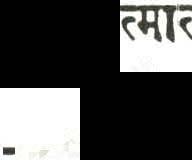
The conclusion is that the Lord, being all-powerful, can, under any and every circumstance, accept anyone from any part of the world, either personally or through His bona fide manifestation as the spiritual master. Lord Caitanya accepted many devotees from communities other than the varriisramites, and He Himself declared, to teach us, that He does not belong to anycaste or social order of life, but that He is the eternal servant of the servant of the Lord who maintains the damsels of Vrndavana (Lord Kr�tta). That is the way of self-realization.
TEXT 19

sa e§a iitmiitmavatiim adhisvaras trayimayo dharmamayas tapomaya� gata-vyallkair aja-sankariidibhir vitarkya-liligo bhagaviin prasidatiim
sa�-He; esa�-it is; iitmii-Supersoul; iitmavatiim-of the self-realized souls; adhiSvara�-the Supreme Lord; trayimaya[1-personified Vedas; dharmamaya�-personifiedreligiousscripture; tapomaya�-personified austerity; gata-vyallkaifl-by those who are above all pretensions; aja-Brahmiiji; sankara-iidibhi�-by Lord Siva and others; vitarkya-linga�-one who is observed with awe and veneration; bhagaviin-the Personality of Godhead ; prasidatiim-be kind toward me.
TRANSLATION
He is the Supersoul and the Supreme Lord of all self-realized souls. He is the personification of the Vedas, religious scriptures and austerities. He
204 Srimad-Bhagavatam [Canto 2, Ch. 4
ij'
� 3\k'ii�'{'E{ijl'il:it��<ftqq') �4{4{ijwil4i4: I •tac.t��1�N1�1�<1Rf)tl{tf.{F{ tI��II
is worshiped by Lord Brahmii and Siva and all those who are transcendental to all pretensions. Being so revered with awe and veneration, may that Supreme Absolute be pleased with me.
PURPORT

The Supreme Lord, the Personality of Godhead, although the Lord of all followers of different paths of self-realization, is knowable only by those who are above all pretensions. Everyone is searching for eternal peace or eternal life, and with an aim to this destination everyone is either studying Vedic scriptures or other religious scriptures or undergoing severe austerity as empiric philosophers, as mystics yogis or as unalloyed devotees, etc. But the Supreme Lord is perfectly realized by the devotees only because they are above all pretensions. Those who are on the path of selfrealization are generally classified as karmis, jniinis, yogis, or devotees of the Lord. The karmis, who are much attracted by the fruitive activities of the Vedic rituals, are called bhukti-kiimi, or those who desire liberation from material existence. The mystic yogis, who practice different types of austerities for attainment of eight kinds of material perfections and who ultimately meet the Supersoul Paramiitmii in trance, are called siddhikiimi, or those who desire the perfection of becoming finer than the finest, heavier than the heaviest, and who desire to get everything desired, to have control over everyone, to create everything liked, etc. All these are capacities of a powerful yogi. But the devotees of the Lord do not want anything like that for self-satisfaction. They want only to serve the Lord because the Lord is great, and as living entities they are eternally subordinate parts and parcels of the Lord. This perfect realization of the self by the devotee helps him to become desireless, to desire nothing for his personal self, and thus the devotees are called n4kiimi, without any desire. A living entity, by his constitu tional position, cannot be void of all desires (the bhukti-kiimi, mukti-kiimi and siddhi-kiimi all desire something for personal satisfaction), but the ni§kiimi devotees of the Lord desire everything for the satisfaction of the Lord. They are completely dependent on the orders of the Lord and are always ready to discharge their duty for the satisfaction of the Lord.
In the beginning Arjuna placed himself as one of those who desire selfsatisfaction, for he desired not to fight in the Battle of Kuruk�etra, but to make him desireless the Lord preached the Bhagavad-gitii, in which the ways of karma-yoga, jniina-yoga, hatha-yoga, and also bhakti-yoga were explained. Because Arjuna was without any pretension, he changed his
Text 191 The Process of Creation 205
decision and satisfied the Lord by agreeing to fight (lwri§ye vacanarh tava), and thus he became desireless.
The examples of Brahma and Lord Siva are specifically cited here because Brahmaji, Lord Siva, Srimati Lal\:�miji and the four Kumaras, Sanaka, Sanatana, etc., are leaders of the four desireless V ai�rava sampradiiyas. They are all freed from all pretensions. Srila Jiva Gosvami interprets the word gata-vyalikaift as projjhita-kaitavai[t, or those who are freed from all pretensions (the unalloyed devotees only). In the Caitanya-caritamrta it is said: bhukti-mukti siddhi-kiimi, sakali 'asiinta,'kmw-bhakta-n4kiima, ata eva 'santa.' Those who are after fruitive results for their pious activities, those who desire salvation and identity with the Supreme, and those who desire material perfections of mystic powers are all restless because they want something for themselves, but the devotee is completely peaceful because he has no demand for himself and is always readyto serve the desire of the Lord. The conclusion is, therefore, that the Lord is for everyone because no one can achieve the result of his respective desires without being sanctioned by Him, but as stated by the Lord in Bhagavad-gitii (Bg. 8.9), all such results are awarded by Him only, for the Lord is adhisvara (the original controller) of everyone, namely the Vediintists, the great karma-kiirt!liyas, the great religious leaders, the great performers of austerity and all who are striving for spiritual advancement. But ultimately He is realized by the pretensionless devotees only. Therefore special stress is given to the devotional service of the Lord by Srila Sukadeva Gosvami.
TEXT 20

�: qf<p��qRt: SNIIqRT
� qRtffiEhq��:
-tRPtRf�Wj('(j�ijj
Sffil(((liitlltFfF{m1JRJ: II0( o II
sriyaf! patir yajfia-pati[t prajii-patir dhiyiirh patir loka-patir dharii-patif! patir gatis ciindhaka-vnrti-siitvatiirh prasidatiirh me bhagaviin satiirh patif!
sriyaf!-all opulence; patif!- owner ; yajfia-of sacrifice; patifl-director; prajii-patif!-leader of all living entities; dhiyiim-of intelligence; pati[t-
206 Srimad-Bhagavatam [Canto 2, Ch. 4
master; loka-pati�-proprietor of all planets; dhara-earth; pat*-the supreme; pat*- head; gat*-destination; ca-also; andhaka-one of the kings of the Yadu dynasty; vmti-the first king of the Yadu dynasty; satvatam-the Yadus; prasidatam--be merciful; me-upon me; bhagavanLord Sri Kr�rta; satam-of all devotees; pati�-Lord.
TRANSLATION

May Lord Sri Kr�tJ.a, who is the worshipable Lord ofall devotees, the protector and glory of all the kings like Andhaka and V r�rti of the Yadu dynasty, the husband of all goddesses of fortune, the director ofall sacrifices and therefore the leader of all living entities, the controller of all intelligence, the proprietor of all planets, spiritual and material, and the supreme incarnation on the earth (the supreme all in all), be merciful uponme.
PURPORT
Since Sukadeva Gosviimi is one of the prominent gata-vyalikam, who are freed from all misconceptions, he therefore expresses his own realized perception of Lord Sri Kr�p.a as His being the sum total of all perfection, the Personality of Godhead. Everyone is seeking the favor of the goddess of fortune, but they do not know that Lord Sri Kr�rta is the beloved husband of all goddesses of fortune. In the Brahma-sarhhita it is said that the Lord, in His transcendental abode of Goloka V rndiivana, is accustomed to herding the surabhi cows and is served there by hundreds of thousands of goddesses of fortune. All these goddesses of fortune are manifestations of His transcendental pleasurepotency (hliidini-sakti) in His internal energy, andwhen the Lord manifested Himself on this earth He partially displayed the activities of His pleasure potency in His riisa-lilii just to attract the conditioned souls who are all after the phantasmagoria pleasure potency in degraded sex enjoyment. The pure devotees of the Lord like Sukadeva Gosvami, who is completely detached from the abominable sex life of the material world, discussed this act of the Lord's pleasure potency certainly not in relation to sex, but to relish a transcendental taste inconceivable by the mundaners who are after sex life. Sex life in the mundane world is the root-cause of being conditioned by the shackles of illusion, and certainly Sukadeva Gosvami was never interested in the sex life of the mundane world. Nor does the manifestation of the Lord's pleasure potency have any connection with such degraded things. Lord Caitanya was a strict sannyasi, so much so that He did not allow any woman to come near Him,
Text 20] The Process of Creation 207
not even to bow down and offer respects. He never even heard the prayers of the devadiisis offered in the temple of J agannatha because a sannyiisi is forbidden to hear songs sung by the fair sex. Yet even in the rigid position of a sannyiisi He recommended the mode of worship preferred by the gopis of vrndavana as the topmost loving service possible to be rendered to the Lord. And Srimati Radhara�i is the principal head of all such goddesses of fortune, and therefore She is the pleasure counterpart of the Lord and is nondifferent from Kr��a.
In the Vedic rituals there are recommendations for performing different types of sacrifice in order to achieve the greatest benefit of life. Such benedictions as the result of performing great sacrifices are, after all, some favors given by the goddess of fortune, and the Lord, being the husband or lover of .the goddess of fortune, factually is the Lord of all sacrifices also. And He is the final enjoyer of all kinds of yajiia; therefore Yajiiapati is another name of Lord Viwu. It is recommended in the Bhagavad-gitii that everything should be done for the Yajiiapati (yajiiiirthe kuru karmiir-i), otherwise acts will be the cause of conditioning by the law of material nature. Those who are not freed from all misconceptions (vyalikam) perform sacrifices to please the minor demigods, but the devotees of the Lord know very well that Lord Sri Kr��a is the supreme enjoyer of all performances of sacrifices; therefore they perform the sarikirtana-yajiia (sravanam kirtanam vi§r-o�), especially recommended in this age of Kali. In Kali-yuga, performance of other types of sacrifice is not feasible due to insufficient arrangement and inexpert priesthood.
We have information from the Bhagavad-gitii (Bg. 3.9-10) that Lord Brahma, after giving rebirth to the conditioned souls within the universe, instructed them to perform sacrifices and to lead a prosperous life. By such sacrificial performances the conditioned souls will never be in difficulty to keep body and soul together. Ultimately they can purify their existence. They will find natural promotion into spiritual existence, the real identity of the living being. A conditioned soul should never give up the practice of sacrifice, charity and austerity, in any circumstances. The aim of all such sacrifices is to please the Yajfiapati, the Personality of Godhead; therefore the Lord is also Prajiipati. According to the Kathopani§ad, the one Lord is the leader of the innumerable living entities. The living entities are maintained by the Lord (eko bahiiniirh yo vidadhiiti kiimiin). The Lord is called, therefore, the supreme bhiita-bhrt, or maintainer of all living beings.
Living beings are endowed with intelligence proportionately in terms of their previous activities. All living beings are not equally endowed with

208 Srimad-Bhagavatam [Canto 2, Ch. 4
the same quality of intelligence because behind such development of intelligencethe control of the Lord is there,as is declared in the Bhagavadgitii (Bg. 15.15). As Paramiitma, Supersoul,the Lord is living in everyone's heart, and from Him only one's power of remembrance, knowledge and forgetfulness follows (mattal;t smrtirjniinam apohanam ca). Oneperson can sharply remember past activities by the grace of the Lord while others cannot.One is highly intelligent by the grace of the Lord,and oneis afool by the same control. Therefore the Lord is dhiyiim pat*, or the Lordof intelligence.
The conditioned souls strive to become lords of the material world. Everyone is trying to lord it over the material nature by applying his highestdegreeofintelligence.Thismisuseofintelligenceby the conditioned soul is called madness. One'sfull intelligence should beapplied to get free from the material clutches. But the conditioned soul,due tomadnessonly, engages hisfullenergyandintelligence in sense gratification,and to achieve this end of life he willfully commits all sorts of misdeeds,and the result is that instead of attaining unconditional life of full freedom, the mad conditionedsoul is entangled again and again in different types of bondage in material bodies. Everything that we see in the material manifestation is but the creation of the Lord. Therefore He is the real proprietor of everything in the universes. The conditioned soul can enjoy a fragment of this material creation under the control of the Lord but not selfsufficiently. That is the instruction in the fsopani�ad. One should be satisfied with things which are awarded by the Lord of the universe. It is out of madness only that one tries to encroach upon another's share of material possession.
The Lord of the universe, out of His causeless mercy upon the conditioned souls, descends by His own energy (iitma-miiyii) to reestablish the eternal relation of the conditioned souls withthe Lord. He instructs all to surrender unto Him instead of falsely claiming to be enjoyers for a certain limit under His control. When He so descends He proves how much greater is His ability to enjoy, and He exhibits His power of enjoyment by (for instance) marrying 16,000 wives at once. The conditioned soul is very proudofbecoming the husband of even one wife, but the Lord laughs, and so the intelligent man can just know who is the real husband. Factually, the Lord is the husband of all women in the creation of the Lord, but a conditioned soul under the control of the Lord feels proud to become the husband of one or two wives.
All these qualifications as the different types of pati mentioned in this verse are meant for Lord Sri Kr�!la, and Sukadeva Gosvami has therefore

Text 20] The Process of Creation 209
specially mentioned the pati and gati of the Y adu dynasty. The members of the Yadu dynasty knew that Lord Sri Kr�!la is everything, and all of them intended to return to Lord Kr��a after He had finished His transcendental pastimes on the earth. The Yadu dynasty was annihilated by the will of the Lord because the members had to return home with the Lord. The annihilation of the Yadu dynasty was a material show created by the Supreme Lord; otherwise the Lord and the members of the Yadu dynasty are all eternal associates. The Lord is therefore the guide of all devotees, and as such, Sukadeva Gosvami offered Him due respects with love-laden feelings.

yad-anghry-abhidhyiina-samiidhi-dhautayii
dhiyiinupaSyanti hi tattvam iitmana� vadanti caitat kavayo yathii-rucam sa me mukundo bhagaviin prasidatiim
yad-anghri-whose lotus feet; abhidhyiina-thinking of every second; samiidhi-trance;dhautayii-being washed off; dhiyii-b y such clean intelligence; anupasyanti-does see by following authorities; hi-certainly; tattvam-the Absolute Truth;iitmana[l-of the Supreme Lord and of oneself; vadanti-they say; ca-also; etat-this; kavaya[l-philosophers or learned scholars;yathii-rucam-as he thinks;sa[l-He; me-mine; mukunda[l -Lord Kr��a (who gives liberation);bhagaviin-the Personality of Godhead; prasidatiim-be pleased with me.
TRANSLATION
It is the Personality of Godhead Sri Kr��a who gives liberation. By thinking of His lotus feet every second, the devotee in trance can see the Absolute Truth by following in the footsteps of authorities, whereas the
210 Srimad-Bhagavatam [Ca-nto 2, Ch. 4
�'ll�
�*4'il<:+iwt: I �;a' ��
lllmi.������II
TEXT 21 �...
mt��f;a-ft:
4�1�'4 «��
learned mental speculators think of Him according to their whims. May the Lord be pleased with me.
PURPORT
The mystic yogis, after a strenuous effort to control the senses, may be situated in a trance of yoga just to have a vision of the Supersoul within everyone, but the pure devotee, simply by remembering the Lord's lotus feet at every second,at once becomes posted in real trance because by such realization his mind and intelligence become completely cleansed of the diseases ofmaterial enjoyment. The pure devotee thinks himself fallen into the ocean of birth and death and incessantly prays to the Lord to lift him up. He only aspires to become a speck of transcendental dust at the lotus feet of the Lord. The pure devotee, by the grace of the Lord, absolutely loses all attraction for material enjoyment, and to keep free from contamination he always thinks of the lotus feet of the Lord. King Kulasekhara, a great devotee of the Lord, prayed:
kmw tvadiya-pada-pankaja-paiijariintam adyaiva visatu me miinasa-riija-harhsaft priirw-prayii[La-samaye kapha-viita-pittaift kart!hiivarodhanavidhau smarartarh kutas te.
"My Lord Kr�!la, I pray that the swan of my mind may immediately sink down to the stems of the lotus feet of Your Lordship and be locked up in the network; otherwise at the time of my final breath, when my throat is choked up with cough, how will it be possible to think of You?"
There is an intimate relationship between the swan and the lotus stem. So the comparison is very appropriate: without becoming a swan or paramaharhsa, one cannot enter into the network of the lotus feet of the Lord. The mental speculators, as it is stated in the Brahma-sarhhitii, even by dint of learned scholarship, cannot even dream of the Absolute Truth by speculating over it for eternity. The Lord reserves the right of not being exposed to such mental speculators. And because they cannot enter into the network stemof thelotus feet of the Lord, all mental speculators differ in conclusions, and at the end they make a useless compromise by saying "as many conclusions, as many ways," according to one's own inclination (yathii-rucam). But the Lord is not like a shopkeeper trying to please all sorts of customers in the mental speculator exchange. The Lord is what He is, the Absolute Personality of Godhead, and He demands absolute

Text 21] The Process of Creation 211
surrender unto Him only. The pure devotee, however, by following the ways of previous iiciiryas or authorities, can see the Supreme Lord through the transparent medium of a bona fide spiritual master (anupasyanti). The pure devotee never tries to see the Lord by mental speculation, but by following the footsteps of the iiciiryas (mahiijano yena gata� sa panthii). Therefore there is no difference of conclusions amongst the Vai�!J.ava iiciiryas regardingthe Lord and the devotees. Lord Caitanya asserts that the living entity (jiva) is eternally the servitor of the Lord and that he is simultaneously one and different from the Lord. This tattva of Lord Caitanya is shared by all the four sampradiiyas of the V ai�!J.ava school (all accepting eternal servitude of the Lord even after salvation), and there is no authorized Vai�!lava iiciirya who may think of the Lord and himself as one.

This humbleness of the pure devotee who is one hundred percent engaged in His service puts the devotee of the Lord in a trance to realize everything, because to the sincere devotee of the Lord, the Lord reveals Himself, asit isstatedin the Bhagavad-gitii (Bg. 10.10). The Lord, being the Lord of intelligence in everyone (even in the nondevotee), favors His devotee with proper intelligence so that automatically the pure devotee is enlightened with the factual truth about the Lord and His different energies. The Lord is revealed not by one's speculative power or by one's verbal jugglery over the Absolute Truth. Rather, He reveals Himself to a devoteewhen Heis fully satisfiedby his service attitude. Sukadeva Gosvami is not a mentalspeculatororcompromiser of the theory of "as many ways, as many conclusions," but He prays to the Lord only, invoking His transcendental pleasure. That is the way of knowing the Lord. TEXT

212 Srimad-Bhagavatam [Canto 2, Ch. 4
Sl*-iiR<t1 � � �T W<t�<iiJ�� miT � � I �� �f?t.<?.l�<t: � it swft�: ��� II��II
22
pracoditii yena purii sarasvati vitanvatiijasya satim smrtim hrdi sva-lak�arii priidurabhUt kiliisyata� sa me �iriim r�abha� prasidatiim
pracodita-inspired;yena-by whom;pura-in the beginning of creation; sarasvati-the goddess of learning;vitanvatii-amplified; ajasya-of Brahmii, the first created living being; satirh smrtim-potent memory; hrdi-in the heart;sva-in his own;Zak�a!lii-aiming at;priidurabhiit-became generated; kila-as if: iisyata�-from the mouth;sa�-he;me-unto me; [§irtam-of the teachers;r§abha�-the chief;prasidatam-be pleased.
TRANSLATION

May the Lord, who in the beginning of the creation amplified the potent knowledge of Brahma from within his heart and inspired him with full knowledge of creation and of His own Self, and who appeared to be generated from the mouth of Brahma, he pleased upon me.
PURPORT
As we have already discussed hereinbefore, the Lord, as the Supersoul of all living beings from Brahmii to the insignificant ant, endows all with the required knowledge potent in every living being. A living being is sufficiently potent to possess knowledge from the Lord in the proportion of 50/64, or 78% of the full knowledge acquirable. The living being, being constitutionally part and parcel of the Lord, is unable to assimilate all the knowledge that the Lord possesses Himself. In the conditioned state, the living being is subject to forget everything after a change of body known as death. This potent knowledge is again inspired by the Lord from within the heart of every living being, and it is known as the awakening of knowledge, for it is comparable to awakening from sleep or unconsciousness. This awakening of knowledge is under full control of the Lord, and therefore we find in the practical world different grades of knowledge in different persons. This awakening of knowledge is neither an automatic nor a material interaction. The supply source is the Lord Himself (dhiyiim pat*), for even Brahmii is also subjected to this regulation of the supreme creator. In the beginning of the creation, Brahma is born first without any father and mother because before Brahmii there were no other Living beings. Brahmii is born from the lotus which grows from the abdomen of the Garbhodakasayi Vigm. and therefore he is known as Aja. This Brahmii or Aja is also a living being, part and parcel of the Lord, but being the most pious devotee of the Lord, Brahmii is inspired by the Lord to create, subsequent to the main creation by the Lord, through the agency of material nature. Therefore neither the material nature nor Brahmii is
Text 22] The Process of Creation 213
independent of the Lord. The material scientists can merely observe the reactionsofthematerialnaturewithoutunderstanding the directionbehind such activities, as the child can see the action of electricity without any knowledge of the powerhouse engineer. This imperfect knowledge of the materialscientistisduetoapoor fund of knowledge. The Vedicknowledge wasthereforefirst impregnated withinBrahma, and it appears that Brahma distributed the Vedic knowledge. Brahma is undoubtedly the speaker of the Vedic knowledge, but actually he was inspired by the Lord toreceive such transcendental knowledge, as itdirectly descendsfrom the Lord. The Vedas are therefore called apauru§eya, or not imparted by any created being. Before the creation the Lord was there {niiriiyarw� para 'vyaktiit), and therefore the words spoken by the Lord are vibrations of transcendental sound. There is a gulf of difference between the two qualities of sound, namely prakrta and aprakrta. The physicist can only deal with the prakrta sound or sounds vibrated in the material sky, and therefore we mustknow that the Vedic sounds recorded in symbolic expressions cannot be understood by anyone within the universe unless and until one is inspired by the vibration ofsupernatural (aprakrta) sound, which descends inthechain of disciplic succession fromthe Lord to Brahma, from Brahma to Narada, from Narada to Vyasa and so on. No mundane scholar can translate or reveal the true import of the Vedic mantras (hymns). They cannot be understood unless one is inspired or initiated by the authorized spiritual master. The original spiritual master is the Lord Himself, and the succession comes down through the sources of paramparii, as is clearly stated in the Fourth Chapter of the Bhagavad-gitii. So unless one receives the transcendental knowledge fromthe authorized paramparii, one should be considered useless (viphala-matal}), even though one may be greatly qualified inthe mundane advancementsof arts or science.

Sukadeva Gosvami is praying from the Lord by dint of being inspired from within by the Lord so that he could rightly explain the facts and figures of creation as inquired by Maharaja Parik�it. A spiritual master is not a theoretical speculator, like the mundane scholar, but is srotriyarh brahmani§tham.

214 Srimad-Bhagavatam [Canto 2, Ch. 4
TEXT 23 �� �n � �i� � � 'Wf: � g!Jfl'{tft� tft:t�ll�+tcti: mS?i� �F{q:qffirlt II��II
The Process of Creation

bhiitair mahadbhir ya imii� puro vibhur nirmiiya sete yadamii§U piiru§a�
bhunkte guran §o(ia5a §o(iasiitmaka� so'lankr§i§ta bhagaviin vaciirhsi me
bhiitail;t-by the elements; mahadbhiJ;t-of material creation; ya�-He who; imii�-all these; pura�-bodies; vibhu�-of the Lord; nirmiiya-for being set up; sete-lie down; yadamii§u-one who incarnated; piiru§a�Lord Vi�ru; bhunkte-causes to be subjected; guriin-the three modes of nature; §o(ia5a-in sixteen divisions; §O(iasiitmaka�-being the generator of these sixteen; sa�-He; alank[§i§ta-may decorate; bhagaviin-the Personality of Godhead; vaciirhsi-statements; me-mine.
TRANSLATION
May the Supreme Personality of Godhead, who enlivens the materially created bodies of the elements by lying down within the universe, and who in His puru�a incarnation causes the living being to he subjected to the sixteen divisions of material modes which are his generator, be pleased to decorate my statements.
PURPORT
Sukadeva Gosvami (unlike a mundane man who is proud of his own capability) as a fully dependent devotee invokes the pleasure of the Personality of Godhead so that his statements might be successful and so that they might be appreciated by the hearers. The devotee always thinks of himself as instrumental for anything successfully carried out, and he declines to take credit for anything done by himself. The godless atheist wants to take all credit for activities, without knowing that even a blade of grass cannot move without the sanction of the Supreme Spirit, the Personality of Godhead. Sukadeva Gosvami therefore wants to move by the direction of the Supreme Lord, who inspired Brahma to speak the Vedic wisdom. The truths described. in the Vedic literatures are neither theories of mundane imagination nor are they ficticious, as the less intelligent class of men sometimes think. The Vedic truths are all perfect descriptions of the factual truth without any mistake or illusion, and Sukadeva Gosvami wants to present the truths of creation not as a metaphysical theory of philosophical speculation, but as the actual facts and figures of the subject, since he would be dictatedto by the Lord exactly in
23]
Text
215
the same manner as Brahmaji was inspired. As stated in the Bhagavad-gitii (Bg. 15.15), the Lord is Himself the father of the Vediinta knowledge, and it is He only who knows the factual purport of the Vediinta philosophy. So there is no greater truth than the principles of religion mentioned in the Vedas. Such Vedic knowledge or religion is disseminated by authorities like Sukadeva Gosvami because he is a humble devotional servitor of the Lord who has no desire to become a self-appointed interpreter without authority. That is the way of explaining the Vedic knowledge, technically known as the paramparii system, or descending process.
The intelligent man can see without mistake that any material creation (either one's own body or a fruit or flower) cannot beautifully grow up without the spiritual touch. The greatest intelligent man of the world or the greatest man of science can present everything very beautifully only insofar as the spirit life is there or insomuch as the spiritual touch is there. Therefore the source of all truths is the Supreme Spirit, and not gross matter as it is ill-conceived by the gross materialist. We get information from the Vedic literature that the Lord Himself first of all entered the vacuum of the material universe, and thus everything gradually developed one after another. Similarly, the Lord is situated as localized Paramatma in everyindividualbeing; hence everything is done by Him very beautifully. The sixteen principal creative elements, namely earth, water, fire, air, sky, and the eleven sense organs, first developed from the Lord Himself and were therebyshared by the living entities. Thus the materialelements were created for the enjoyment of the living entities. The beautiful arrangement behind all material manifestations is therefore made possible by the energy of the Lord, and the individual living entity can pray to the Lord only for its pro er understanding. Since the Lord is the supreme entity, different from Sukadeva Gosvami, the prayer can be offered to Him. The Lord helps the living entity to enjoy material creation, but He is aloof from such false enjoyment. Sukadeva prays for the mercy of the Lord, not only for being helped personally in presenting the truth, but also for helping others to whom he would like to speak.
TEXT 24



216 Srimad-Bhagavatam [Canto 2, Ch. 4
;I+Hd� llff.ffl ��:tA � I �� ��;ou(itl4i(i&l('l�'{>11�\111
The Process of Creation

namas
tasmai bhagavate viisudeviiya vedhase
papur jiiiinam ayarh saumyii yan-mukhiimburuhiisavam
nama�-my obeisances; tasmai-unto him; bhagavate-unto the PersonalityofGodhead; viisudevaya-unto Vasudevaor Hisincarnations; vedhasethe compiler of the Vedic literatures; papu�-drunk; jiiiinam-knowledge; ayam-this Vedic knowledge; saumyii�-the devotees, especially the consorts of Lord Kr�l).a; yat-from whose; mukha-amburuha-the lotuslike mouth; iisavam-nectar from this mouth.
TRANSLATION
I offer my respectful obeisances unto the incarnation of Vasudeva, Srila Vyasadeva, who compiled the Vedic scriptures. The pure devotees drink up the nectarean transcendental knowledge dropping from the lotus-like mouth of the Lord.
PURPORT
In pursuance of the specific utterance vedhase, or the compiler of the system of transcendental knowledge, Snla Sr'idhara Svam'i has commented that the respectful obeisances are offered to Snla Vyasadeva, who is the incarnation of Vasudeva. Srila J'iva Gosvam'i has agreed to this, but Snla Visvanatha Cakravart'i Thakur has made a further advance, namely that the nectar from the mouth of Lord Kr�l).a is transferred to His different consorts, and thus they learn the finer arts of music, dance, dressing, decorationsandallsuch things which are relished by the Lord. Such music, dance and decorations enjoyed by the Lord are certainly not anything mundane, because the Lord is addressed in the very beginning as para, or transcendentaL Thistranscendentalknowledgeisunknown to the forgotten conditioned souls. Srila Vyasadeva, who is the incarnation of the Lord, thus compiled the Vedic literatures to revive the lost memory of the conditioned souls about their eternal relation with the Lord. One should therefore try to understand the Vedic scriptures from the lotus-like mouth of Vyasadeva, or Sukadeva, the nectar transferred by the Lord to His consorts in the conjugal humor. By gradual development of transcendental knowledge, one can rise to the stage of the transcendental arts of music
Text 24)
217
and dance displayed by the Lord in His riisa-luii. But without having the Vedic knowledge one can hardly understand the transcendental nature of the Lord's rasa dance and music. The pure devotees of the Lord, however, can equally relish the nectar both in the form of the profound philosophical discourses or in the form of kissing by the Lord in the rasa dance, as there is no mundanedistinctionbetween thetwo.
TEXT 25

�(:l�eU�'ti �1:. �I«Pt ftrl� I ��S+����R<I�'t�: ����II
etad eviitma-bhu rtljan naradaya viprcchate
veda-garbho'bhyadhat siik§ad yad aha harir atmana�
etat-onthis matter; eva-exactly; atma-bhufl.-thefirst-born (Brahmaji); rajan-my dear King; naradtiya-unto Niirada Muni; viprcchate-having inquired about it from; veda-garbha�-one who is impregnated with Vedic knowledge from birth; abhyadhtit-apprised; slik§at-directly; yad ahawhat he spoke; harif!.- the Lord; atmanafl.- unto His own (Brahmii).
TRANSLATION
My dear King, Brahmii, the first-born, on being questioned by Narada, exactly apprised him on this subject, as it was directly spoken by the Lord to His own son, who is impregnated with Vedic knowledge from his very birth.
PURPORT
As soon as Brahmii was born out of the abdomenal lotus petals of Vi�!lu, he was impregnated with Vedic knowledge, and therefore he is known as veda-garbha, or a Vedantist from the embryo. Without Vedic knowledge, or perfect infallible knowledge, no one can create anything. All scientific knowledge and perfect knowledge are Vedic. One can get
218 Srimad-Bhagavatam [Canto 2, Ch. 4
all types of information from the Vedas, and as such, Brahma was impregnated with all-perfect knowledge so that it was possible for him to create. Thus Brahma knew the perfect description of creation, as it was exactly apprised to him by the Supreme Lord Hari. Brahma, on being questioned by Narada, told Narada exactly what he had heard directly from the Lord. Narada again exactly told the same thing to Vyasa, and Vyasa also told Sukadeva exactly what he heard from Narada. And Sukadeva was going to repeat the same statements as he heard them from Vyasa. That is the way of Vedic understanding. The languageof the Vedas can he revealed only by the above-mentioned disciplic succession, and not otherwise.
There is no use in theories. Knowledge must be factual. There are many things that are complicated, and no one can understand them unless they are explained by one who knows. The Vedic knowledge is also very difficult to know and must be learned by the above-mentioned system, otherwise it is not at all understood.
Sukadeva Gosvami, therefore, prayed for the mercy of the Lord so that he might be able to repeat thevery samemessage that was spokendirectly by theLordtoBrahma, or what was directly spoken by Brahma to Narada. Therefore the statements of creation, which were explained by Sukadeva Gosvami, are not at all, as the mundaners suggest, theoretical, but they are perfectly correct. Onewho hears thesemessages and tries to assimilate them gets perfect information of the material creation.
Thus end the Bhaktivedanta purports of the Second Canto, Fourth Chapter, of the Srimad-Bhagavatam, entitled "The Process of Creation.,

Text 25] The Process of Creation 219
CHAPTER FIVE
The cause of All causes
TEXT l

niirada uviica deva-deva namas te 'stu bhuta-bhiivana puroa-ja tad vijiinihi yaj jiiiinam iitma-tattva-nidarsanam
sri niirada/:t uviica- Sri Narada said; deva-of all demigods; deva- the demigod; nama/:t-obeisances; te-unto you as; astu-are; bhuta-bhiivana-the generator of all living beings; puroa-ja-the first-born; tad vijiinihi- please explain that knowledge; yaj jiiiinam- which knowledge; iitma-tattva-transcendental; nidarsanam- specifically directs_
TRANSLATION
Sri Narada Muni asked Brahmiiji: 0 chief amongst the demigods, 0 first-born living entity, I beg to offer my respectful obeisances unto you. Please tell me that transcendental knowledge which specifically directs one to the truth of the individual soul and the Supersoul.
PURPORT
The perfection of the paramparii system, or the path of disciplic succession, is further confirmed. In the previous chapter it has been established that Brahmaji, the first-born living entity, received knowledge directly from the Supreme Lord, and the same knowledge is imparted to Narada, the next disciple. Narada asked to receive the knowledge, and Brahmaji imparted it upon being asked. Therefore asking for transcendental knowledge from the right person and receiving it properly

221
is the regulation of the disciplic succession. This process is recommended in the Bhagavad-gitii (Bg. 4.2). The inquisitive student must approach a qualified spiritualmaster to receivetranscendental knowledge by surrender, submissive inquiries and service. Knowledge received by submissive inquiries and service is more effective than knowledge received in exchange for money. A spiritual master in the line of disciplic succession from Brahma and Narada has no demand for dollars and cents. A bona fide student has to satisfy him by sincere service to obtain knowledge of the relation and nature of the individual soul and the Supersoul.
TEXT 2

���:��WI ���qiij��� �: 11�11
yad riiparh yad adhi§thiinarh yata� mtam idarh prabho yat sarhstharh yat pararh yac ca tat tattvarh vada tattvata�
yat-what;riipam-the symptoms of manifestation;yat-what; adhi§thiinam-background; yata�-from where; S f§tam -created; idam-this world; prabho-0 my father; yat-in which; sarhstham-conserved; yat -what; param-under control;yat-what are;ca-and;tat-all these; tvam- yourself; vada-please describe; tattvata[l-factually.
TRANSLATION
My dear father, please describe factually the symptoms of this manifest world. What is its background? How is it created? How is it conserved? And under whose control is all this being done?
PURPORT
The inquiries by Narada l\1uni appear to be very reasonable on the basis of factual cause and effect. The atheists, however, put forward many selfmade theories without any touch of cause and effect. The manifested world, as well as the spirit soul, is still unexplained by the godless atheists through the medium of experimental knowledge, although they have put forward many theories manufactured by their fertile brains. Contrary to such mental speculative theories of creation, however, Narada Muni wanted to know all the facts of creation in truth, and not by theories.
222 Srimad-Bhagavatam [Canto 2, Ch. 5
Transcendentalknowledge regarding the soul and the Supersoul includes knowledge of the phenomenal world and the basis of its creation. In the phenomenal world three things are factually observed by any intelligent man: the living beings, the manifest world, and the ultimate control over them. The intelligent man can see that neither the living entity nor the phenomenal world are creations of chance. The symmetry of creation and its regulative actions and reactions suggests the plan of an intelligent brain behind them, and, by genuine inquiry, one may find out the ultimate cause with the help of one who knows them factually.
TEXT 3 ri����:l

"h(I'48EMi(
sarvarh hy etad bhaviin veda
bhuta-bhavya-bhavat-prabhu� kariimalaka-vad viSvarh
vijiiiiniivasitarh tava
sarvam-all and everything; hi-certainly; etat-this; bhaviin-your good self; veda-know; bhuta-all that is created or born; bhavya-all that will be created or born; bhavat-all that is being created; prabhu�-you, the master of everything; kara-iimalaka-vat-just like a walnut within your grip; visvam-the universe; vijiiana-avasitam-within your knowledge scientifically; tava-your.
TRANSLATION
My dear father, all this is known to you scientifically because whatever was created in the past, whatever will be created in the future, or whatever is being created at present, as well as everything within the universe, is within your grip, just like a walnut.
PURPORT
Brahmii is the direct creator of the manifested universe and everything within the universe. He therefore knows what happened in the past, what will happen in the future, and what is happening at present. Three principal
Text 3] The Cause of All Causes 223
fm ����nf<id tR II � II
items, namely the living being, the phenomenal world and the controller, are all in continuous action-past, present, and future-and the direct manager is supposed to know everything of such actions and reactions, as one knows about a walnut within the grip of one's palm_ The direct manufacturer of a particular thing is supposed to know how he learned the art of manufacturing, where he got the ingredients, how he set it up and how the products in the manufacturing process are being turned out. Because Brahmii is the first-born living being, naturally he is supposed to know everything about creative functions.
TEXT 4


�ft$.1i'il �a:NIU �� �a:l�+i<:fit I
��: � � II IJ II
yad vijniino yad-iidhiiro
yat-paras tvarh yad-iitmaka� eka� srjasi bhiitiini bhutair eviitma-miiyayii
yad vijniina�-the source of knowledge; yad-iidhiira�-under whose protection; yad-para�-under whose subordination; tvam-you; yadiitmaka�-in what capacity; eka�-alone; srjasi-you are creating; bhutiinithe living entities; bhuta*-with the help of material elements; evacertainly; atma-self; mayaya-by potency-


TRANSLATION
My dear father, what is the source of your knowledge? Under whose protection are you standing? And under whom are you working? What is your real position? Do you alone create all entities with material elements by your personal energy?
PURPORT
It was known to Sri Niirada Muni that Lord Brahma attained creative energy by undergoing severe austerities_ As such, he couldunderstand that there was someone else superior to Brahmaji who invested Brahma with
224 Srimad-Bhagavatam [Canto 2, Ch. 5
the power of creation. Therefore he asked all the above questions. Discoveries of progressive scientific achievements are therefore not independent. The scientist has to attain the knowledge of a thing already existing by means of the wonderful brain made by someone else. A scientist can work with the help of such an awarded brain, but it is not possible for the scientist to create his own or a similar brain. Therefore no one is independent in the matter of any creation, nor is such creation automatic.
TEXT 5

iitman bhiivayase tiini na pariibhiivayan svayam iitma-saktim ava§{abhya urywniibhir iviiklamaft
iitman (iitmani)-by self; bhiivayase-manifest; tiini-all those; na-not; pariibhiivayan-being defeated; svayam-yourself; iitma-saktim-selfsufficient power; ava§{abhya-being employed; urrwniibhift-the spider; iva-like; aklamaft-without help.
TRANSLATION
As the spider very easily creates the networkofitscobweband manifests its power of creation without being defeated by others, so also youyourself,byemploymentofyour self-sufficientenergy, createwithout anyother'shelp.
PURPORT
The best example of self-sufficiency is the sun. The sun does not require to be illuminated by any other body. Rather, it is the sun which helps all other illuminating agents, for in the presence of the sun no other illuminating agent becomes prominent. Narada compared the position of Brahma with the self-sufficiency of the spider, who creates its own field of activities without any other's help by employment of its own energetic creation of saliva.
Text 5] The Cause of All Causes 225
��mf.{;J��I 3TlH\�IRfi+t'4e+1f �;nfl\Ri!f13j+t: II "'. II
TEXT 6

;nt � -rt lQ�'S(Iq( ;r � �I
•u¥t�qg� � fid'ga��ij: II�II
niiharh veda pararh hy asmin niipararh na samarh vibho
niima-rupa-gur-air bhiivyarh sadasat kincid anyata�
na-do not;aham-myself;veda-know;param-superior; hi-for; asminin this world;na-neither; aparam-inferior; na-nor ; samam-equal; vibho0 great one; niima-name; riipa-characteristics; gur-a*-by qualification; bhiivyam-all that is created; sat-eternal ; asat-temporary; kincit-or anything like that; anyata�-from any other source.
TRANSLATION
Whatever we can understand by nomenclature, characteristics and features of a particular thing, superior, inferior or equal, eternal or temporary, is not created from any source other than that of your lordship, thouso great.
PURPORT
The manifested world is full of varieties of created beings in 8,400,000 species of life, and some of them are superior and inferior to others. In human society the human being is considered to be the superior living being, and amongst the human beings there are also different varieties: good, bad, equal, etc. But Narada Muni took for granted that none of them has any source of generation besides his father Brahmaji . Therefore he wanted to know all about them from Lord Brahma. TEXT
226 Srimad-Bhagavatam [Canto 2, Ch. 5
7 � WUW\4!4(!! �#��: ®+UWt: I � �� �q(l��f � �II \9 II
The Cause of All Causes
sa bhaviin acarad ghorarh
yat tapafl su-samiihitafl tena khedayase nas tvarh
parii sankiirh ca yacchasi
safl-he; bhaviin- your good self; acarat- undertook; ghoram- severe; yat tapa[t-meditation; su-samiihitafl-in perfect discipline; tena-for that reason;k hedayase- gives pain; naft-ourselves; tvam-your good self; parathe ultimate truth; sankam-doubts; ca-and; yacchasi-giving us a chance.
TRANSLATION
Yet we are moved to wonder about the existence of someone more powerful than you when we think of your great austerities in perfect discipline,although your good self is so powerful inthe matter of creation.
PURPORT
Following in the footsteps of Sri Narada Muni, one should not blindly accept his spiritual master as God Himself. A spiritual master is duly respected on a par with God, but a spiritual master claiming to be God Himself should at once be rejected. Narada Muni accepted Brahma as the Supreme due to Lord Brahma's wonderful acts in creation, but doubts arose in him when he saw that Lord Brahma also worshiped some superior authority. The Supreme is supreme, and He has no worshipable superior. The ahangrahopasana, or the one who worships himself with the idea of becoming God Himself, is misleading, but the intelligent disciple can at once detect that the Supreme God does not need to worship anyone, including Himself, in order to become God. Ahangrahopasana may be one of the processes for transcendental realization, but the ahangrahopasanii canneverbeGodHimself. Noone becomes God by undergoing a process of transcendental realization. Narada Muni thought of Brahmiiji as the Supreme Person, but when he saw Brahmiiji engaged in the process of transcendental realization, doubts arose in him. So he wanted to be clearly informed.

Text 7]
227
TEXT 8

�it�: Q�� -�1
R�•�tlrn � �qs?j�fl�ij: u (; "
etan me prcchata� saroarh saroa-jfia sakalesvara
vijiinihi yathaivedam aharh budhye 'nusiisita�
etat-all those; me-unto me; prcchata�-inquisitive; saroam-all that is inquired; sarva-jiia-one who knows everything; sakala-over all; iSvarathe controller; vijiinihi-kindly explain; yathii-as; eva-they are; idamthis; aham-myself; budhye-can understand; anusiisita�-just learning from you.

TRANSLATION
My dear father, you know everything, and you are the controller of all. Therefore may all that I have inquired from you kindly be instructed to me so that I may be able to understand them as your student.
PURPORT
The inquiries made by Narada Muni are very important for everyone concerned, and as such Narada requested Brahmajl to deem them suitable so that all others who may come in the line of disciplic succession of the Brahma-sampradaya may also know them properly without any difficulty.
228 Srimad-Bhagavatam [Canto 2, Ch. 5
TEXT 9 a���� � ...�fOiiili�<�� �Mf?f;f�1 � ��: � ll•l�§.lttm II � II brahmoviica samyak kiirup.ikasyedarh
sri brahma uvaca- Lord Brahma said; samyak-perfectly; karurikasyaof you, who are very kind; idam-this; vatsa-my dear boy; te-your ; vicikitsitam-inquisitiveness; yat-by which; aham-myself; codita[l-inspired; saumya-0 gentle one; bhagavat-of the Personality of Godhead; virya-prowess ; darsane-inthe matter of.
TRANSLATION

Lord Brahma said, My dear boy Narada, being merciful upon all (including myself) you have asked all these questions because I have been inspired to see into the prowess of the Almighty Personality of Godhead.
PURPORT
Brahmaji, being so questioned by Naradaji, congratulated him, for it is usual for the devotees to become very enthusiastic whenever they are questioned concerning the Almighty Personality of Godhead. That is the sign of a pure devotee of the Lord. Such discourses onthe transcendental activities of the Lord purify theatmospherein which such discussions are held, and the devotees thus become enlivened while answering such questions. It is purifying both for the questioners and for one who answers the questions. The pure devotees are not only satisfied by knowing everything about the Lord, but they are also eager to broadcast the information to others, for they want to see that the glories of the Lord are known to everyone. Thus the devotee feels satisfied when such an opportunity is offered to him. This is the basic principle of missionary activities.
Text 10)
of All
aharh
saumya
229
The Cause
Causes vatsa te vicikitsitam yad
codita�
bhagavad-virya-darsane
TEXT 10 ����'If Sl'f4lf'f m: I 31Niji� qt � OJtl:t� � ft it II� oil
niinrtarh tava tacciipi yathii miirh prabravi§i bho�
avijiiiiya pararh matta
etiivat tvarh yato hi me
na-not; anrtam-false; tava-of yours; tat-that; ca-also; api- as you have stated; yathii-in the matter of; miim-of myself; prabravi§i-as you describe; bho�-0 my son; avijiiiiya-without knowing; param-the Supreme; matta[t-beyond myself; etiivat-all that you have spoken; tvamyourself; yata�-for the reason of; hi-certainly; me-about me:
TRANSLATION
Whatever you have spoken about me is not false because unless and until one is aware of the Personality of Godhead,who is the ultimate truth beyond me,one is suretobe illusionedby observingmypowerful activities.
PURPORT
"The frog in the well" logic illustrates that a frog residing in the atmosphere and boundary of a well cannot imagine the length and breadth of the gigantic ocean. Such a frog, when it is informed of the gigantic length and breadth of the ocean, first of all does not believe that there is such an ocean, and if someone assures him that factually there is such a thing, the frog then begins to measure it by imagination by means of pumping its belly as far as possible, with the result that the tiny abdomen of the frog bursts and the poor frog dies without any experience of the actual ocean. Similarly, the material scientists also want to challenge the inconceivable potency of the Lord by measuring Him with their frog-like brains and their scientific achievements, but at the end they simply die unsuccessfully, like the frog.
Sometimes a materially powerful man is accepted as God or the incarnation of God without any knowledge of the factual God. Such a material assessment may be gradually proceeded on, and the attempt may reach to the highest limit of Brahmaji, who is the topmost living being within the universe and has a duration of life unimaginable by the material scientist. As we get information from the most authentic book of knowledge, the Bhagavad-gitii (Bg. 8.17), Brahmaji's one day and night is calculated to be some hundreds of thousands of years on our planet. This long duration of life may not be believed by "the frog in the well," but persons who have a

230
Srimad-Bhagavatam
[Canto 2, Ch. 5
realization of the truths mentioned in the Bhagavad-gitii accept the existence of a great personality who creates the variegatedness ofthe complete universe. It is understood from the revealed scriptures that the Brahmaji of this universe is younger than all the other Brahmas in charge of the many, many universes beyond this, but none of them can be equal to the Personality of Godhead.
Naradajl is one of the liberated souls, and after his liberation he was known as Narada; otherwise, before His liberation, he was simply a son of a maidservant. The questions may be asked why Naradaji was not aware of the Supreme Lord and why he misconceived Brahmajl as the Supreme Lord, althoughfactually he was not so. A liberated soul is never bewildered by such a mistaken idea, so why did Naradaji ask all those questions just like an ordinary man with a poor fund of knowledge? There was such bewilderment in Arjuna also, although he is eternally the associate of the Lord. Such bewilderment in Arjuna or in Narada takes place by the will of the Lord so that other nonliberated persons may realize the real truth and knowledge of the Lord. The doubt arising in the mind of Narada about Brahmaji's becoming all-powerful is a lesson for the frogs in the well, that they may not be bewildered in misconceiving the identity of the Personality of Godhead (even by comparison with a personality like Brahma, so what to speak of ordinary men who falsely pose themselves as God or an incarnation of God). The Supreme Lord is always the Supreme, and as we have tried to establish many times in these purports, no living being, even up to the standard of Brahma, can claim to be one with the Lord. One should not be misled when people worship a great man as God after his death as a matter of hero worship. There were many kings like Lord Ramacandra, the King of Ayodhya, but none of them are mentioned as God in the revealed scriptures. To become a good king is not necessarily the qualification of becoming Lord Rama, but to be a great personality like Kr�!la is the qualification of becoming the Personality of Godhead. If we scrutinize the characters who took part in theBattle of Kuruk�etra, we may find that Maharaja Yudhi�thira was no less a pious king than Lord Ramacandra, and by character study Maharaja Yudhi�thira was a better moralist than Lord Kr�!J.a. Lord Kr�!la asked Maharaja Yudhi�thira to lie, but Maharaja Yudhi�thira protested. But that does not mean that Maharaja Yudhi�thira could be equal to Lord Ramacandra or Lord Kr�!J.a. The great authorities have estimated Maharaja Yudhi�thira to be a pious man, but they have accepted Lord Rama or Kr�!la as the Personality of Godhead. The Lord is therefore a different identity in all circumstances, and no idea of anthropomorphism can be applied there. The Lord is always the Lord, and a common living being can never be equal to Him.

Text 10] The Cause of All Causes 231
TEXT 11

iR�Fm �ijil4!441Rfitf{ I ���?.11 mm �wr.t: ������
yena sva-roci�ii visvarh rocitarh rocayiimy aham yathiirko 'gnir yathii soma yathark�a-graha-tiirakii[l
yena- by whom; sva-rocisa-by His own effulgence; visvam-all the world; rocitam- already createdpotentially; rocayiimi-do manifest; ahamI; yathii-asmuch; arka[l-thesun; agni[l-fire; yathii-as; soma[l-themoon; yathii-as dso; rk�a-firmament; graha-influential planets; tiirakii[l-stars.
TRANSLATION
I create after the Lord's creation by His personal effulgence [known as the brahmajyoti], just as when the sun manifests its fire, the moon, the firmament, the influential planets and the twinkling stars are also manifest.
PURPORT
Lord Brahmaji said to Narada that his impression that Brahma was not the supreme authority in the creation was correct. Sometimes less intelligent men have the foolish impression that Brahma is the cause of all causes. But Narada wanted to clear the matter by the statements of Brahmaji, the supreme authority in the universe. As the decisionof the supreme court of a state is final, similarly the j udgement of Brahmaji, the supreme authority in the universe, is final in the Vedic process of acquiring knowledge. As we have already affirmed in the previous verse, Naradaji was a liberated soul; therefore, he was not one of the less intelligent men who accept a false god or gods in their own ways. He represented himself as less intelligent and yet intelligently presented a doubt to be cleared by the supreme authority so that the uninformed might take note of it and be rightly informed about the intricacies of the creation and the Creator.
In this verse Brahmaji clears up the wrong impression held by the less intelligent and affirms that he creates the universal variegatedness after
232 Srimad-Bhagavatam [Canto 2, Ch. 5
the potential creation by the glaring effulgence of Lord Sri Kr��a. Brahmaji has separately also given this statement in the sarhhitii known as the Brahma-sarhhitii, and he says there:
yasya prabhii prabhavato jagad-m;u}.a-kotikoti§V ase§a-vasudhiidi aSe§a-bhUtam tad-brahma ni§kalam anantam asesa bhutam govindam iidi pum§arh tam aharh bhajiimi

"I serve the Supreme Personality of Godhead Govinda, the primeval Lord whose effulgence of His transcendental body, known as the brahmajyoti, unlimited, unfathomed and all-pervasive, is the cause of Lhe creation of unlimited numbers of planets, etc., with varieties of climates and specific conditions of life."
The same statement is in the Bhagavad�gitii (Bg. 14.27). Lord Kr��a is the background of the brahmajyoti (brahma[Le hi prati§thiiham). In Lhc Nirukti, or Vedic dictionary, the import of prati§thii is mentioned as that which establishes. So the brahmajyoti is not independent or self-sufficient. Lord Sri Kr��a is ultimately the creator of the brahmajyoti, mentioned in this verse as sva-roci§ii, or the effulgence of the transcendental body of the Lord. This brahmajyoti is all-pervading, and aJI creation is made possible by its potential power; therefore the Vedic hymns declare that everything that exists is being sustained by the brahmajyoti (sarvarh khalv idarh brahma). Therefore the potentiaJ seed of all creation is the brahmajyoti, and the same brahmajyoti, unlimited and unfathomed, is established by the Lord. Therefore the Lord (Sri Kr��a) is ultimately the supreme cause of all creation (aharh sarvasyaprabhava�).
One should notexpect the Lord to createliketheblacksmith witha hammer and other instruments. The Lord creates by His potencies. He has His multifarious potencies (pariisyasaktir vividhaiva sriiyate). Just as the smaJl seedof abanyan fruit has the potency to create a big banyan tree, similarly the Lord disseminates all varieties of seeds by His potential brahmajyoti (sva-roci§ii), and the seeds are made to develop by the watering process of persons like Brahma. Brahma cannot create the seeds, but he can manifest the seed into a tree, just as a gardener helps the plants and orchards to grow by the watering process. The example cited here of the sun is very appropriate. In the material world the sun is the cause of all illumination: fire, electricity, the rays of the moon, etc. All luminaries in the sky are creations of the sun, the sun is the creation of the brahmajyoti, and the brahmajyoti is the effulgence of the Lord. Thus the ultimate cause of creation is the Lord.
Text ll] The Cause of All Causes 233
TEXT 12

tasmai namo bhagavate viisudeviiya dhimahi yan-miiyayii durjayayii miirh vadanti jagad-gurum
tasmai-unto Him; nama�-offer my obeisances; bhagavate-unto the Personality of Godhead; viisudeviiya-unto Lord Kn�J.a; dhimahi-do meditate upon Him; yat-by whose; miiyayii-po tencies ; durjayayii-invincible; miin:-unto me; vadanti-they say;jagat-world; gurum-the master.
TRANSLATION
I offer my obeisances and meditate upon Lord Kr��J.a [Vasudeva], the Personality of Godhead, whose invincible potency influences them [the less intelligent class of men] to call me the supreme controller.
PURPORT
As will be more clearly explained in the next verse, the illusory potency of the Lord bewilders the less intelligent to accept Brahmaji, or for that matter any other person, as the Supreme Lord. Brahmaji, however, refuses to be called this, and he directly offers his respectful obeisances unto Lord Vasudeva, or Sri Kr��a the Personality of Godhead, as he has already offered the same respects to Him in the Brahma-sarhhitii:
iSvara� paramafl, kmwfl. sac-cid-iinanda-vigrahafl, aniidir iidir govindafl, sarva-kiirar-a-kiirar-am.
"The Supreme Lord is the Personality of Godhead Sri Kr��J.a, the primeval Lord in His transcendental body, and the ultimate cause of all causes. I worship that primeval Lord Govinda."
Brahmaji is conscious of his actual position, and he knows how less intelligent persons are bewildered by the illusory energy of the Lord and
234 Srimad-Bhagavatam [Canto 2, Ch. 5
� � � qiij�ql� �
�� ij(\�
I 4"'11441
::t41iffi(i¥(II��II
whimsically accept anyone and everyone as God. A responsible personality like Brahmaji refuses to be addressed as the Supreme Lord by his disciples or subordinates, but foolish persons praised by men of the nature of dogs, hogs, camels, and asses feel flattered to be addressed as the Supreme Lord. Why such persons take pleasure in being addressed as God, or why such persons are addressed as God by foolish admirers, is explained in the following verse.
TEXT 13

Ae:&uu;p•u � �"tm1it� 1
f.litmn ��� �: "����
vilajjamiinayii yasya
sthiitum-ik§ii-pathe 'muyii vimohitii vikatthante mamiiham iti durdhiya�
vilajjamiinayii-by one who is ashamed of; yasya-whose; sthiitum-to stay; ik§ii-pathe-in the front; amuyii-by the bewildering energy; vimohitii� - those who are bewildered; vikatthante-talks nonsense; mama-it is mine; aham-I am everything; iti-thus vituperating; durdhiya�-thus ill conceived.


TRANSLATION
The illusory energy of the Lord cannot take precedence, being ashamed of her position, but those who are bewildered by her always talk nonsense, being absorbed in the thought of, 'It is I, and it is mine.'
PURPORT
The invincible powerful deluding energy of the Personality of God, or the third energy, representing nesci-ence, can bewilder the entire world of animation, but still she is not strong enough to be able to stand in front of the Supreme Lord. Nescience is behind the Personality of Godhead where she is powerful enough to mislead the living beings, and the primary symptom of such bewildered persons is that they talk nonsense. Nonsensical talks are not supported by the principles of Vedic literatures, and
Text 13] The Cause of All Causes 235
first-grade nonsense talk is, "It is I, it is mine." A godless civilizalion is exclusively conducted by such false ideas, and such persons, wilhout any factual realization of God, accept a false God or falsely declare themselves to be God to mislead persons who are already bewildered by the deluding energy. Those who are, however, before Lhe Lord, and who surrender unto Him, cannol be influem:ed by Lhc deluding energy; therefore Lhey arc free from Lhe misconceplion of "It is I, it is mine," <.�nd therefore they do not accept a false God or pose themselves as equal to the Supreme Lord. ldentificalion of Lhe bewildered person is dislinclly given in Lhis verse.

TEXT
dravyarh karma ca kiilas ca sva-bhiivo jiva eva ca viisudeviit para brahman na ciinyo 'rtho 'sti tattvata�
dravya m-the ingredients (earth, water, fire, air and sky); karma-the interaction; ca-and; kiila�-eternal time; ca-also; sva-bhiiva�-intuition or nature; jiva�-the living being; eva- certainly ; ca-and; vasudeviit-from Vasudeva; para�-differentiated parts; brahman-0 briihmar-a; na-never; ca-also; anya[l-separate; artha[l-value; asti-there is; tattvata[l-in truth.

TRANSLATION
The five elementary ingredients of creation, the interaction thereof set up by eternal time, and the intuition or nature of the individual living beingsarealldifferentiatedpartsandparcelsof the Personality of Godhead, Vasudeva, and in truth there is no other value in them.
PURPORT
This phenomenal world is impersonally the representation of Vasudeva because the ingredients of its creation, their interaction and the enjoyer of
236 Srimad-Bhagavatam [Canto 2, Ch. 5
14 � d:qm� ��ll Q;.r :q 1 ��M�1cW ij� �s�sr'RlQmT:II�\JII
the resultant action, the living being, are all produced by the external and internal energies of Lord Kr��1a. This is confirmed in the Bhagavad-gitii (Bg. 7.4-5). The ingredients, namely earth, water, fire, air, sky, as well as the conception of material id(:ntity, intelligence, and the mind, arc produced of the external energy of the Lord. The li,�ng entity who enjoys the interaction of the above gross and subtle ingredients, as set up by th(� eternal time, is the offshoot of internal potency, with freedom either to remainin the material world or in the spiritual world.ln !he material world the livingentity is enticed by deluding nescience, but in the spiritual world he is in the normal condition of spiritual C'xistence without any delusion. The living entity is known as the marginal potency of the Lord. 13ul in all circumstanccs, neither the material ingredicnts nor the spirit ual parts and parcels arc independent from thePersonality of Godhead Vasudeva because all things, either products of the external, internal, or marginal potencies of the Lord, are simply displays of the same effulgenee of the Lord,just as light, heat and smoke are displays of fire. None of them are separate from the fire-all of them combine together to be called fire; :;imilarly, all phenomenal manifestations, as well as the effulgence of the body of Vasudeva, are His impersonal features, whereas He eternally exists in His transcendental form called sac-cid-iinanda-vigraha�, distinct from all conceptions of the material ingredients mentioned above.
TEXT 15

;mp;[�J�qU � �:{l ;nwr�T: I ....
;mp;ri1Jlf{t am ;mr.ri1N{l �: II� �II
niiriiym;w-parii vedii
devii niiriiyariinga-jii�
niiriiyara-parii lokii
niiriiyara-parii makhii[l.
niiriiyara-the Supreme Lord; parii[l.-is the cause and is meant for; vedii[l. - knowl edge ; devii[l.-the demigods; niiriiyara-the Supreme Lord; anga-jii[L-assisting hands; niiriiyara-the Personality of Godhead; parii[l.for the sake of; lokii[l.-the planets; niiriiya(1a-the Supreme Lord; parii[Ljust please Him; makhii[l. -all sacrifices.
Text 15] The Cause of All Causes 237
The Vedic literatures are made by and are meant for the Supreme Lord, the demigods are also meant for serving the Lord as parts of the body, the different planets are also meant for the sake of the Lord, and different sacrifices are performed just to please Him.
PURPORT
According to the Vediinta-sutras (siistra-yonitviit), the Supreme Lord is the author of all revealed scriptures, and all revealed scriptures are for knowing the Supreme Lord. Vedas means knowledge that leads to the Lord. The Vedas are made just to revive the forgotten consciousness of the conditioned souls, and any literature which is not meant for reviving God consciousness is rejected at once by the Niiriiyar-a-para devotees. Such deluding books of knowledge, not having Nariiyap.a as their aim, are not at all knowledge but are the playgrounds for crows who are interested in the rejected refuse of the world. Any book of knowledge (science or art) must lead to the knowledge of Nariiyap.a; otherwise it must be rejected. That is the way of advancement of knowledge. The Supreme worshipable Deity is Nariiyap.a. The demigods are recommended secondarily for worship in relation to Nariiyap.a because the demigods are assisting hands in the management of the universal affairs. As the officers of a kingdom are respected due to their relation to the king, similarly the demigods are worshiped due to their relation to the Lord. Without the Lord's relation, worship of the demigods is unauthorized (avidhi-pilrvakam), just as it is improper to water the leaves and branches of a tree without watering its root. Therefore the demigods are also dependent on Nariiyap.a. The lokas, or different planets, are attractive because there are different varieties of life and bliss partially representing the sac-cid-iinanda-vigraha. Everyone wants the eternaJ life of bliss and knowledge. In the material world such eternal life of bliss and knowledge is progressively realized in the upper planets, but after reaching there one is inclined to achieve further progress aJong the path back to Godhead. Duration of life, with a proportionate quantity of bliss and knowledge, may be increased from one planet to another. One can increase the duration of life to thousands and hundreds of thousands of years in different planets,but nowhere is there eternal life. But one who can reach the highest planet of Brahmii can aspire to reach the planets in the spiritual sky where life is eternal. Therefore, the progres-

238 Srimad-Bhagavatam [Canto 2, Ch. 5
TRANSLATION
sive journey from one planet to another is culminated by reaching the supreme planet of the Lord (mad-dhiima) where life is eternal and full of bliss and knowledge. All different kinds of sacrifices are performedjust to satisfy Lord Naraya�a with a view to reach Him, and the best sacrifice recommended in this age of Kali is sankirtana-yajiia, the mainstay of devotional service of a Niiriiyara-para devotee.
niiriiyara-paro yogo niiriiyarta-param tapa� niiriiyarta-paramjiiiinam niiriiyarta-pariigat*
niiriiyara-para�-just to know Naraya�a; yoga�-concentration of mind; niiriiyara-param-just with an aim to achieve Naraya�a; tapa�- austerity ; niiriiyara-param -just to realize a glimpse of Naraya�a ;jiiiinam- culture of transcendental knowledge; niiriiyarta-parii-the path of salvation ends by entering the kingdom of Naraya�a;gat*-progressive path.


TRANSLATION

All different types of meditation or mysticism are means for realizing Niiraya�a. All austerities are aimed at achieving Naraya�a. Culture of transcendental knowledge is for getting a glimpse of Naraya�a, and ultimately salvation is entering the kingdom of Naraya�a.
PURPORT
In meditation, there are two systems of yoga, namely a§tiinga-yoga and siinkhya-yoga.A§tiinga-yoga ispractice in concentrating the mind,releasing oneself from all engagements by the regulative processes of meditation, concentration, sitting posture, blocking the movements of the internal circulation of air, etc. Siinkhya-yoga is meant for elucidating the truth from ephemerals. But ultimately both the systems are meant for realizing

Text 16] The Cause of All Causes 239
t ijr.:f
TEXT 16 ;mwarro � ;:nw.rarqt �: ,
i\lW-faml qfij: II ��II
the impersonal Brahman, which isbut a partial representation of Naraya!la, the Personality of Godhead. As we have explained before, the impersonal Brahman effulgence is only a part of the Personality of Godhead. Impersonal Brahman is situated on the person of the Supreme Personality of Godhead, and as such, Brahman is the glorification of the Personality of the Godhead. This is confirmed both in the Bhagavad-gitii and in the Matsya Puriirw. Gati means ultimate destination, or the last word in liberation. To be one with the impersonal brahmajyoti is not ultimate liberation, but superiortothat is the sublime associationof the Personality of Godhead in one of the innumerable spiritual planets in the V aiku!ltha sky. Therefore the conclusion is that Naraya!la, or the Personality of Godhead, is the ultimate destination for all kinds of yoga systems as well as all kinds of liberation.
TEXT 17

tasyiipi dra§tur isasya kil ta-sthasyiikhiliitmana� srjyarh srjiimi mto 'ham ik§ayaiviibhicodita�
tasya- His; api- certainly; dra§tu�-of the seer; isasya-of the controller; kuta-sthasya-of the one who is over everyone's intelligence; akhilaiitmana�-of the Supersoul; srjyam-that which is already created; srjiimido I discover; Sf§ta�-created; aham-my self; ik§ ayii-by glance over; evaexactly; abhicodita�-being inspired by Him.
TRANSLATION
Inspired by Him only, I discover what is already created by Him [Naraya!la] under His vision as the all-pervading Supersoul, and I am also created by Him only.
PURPORT
Even Brahma, the creator of the universe, admits that he is not the actual creator but is simply inspired by the Lord Naraya!la and therefore
240 Srimad-Bhagavatam [Canto 2, Ch. 5
�Ft�·��:t.t�i;?..4?��·uft"-4(?.t�¥t�: 1 ��Tfil�m�;nfu�: 11�\911
creates under His superintendence those things which are already created by Him, the Supersoul of all living entities. Two identities of soul, the Supersoul and the individual soul, are admitted to be in the living entity, even by the greatest authority of the universe. The Supersoul is the Su· preme Lord, the Personality of Godhead, whereas the individual soul isthe eternal servitor of the Lord. The Lord inspires the individual soul to create what is already created by the Lord, and by the good will of the Lord a discoverer of something in the world is accredited as the discoverer. It is said that Columbus discovered the Western hemisphere, but actually the tract of land was not created by Columbus. The vast Lract of land was already there by the omnipotency ofthe Supreme Lord, and Columbus, by dint of his past service unto the Lord, was blessed with the credit of dis· covering America. Similarly, no one can create anything without the sane· tionofthe Lord, since everyone sees according to his ability. This ability is also awarded by the Lord according to one's willingness to render service unto the Lord. One must therefore be voluntarily willing to render service unto the Lord, and thus the Lord will empower the doer in proportion to his surrender unto the lotus feet of the Lord. Lord Brahma is a great devotee of the Lord; therefore he has been empowered or inspired by the Lord to create a universe like the one manifested before us. The Lord also inspired Arjuna to fight in the field of Kuruk�etra as follows:
tasmiit tvam utti§[ha yaso labhasva jitvii satriin bhurik§Va riijyam samrddham mayaivaite nihatii� piirvam eva nimitta-miitram bhava savyasiicin
(Bg. 11.33)

TheBattle ofKuruk�etra, or any otherbattle at any place or at anytime, is made by the will of the Lord, for no one can arrange such mass annihilation without the sanction of the Lord. The party of Duryodhana insulted Draupadi, a great devotee of Kr��a, and she appealed to the Lord as well as to all persons who were silent observers of this unwarranted insult. Arjuna was then advised by the Lord to fight and take credit; otherwise the party of Duryodhana would be killed anyway by the will of the Lord. So Arjuna was advised just to become the agent and take the credit for killing great generals like Bhi�ma, Kar�a, etc.
In the Vedas such as the Ka[ha Upani§ad, the Lord is described as the sarva-bhuta-antariitmii, or the Personality of Godhead who resides in everyone's body and who directs everything for one who is a surrendered soul unto Him. Those who are not surrendered souls are put under the
Text 17] The Cause of All Causes 241
care of the material nature (bhriimayan saroa-bhutiini yantriimphiini miiyayii); therefore, they are allowed to do things on their own account and suffer the consequences themselves. Devotees like Brahma and Arjuna do not do anything on their own account, but as fully surrendered souls they always await indications from the Lord; therefore they attempt to do something which appears to be very wonderful to the ordinary vision. One of the Lord's names is Urukrama,or one whose actionsare very wonderful and are beyond the imagination of the living being,so the actions of His devotees sometimes appear to be very wonderful due to the direction of the Lord. Beginning from Brahma, the topmost intelligent living entity within the universe, down to the smallest ant, every living entity's intelligence is overseen by the Lord in His transcendental position as the witness of all actions. The subtle presence of the Lord is felt by the intelligent man who can study the psychic effects of thinking, feeling, and willing.
�
TEXT 18

gonaq:
sattvarh rajas tama iti
nirgurwsya guriis trayaft
sthiti-sarga-nirodhe�u grhitii miiyayii vibhoft
sattvam-modeof goodness; rajaft-mode of passion; tamaft-mode of ignorance; iti-all these; nirgur-asya-of the transcendence; guras trayaft� are three qualities; sthiti-maintenance; sarga-creation; nirodhe§u-in destruction; grhitiift-accepted; miiyayii-by the external energy; vibhoft- of the Supreme.
TRANSLATION
The Supreme Lord is pure spiritual form, transcendental to all material qualities, yet for the sake of the creation of the material world and its maintenance and annihilation, He accepts through His external energy, the material modes of nature called goodness, passion and ignorance.
242 Srimad-Bhagavatam [Canto 2, Ch. 5
� � �
1 MRie•�� � f{TlFfT mit: II��II
The Supreme Lord is the master of the external energy manifested by the three material modes, namely goodness, passion and ignorance, and as master of this energy He is ever nonaffected by the influence of such bewildering energy. The living entities or the jivas are, however, affected by or are susceptible to being influenced by such modes of material natur�that is the difference between the Lord and the living entities. The living entities are subjected by those qualities, although originally Lhc living entities are qualitatively one with the Lord. In other words, the material modes of nature, being products of the energy of the Lord, are certainly connected with the Lord, but the connection is just like that between the master and the controller, whereas the living entities, who are entangled in the material world, are neither masters nor controllers of that energy. Rather, they become subordinate to or controlled by such energy. Factually the Lord is eternally manifested by His internal potency or spiritual energy just like the sun and its rays inthe clear sky, but at times He creates the material energy, as the sun creates a cloud in the clear sky. As the sun is ever increasingly unaffected by a spot of cloud, so also the unlimited Lord is unaffected by the spot of material energy manifested at times in the unlimited span of the Lord's rays of brahmajyoti.
Eta4if.l(ot��
TEXT 19

S::c.ll�awtf?t.qa�: 1
tm��������n: 11��11
kiirya-kiira[!a-kartrtve
dravya-jiiiina-kriyiisrayiifi, badhnanti nityadii muktarh
miiyinarh puru§arh gu[!iifi, kiirya-effect; kiirarw- cause; kartrtve-in activities; dravya-material ; jiiiina-knowledge; kriyii-iisrayiifi,-manifested by such symptoms; badhnanti-conditions; nityadii-eternally; muktam-transcendental; miiyinam -affected by material energy; puru§am-the living entity; gur-iifi.-the material modes.
Text 19] The Cause of All Causes 243 PURPORT
These three modes of material nature, being further manifested as matter, knowledge and activities, put the eternally transcendental living entity under conditions of cause and effect and make him responsible for such activities.
PURPORT
Because they are between the internal and external potencies, the eternally transcendental living entities are called the marginal potency of the Lord. Factually, the living entities are not meant to be so conditioned by material energy, but due to their being affected by the false sense of lording over the material energy they come under the influence of such potency and thus become conditioned by the three modes of material nature. This external energy of the Lord covers up pure knowledge of the living entity's eternally existing with Him, but the covering is so constant that it appears that the conditioned soul is eternally ignorant. Such is the wonderful action of miiyii, or external energy manifested as if materially produced. By the covering power of the material energy, the material scientist cannot look beyond the material causes, but factually, behind the material manifestations, there are adhibhuta, adhyiitma and adhidaiva actions, which the conditioned soul in the mode of ignorance cannot see. The adhibhuta manifestation entails repetitions of births and deaths with old age and diseases, the adhyiitma manifestation conditions the spirit soul, and the adhidaiva manifestation is the controlling system. These are the material manifestations of cause and effect and the sense of responsibility of the conditioned actors. They are, after all, manifestations of the conditioned state, and freedom from such a conditioned state by the human being is the highest perfectional attainment.

244 Srimad-Bhagavatam [Canto 2, Ch. 5
TRANSLATION
20 � ttt� �®ir�w"nr: ' �:rcrttf�� �qf � �'�: ll�oll ... sa e§a bhagaviil lingais tribhir etair adhok§ajal;t svalak§ita-gatir brahman sarve§iirh mama cesvaraft
TEXT
sa�-He; e§a�-this; bhagaviin-the Personality of Godhead; lingai�-by the symptoms; tribhi�-by the three; eta*-by all these; adhok§aja�-the Superseer Transcendence; su-alak§ita-veritably unseen; gat*-movement; brahman-0 Narada; sarve§iim-of everyone; mama-mine; ca-as also; iSvara�-the controller.
TRANSLATION
0 Brahma�a Narada, the Superseer, the transcendent Lord, is beyond the perception of the material senses of the living entities because of the above-mentioned three modes of nature. But He is the controller of everyone, including myself.
PURPORT
In the Bhagavad-gitii (Bg. 7.24-25) the Lord has declared very clearly that the impersonalist, who gives more importance to the transcendental rays of the Lord as brahmajyoti and who concludes that the Absolute Truth is ultimately impersonal and only manifests a form at a time of necessity, is less intelligent than the personalist, however much he may be engaged in the matter of studying the Vedanta. The fact is that such impersonalists are covered by the above-mentioned three modes of material nature; therefore, they are unable to approach the transcendental Personality of the Lord. The Lord is not approachable by everyone because He is curtained byHis yogamiiyii potency. But one should not wrongly conclude that the Lord was formerly unmanifested and has now manifested Himself in the human form. This misconception of the formlessness of the Supreme Personality of Godhead is due to the yogamiiyii curtain of the Lord and can be removed only by the Supreme Will, as soon as the conditioned soul surrenders unto Him. The devotees of the Lord who are transcendental to the above-mentioned three modes of material nature can see the allblissful transcendental form of the Lord with their vision of love in the attitude of pure devotional service.

Text 21] The Cause of All Causes 245
TEXT 21 'f.l� � �q � 11� mtrn � I ��J:tt,.0J:tl smf �'I� ����II
Srimad-Bhagavatam
kiilarh karma sva-bhiivarh ca miiyeso miiyayii svayii
iitman yadrcchayii priiptarh vibubhii§ur upiidade
kiilam-eternal time; karma-fate of the living entity; sva-bhiivam-nature; ca- also; miiyii-potency; iSa�-the controller; miiyayii-by the energy; svayii- of His own; iitman {iitmani)-unto His Self; yadrcchayii-independently;pr aptam- being merged in; vibubhii§u�- appearing differently; upiidade- accepted for being created again.
TRANSLATION

The Lord, who is the controller of all energies, thus creates, by His own potency, eternal time, the fate of all living entities, and their particular nature, for which they were created, and He again merges them independently.
PURPORT
The creation of the material world, wherein the conditioned souls are allowed to act subordinately by the Supreme Lord, takes place again and again after being repeatedly annihilated. The material creation is something like a cloud in the unlimited sky. The real sky is the spiritual sky, eternally filled with the rays of the brahmajyoti, and a portion of this unlimited sky is covered by the mahat-tattva cloud of the material creation in which the conditioned souls, who want to lord it against the will of the Lord, are put into play as they desire under the control of the Lord by the agency of His external energy. As the rainy season appears and disappears regularly, similarly the creation takes place and is again annihilated under the control of the Lord, as is confirmed in the Bhagavad-gitii (Bg. 8.19). So the creation and annihilation of the material worlds is a regular action of the Lordjust to allowthe conditioned souls to play as they like and thereby create their own fate of being differently created again in terms of their independent desires at the time of annihilation. The creation, therefore, takes place at a historical date (as we are accustomed to think of everything which has a beginning in our tiny experience). The process of creation and annihilation is called aniidi, or without reference to date regarding the time the creation first took place, because the duration of a partial creation even is 86,400,000 years. The law of creation is,
246
[Canto 2, Ch. 5
however, as mentioned in the Vedic literatures, that it is created at certain intervals and is again annihilated by the will of the Lord. The whole material or even the spiritual creation is a manifestation of the energyof the Lord, just as the light and heat of a fire are different manifestations of the fire's energy. The Lord therefore exists in His impersonalform by such expansion of energy, and the complete creation rests on His impersonal feature. Nonetheless He keeps Himself distinct from such creation as the piir[Lam (or complete), so no one should wrongly think that His personal feature is not existent due to His impersonal unlimited expansions. The impersonal expansion is a manifestation of His energy, and He is always in His personal feature despite His innumerable unlimited expansions of impersonal energies (Bg. 9.5-7). For human intelligence it is very difficultto conceivehow the whole creationrests on His expansion of energy, but the Lord has given a very good example in the Bhagavadgitii. It is said that although the air and the atoms rest within the huge expansion of the sky, like the resting reservoir of everything materially created, still the sky remains separately without being affected. Similarly the Supreme Lord, although He maintains everything created by His expansion of energy, always remains separate, which is accepted even by Sarikaraciirya, the great advocate of the impersonal form of the Absolute. He says niiriiyal)a� paro 'vyaktiit, or Narayal)a exists separately, apart from the impersonal creative energy. The whole creation thus merges within the body of transcendental Narayal)a at the time of annihilation, and the creation emanates from Hisbodyagainwiththe same unchanging categories of fate and individual nature. The individual living entities, being parts and parcels of the Lord, are sometimes described as iitmii, qualitatively one in spiritual constitution. But becausesuch living entities are apt to be attracted to the material creation, activelyand subjectively, they are therefore different from the Lord.

Text 22) The Cause of All Causes 247
TEXT 22 ���: lfftcrmt: �: I �on � �: ������" kiiliid gu[La-vyatikara� pari[Liima� sva-bhiivata� karma[LO janma mahata� puru�iidh4thitiid abhUt
kalat-from the eternal time; gu[ta-vyatikara�-transformation of the modes by reaction; pari[tama�-transformation ; sva-bhavata�- from the nature; karmana�-of activities; janma-creation ; mahata�-of the mahattattva; puru§a-adhi§thitat-because of the puru§a incarnation of the Lord; abhut-it took place.

TRANSLATION
After the incarnation of the first puru�a (Kara�ar�avasayi Vi��u), the mahat-Lattva, or the principles of material creation, take place, and then time is manifested, and in course of time the three qualities appear. Nature means the three qualitative appearances. They transform into activities.
PURPORT
By the omnipotcncy of the Supreme Lord, the whole material creation evolves by the process of transformation and reactions one after another, and by the same omnipotency, they are wound up again one after another and conserved in the body of the Supreme. Kala, or time, is the synonym of nature and is the transformed manifestation of the principles of material creation. As such, kala may be taken as the first cause of all creation, and by transformation of nature different activities of the material world become visible. These activities may be taken up as the natural instinct of each and every living being, or even of the inert objects, and after the manifestation of activities there are varieties of products and by-products of the same nature, and originally these are all due to the Supreme Lord. The Vediinta-sutras and the Bhiigavatam thusbeginwiththeAbsolute Truth as the beginning of all creations (janmiidy asya yata"{t).
TEXT

mahatas tu vikurvii[tiid
raja�-sattvopabphhitat
tama�-pradhanas tv abhavad
dravya-jniina-kriyiitmaka�
248 Srimad-Bhagavatam [Canto 2, Ch. 5
I
23 � �t�lUII�'im.-t�:fiqij�
�:SNII1�C14i'4i! �04ijll1��: 11��11
mahata[l-of the mahat-tattva; tu-but; vikurva!'lat-being transformed; raja[l- material mode of passion; sattva-mode of goodness; upab rrithitatbecause of being increased; tama[l-the mode of darkness; pradhana[lbeing prominent; tu-but; abhavat-took place; dravya-matter ; jiiiinamaterial knowledge;kriyii-iitmaka[l -predominantly material activities.
TRANSLATION

The cause of malerial activities is due to mahat-tattva being agitated. At first there is transformation of Lhe modes of goodness and passion, and Jaler on, due Lo the mode of ignorance, matter, its knowledge, and differ· ent activities of malerial knowledge come into play.
PURPORT
�1alcrial <:rcalions of every description are more or less due to the dcvcl· opmcnl of I he mode of passion (tamas). The mahat-tattva is the principle of malcrial ercation, and when it is agitated by the will of the Supreme at firs I I he morles of passion and goodness are prominent, and afterwards the mode of passion, being generated in due course by material activities of different varieties, becomes prominent, and the living entities are thus involved more and more in ignorance. Brahma is the representation of the mode of passion, and Vi�':lu is the representationof the mode of goodness, while Lhe mode of ignorance is represented by Lord Siva, the father of material activities. Material nalure is calledthe mother, and the initiatorfor materialislic life is lhe falher, Lord Siva. All material creation by the living entities is therefore initiated by the mode of passion. With the advancement of the duration of life in a particular millennium, the different modes act by gradual deve lopment , and in the age of Kali (when the mode of passion is most prominent) material activities of different varieties, in the name of advancement of human civilization, take place, and the living entities become more and more involved in forgetting their real identity-the spiritual nature. By a slight cultivation of the mode of goodness, a glimpse of spiritual nature is perceived, but due to the prominence of the mode of passion, the mode of goodnessbecomes adulterated. Therefore one cannot transcend the limits of the material modes, and therefore realization of the Lord, who is always transcendental to the modes of material nature, becomes very difficult for the living entities, even though prominently situated in the mode of goodness through culti-
Text 23] The Cause of All Causes 249
vation of the various methods. In other words, the gross matters are adhibhutam, their maintenance is adhidaivam, and the initiator of material activities is called adhyiitmam, and in thematerial world these three principles act as prominent features, namely as raw material, its regular supplies, and its use in different varieties of material creations for sense enjoyment by the bewildered entities.

TEXT 24

so 'hankiira iti prokto vikuroan samabhut tridhii vaikiirikas taijasas ca tiimasas ceti yad-bhidii dravya-saktift kriyii-saktir jniina-saktir iti prabho
sa[t- the very same thing; aharikiiral)-ego; iti-thus; prokta[t-said; vikuroan-being transformed; samabhut-became manifested; tridhii-in three features; vaikiirika[l.-in the mode of goodness; taijasa[l.-in the mode of passion; ca-and; tiimasal)-in the mode of ignorance; ca-also; iti-thus; yat-what is; bhidii-divided ; dravya-saktil)-powers that evolve matter; kriya-sakti[t- initiation that creates; jnana-saktil)-intelligence that guides; iti-thus; prabho-the master.
TRANSLATION
The self-centered materialistic ego, thus being transformed into three features, becomes known as the modes of goodness, passion and ignorance in three divisions, namely the powers that evolve matter, knowledge of material creations, and the intelligence that guides such materialistic activities. Narada, you are quite competent to understand this.
250 Srimad-Bhagavatam [Canto 2, Ch. 5
Materialistic ego, or the sense of identification with matter, is grossly self-centered, devoid of clear knowledge of the existence of God_ And this self-centered egoism of the materialistic living entities is the cause of their being conditionedby the other paraphernalia and continuing theirbondage of material existence. In the Bhagavad-gitii this self-centered egoism is very nicely explained in the Seventh Chapter (verses 24-27). The self-centered impersonalist, without clear conception of the Personality of Godhead, concludes in his own way that the Personality of Godhead takes a material shape from His original impersonal spiritual existence for a particular mission. And this misleading conception of the Supreme Lord by theselfcentered impersonalist continues, even though he is seen to be very interested in the Vedic literatures such as the Brahma-sutras and other highly intellectual sources of knowledge. This ignorance of the personal feature of the Lord is due simply to ignorance of the mixture of different modes. The impersonalist thus cannot conceive of the Lord's eternal spiritual form of eternal knowledge, bliss and existence. The reason is that the Lord reserves the right of not exposing Himself to the nondevotee who, even after a thorough study of literature like the Bhagavad-gitii, remains an impersonalist simply by obstinacy. This obstinacy is due to the action of yogamiiyii, a personal energy of the Lord that acts like an aide-de-camp by covering the vision of the obstinate impersonalist. Such a bewildered human being is described as muflha, or grossly ignorant, because he is unable to understand the transcendental form of the Lord as being unborn and unchangeable. If the Lord takes a form or material shape from His original impersonal feature, then it means that He is born and changeable from impersonal to personal. But He is not changeable. Nor does He ever take a new birth like a conditioned soul.Theconditionedsoul maytake a form birth after birth due to his conditional existence in matter, but the self-centered impersonalists also, by their gross ignorance, accept the Lord as one of them because of self-centered egoism, even after so-called advancement of knowledge in the Vedanta. The Lord, being situated in the heart of every individual living entity, knows very well the tendency of such conditioned souls in terms of past, present and future, but the bewildered conditioned soul hardly can know Him in His eternal form. By the will of the Lord, therefore, the impersonalist, even after knowing the Brahman and Paramatma features of the Lord, remains ignorant of His eternal personal feature as ever-existent Narayap.a, transcendental to all material creation.

Text 24] The Cause of All Causes 251 PURPORT
The cause of such gross ignorance is constant engagement by the malerialislic man in the matler of artificially increasing material demands of life. To realize the Supreme Personalily of Godhead, one has to purify lhc malcrialistic senses by devotional service. The mode of goodness, or lhe brahminical culture recommended in the Vedic literatures, is helpful lo such spiritual realizalion, and thus the jniina-sakti stage of the condilioncd soul is comparatively better than the other two stages, namely dravya-sakti and kriyii-sakti. The whole material civilization is manifested by a huge accumulation of materials, or, in other words, raw materials for industrial pmposcs, and the industrial enterprises (kriyii-sakti) are all due lo gross ignorance of spirilual life. in order to rectify this great anomaly of malcrialislic civilization, based on the principles of dravya-sakti and kriyii-snkli, one has lo adopt lhc process of devotional service of the Lord by adoplion of the principles of karma-yoga, mentioned in the Bhagavadgi.lii as follows:
yat karo§i yad asniisi yaj juho§i dadiisi yat yat tapasyasz kaunteya tat kuru§va mad arparwm.
(Bg. 9.27)

TEXT 25
(fl�Rtl<\fq �lUIIi('{'ll¥1: I
��PIT"3ll�ot:���S(!t�41: ����II
tiimasiid api bhiitiider vikurviil)iid abhiin nabhafl.
tasya miitrii gul)af/. sabdo lingarh yad dra§tr-drsyayo�
tiimasiit-from the darkness of false ego; api-certainly; bhiita-iidefl.-of the material elements; vikurviil)iit-because of transformation; abhiit-generated; nabhafl.-the sky; tasya-its; miitrii-subtle form; gul)af/.-quality; sabdafl.-sound ; liligam-characteristics; yat-as its; dra§tr-the seer; drsyayof/.-of what is seen.
TRANSLATION
From the darkness of false ego, the first of the five elements, namely
252 Srimad-Bhagavatam [Canto 2, Ch. 5
e
the sky, is generated. Its subtle form is the quality of sound, exactly as the seer is in relationship with the seen.
PURPORT
The five elements, namely sky, air, fire, water, and earth, are all but different qualities of the darkness of false ego. This means that the false ego in the sum total form of mahat-tattva is generated fromthe marginal potency of the Lord, and due to this false ego of lording it over the material creation, ingredients are generated for the false enjoyment of the living being. The living being is practically the dominating factor over the material elements as the enjoyer, though the background is the Supreme Lord. Factually, save and except the Lord, no one can be called the enjoyer, but the living entity falsely desires to become the enjoyer, which is the origin of false ego. When the bewildered living being desires this, the shadow elements are generated by the will of the Lord, and the living entities are allowed to run after them as after phantasmagoria.

It is said that first the tanmiitrii sound is created and then the sky, and in this verse it is confirmed that actually it is so, but sound is the subtle form of the sky, and the distinction is like that between the seer and the seen. The sound is the representation of the actual object, as the sound produced speaking of the object gives an idea of the description of the objf�ct. Therefore sound isthe subtle characteristic ofthe object. Similarly, sound representation of the Lord, in terms of His characteristics, is the complete form of the Lord, as was seen by Vasudeva and Maharaja Dasaratha, the fathers of Lord Kr��a and Lord Rama. The sound representation of the Lord is nondifferent from the Lord Himself because the Lord and !lis representation in sound are absolute knowledge. Lord Caitanya has instructed us that in the holy name of the Lord, as sound representation of the Lord, all the potencies of the Lord are invested, and thus one can immediately (�njoy the association of the Lord by the pure vibration of the sound representation of His holy name, and the concept of the Lord is immediately manifested before the pure devotee. A pure devotee, therefore, is not aloof from the Lord even for a moment. The holy name of the Lord, as it is recommended in the siistras,
Hare Kmw, Hare Kmw, K[§[ta KrHw, Hare Hare
Hare Riima, Hare Riima, Riima Riima, Hare Hare,
maythereforebe constantly chanted bythe aspiringdevotee in order to be
Text 25] The Cause of All Causes 253
constantly in touch with the Supreme Lord. One who is thus able to associate with the Lord is sure to be delivered from the darkness of the created world, a product of false ego (tamaso mii jyotir gamaya).


nabhaso 'tha vikuroiir-iid
abhut sparsa-gur-o 'nila[! pariinvayiic chabdaviirhs ca priir-a oja[! saho balam
viiyor api vikuroar-at
kiila-karma-svabhiivata[!
udapadyata tejo vai
mpavat sparsa-sabdavat
tejasas tu vikuroiir-iid
iisid ambho rasiitmakam
mpavat sparsavac ciimbho
gho§avac ca pariinvayiit
vise§aS tu vikuroiir-iid

ambhaso gandhaviin abhut
pariinvayiid rasa-sparsa
sabda-mpa-gur-iinvita[!
254 Srimad-Bhagavatam [Canto 2, Ch. 5
;pn{t����q:JguTt�: I t{\trqi{t�-0�€1i� S{liJf $t:00q� ������ qrfufq cr.T�q�: I �qmr �it ������II ��fmiurrm:ft� «tl�iNi'( 1 �m� � q('�"'<t:������ f��i��l q(l�t{lt�e�q!ii�;a:�qganf��a: ������
TEXTS 26-29
nabhasal}-ofthesky;atha-thus;vikurvar-at-beingtransformed;abhutgenerated; sparsa-touch; gur-a!J-quality; anilal}-air; para-previous; anvayat-by succession; sabdavan-full of sound; ca-also; prar-a!J-life; ojal}-sense perception; sahal}-fat; balam-strength; vayol}-of the air; api-also; vikurvar-at-by transformation; kala-time; karma-reaction of the past; sva-bhiivatal}-on the basis of nature; udapadyata-generated; tejal}-fire; vai-duly; riipavat-with form; sparsa-touch; sabdavat-with sound also; tejasal}-of the fire; vikurvar-at-on being transformed;asitit sohappened;ambhal}-water;rasa-atmakam-composed ofjuice;riipavat -with form; sparsavat-with touch; ca-and; ambhal}-water; gho§avatwith sound; ca-and; para-previous; anvayat-by succession; viSe§al}variegatedness; tu-but; vikurvar-at-by transformation; ambhasal}-of water; gandhavan-odorous; abhut-became; para-previous; anvayatbysuccession;rasa-juice;sparsa-touch;sabda-sound;riipa-gur-a-anvital}qualitative.
TRANSLATION
Because the sky is transformed, the air is generated with the quality of touch, and by previous succession the air is also full of sound and the basic principles of duration of life: sense perception, mental power and bodily strength. When the air is transformed in course oftime and nature's course, fire is generated, taking shape with the sense of touch and sound. Since fire is also transformed, there is a manifestation of water, full of juice as previously. It also has form and touch and is also full of sound. And water, being transformed from all variegatedness on earth,appears odorous and, as previously, becomes qualitatively full of juice, touch, sound and form respectively.
PURPORT
The whole process of creation is an act of gradual evolution and development from one element to another, reaching up to the variegatedness of the earth as so many trees, plants, mountains, rivers, reptiles, birds, animals and varieties of human beings. The quality of sense perception is also evolutionary, namely generated from sound, then touch, and from touch to form. Taste and odor are also generated along with the gradual development of sky, air, fire, water and earth. They are all mutually the cause and effect of one another, but the origin al cause is the Lord Himself in plenary portion, as Maha-Vi�l).U lying in the causal water of the mahat-

Texts 26-29] The Cause of All Causes 255
tattva. As such, Lord Krwa is described in the Brahma-sarhhita as the cause of all causes, and this is confirmed in the Bhagavad-gita as follows:

aharh sarvasya prabhavo matta� sarvarh pravartate iti matva bhajante marh budha bhiiva-samanvita�.

(Bg. 10.8)

The qualities of sense perception are fully represented in the earth, and they are manifested in other elements to a lesser extent. In the sky there is sound only, whereas in the air there is sound and touch. In the fire there is sound, touch and shape, and in the water there is taste also along with the other perceptions, namely sound, touch, shape, etc. In the earth, however, there are all the above-mentioned qualities with an extra development of odor also. Therefore on the earth there is a full display of variegatedness of life, which is originally started with the basic principle of air. Diseases of the body take place due to derangement of air within the earthly body of the living beings. Mental diseases result from special derangement of the air within the body, and as such the yogic exercise is specially beneficial to keep the air in order so that diseases of the body become almost nil by such exercises, and when properly done the duration of life also increases, and one can have control over death also by such practices. A perfect yogi can have command over death and quit the body at the right moment, when he is competent to transfer himself to a suitable planet. The bhakti_yogi, however, surpasses all the yogis because, by dint of his devotional service, he is promoted to the region beyond the material sky, and he is placed in one of the planets in the spiritual sky by the supreme will of the Lord, the controller of everything.
vaikiirikan mano jajfie deva vaikarika dasa dig-vatarka-praceto 'svivahnindropendra-mitra-ka�
256 Srimad-Bhagavatam [Canto 2, Ch. 5
� , �J£{1dlf.stf.lffisf��li\d)lt��lll*f:.i: II�oil
TEXT 30 :sr��mftlJ
vaikiirikiit-from the mode of goodness; mana[!-the mind; jajiie-generated; devii[l-demigods; vaikiirikii[l-in the mode of goodness; dasa-lcn in number; dik-the controller of direction; viita-the controller of air; arka-the sun; praceta[l-Varu�a; asvi-the Asvinikumaras; vahni-the firegod; indra-the King of heaven; upendra-the deity in heaven; mitra-one of the twelve Adityas; kii[l-Prajapati Brahma.
TRANSLATION

From the mode of goodness the mind was generated and became manifest, as also the ten demigods controlling the bodily movements. Such demigods are known as the controller of directions, the controller of air, the sun-god, the father of Da�a Prajapati, the A8vinikumaras, the fire-god, the King of heaven, the worshipable deity in the heaven, the chief of the Adityas, and Brahmaji the Prajapati. All came into existence.
PURPORT
Vaikiirika is the neutral stage of creation, and tejas is the initiative of creation, while tamas is the full display of material creation under the spell of the darkness of ignorance. Manufacture of the "necessities of life" in factories and workshops, excessively prominent in the age of Kali or in the age of the machine, is the summit stage of the quality of darkness. Such manufacturing enterprises bythehumansocietyareinthemode of darkness because factually there is no necessity for the commodities manufactured. The human society primarily requires food for subsistance, shelter for sleeping, defense for protection and commodities for satisfaction of the senses. The senses are the practical signs of life, as will be explained in the next verse. Human civilization is meant for purifying the senses, and objects of sense satisfaction should be supplied as much as absolutely required, but not for aggravating artificial sensory needs. Food, shelter, defense and sense gratification are all needs of material existence. Otherwise, in his pure uncontaminated state of original life, the living entity has no such needs. The needs are, therefore, artificial, and in the pure state of life there are no such needs. As such, increasing the artificial needs, as is the standard of material civilization, or advancing the economic development of human society, is a sort of engagement in the darkness of knowledge. By such engagement,humanenergy is spoiled,becausehuman energy is primarily meant for purifying the senses in order to be engaged in satis-
Text 30) The Cause of All Causes 257
fying the senses of the Supreme Lord. The Supreme Lord, being the supreme possessor of spiritual senses, is the master of the senses, Hr�ike8a. Hnika means the senses, and iSa means the master. The Lord is not the servant of the senses,or,in other words,He isnotdirectedby the dictation of the senses, but the conditioned souls or the individual living entities are servants of the senses. They are conducted by the direction or dictation of the senses, and therefore material civilization is a kind of engagement in sense gratification only. The standard of human civilization should be to cure the disease of sense gratification, and this can be done simply by becoming an agent for satisfying the spiritual senses of the Lord. The senses are never to be stopped in their engagements, but they should be purified by engaging them in the pure service of sensegratification of the master of the senses. This is the instruction of the whole Bhagavad-gitii. Arjuna wanted first of all to satisfy his own senses byhis decision not to fight with his kinsmen, etc., but Lord Sri Kr��a taught him the Bhagavadgitii just to purify Arjuna's decision for sense gratification. Therefore Arjuna agreed to satisfy the senses of the Lord, and thus he fought the Battle of Kuruk�etra, as the Lord desired.
The Vedas instruct us to get out of the existence of darkness and go forward on the path of light (tamaso mii jyotir gamaya). The path of light istherefore to satisfy thesenses of the Lord. Misguidedmen, or less intelligent men, follow the path of self-realization without any attempt to satisfy the transcendental senses of the Lord byfollowing the path shown by Arjuna and other devotees ofthe Lord. Onthe contrary,they artificially try to stop the activities of the senses (yoga system), or they deny the transcendental senses of the Lord (jiiiina system). The devotees are, however, above the yogis and the jniinis because pure devotees do not deny the senses of the Lord; they want to satisfy the senses of the Lord. Only because of the darkness of ignorance do the yogis and jiiiinis deny the senses of the Lord and thus artificially try to control the activities of the diseased senses. In the diseased condition of the senses there is too much engagement of the senses in increasing material needs. When one comes to see the disadvantage of aggravating the sense activities, one is called a jiiini, and when onetries to stop the activities of the sensesby the practice of yogic principles, he is called a yogi, but when one isfully aware of the transcendental senses of the Lord and tries to satisfy His senses, one is called a devotee of the Lord. The devotees of the Lord neither try to deny the senses of the Lord nor do they artificially stop the actions of the sensc:s. But they do voluntarily engage the purified senses in the service of the: master of the senses, as was done by Arjuna, thereby easily attaining the perfection of satisfying the Lord, the ultimate goal of allperfection.

258 Srimad-Bhagavatam [Canto 2, Ch. 5
taijasiit tu vikuroiiriid indrayiir-i dasiibhavan jiiiina-sakt* kriyii-sak tir buddhi� priir-as ca taijasau srotrarh tvag-ghriir-a-drg-jihvii viig-dor-meflhriilighri-piiyava�
taijasiit- by the passionate egoism; tu-but; vikurviir-iit-transformation of; indrayiir-i-the senses; dasa-ten in number; abhavan-generated; jiiiinasakt*-the five senses for acquiring knowledge; kriyii-sakti�-the five senses of activities; buddh*-intelligence; priir-a�-the living energy; caalso; taijasau-all products of the mode of passion; srotram-the sense for hearing; tvak-the sense for touching; ghriirw-the sense for smelling; drkthe sense for seeing; jihvii- the sense for tasting; viik-the sense for speaking; do�-the sense for handling; meflhra-the genitals; alighri- the legs; piiyava[t-the sense for evacuating.
TRANSLATION
By further transformation of the mode of passion, the sense organs like the ear, skin, nose, eyes, tongue, mouth, hands, genitals, legs, and the outlet for evacuating, together with intelligence and living energy, are all generated.
PURPORT
The living condition in the material existence depends more or less on one's intelligence and powerfulliving energy. Intelligence to counteractthe hard strugglefor existenceis assisted by the senses for acquiring knowledge, and the living energy is maintained by manipulating the active organs, like hands and legs, etc. But on the whole, the struggle for existence is an exertion of the mode of passion. Therefore all the sense organs, headed

31) The
of All
�t;i�cpmO(tfi��'�ifmf��:ll��II " ....
Text
Cause
Causes TEXT 31 �Q�t���� l �fm:f��f:{: srttJf� � 1
259
by intelligence and the living energy, priir:w, are different products and byproducts of the second mode of nature, called passion. This mode of passion is,however, theproduct of the airelement, as described before.
TEXT 32

yadaite 'sangatii bhiivii bhutendriya-mano-gurii� yadiiyatana-nirmiire na sekur brahma-vit-tama

yadii-as long as; ete-all these; asaligatii�-without being assembled; bhiivii�-remained so situated; bhuta-elements; indriya-senses; mana�mind; gu[lii�- modes of nature; yadii- so long; iiyatana-body; nirmii[Le-in the matter of beingformed; na seku�-was not possible; brahma-vit-tama0 Narada, the best knower oftranscendental knowledge.
TRANSLATION
0 Narada, best of the transcendentalists, the forms of the body could not take place as long as these created parts, namely the elements, senses, mind and the modes of nature, were assembled.
PURPORT
The different types of bodily construction of the living entities are exactly like different types of motor cars manufactured by assembling the allied motor parts. When the car is made ready, the driver sits in the car and moves it as he desires. This is also confirmed in the Bhagavad-gitii (Bg. 18.61): the living entity is as if seated on the machine of the body, andthecar ofthebody ismovingby thecontrolofmaterial nature,just as the railway trains are moving under the direction of the controller. The living entities are, however, not the bodies; they are separate from the cars of the body. But the less intelligent material scientist cannot
260 Srimad-Bhagavatam [Canto 2, Ch. 5
understand the process of assembling the parts of the body, namely the senses, the mind and the qualities of the material modes. Every living entity is a spiritual spark,part and parcel ofthe Supreme Being,and by the kindness of the Lord, for the Father is kind to His sons, the individual living beings are given a little freedom to act according to their will lo lord it over the material nature. Just as the father gives some playthings to the crying child to satisfy him, similarly the whole material creation is made possible by the will of the Lord to allow the bewildered living entities to lord it over things as they desire, although under Lhe control of the agent of the Lord. The living entities are exactly like small children playing the material field under the control of the maidservant of the Lord (nature). They accept the iiyii, or the maidservant, as all in all and thus wrongly conceive the Supreme Truth to be feminine (Goddess Durga, etc.). The foolish, childlike materialists cannot reach beyond the concep· tion of the maidservant, material nature, but the intelligent grown-up sons of the Lord know well that all the acts of material nature are controlled by the Lord, just as a maidservant is under the control of the master, Lhe father of the undeveloped children.
The parts of the body, namely the senses, etc., are the creation of the mahat-tattva, and when they are assembled by the will of the Lord, the material body comes into existence, and the living entity is allowed to use it for further activities. It is explained as follows.
TEXT 33

����
���4�A
�•1'4'60Rti'liliR:cm 1
� m!�: ������
tadii samhatya ciinyonyam
bhagavac-chakti-coditii[l
sad-asattvam upiidiiya
cobhayam sasrjur hy ada�
tadii-all those; samhatya-being assembled; ca-also; anya-one; anyam -other; bhagavat-by the Personality of Godhead; sakti-energy; coditii[lbeingapplied; sad-asattvam- primarily and secondarily; upiidiiya- accepting; ca-also; u bhayam-both; sasrju[l-came into existence; hi-certainly; ada[l -this universe.
Text 33] The Cause of All Causes 261
Thus when all these became assembled by force of the energy of the Supreme Personality of Godhead, this universe certainly came into being by accepting both the primary and secondary causes of creation.
PURPORT
In this verse it is clearly mentioned that the Supreme Personality of Godhead exerts His different energies in the creation; it is not that He Himself is transformed into materialcreations. He expands Himself by His different energies, as well as by His plenary portions. In a corner of the spiritual sky of brahmajyoti a spiritual cloud sometimes appears, andthe covered portion is called the mahat-tattva. The Lord then, by His plenary portion asMaha-Vi��;tu,lies down withinthe water of the mahat-tattva, and the water is calledthe CausalOcean (Kara�;ta·jala). WhileMaha-Vi��;tusleeps within the Causal Ocean, innumerable universes are generated along with His breathing. These universes are floating,and they arescattered allover the Causal Ocean. They stay only during the breathing period ofMahaVi��;tu.Ineach and everyuniversalglobe,thesameMaha-Vi��;tu enters again as GarbhodakasayiVi��;tu andlies thereonthe serpentlike Se�aincarnation, and from His navel a lotus stem is sprouted,andon the lotus,Brahma the lord of the universe is born. Brahma creates all forms of living beings of different shapes in terms of different desires within the universe. He creates also the sun,moon andother demigods.

Therefore the chief engineer of the material creation is the Lord Himself, as it is confirmed in the Bhagavad-gi"tii (Bg. 9.10). It is He only who directs the material nature to produce all sortsofmoving and nonmoving creations.
There are two modesof material creation: the creation of the collective universes,asstated above,done by theMaha-Vi��;tu,and the creationof the single universe. Both are done by the Lord, and thus the universal shape, aswe cansee,takes place.
TEXT 34




262 Srimad-Bhagavatam [Canto 2, Ch_ 5
TRANSLATION
C4tt�l«�()ll·a ..aa�4� I ;i):(ts'Jft�+illfl�tt� II� \/II
The Cause of All Causes
var§a-piiga-sahasriinte tad aru;lam udake sayam
kiila-karma-svabhiiva-stho jivo 'jivam ajivayat
var§a-piiga-many years; sahasra-ante-of thousands of years; tat-that; ar�am- the universal globe; udake-in the causal water; sayam-being drowned; kala-eternal time; karma-action; svabhiiva-sthaft-according to the modes of nature; jivaft- the Lord of the living beings; ajivam- nonanimated; ajivayat-caused to be animated.
TRANSLATION
Thus all the universes remained thousands of eons within the water [Causal Ocean] , and the Lord of living beings, entering in each of them, caused them to be fully animated.
PURPORT
The Lord is described here as the jiva because He is the leader of all other jivas (living entities). In the Vedas He is described as the nitya, the leader of all other nityas. The Lord's relation with the living entities is like that of the father with the sons. The sons and the father are qualitatively equal, hut the father is never the son, nor is the son ever the father who begets. So, as described above, the Lord as GarbhodakaMiyi Vi�!lu or Hira!Jyagarbha Supersoul enters into each and every universe andcausesit to be animated by begetting the living entities within the womb of the material nature, as is confirmed in the Bhagavad-gitii (14.3). After each annihilation of the material creation, all the living entities are merged within the body of the Lord, and after creation they are again impregnated within the material energy. In the material existence, therefore, the material energy is seemingly the mother of the living entities, and the Lord is the father. When, however, the animation takes place, the living entities revive their own natural activities under the spell of time and energy, and thus the varieties of living beings are manifested. The Lord is, therefore, ultimately the cause of all animation over the material world.

Text 34]
263
TEXT 35
« � ��i filfmt �: I (1�WckjW�I��: (1�����0�£11i����II
sa eva puru§aS tasmad art!iam nirbhidya nirgata�
sahasrorv-anghri-bahv-ak§a� sahasranana-sir§aviin
sa�- He, the Lord; eva-Himself; puru§a�-the Supreme Personality of Godhead; tasmat-from within the universe; art!iam-Hira�Jyagarbha; nirbhidya- dividing; nirgata�-came out; sahasra-thousands; uru- thighs; anghri- legs ; bahu-arms; ak§a�-eyes; sahasra-thousands of; iinanamouths; sir§aviin- with heads also.
TRANSLATION
The Lord [Maha-Vi�!J.U], although lying in the Causal Ocean, came out of it, and dividing Himself as Hira!J.yagarbha, He entered into each universe and assumed the vira{a riipa, with thousands of legs, arms, mouths, and heads, etc.
PURPORT
The expansions of the planetary systems within each and every universe are situated in the different part of the viriita rilpa (universal form) of the Lord, and they are described as follows:
TEXT 36

tt����tt��lctiliCfi(!�CJiJ;frl1iot: I
�: � mno.xfijN�IR�: 11��11
yasyehavayavair lokiin
kalpayanti mani§irta�
katyadibhir adha� sapta
saptordhvam jaghanadibh*
264 Srimad-Bhagavatam [Canto 2, Ch. 5
yasya-whose;iha-in the universe; avayavai[t-by Lhe limbs ol' lhe body; lokiin-all the planets; kalpayanti-imagine; mani'�irw�- grea l philosophers; kati-iidibh*-down from the waist; adha�-downwards; sapta-seven systems; sapta-urdham-and seven systems upwards; jaghana-iidibh*-front portion_
TRANSLATION
Great philosophers imagine that the complete planetary systems in the universe are displays of the different limbs of the universal body of the Lord, downwards and upwards.
PURPORT
The word kalpayanti, or "imagine," is significant- The virata universal form ofthe Absolute is an imagination of lhe speculative philosophers who are unable to adjust to the eternal two-handed form of Lord Sri Kr�t�aAlthough the universal form, as imagined by the great philosophers, is one of thefeatures of the Lord,it is more or less imaginary.It is said that seven upper planetary systems are situated above the waist of the universal form, whereas the lower planetary systems are situated down from His waist. The idea impressed herein is that the Supreme Lord is conscious of every part of His body, and nowhere in the creation is there anything beyond His control.
TEXT 37

� � i1&f �;rif� iiWf! I
�T���:'tf!+'lff�ro �Ttfij II�\911
puru§asya mukharh brahma
k§atram etasya biihava�
urvor vaisyo bhagavata�
padbhyiirh sudro vyajiiyata
puru§asya-of the Supreme Personality of Godhead; mukham-mouth; brahma-is the briihmartas; k§atram-the royal order; etasya-of Him; biihava�-the arms; iirvo�-the thighs; vaisya�-are the mercantile men; bhagavata�-of the Personality of Godhead; padbhyiim-from His legs; siidra�-the laborer class; vyajiiyata-became manifested_
Text 37] The Cause of All Causes 265
The brahmal)aS represent His mouth, the k�atriyas His arms, the vaisyas His thighs, and the siidras are born of His legs.
PURPORT
All living beings are stated to be the parts and parcels of the Supreme Lord, and how they are so is explained in this verse. The four divisions of human society, namely the intelligent class or the briihma[laS, the administrative class or the k§atriyas, the mercantile class or the vaiSyas, and the siidra class or the laborers, are all in different parts of the body of the Lord. As such, no one is different from the Lord. The mouth of the body and the kgs of the body are nondifferent constitutionally, but the mouth or the head of the body is qualitatively more important than the legs. At the same time, the mouth, the legs, the arms and the thighs are all component parts of the body. These limbs of the body of the Lord are meant to serve the complete whole. The mouth is meant for speaking and eating, the arms are meant for the protection of the body, the legs are meant for carrying the body, and the waist of the body is meant for maintaining the body. The intelligent class in society, therefore, must speak on behalf of the· body, as well as accept foodstuff to satisfy the hunger of the body. The hunger of the Lord is to accept the fruits of sacrifice. The briihma[laS or the intelligent class must be very expert in performing such sacrifices, and the subordinate class must j oin in such sacrifices. To speak for the Supreme Lord means to glorify the Lord by means of propagating the knowledge of the Lord as it is, broadcasting the factual nature of the Lord and the factual position of all other parts of the whole body. The briihma[l-aS, therefore, are required to know the Vedas or the ultimate source of knowledge. Veda means knowledge, and anta meanstheend of it. Accordingto Bhagavad-gitii, the Lord isthesource of everything (aham sarvasya prabhavafl), and thus the end of all knowledge (Vedanta) is to know the Lord, to know our relationship with Him and to act according to that relationship only. The parts of the body are related to the body; similarly, the living being must know his relationship with the Lord. The human life is especially meant for this purpose, namely to know the factual relationship of every living being with the Supreme Lord. Without knowing this relationship, the human life is spoiled. The intelligent class of men, the briihma[laS, are therefore especially responsible

266 Srimad-Bhagavatam [Canto 2, Ch. 5
TRANSLATION
for broadcasting this knowledge of our relationship with the Lord and leading the general mass of people to the right path. The administrative class is meant for protecting the living beings so that they can serve this purpose; the mercantile class is meant for producing food grains and distributing them to the complete human society so that the whole population is given a chance to live comfortably and discharge the duties of human life. The mercantile class is also required to give protection to the cows in order to get sufficient milk and milk products, which alone can give the proper health and intelligence to maintain a civilization perfectly meant for knowledge of the ultimate truth. And the laborer class, who are neither intelligent nor powerful, can help by physical services to the other higher classes and thus be benefitted by their cooperation. Therefore the universe is a complete unit in relationship with the Lord, and without this relationship with the Lord the whole human society is disturbed and is without any peace and prosperity. This is confirmed in the Vedas: briihma[to 'sya mukham iisid, biihu riijanya� krta�.
TEXT 38

bhUrloka� kalpita� padbhyiirh
bhuvarloko 'sya niibhita�
hrdii svarloka urasii
maharloko mahiitmana�
bhiift-the lower planetary systems up to the stratum of the earth; lokaft -the planets; kalpitaft-it is so imagined or said; padbhyiim-out of the legs; bhuva�-the upper; loka�-the planetary system; asya-of Him (the Lord's); nabhita�-from the navel abdomen; hrdii-by the heart; svarlokaft-the planetary systems occupied by the demigods; urasa-by the chest; maharloka�-the planetary system occupied by great sages and saints; mahaiitmanaft-of the Supreme Personality of Godhead.
TRANSLATION
The lower planetary systems, up to the limit of the earthly stratum,
Text 38] The Cause of All Causes 267
�:�:1F!�1tf��T�ts��: I � �� �� �t�tt.til "mt�;r: ������
are said to he situated in His legs. The middle planetary systems, heginning from the Bhuvarloka, are situated in His navel. And the still higher planetary systems, occupied by the demigods and highly cultured sages and saints, are situated in the chest of the Supreme Lord.
PURPORT
There are fourteen spheres of planetary systems within this universe. The lower systems are called the Bhiirloka, the middle systems are called Bhuvarloka, and the higher planetary systems, up to Brahmaloka, the highest planetary system of the universe, are called the Svarloka. And all of them arc situated on the body of the Lord. In other words, no one within this universe is without a relationship with the Lord.
TEXT 39

� ��ls� ij�: (ij;(l!4tr:( I
�: ��� ;m�(qi: �: 11��11
griviiyiim janaloko 'sya tapoloka� stana-dvayiit
murdhabh* satyalokas tu brahmaloka� saniitana�
gnvayam-up to the neck; janalokafL -the Janaloka planetary system; asya-of Him; tapoloka�-the Tapoloka planetary system; stana-dvayiitbeginning from the breast; murdhabh*-by the head; satyaloka�-the Satyaloka planetary system; tu-but; brahmaloka�-the spiritual planets; saniitana�-eternal.
TRANSLATION
From the forefront of the chest up to the neck of the universal form of the Lord are situated the planetary systems named Janaloka and Tapoloka, whereas Satyaloka, the topmost planetary system, is situated on the head of the form. The spiritual planets, however, are eternal.
268 Srimad-Bhagavatam [Canto 2, Ch. 5
Many times in these pages we have discussed the spiritual planets situated beyond the material sky, and the description is corroborated in this verse. The word saniitana is significant. This very idea of eternity is expressed in the Bhagavad-gitii (Bg. 8.20), where it is said that beyond the material creation there is the spiritual sky, where everything is eternal. Sometimes Satyaloka, the planet in which Brahma resides, is also called Brahmaloka. But the Brahmaloka mentioned here is not the same as the Satyaloka planetary system. This Brahmaloka is eternal, whereas the Satyaloka planetary system is not eternal. And to distinguish between the two, the adjective saniitana has been used in this case. According to Srila ]lva Gosvami, this Brahmaloka is the loka or abode of Brahma, or the Supreme Lord. In the spiritual sky all the planets are as good as the Lord Himself. The Lord is all spirit, and His name, fame, glories, qualities, pastimes, etc., are all nondifferent from Him because l-Ie is absolute. As such, the planets in the kingdom of God are also nondifferent from Him. In those planets there is no difference between the body and the soul, nor is there any influence of time as we experience it in the material world. And in addition to there being no influence of time, the planets in the Brahmaloka, due to their being spiritual, are never annihilated. All varie· gatedncss in the spiritual planets is also one with the Lord, and therefore the Vedic aphorism ekam eviidvitiyam is fully realized in that saniitana atmosphere of spiritual variegatedness. This material worldis only a shadow phantasmagoria of the spiritual kingdom of the Lord, and because it is a shadow it is never eternal; the variegatedness in the material world of duality (spirit and matter) cannot be compared with that of the spiritual world. Because of a poor fund of knowledge, less intelligent persons sometimes mistake the conditions of the shadow world to be equivalent to those of the spiritual world, and thus the Lord and His pastimes in the material world are mistaken as one with the conditioned souls and their activities. The Lord condemns suchless intelligent persons inthe Bhagavadgitii (9.11):

avajiinanti miim murJhii miinu§irh tanum iisritam
param bhiivam ajiinanto mama bhuta-mahesvaram
Whenever the Lord incarnates, He does so in His full internal potency (iitma-miiyii), and less intelligent persons mistake Him to be one of the material creations. Srila Sridhara Svami, therefore, rightly commenting on
Text 39] The Cause of All Causes 269
PURPORT
this verse, says that the Brahmaloka mentioned here is Vaiku�tha, the kingdom of God, which is saniitana or eternal and is therefore not exactly like the material creations described above. The virii{a universal form of the Lord is an imagination for the material world. It has nothing to do with the spiritual world, or the kingdom of God.

TEXTS 40-41
{1f;€fil4i�twt ��tit�mit: I
��+lli�m: �4-tiTij<i�ld�f(II�Joll
�ij�'lit+tiTwro+��«l<t�f(I
'tf<f� q1�<1�<t � ��: ��IIIJ�II
tat-katyiirh ciitalarh klytam
urubhyiirh vitalarh vibho�
jiinubhyiirh sutalarh suddharh
janghiibhyiirh tu taliitalam
mahiitalarh tu gulphiibhyiirh
prapadiibhyiirh rasiitalam
piitiilarh piida-talata
iti lokamaya� pumiin
tat-in His; ka{yiim-waist; ca-also; atalam-the first planetary system below the earth; k{ptam-situated; iirubhyiim-on the thighs; vitalam-the second planetary system below; vibhofl.- 0 Narada; jiinubhyiim- on the ankles; sutalam-the third planetary system below; suddham-purified; janghiibhyiim-on the joints; tu-but; taliitalam-the fourth planetary system below; mahiitalam-the fifth planetary system below; t u-but; gulphiibhyiim-situated on the calves;prapadiibhyiim-on the upper or front portion of the feet; rasiitalam-the sixth planetary system below; piitiilamthe seventh planetary system below; piida-tala tafl.-on the bottom or soles of the feet; iti-thus; lokamaya�-ful1 of planetary systems; puman - the Lord.
TRANSLATION
My dear son Narada, know from me that there are seven lower planetary systems out of the total fourteen: the first planetary system, known as
270 Srimad-Bhagavatam [Canto 2, Ch. 5
the Atala, is situated on the waist; the second, Vitala, is situated on the thighs; the third, Sutala, on the ankles; the fourth, Talatala, on the joints; the fifth, Mahatala, on the calves; the sixth, Rasatala, on the upper portion of the feet; and the seventh, Patala, is situated on the soles of the feet. Thus the virata form of the Lord is full of all planetary systems.
PURPORT
Modern enterprisers (the astronauts who travel in space) may take information from Srimad-Bhagavatam that in space there are fourteen divisions of planetary systems. The situation is calculated from the earthly planetary system, which is called Bhilrloka. Above Bhilrloka there is Bhuvarloka, and the topmost planetary system is called Satyaloka. These are the upper seven lokas, or planetary systems. And similarly, there are seven lower planetary systems, known as Atala, Vitala, Sutala, Talatala, Mahatala, Rasatala and Patala lokas. All these planetary systems are scattered over the complete universe, which occupies an area of 2,000,000,000 x 2,000,000,000 square miles. The modern astronauts can travel only a few thousand miles away from the earth, and therefore their attempt to travel in the sky is something like child's play on the shore of an expansive ocean. The moon is situated in the third status of the upper planetary system, and in the Fifth Canto of Srimad-Bhagavatam we shall be able to know the distant situation of the various planets scattered over the vast material sky. There are innumerable universes beyond the one in which we are put, and all these material universes cover only an insignificant portion of the spiritual sky, which is described above as sanatana-brahmaloka. The Supreme Lord very kindly invites the intelligent human beings to return back home, back to Godhead, in the following verse of the Bhagavadgita:
iibrahma-bhuvaniil lokiift punar iivartino 'rjuna marh apetya tu kaunteya punar janma na vidyate.
(Bg. 8.16)
Beginning from Satyaloka, the topmost planet of the universe situated just below the eternal Brahmaloka, as described above, all the planets are material. And one's situation in any of the many material planets is still subjected to the laws of material nature, namely birth, death, old age and disease. But one can get complete liberation from all the above-mentioned material pangs when one enters into the eternal Brahmaloka sanatana atmosphere, the kingdom of God. Therefore liberation, as contemplated

Texts 40-41] The Cause of All Causes 271
by the speculative philosophers and the mystics, is possible only when one becomes a devotee of the Lord. Anyone who is not a devotee cannot enter into the kingdom of God. Only by attainment of service attitude in the transcendental position can one enter into the kingdom of Godhead. Therefore the speculative philosophers, as well as the mystics, must first of all be attracted to the devotional cult before they can factually attain liberation.
TEXT 42

bhUrloka� kalpita� padbhyiim bhuvarloko 'sya niibhita� svarloka� kalpito miirdhn ii iti vii loka-kalpanii
bhiirloka�-the entire planetary system beginning from PiWila to the earthly planetary system; kalpita�-imagined ; padbhyiim-situated on the legs; bhuvarloka�-the Bhuvarloka planetary system; asya-of the universal form of the Lord; niibhita� -out of the navel abdomen; svarloka�- the higher planetary system beginning with the heavenly planets-kalpita�imagined; miirdhnii-beginning from the chest to the head; iti- thus; viieither; loka-the planetary systems; kalpanii- imagination.
TRANSLATION
Others may divide the whole planetary system into three divisions, namely the lower planetary systems on the legs up to the earth, the middle planetary systems on the navel, and the upper planetary systems of Svarloka from the chest to the head of the Supreme Personality.
PURPORT
The three divisions of the complete planetary systems are here mentioned; fourteen are imagined by others, and that is also explained.
Thus end the Bhaktivedanta purports of the Second Canto, Fifth Chapter, of the Srimad-Bhagavatam, entitled "The Cause of All Causes."
272 Srimad-Bhagavatam [Canto 2, Ch. 5
��:�'«f:'t<!+�j��Jf€fi1SB£�: I �:�tre1�i�m�n�l€h€h�4"fl ������
CHAPTER SIX
Puru�a-suktaconfirmed
TEXT l ll4@641�
qffi ��� �� ij'lf �: I

1iifXI�o41&ldi'Siltti�� Wot«t� :q II � II
brahmovaca
viiciirh vahner mukharh k�etrarh
chandasiirh sapta dhiitava{t
havya-kavyiimrtiinniiniirh
jihvii sarva-rasasya ca
brahmii uviica-Lord Brahma said; viiciim-of the voice; vahne[t-of fire ; mukham-the mouth; k�e tram-generating center; chandasiim-of the Vedic hymns, such as Gayatri; sapta-sev en ; dhiitava[t-skin and six other layers; havya-kavya-offerings for the demigods and the forefathers; amrta-food for human beings; anniiniim-of all sorts of foodstuffs; jihvii-the tongue; sarva-all; rasasya-of all delicacies; ca-also.
TRANSLATION
Lord Brahma said: The mouth of the virata puru�a [the universal form of the Lord] is the generating center of the voice, and the controlling deity is Fire. His skin and six other layers are the generating centers of the Vedic hymns, and His tongue is the productive center of different foodstuffs and delicacies for offering to the demigods, the forefathers and the general mass of people.
PURPORT
The opulences of the universal form of the Lord are described herein, and it is said that His mouth is the generating center of all kinds of voices, and its controlling deity is the fire demigod. And His skin and other six
273
layers of the bodily constructions are the representative generating centers of the seven kinds of Vedic hymns, like the Giiyatri, etc. Giiyatri is the beginning of all Vedic mantras, and it is explained in the first volume of Srimad-Bhiigavatam. Since the generating centers are the different parts of the universal form of the Lord, and since the form of the Lord is transcendental to the material creation, it is to be understood that the voice, the tongue, the skin, etc., suggest that the Lord in His transcendental form is not without them. The material voice, or the energy of intaking foodstuff, is generated originally from the Lord; such actions are but perverted reflections of the original reservoirs-the transcendental situation is not without spiritual variegatedness. In the spiritual world, all the perverted forms of material variegatedness are fully represented in their original spiritual identity. The only difference is that material activities are contaminated by the three modes of material nature, whereas the potencies in the spiritual world are all purified because they are engaged in the unalloyed transcendental loving service of the Lord. In the spiritual world, the Lord is the sublime enjoyer of everything, and the living entities there are all engaged in His transcendental loving service without any contamination of the modes of material nature. The activities in the spiritual world are without any of the inebrieties of the material world, but there is no question of impersonal voidness on the spiritual platform, as suggested by the impersonalists. Devotional service is defined in the Niirada-paficariitra as follows:

sarvopiidhi-vinirmuktarh tatparatvena nirmalam hr�mer-a hr�ikesa-sevanarh bhaktir ucyate.
Originally, since all the senses are being produced out of the Lord's reservoir of senses, the sensual activities of the material world are to be purified by the process of devotional service, and thus the perfection of life can be attained simply by purifying the present position of our material activities. And the purifying process begins from the stage of being liberated from the conception of different designations. Every living entity is engaged in some sort of service, either for the self, or for the family, or for the society, country, etc., but, unfortunately, all such services are rendered due to material attachment. The attachments of the material affinity may be simply changed to the service of the Lord, and thus the treatment of being freed from material attachment begins automatically. The process of liberation is therefore easier through devotional service than by any other methods, for in the Bhagavad-gitii (Bg. 12.5) it is said that one is subjected to various kinds of tribulations if one is impersonally attached: kleso 'dhikataras te§iim avyaktiisakta-cetasiim.
274 Srimad-Bhagavatam [Canto 2, Ch. 6
TEXT 2
�� :q tWit� � 4(+\itfll I atn�;j)(l��1;rt :q itton.{t;::sc.{ta;�:II�II
sarviisiiniirh ca viiyos ca tan-nase paramiiyar-e asvinor O§adhiniirh ca ghriir-o moda-pramodayo�
saroa-all; asiiniim-different kinds of life air; ca-and; viiyo�-of the air; ca-also; tat-His; niise-in the nose; parama-iiyar-e-in the transcendental generating center; asvino�-of the ASvinikumara demigods; O§adhiniim-of all medicinal herbs; ca-also; ghriir-a�-His smelling power; moda-pleasure; pramodayofl-specific sport.
TRANSLATION
His two nostrils are the generating centers of our breathing and of all other airs, His smelling powers generate the Asvinikumara demigods and all kinds of medicinal herbs, and His breathing energies produce different kinds of fragrance.
TEXT 3

riipii[tiirh tejasiirh cak§ur diva� siiryasya ciik§irti karr-au disiirh ca tirthiiniirh srotram iikiisa-sabdayofl
riipiirtiim-for all kinds of forms; tejasiim-of all that is illuminating; cak§u�-the eyes; diva�-that which glitters; siiryasya-of the sun; ca-also; ak§irti-the eyeballs; karr-au-the ears; disiim-of all directions; ca-and; tirthiiniim-of all the Vedas; srotram-the sense of hearing; iikiisa-the sky; sabdayo�-of all sounds.
TRANSLATION
His eyes are the generating centers of all kinds of forms, and they glitter and illuminate. His eyeballs are like the sun and the heavenly planets. His ears hear from all sides and are receptacles for all the Vedas, and His
Text 3] Pu�a-siikta Confirmed
275
�
ijN;-;rt�'l+\l€t.i�l�l��:
����:·�1 �
:q
II�II
sense of hearing is the generating center of the sky and of all kinds of sound.
PURPORT
The word tirthiiniim is sometimes interpreted to mean the places of pilgrimage, but Srila Jlva Gosvami says that it means the reception ofthe Vedictranscendental knowledge. The propounders of the Vedic knowledge are also known as the tirthas.
TEXT 4

tad-giitrarh vastusiiriirtiirh saubhagasya ca bhiijanam tvag asya sparsa-viiyos ca sarva-medhas_ya caiva hi
tat- 1-Iis; giitram-bodily surface; vastusiiriirtiim-of the active principles of all articles; saubhagasya-of all auspicious opportunities; ca- and; bhiijanam-field of production; tvak-skin; asya- 1-Iis; sparsa- touch; viiyofl. -of the moving airs; ca-also; sarva-all kinds of; medhasya-of sacrifices; ca-also; eva-certainly; hi-exactly.
TRANSLATION
His bodily surface is the breeding ground for the active principles of everything and for all kinds of auspicious opportunities. His skin, like the moving air, is the generating center for all kinds of senses of touch and is the place for performing all kinds of sacrifices.
PURPORT
The air is the moving agent of all the planets, and as such the generating centers for promotion to the deserving planets, the sacrifices, are His bodily surface and are naturally the origin of all auspicious opportunities.
276 Srimad-Bhagavatam [Canto 2, Ch. 6
� �@IUaiT � � �� I � �q�t�P•i)� w.i� � � II \Ill
romli[ly udbhijja-jatinarh yair vii yajiias tu sambhrtaJ:t kesa-smasru-nakhiiny asya silii-lohiibbhra-vidyutam
romii[li-hairs on the body; udbhijja-vegetables; jiitiniim-of the kingdoms; yaiJ:t-by which; vii-either; yajiiaJ:t -sacrifices; tu-but; sambhrtaJ:tparticularly served; kesa- hairs; smasru- facial ; nakhiini-nails; asya-of Him; silli-stones; loha-iron ores; iibbhra- mica; vidyutiim-electricity .
TRANSLATION
The hairs on His body are the cause of all vegetation, particularly of those trees which are required as ingredients for sacrifice. The hairs on His head are reservoirs for the clouds, and His face is the breeding ground of electricity and mica. His nails are of stones and iron ores.
PURPORT
The polished nails of the Lord generate electricity, and the clouds rest on the hairs of His head, and from His face mica is produced. One can therefore collect all sorts of necessities of life from the person of the Lord, and therefore the Vedas affirm that everything that is produced is caused by the Lord. The Lord is the supreme cause of all causes.
TEXT 6
biihavo loka-piiliiniirh priiyasaJ:t k§ema-karma[liim

Text 6) PurW?a-siikta
Confirmed TEXT 5 (hno���Rft;rt� � �: I �W�l0l(l!i!W!Ftl\ II � II
277
biihava�-arms: loka-piiliiniim-of the governing deities of planets, the demigods; priiyasa�-almost always; k�ema-karmartiim-of those who are leaders and protectors of the general mass.
TRANSLATION
The Lord's arms are the productive fields for the great demigods and other leaders of the living entities who protect the general mass.
PURPORT
This important verse of $rimad-Bhiigavatam is corroborated and nicely explained in the Bhagavad-gztii (Bg. 10.41-42) as follows:
yad yad vibhiitimat sattvarh srimad urjitam eva vii
tat tad eviivagaccha tvarh mama tejo 'rhsa-sambhavam
athavii bahunaitena kim jiiiitena taviirjuna
vi§tabhyiiham idarh krtsnam ekiirhsena sthito jagat
There are many powerful kings, leaders, learned scholars, scientists, artists, engineers, inventors, excavators, archeologists, industrialists, politicians, economists, business magnates, and many more powerful deities or demigods like Brahma, Siva, lndra, Candra, Surya, V aru�a, Marut, etc., who are all protecting the interest of the universal affairs of maintenance, in different positions, and all of them are different powerful parts and parcels of the Supreme Lord. The Supreme Lord Sri Kr��a is the father of all living entities. They are placed in different high and low positions according to their desires or aspirations. Some of them, as particularly mentioned above, are specifically endowed with powers by the will of the Lord. A sane person must know for certain that a living being, however powerful he may be, is neither absolute nor independent. All living beings must accept the origin of their specific power as mentioned in this verse. And if they act accordingly, then simply bydischarging their respective occupational duties, they can achieve the highest perfection of life, namely eternal life, complete knowledge and inexhaustible blessings. As long as the powerful men of the world do not accept the origin of their respectivepowers, namelythe Personality of Godhead, the actions of miiyii or illusion will continue to act. The actions of miiyii and illusion are such that a powerful person, misled by the illusory material energy, wrongly

278 Srimad-Bhagavatam [Canto 2, Ch. 6
accepts himself as all in all, and does not develop God consciousness. As such, the false sense of egoism (namely myself and mine) has become overly prominent in the world, and there is a hard struggle for existence in the human society. The intelligent class of men, therefore, must admit the Lord asthe ultimate source of all energies and thus pay tribute to the Lord for His good blessings. Simply by accepting the Lord as the supreme proprietor of everything, as He is actually so, one can achieve the highest perfection of life. Whatever a person may be in the estimation of the social order of things, if a person tries to reciprocate a feeling of love towards the Supreme Personality of Godhead and is satisfied with the blessings of the Lord, he will at once feel the highest peace of mind for which he is hankering life after life. Peace of mind, or in other words the healthy state of mind, can only be achieved when the mind is situated in the transcendental loving service of the Lord. The parts and parcels of the Lord are endowed with specific powers for rendering service unto the Lord, just as a big business magnate's sons are empowered with specific powers of administr�tion. The obedient son of the father never goes against the will of the father and therefore passes life very peacefully in concurrence with the head of the family, the father. Similarly, the Lord being the father, all living beings should fully and satisfactorily discharge the duty and will of the father, as faithful sons. This very mentality will at once bring peace and prosperity to the human society.
TEXT 7

� l{ltr: �� � �:q I
W�'Wmm rl�RUJ
�IWGJ( II \911
vikramo bhur bhuvaft svas ca
k§emasya sarartasya ca
sarva-kiima-varasyiipi hares cararta iispadam
vikrama[t-forward steps; bhuft bhuva[l-of the lower and upper planets; svaft-as well as of heaven; ca-also; k§emasya-of protection of all that we have; sarartasya-of fearlessness; ca- also; sarva-kiima-all that we need; varasya-of all benediction; api-exactly; hare[t-of the Lord; carartaftlotus feet; aspadam-shelter.
Text 7) Puru�a-siikta Confirmed 279
TRANSLATION
Thus the forward steps of the Lord are the shelter of the three upper, lower, and heavenly planets, as well as for all that we need. They serve as protection from all kinds of fear.
PURPORT
For absolute protection from all sorts of fear, as well as for all our needs of life, we must take shelter of the lotus feet of the Lord, not only in this planet but also in all the upper, lower, and heavenly planets. This absolute dependence on the lotus feet of the Lord is called pure devotional service, and it is directly hinted within this passage. No one should have any kind of doubt in this matter, nor should one be inclined to seek the help of any other demigods, because all of them are dependent on Him only. Everyone, except the Lord Himself, is dependent on the mercy of the Lord; even the all-pervading Supersoul is also dependent on the supreme aspect of Bhagavan, the Personality of Godhead.
TEXT 8 �q�·q��:l
�: N� �q(lt�tl Sf�k41'1;<(MtQ: II � II
apiirh viryasya sargasya parjanyasya prajii-pate[l. purhsa[l. sisna upasthas tu prajiity-iinanda-nirvrti[l.

apiim-of water; viryasya-of the semen; sargasya-of the generative; parjanyasya-of rains; prajii-pate[l. -of the creator; purhsa[l.-of the Lord; sisna[l.-the genitals; upastha[l. tu-the place where the genitals are situated; prajiiti-due to begetting; iinanda-pleasure; nirvrt i[l.-cause_

TRANSLATION
From the Lord's genitals originate water, semen, generatives, rains, and the procreators. His genitals are the cause of a pleasure that counteracts the distress of begetting.
280 Srimad-Bhagavatam [Canto 2, Ch_ 6
The genitals and the pleasure of begetting counteract the distresses of family encumbrances. One would cease to generate altogether if, by the grace of the Lord, there were not a coating, a pleasure-giving substance, on the surface of the generative organs. This substance gives a pleasure so intense that it counteracts fully the distress of family encumbrances. A person is so captivated by this pleasure-giving substance that he is not satisfied by giving birth to a single child, but he increases the number of children, with great risk of maintaining them, simply for this pleasuregiving substance. This pleasure-giving substance is not false, however, because it originates from the transcendental body of the Lord. In other words, the pleasure-giving substance is a reality, but it has taken up an assumption of pervertedness on account of material contamination. In the material world, sex life is the cause of many distresses on account of material contact. Therefore, the sex life in the material world should not be encouraged beyond the necessity. There is a necessity for generating progeny even in the material world, but such generation of children must be carried out with full responsibility for spiritual values. The spiritual values of life can be realized in the human form of material existence, and thehuman being must adopt family planning with reference to the context of spiritual values, and not otherwise. The degraded form of family restriction by use of contraceptives, etc., is the grossest type of material contamination. Materialists who use these deviceswant to fully utilize the pleasurepotencyof the coating on the genitals by artificial means, without knowing the spiritual importance. And without knowledge of spiritual values, the less intelligent man tries to utilize only the material sense pleasure of the genitals.

Text 9] Puru�a-siikta Confirmed 281
PURPORT
TEXT 9 �� �q��l � �6�<:ttl���� �: II � II piiyur yamasya mitrasya parimok§asya niirada hiritsiiyii nirrter mrtyor nirayasya gudam smrtam
piiyu�-the evacuating outlet; yamasya-the controlling deity of death; mitrasya-of Mitra; parimok�asya-of the evacuating hole; niirada-0 Narada; hirhsiiyii�-of envy; nirrte�-of misfortune; mrtyo�-of death; nirayasya-of hell; gudam-the rectum; smrtam-is understood.
TRANSLATION
0 Narada,theevacuatingoutlet of the universal form of the Lord is the abode of the controlling deity of death, Mitra, and the evacuating hole and the rectum of the Lord is the place of envy, misfortune, death, hell, etc.
TEXT 10

pariibhuter adharmasya tamasas ciipi pascima� niiflyo nada-nadiniirh ca gotrii[tiim asthi-sarhhatiJ:t
pariibhute�-of frustration; adharmasya-of immortality; tamasa�-of ignorance; ca-and; api-as also; pasc ima�-ba ck; naflya�-of the intestines; nada-of the gr eat rivers; nadiniim-of the rivulets; ca-also;gotrii[tiim-of the mountains; asthi-bones ; sarhhat*-accumulation.
TRANSLATION
The back side of the Lord is the place for all kinds of frustrations and ignorance, as well as for immorality; from His veins flow the great rivers and rivulets, and on His bones are stacked the great mountains.
PURPORT
In order to defy the impersonal conception of the Supreme Personality of Godhead, a systematic analysis of the physiological and anatomical
282 Srimad-Bhagavatam [Canto 2, Ch. 6
�� �� qf�:l ;nsif�m
�:numd�.n:im:ll�oll
�
constitution of His transcendental body is given here. lt is clear from the available description of the body of the Lord (His universal form) that the form of the Lord is distinct from the forms of ordinary mundane conception. In any case, He is never a formless void. Ignorance is the back side of the Lord, and therefore the ignorance of the less intelligent class of men is also not separate from His bodily conception. Since His body is the complete whole of everything that be, one cannot assert that He is impersonal only. On the contrary, the perfect description ofthe Lord holds that He is both impersonal and personal simultaneously. The Personality of Godhead is the original feature of the Lord, and His impersonal emanation is but the reflection of His transcendental body. Those who are fortunate enough to have a view of the Lord from the front can realize His personal feature, whereas those who are frustrated and are thus kept on the ignorance side of the Lord, or, in other words, those who have the view of the Lord from the back side, realize Him in His impersonal feature.
�04'ffiHiffi.,.�{'U
TEXT 11

avyakta-rasa-sindhuniirh
bhutiiniirh nidhanasya ca udararh viditarh purhso
hrdayarh manasa� padam
avyakta-impersonal feature; rasa-sindhuniim-of the seas and oceans of water; bhutiiniim-of those who take birth in the material world; nidhanasya -of the annihilation; ca-also; udaram-His belly; viditam-is known by the intelligent class of men; purhsa[l-of the great personality; hrdayam-the heart; manasa[l-of the subtle body; padam-place.
TRANSLATION
The impersonal feature of the Lord is the abode of great oceans, and the resting place for the materially annihilated living entities is the belly of the Lord. His heart is the abode of the subtle material bodies of living beings. Thus it is known by the intelligent class of men.
Text 11] Puru�a-siikta Confirmed 283
� � :q I
� AAd �w.f �:������II
PURPORT
In the Bhagavad-gitii (Bg. 8.17-18) it is stated that according to human calculations one day of Brahma is equal to one thousand ages of four millenniums (4,300,000 years) each, and the same period is calculated to be his night also. A Brahma lives for one hundred such years and then dies. A Brahma, who is generally a great devotee of the Lord, attains liberation after such a downfall. The universe (called the brahmii[tpa, or the round football-like domain controlled by a Brahma) thus becomes annihilated, and thus the inhabitants of a particular planet, or of the whole universe, are also annihilated.Avyak t a, mentioned here in this verse, means the night period of Brahma, when partial annihilation takes place and the living entities of that particular brahmii[tpa, up to the planets of Brahmaloka, along with the big oceans, etc., are all reposed inthebelly of the viriifa puru§a. At the end of a Brahma's night, the creation again takes place, and the living entities, reserved within the belly of the Lord, are let loose to play their respective parts as if being awakened from a deep slumber. Since the living entities are never destroyed, the annihilation of the material worlddoes not annihilate the existence of theliving entities,but until liberation is attained one has to accept one material body after another, again and again, repeatedly. The human life is meant for making a solution to this repeated change of bodies and thereby attaining a place in the spiritual sky where everything is eternal, blissful, and full of knowledge. In other words, the subtle forms of the living entities take place in the heart of the Supreme Being, and such forms take tangible shape at the time of creation.
TEXT 12

dharmasya mama tubhyarh ca
kumiiriirtiirh bhavasya ca
vijniinasya ca sattvasya
parasyiitmii pariiya[tam
dharmasya-of religious principles, or of Yamaraja; mama- mine ; tubhyam-of yours; ca- and; kumiiriirtiim-of the four Kumaras; bhavasya
284 Srimad-Bhagavatam [Canto 2, Ch. 6
·��:q�mutf�l:i!tl ��11�� :q � q�:U<:IU 'RPliJP{ II��II
-Lord Siva; ca-and also; vijiiiinasya-of transcendental knowledge; caalso; sattvasya-of tru th ; parasya-of the great personality ;iitmii-consciousness; pariiya[tam-dependent.
TRANSLATION
Also the consciousness of that great personality is the abode of religious principles, mine, yours, and that of the four bachelors, Sanal(a, Sanatana, Sanatkumara and Sanandana. That consciousness is also the abode of truth and transcendental knowledge.
TEXTS 13-16

aharh bhaviin bhavas caiva
ta ime munayo 'grajii�
suriisura-narii niigii�
khagii mrga-sansrpii[t
gandarviipsaraso yak§ii
rak§o-bhuta-ga[toragii� pasava� pitara� siddhii
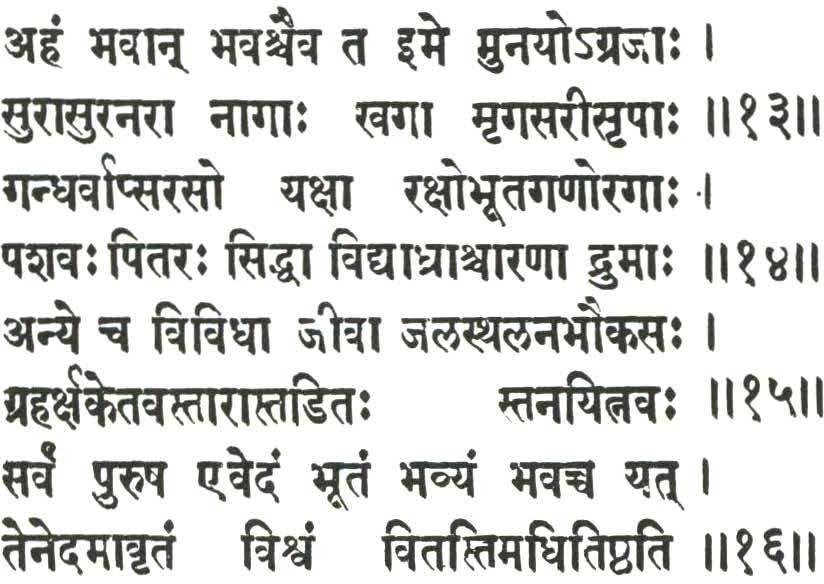
vidyiidhriis ciirartii drumii�
anye ca vividhii jivii
jala-sthala-nabhaukasa�
grahark§a-ketavas tiiriis
tat;litastanayitnava[t
Texts 13-16] Purlli!a-sukta Confirmed 285
Srimad-Hhagavatam
sarvam puru§a evedam
bhutam bhavyam bhavac ca yat
tenedam iivrtam visvam
vitastim adhi ti§{hati
aham-myself; bhaviin-yourself ; bhava�- Lord Siva; ca-also; eva-certainly; te-they; ime-all; munaya[t-the great sages; agraja�- born before you; sura-the demigods; asura-the demons; narii�-the human beings; niigii�-thc inhabitants of the Naga planet; khagii�-birds; mrga-beasts; saris_rpii[t-reptiles; gandharva-apsarasa[t, yak§ii[l,, rak§a[l,-bhuta-garw-uragii[l,, pasava[l, pitara[t, siddhii[t, vidyiidhrii[t, clira!Jii[l,-all inhabitants of different planets; druma[t-the vegetable kingdom; anye-many others; ca--:also; vividhii�-of different varieties; jivii�-living entities; jala-water; sthalaland; nabhaukasa[t-the inhabitants of the sky, or the birds; graha- the asteroids; rksa-the influential stars; ketava�- the comets; tiira� - Lhe luminaries; taflita[t-the lightning; stanayitnava�-the sound of the clouds; sarvam-everything ; puru§a[l,-the Personality of Godhead; eva idam-certainly all these; bhutam-whatever is created; bhavyam-whatever will be created; bhavat-and whatever was created in the past; ca-also; yat- whatever; tena idam-it is all by Him; avrtam-covered; visvam- universally comprehending; vitastim-half cubit; adhi ti§ thati-situated.

TRANSLATION
Beginning from me [Brahma] down to you and Bhava [Siva], all the great sages who were born before you, the demigods, the demons, the Nagas, the human beings, the birds, the beasts, as wellas the reptiles, etc., and all phenomenal manifestations of the universes, namely the planets, stars, asteroids, luminaries, lightning, thunder, and the inhabitants of the different planetary systems, namely the Gandharvas, Apsaras, Y�as, R�asas, Bhiitagattas, Uragas, Pa8avas, Pitaras, Siddhas, Vidyadharas, Carattas, and all other different varieties of living entities, including the birds, beasts, trees and everything that be, are all covered by the universal form of the Lord at all times, namely past, present and future, although He is transcendental to all of them, eternally existing in a form not exceeding nine inches.
PURPORT
The Supreme Personality of Godhead by His partial representation, measuring not more than nine inches as Supersoul, expandsby His poten-
286
[Canto 2, Ch. 6
tial energy in the shape of the universal form, which includes everything manifested in different varieties of organic and inorganic materials. Manifested varieties of the universe are therefore not different from the Lord, just as golden ornaments of different shapes and forms are nondifferent from the original stock reserve of gold. In other words, the Lord is the Supreme Person who controls everything that is within the creation, and still He remains the supreme separate identity, distinct from all manifested material creation. In the Bhagavad-gitii (Bg. 9.4-5) He is therefore said to be Yoge8vara. Everything rests on the potency of Lord Sri Kr��a, and still the Lord is different from and transcendental to all such identities. In the Vedic Puru§a-sukta of the .[{k-mantra, this is also confirmed. This philosophicaltruth of simultaneous oneness anddifference was propounded by Lord Sri Caitanya Mahaprabhu, and it is known as acintya-bhediibheda-tattva. Brahma, Narada and all others are simultaneously one with the Lord and different from the Supreme Lord. We are all one with Him, just as the gold ornaments are one in quality with the stock gold, but the individual gold ornament is never equal in quantity with the stock gold. The stock gold is never exhausted even if there are innumerable ornaments emanating from the stock because the stock is purywm, complete, and even if purr-am is deducted from the purr-am, still the supreme pun;wm remains the same purr-am. This fact is inconceivable to our present imperfect senses. Lord Caitanya therefore defined His theory of philosophy as acintya (inconceivable), and as confirmed in the Bhagavad-gitii as well as in the Bhiigavatam, Lord Caitanya's theory of acintya-bhediibheda-tattva isthe perfect philosophy ofthe AbsoluteTruth.
TEXT 17

svadhi§[tyarh pratapan priir-o bahis ca pratapaty asau
evarh viriijarh prataparhs
tapaty antar bahi[l pumiin
svadhi§r-yam-radiation; pratapan-by expansion;priir-a[l-living energy; bahi[l-external; ca-also; pratapati-illuminated; asau-the sun; evam-in

Text 17) Purlli}a-siikta Confirmed 287
the same way; viriijam-the universal form; pratapan-by expansion of; tapati-enlivens;anta�-internally; bah*-externally; pumiin-the Supreme Personality.
TRANSLATION
As the sun is illuminated both internally and externally by expanding its radiation, similarly the Supreme Personalityof Godhead, by expanding His universal form, maintains everything in the creation both internally and externally.
PURPORT
The universal form of the Lord, or the impersonal feature of the Lord known as brahrnajyoti, is clearly explained here, compared to the radiation of the sun. The sunshine may expand all over the universe, but the source of the sunshine, namely the sun planet or the deity known as the SuryanariiyaQa, is the basis of such radiation. Similarly, the Supreme Personality of Godhead Lord Kr�Qa is the basis of the impersonal brahrnaj_yoti radiation, or the impersonal feature of the Lord. This is confirmed in the Bhagavad-gjtii (14.27). So the universal form of the Lord is the secondary imagination of the impersonal form of the Lord, but the primary form of the Lord is Syamasundara, with two hands, playing on His eternal flute. Seventy-five percent of the expansive radiation of the Lord is manifested in the spiritual sky (tripiid-vibhiiti), and twenty-five percent of His personal radiation comprehends the entire expansion of the material universes. This is also explained and stated in the Bhagavad-gjtii (10.42). Thus the seventy-five percent expansion of His radiation is called His internal energy, whereas the twenty-five percent expansion is called the external energy of the Lord. The living entities, who are residents of the spiritual as well as the material expansions, are His marginal energy {tafasthii-sakti), and they are at liberty to live in either of the energies, external or internal. Those who live within the spiritual expansion of the Lord are called liberated souls, whereas the residents of the external expansion are called the conditioned souls. We can just make an estimate of the number of the residents of the internal expansions in comparison with the number of residents in the external energy and may easily conclude that the liberated souls are far more numerous than the conditioned souls.

288 Srimad-Bhagavatam [Canto 2, Ch. 6
sa�- He (the Lord); amrtasya-of deathlessness; abhayasya-of fearlessness; isa�-the controller; martyam-dying; annam-fruitive action; yatone who has; atyagiit-has transcended; mahimii-glories; e§�-of Him; tata�-therefore; brahman-0briihma!la N arada;pum§asya- of the Supreme Personality; duratyaya�-immeasurable.

TRANSLATION
The Supreme Personality of Godhead is the controller of immortality and fearlessness, and He is transcendental to death and the fruitive actions of the material world. 0 Narada, 0 brahmaf}a, it is therefore difficult to measure the glories of the Supreme Person.
PURPORT
The glories of the Lord, in the transcendental seventy-five percent portion of the Lord's internal potency, are stated in the Padma Purii[la (Uttara-kha[lpa). It is said there that those planets in the spiritual sky, which comprises the seventy-five percent expansion of the internal potency of the Lord, are far, far greater than those planets in the total universes composed of the external potency of the Lord. In the Caitanya-cal'itiimrta, the total universes in the external potency of the Lord are compared to a bucketful of mustard seeds. One mustard seed is calculated to be a universe itself. In one of the universes, in which we are now living, the number of planets cannot be counted by human energy, so how can we think of the sum total in all the universes, which are compared to a bucketful of mustard seeds? And the planets in the spiritual sky are at least three times the number of those in the material sky. Such planets, being spiritual, are in fact transcendental to the material modes; therefore they are constituted
Text 18) Pur�-sf1kta Confirmed
tt�f44llC(
so 'mrtasyiibhayasyeso martyam annam yad atyagiit mahimai§a'tato brahman pum§asya duratyaya� 289
TEXT 18 «f�����
I � m � ��: ������
in the mode of unalloyed goodness only. The conception of spiritual bliss (brahmiinanda) is fully present in those planets. Each of them is eternal, indestructible and free from all kinds of inebrieties experienced in the material world. Each of them is self-illuminating and more powerfully dazzling than (if we can imagine) the total sunshine of millions of mundane suns. The inhabitants of those planets are liberated from birth, death, old age and diseases and have full knowledge of everything; they are all godly and free from all sorts of material hankerings. They have nothing to do there except to render transcendental loving service to the Supreme Lord Naraya!J.a, who is the predominating Deity of such Vaiku!J.tha planets. Thoseliberated souls are engaged incessantly in singing songs mentioned in the Siima-veda (vedai� siir-ga-pada-kramopani§adair giiyanti yam siimagii�). All ofthem are personifications ofthe five Upani§ads. Tripiid-vibhuti, or the seventy-five percent portion known as the internal potency of the Lord, is to be understood as the kingdom of God far beyond the material sky; and when we speak of piida-vibhuti, or the twenty-five percent portion comprising His external energy, we should understand that this refers to the sphere of the material world. It is also said in the Padma Puriirw that the kingdom of tripiid-vibhuti is transcendental, whereas the piida-vibhuti is mundane. Tripiid-vibhiiti is eternal, whereas the piida-vibhuti is transient. The Lord and His eternal servitors in the transcendental kingdom all have eternal forms which are auspicious, infallible, spiritual and eternally youthful. In other words, there is no birth, death, old age and disease. That eternal land is full of transcendental enjoyment and full of beauty and bliss. This very fact is also corroborated in this verse of Srimad-Bhiigavatam, and the transcendental nature is described as amrta; and as it is described in the Vedas: utiimrtatvasydanaft. The Supreme Lord is the Lord of immortality, or in other words, the Lord is immortal, and because He is the Lord of immortality He can award immortality to His devotees. In the Bhagavad-gttii also (Bg. 8.16) the Lord assures that whoever may go to His abode of immortality shall never return to this mortal land of threefold miseries. The Lord is not like the mundane lord. The mundane master or lord never enjoys equally along with his subordinates, nor is a mundane lord immortal, nor can he award immortality to his subordinate. The Supreme Lord, who is the leader of all living entities, can award all the qualities of His personality unto His devotees, including immortality and spiritual bliss. In the material world there is always anxiety or fearfulness in the heart of all living entities, but the Lord, being Himself the supreme fearless, also awards the same quality of fearlessness to His pure devotees. Mundane existence is itself a kind of fearfulness because in all mundane

290 Srimad-Bhagavatam [Canto 2, Ch. 6
bodies the effects of birth, death, old age and disease always keep a living being compact in fearfulness. In the mundane world, there is always the influence of time, which changes things from one stage to another, and the living entity, originally being avikiira or nonchangeable, suffers a great deal on account of changes due to the influence of time. The changing effects of the eternal time are conspicuously absent in the immortal kingdom of God; it is therefore to be understood that there is no influence of time and therefore no fear whatsoever. In the material world, socalled happiness is the result of one's own work. One can become a rich man by dint of one's own hard labor, and there are always fear and doubts as to the duration of such acquired happiness. But in the kingdom of God, no one has to endeavor to attain a standard of happiness. Happiness is the nature of the spirit, as it is stated in the Vediinta-siitras: iinandamayo 'bhyiisiit-it is by nature full of happiness. Happiness in spiritual nature always increases in volume with a new phase of appreciation; there is no question of decreasing the bliss. Such unalloyed spiritual bliss is nowhere to be found within the orbit of the material universe, including the Janaloka planets, or, for that matter, the Maharloka or Satyaloka planets, because even Lord Brahma is subjected to the laws of fruitive actions and the law of birth and death. It is, therefore, stated here: duratyaya{l, or, in other words, spiritual happiness in the eternal kingdom of God cannot be imagined even by the great brahmaciiris or sannyiisis who are eligible to be promoted to the planets beyond the region of heaven. Or, the greatness of the Supreme Lord is so great that it cannot be imagined even by the great brahmaciiris or sannyiisis, but such happiness is factually attained by the unalloyed devotees of the Lord, by His divine grace. TEXT


Text 19] Pu�a-siikta Confirmed 291
19 piide§U saroa-bhiitiini purhsa{l sthiti-pado vidu{l amrtam k§emam abhayam tri-miirdhno 'dhiiyi miirdhasu
pade�u-in the one-fourth part; sarva-aU; bhutani-living entities; purhsa�-of the Supreme Person; sthiti-pada�-the reservoir of all material opulence; vidu�-you should know; amrtam-deathlessness; k�emam-all happiness, free from the anxiety of old age, diseases, etc.; abhayam-fearlessness; tri-murdhna�-beyond the three higher planetary systems; adhtiyi -exist;murdhasu-beyond the material coverings.
TRANSLATION
The Supreme Personality of Godhead is to be known as the supreme reservoir of all material opulences by the one-fourth part of His energy in which all the living entities exist. Deathlessness, fearlessness, and freedom from the anxieties of old age and disease, exist in the kingdom of God, which is beyond the three higher planetary systems and beyond the material coverings.

PURPORT
Out of the total manifestations of the sandhinienergy of the Lord, onefourth is displayed in the material world, and three-fourths is displayed in the spiritual world. The Lord's energy is divided into three component parts, namely sandhini, sarhvit and hladini, or, in other words, He is the full manifestation of existence, knowledge and bliss. In the material world such a sense of existence, knowledge and pleasure are meagerly exhibited, and all living entities, who are minute parts and parcels of the Lord, are eligible to relish such consciousness of existence, knowledge and bliss very minutely in the liberated stage, whereas in the conditioned stage of material existence they can hardly appreciate what is the factual, existential, cognizable and pure happiness of life. The liberated souls who exist in far greater numerical strength than those souls in the material world can factually experience the potency of the above-mentioned sandhini, sarhvit and hladini energies of the Lord in the matter of deathlessness, fearlessness and freedom from old age and disease.
In the material world, the planetary systems are arranged in three spheres, called triloka or Svarga, Martya, Piitala, and all of them constitute only one-fourth of the total sandhini energy. Beyond that there is the spiritual sky where the V aiku!ltha planets exist beyond the coverings of seven material strata. In none of the triloka planetary systems can one experience the status of immortality, full knowledge and full bliss. The
292 Srimad-Bhagavatam [Canto 2, Ch. 6
upper three planetary systems are called siittvika planets because they provide facilities for a long duration of life and relative freedom from disease and old age, as well as a sense of fearlessness. The great sages and saints are promoted beyond the heavenly planets to the Maharloka, but that also is not the place of complete fearlessness because at the end of one kalpa the Maharloka is annihilated and the inhabitants have to transport themselves to still higher planets. Yet even on these planets no one is immune from death. There may be a comparative extension of life, expansion of knowledge and sense of full bliss, but factual deathlessness, fearlessness and freedom from old age, diseases, etc., are only possible beyond the material spheres of the coverings of the material sky. Such things are situated on the head (adhiiyi miirdhasu).
TEXT 20

piidiis trayo bahis ciisann aprajiiniirh ya iisramii� antas tri-lokyiis tv aparo grha-medho 'brhad-vrata[l
piidii/:t traya�-the cosmos of three-fourths of the Lord's energy; bahi/:tthus situated beyond; ca-and for all; iisan-were ; aprajiiniim-of those who are not meant for rebirth; ye-those; iisramii/:t- status of life; anta[lwithin; tri-lokyii�-of the three worlds; tu-but; apara/:t-others; grhamedha[l-attached to family life; abrhat- vrata[l-without strictly following a vow of celibacy.
TRANSLATION
The spiritual world, which consists of three-fourths of the Lord's energy, is situated beyond this material world, and it is especially meant for those who will never be reborn. Others, who are attached to family life and who do not strictly follow celibacy vows, must live within the three material worlds.

Text 20) Puru�-siikta Confirmed 293
PURPORT
The climax of the system of varriisrama-dharma or saniitana-dharma is clearly expressed here in this particular verse of Srimad-Bhiigavatam. The highest benefit that can be awarded to a humanbeing is to train him to be detached from sex life, particularly because due to sex indulgence only the conditioned life of material existence continues birth after birth. Human civilization in which there is no control of sex life is a fourth-class civilization because in such an atmosphere there is no liberation of the soul encaged in the material body. Birth, death, old age and disease are related to the material body, and they have nothing to do with the spirit soul. But as long as the bodily attachment for sensual enjoyment is encouraged, the individual spirit soul is forced to continue the repetition of birth and death on account of the material body, which is compared to garments subjected to the law of deterioration.
In order to award the highest benefit of human life, the varriisrama system trains the follower to adopt the vow of celibacy beginning from the order of brahmaciiri. The brahmaciiri life is for students who are educated to follow strictly the vow of celibacy. Youngsters who have had no taste of sex life can easily follow the vow of celibacy, and once fixed in the principle of such a life, one can very easily continue to the highest perfectional stage, attaining the kingdom of the three-fourths energy of the Lord.It is already explained that in the cosmos of three-fourths energy of the Lord, there is neither death nor fear, and one is full of the blissful life of happiness and knowledge. A householder attached to family life can easily give up such a life of sex indulgence if he has been trained in the principles of thelife of brahmaciiri. A householder is recommended to quit home at the end of fifty years (paiicasordham vanam vrajet) and live a life in the forest; then, being fully detached from family affection, he may accept the order of renunciation as a sannyiisi fully engaged in the service of the Lord. Any form of religious principles in which the followers are trained to pursue the vow of celibacy is good for the human being because only those who are trained in that way can end the miserable life of material existence. The principles of nirvii!la, as recommended by Lord Buddha, are also meant for ending the miserable life of material existence. Andthis process,in the highest degree, is recommendedhere inthe SrimadBhiigavatam, with clear perception of ideal perfection, although basically there is no difference between the process of Buddhists, Sari.karites and Vai�?tmvites. For promotion to the highest status of perfection, namely freedom from birth and death, anxiety and fearfulness, not one of these processesallows thefollower to break thevow of celibacy.

294 Srimad-Bhagavatam [Canto 2, Ch. 6
The householders and persons who have broken the vow of celibacy deliberately cannot enter into the kingdom of deathlessness. The pious householders or the fallen yogis or the fallen transcendentalists can be promoted to the higher planets within the material world (one-fourth of the energy of the Lord), but they will fail to enter into the kingdom of deathlessness. Abrhad-vratas are those who have broken the vow of celibacy_ The viinaprasthas, or those retiredfromfamilylife, andthe sannyiisis, or the renounced persons, cannot break the vow of celibacy if they want success in the process. The brahmaciins, viinaprasthas and the sannyiisis do not intend to take rebirth (apraja), nor are they meant for secretly indulging in sex life. Such a falldown by the spiritualist may be compensated by another chance of human life in good families of learned briihmaras or of rich merchants for another term of elevation,but the best thing is to attain the highest perfection of deathlessness as soon as the human form of life is attained; otherwise the whole policy of human life will prove to be a total failure. Lord Caitanya was very strict in advising His followers in this matter of celibacy. One of His personal attendants, Chota Haridasa, was severely punished by Lord Caitanya because of his failure to observe the vow of celibacy. For a transcendentalist, therefore, who at all wantsto be promoted to the kingdom beyond material miseries, it is worse than suicide to deliberately indulge in sex life, especially in the renounced order of life. Sex life in the renounced order of life is the most perverted form of religious life, and such a misguided person can only be saved if, by chance, he meets a pure devotee.
TEXT 21

srtivicakrameviSvam
siisaniinasane
puru§as
srti-destination of the living entities; vicakrame-exists comprehensively; viSvam-the all-pervading Personality of Godhead; siisana-activities of lording it over; anasane-activities in the matter of devotional service; ubhe-both; yat-what is; auidyii-nescience; ca-as well as; vidyii-factual
Text 21) �a-siikta Confirmed 295
� M=t:CifillN?J�«1�1'11'1?;]9\� I ..... 'ltG:M?ll :ot f.rm � ���: ������
avidyii cavidyiica
ubhe yad
tiibhayiisrayafz
knowledge; ca- and ; purn§a�-the Supreme Person; tu-but; ubhaya-for both of them; asraya�-master.
TRANSLATION
By His energies, the all-pervading Personality of Godhead is thus comprehensively the master in the activities of controlling and in devotional service. He is the ultimate master of both nescience and factual knowledge ofall situations.
PURPORT
The word visvam is significant in this verse. One who travels perfectly in every field of activity is called the purn§a� or k§etrajiia. These two terms, k§etrajiia and purn§a, are equally applicable to both the individual self and the Supreme Self, the Lord. In the Bhagavad-gita the matter is explained as follows:
k§etr�jiiarh capi marh viddhi sarva-k§etre§U bharata

k§etra-k§etrajiiayor jiiiinarh yat taj jiiiinarh matarh mama (Bg. 13.3)
K§etra means the place, and one who knows the place is called the k§etrajiia. The individual self knows about his limited field of activities, but the Supreme Self, the Lord, knows about the unlimited field of activities. The individual soul knows about his own thinking, feeling and willing activities, but the Supersoul or the Paramiitmii, the supreme controller, being present everywhere, knows everyone's thinking, feeling and willing activities, and as such the individual living entity is the minute master of his personal affairs, whereas the Supreme Personality of Godhead is the master of everyone's affairs,past,present, and future (vedaharh samatitani, etc.). Only the ignorant person does not know this difference between the Lord and the living entities. The living entities, as distinguished from the incognizant matter, may be qualitatively equalto the Lord in the matter of cognizance, but the living entity can never be equal to the Lord in full knowledge of past, present and future.
And because the living entity is partially cognizant, he is therefore sometimes forgetful of his own identity. This forgetfulness is specifically manifested inthe field ofthe ekapad-vibhiiti ofthe Lord,or in the material world, but in the tripad-vibhuti field of actions, or in the spiritual world,
296 Srimad-Bhagavatam [Canto 2, Ch. 6
there is no forgetfulness bytheliving entities, who arefreefrom all kinds of contaminations resulting from the forgetful state of existence. Thematerial body is the symbol of the gross and subtle form of forgetfulness; therefore the whole atmosphere of the material world is called avidyii, or nescience, and similarly the whole atmosphere of the spiritual world is called vidyii, or full of knowledge. There are different stages of avidyii, and they are called dharma, artha, and mok§a. The idea of mok§a, or liberation, held by the monist in the matter of oneness of the living entity and the Lord by ultimate merging in one, is also the last stage of materialism or forgetfulness. To acquire the knowledge of qualitative oneness of the self and Superself is partial knowledge and ignorance also because there is no knowledge in the matter of quantitative difference, as explained above. The individual self can never be equal to the Lord in cognizance,otherwise he could not be placed in the state of forgetfulness. So, because there is a stage of forgetfulness of the individual selves, or the living entities, there is always a gulf of difference between the Lord and the living entity, as between the part and the whole. The part is never equal to the whole. So the conception of one hundred percent equality of the living being with the Lord is also nescience.
In the field of nescience, activities are directed toward lording it over the creation. In the material world, therefore, everyone is engaged in acquiring material opulence to lord it over the material world. Therefore there is always clash and frustration, which arethe symptoms of nescience. But in the field of knowledge, there is devotional service of the Lord (bhakti). Therefore there is no chance of being contaminated by the influence of nescience or forgetfulness (avidyii) in the liberated stage of devotional activities. The Lord is thus the proprietor both of the fields of nescience and of cognition, and it remains the choice of the living entity to exist in either of the above regions.

Text22] Pur�a-siikta Confirmed 297
22 4�1<::ut �---iii��f�IITlWti: I ���+{�4•111!N�Jtftfl{:w:t�i'.II�N"{"��" yasmiid ar-!iarh virii9 jajiie bhiltendriya-gur-iitmakafi. tad dravyam atyagiid vi$vam gobhifi. siirya iviitapan
TEXT
yasmat-from whom; arz�am-universal globes; virat-and the gigantic universal form; jajiie-appeared; bhuta-elements; indriya-senses; gurzaatmaka[l-qualitative; tat dravyam-the universes and the universal form, etc.; atyagat-surpassed; viSvam-all the universes; gobhi[l-by the rays; surya[l-the sun; iva-like; atapan-distributed rays and heat.

TRANSLATION
From that Personality of Godhead, all the universal globes and the universal form with all material elements, qualities, and senses are generated. Yet He is aloof from such material manifestations, like the sun, which is separate from its rays and heat.
PURPORT
The supreme truth has been ascertained in the previous verse as puru�a or the puru�ottama, the Supreme Person. The Absolute Person is the isvara or the supreme controller by His different energies. The ekapad-vibhuti manifestation of the material energy of the Lord is just like one of the many mistresses of the Lord, by whom the Lord is not so much attracted, as indicated in the language of the Gita (bhinna prakrti[l.). But the region of the tripad-vibhuti, being a pure spiritual manifestation of the energy of the Lord, is, so to speak, more attractive to Him. The Lord, therefore, generates the material manifestations by impregnating the material energy, and then, within the manifestation, He expands Himself as the gigantic form of the visva-riipa. The vi.Sva-riipa, as it was shown to Arjuna, is not the original form of the Lord. The original form of the Lord is the transcendental form of Puru�ottama, or Kr�!la Himself. It is very nicely explained herein that He expands Himself just like the sun. The sun expands itself by its terrible heat and rays, yet the sun is always aloof from such rays and heat. The impersonalist takes into consideration the rays of the Lord without any information of the tangible, transcendental, eternal form of the Lord, known as Kr�!J.a. Therefore Kr�!J.a, in His supreme personal form, with two hands and flute, is bewildering for the impersonalists who can accommodate only the gigantic vi.Sva-riipa of the Lord. They should know that the rays of the sun are secondary to the sun, and similarly the impersonal gigantic form of the Lord is also secondary to the personal form as Puru�ottama. The Brahma-samhita confirms this statement as follows:
298 Srimad-Bhagavatam [Canto 2, Ch. 6
iinanda-cinmaya-rasa-pratibhiivitiibhis tiibhir ya eva nijarnpatayii kaliibh*
goloka eva nivasaty akhiliitma-bhii.to govindam iidi-puru�am tam aham bhajiimi
"The Supreme Personality of Godhead, Govinda, the one who enlivens the senses of everyone by His personal bodily rays, resides in His transcendental abode, called Goloka. Yet He is present in every nook and corner of His creation by expansion of happy spiritual rays, equal in power to His personal potency of bliss." He is therefore simultaneously personal and impersonal by His inconceivable potency, or He is the one without a second, displaying complete unity in diversity of material and spiritual manifestations. He is separated from everything, and still nothing is dif· ferent from Him.
TEXT 23 � ;{TP<ti<${R1�1G:�Rl

yadiisya niibhyiin naliniid aham iisarh mahiitmana� niividarh yajna-sambhiiriin puru�iivayaviin rte
yadii-at the time of; asya-His; niibhyiit-from the abdomen; naliniitfromthelotus flower;aham-myself;iisam-took my birth;maha-iitmana[lof the great person; na avidam-did not know; yajna-sacrificial ; sambhiiriin-ingredients;puru§a-of the Lord;avayaviit-personal bodily limbs; rte-except.
TRANSLATION
When I was hom from the abdominal lotus flower of the Lord [Maha-Vi�9-u], the great person, I had no other ingredients for sacrificial performances except the bodily limbs of · the . great Personality of Godhead.
Text 23)
Pu�a-siikta Confirmed
299
�;{: I ;{{� ���HT'f_ ���ij-
II�� II
PURPORT

Lord Brahmii., the creator of the cosmic manifestation, is known as Sviiyambhuva, or one who is born without father and mother. The general process is that a living creature is born out of the sex combination of the male father and the female mother. But Brahmii., the first-born living being, is born out of the abdominal lotus flower of the Maha-Vi�Q.U plenary expansion of Lord Kr�l)a. The abdominal lotus flower is part of the Lord's bodily limbs, and Brahmii. is born out of the lotus flower. Therefore Lord Brahma is also a part of the Lord's body. Brahmii., after his appearence in the gigantic hollow of the universe, saw darkness and nothing else. He felt perplexity, and from his heart he was inspired by the Lord to undergo austerity, thereby acquiring the ingredients for sacrificial performances. But there was nothing besides the two of them, namely the Personality of Maha-Vi�l)U and Brahma himself, born of the bodily part of the Lord. For sacrificial performances many ingredients were in need, especially animals. The animal sacrifice is never meant for killing the animal, but for achieving the successful result of the sacrifice. The animal offered in the sacrificial fire is, so to speak, destroyed, but the next moment it is given a new life again by dint of the Vedic hymns chanted by the expert priest. When such an expert priest is not available, the animal sacrifice in the fire of the sacrificial altar is forbidden. Thus Brahma created even the sacrificial ingredients out of the bodily limbs of the Garbhodakasay1 Vi�Q.u, which means that the cosmic order was created by Brahma himself. Also, nothing is created out of nothing, but everything is created from the person of the Lord. The Lord says in the Bhagavad-gitii (Bg. 10.8), aham saroasya prabhavo matta"fl saroam pravartate. "Everything is made from My bodily limbs, and I am therefore the original source of all creations."
The impersonalists argue that there is no use in worshiping the Lord wheneverything is nothingbut the Lord Himself. The personalist, however, worships the Lord out of a great sense of gratitude, utilizing the ingredients born out of the bodily limbs of the Lord. The fruits and flowers are available from the body of the earth, and yet mother earth is worshiped by the sensible devotee with ingredients born from the earth. Similarly, mother Ganges is worshiped by the water of the Ganges, and yet the worshiper enjoys the result of such worship. Worship of the Lord is also performed by the ingredients born from the bodily limbs of the Lord, and yet the worshiper, who is himself a part of the Lord, achieves the result of devotional service of the Lord. While the impersonalist wrongly concludes that
300 Srimad-Bhagavatam [Canto 2, Ch. 6
he is the Lord himself, the personalist, out of a great gratitude, worships the Lord in devotional service, knowing perfectly well that nothing is different from the Lord. The devotee therefore endeavors to applyeverything in the service of the Lord because he knows that everything is the property of the Lord and that no one can claim anything as one's own. This perfect conception of oneness helps the worshiper in being engaged in His loving service, whereas the impersonalist, being falsely puffed up, remains a nondevotee forever, without being recognized by the Lord.
TEXT 24
te§u yajiiasya pasava[l sa-vanaspataya[l kusa[l idarh ca deva-yajanarh kalas corugur-iinvita[l
te§u-insuchsacrifices; yajiiasya-of the sacrificial performance; pasava[l -the animals or the sacrificial ingredients; sa-vanaspataya[l-along with flowers and leaves; kusii[l-the straw; idam-all these; ca-as also; devayajanam-the sacrificial altar; kiila{l - suitable time; ca-as also; urngreat; gur-a-anvita{l-qUJlified.
TRANSLATION

For performing sacrificial ceremonies, sacrificial ingredients, such as flowers, leaves and straw, along with the sacrificial altar and a suitable time [Spring] areallrequired.
TEXT 25

Text 25) Puru�a-siikta Confirmed 301
ij!! �� q�: ijtJ�: �m: 1 � � �t���ti tlil���am"�: 11����
Srimad-Bhagavatam
vastiinyo§adhayafl sneha
rasa-loha-mrdo jalam
reo yajurh�i samani
ciitur-hotrarh ca sattama
vastuni- utensils ; O§adhaya�-grains ; sneha�-clarified butter; rasa-lohamrdafl-honey, gold and earth; jalam- water; rca�-the .f{g-veda; yajiirh�ithe Yajur-veda; samani-the Sama-veda; catur-hotram-four persons conducting the performance;ca-all these; sattama-0 most pious one.



TRANSLATION
Other requirements are utensils, grains, clarified butter, honey, gold, earth, water, J,tg-veda, Yajur-veda, Sama-veda and four priests to perform the sacrifice.
PURPORT
To perform a sacrifice successfully, at least four expert priests are needed: one who can offer (hota), one who can chant (udgata), one who can kindle the sacrificial fire (brahmii) without the aid of separate fire,and one who can chant the hymns. Such sacrifices were conducted from the birth of Brahma, the first living creature, and were carried on till the reign of Maharaja Yudhi�!hira. But such expert brahmar-a priests arevery rare in this age of corruption and quarrel, and therefore in the present age only the yajiia of chantingthe holy name of the Lord is recommended. The scriptures enjoin:
harer nama harer nama harer niimaiva kevalam kalau nasty eva nasty eva nasty eva gatir anyatha.
302
[Canto 2, Ch_ 6
� +1�� �un� � � 1 �ijla$Ji�t: �: :q ����II
TEXT 26
Confirmed
niima-dheyiini mantras ca dak�i[!iis ca vrutiini ca devatiinukruma� kalpa� smikalpas tantrum eva ca
niima- dheyiini-invoking the names of the demigods; mantrii�-specific hymns to offer to a particular demigod; ca-also; dak§i[l-ii�-reward; caand; vrutiini-vows;ca-and; devatii-anukruma�-one demigod after another; kalpa�-the specific scripture; sankalpa�- the specific purpose; tantruma particular process; eva-as they are; ca-also.
TRANSLATION
Other necessities include invoking the different names of the demigods by specific hymns and vows of recompense, in accordance with the particular scripture, for specific purposes by specific processes.
PURPORT
The whole process of offering sacrifice is under the category of fruitive action, and such activities are extremely scientific. They mainly depend on the process of vibrating sounds with a particular accent. It is a great science, and due to being out of proper use for more than four thousand years, for want of qualified briihmar-as, such performances of sacrifice are no longer effective. Nor are they recommended in this fallen age. Any such sacrifice undertaken in this age as a matter of show may simply be a cheating process by the clever priestly order. But such a show of sacrifices cannot be effective at any stage. Fruitive action is being carried on by the help of material science and to a little extent by gross material help, but the materialists await a still more subtle advancement in the process of vibrating sounds on which the Vedic hymns are established. Gross material science cannot direct tl1e real purpose of human life. They can only increase the artificial needs of life without any solution to the problems of life; therefore the way of materialistic life leads to the wrong type of human civilization. Since the ultimate aim of life is spiritual realization, thedirect way of invoking the holy nam� of theLord, as mentioned above, is precisely recommended by Lord Caitanya, and people of the modern age can easily take advantage of this simple process which is tenable to the condition of the complicated social structure.

Text 26] Purl.Jl?Cl-siikta
303
TEXT 27

� �� SWlf� ijll� I
��ttltt'll��
�: Ql�ijl �:q-r 11�\911
gatayo matayas caiva priiyas-cittam samarpar-am pum§iivayavair ete sambhiirii� sambhrtii mayii
gataya�-progress to the ultimate goal (Vi��m);mataya�-worshiping the demigods; ca-as also;eva-certainly;priiyas-cittam-compensation;samarpar-am-ultimate offering;pum§a-the Personality of Godhead;avayava*from the parts of the body of the Personality of Godhead; ete-these; sambhiirii�-the ingredients;sambhrtii�-were arranged;mayu-by me.
TRANSLATION
Thus I had to arrange all these necessary ingredients and paraphernalia of the sacrifice from the personal bodily parts of the Personality of Godhead. By invocation of the demigods' names, the ultimate goal, Vi�!lu, was gradually attained, and thus compensation and ultimate offering was complete.
PURPORT
In this verse special stress is given to the person of the Supreme Lord, and not to His impersonal brahmajyoti, as being the source of all supplies. Naraya�a, the Supreme Lord, is the goal of sacrificial results, and therefore the Vedic hymns are ultimately meant for attaining this goal. Human life is thus made successful by pleasing Naraya�a and getting entrance into the direct association of Naraya�a in the spiritual kingdom of Vaiku�tha.
TEXT
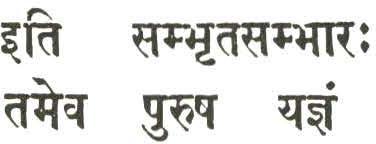
304 Srimad-Bhagavatam [Canto 2, Ch. 6
28 � �n-:t;=q=l�=:q��ll_ I �tfr:Ntlll�� II�(;II
Pur�a-sukta Confirmed
iti sambhrta-sambhiira{t puru�iivayavair aham tam eva puru�arit yajiiarit tenaiviiyajam iSvaram
iti- thus; sambhrta- executed; sambhiira{t- equipped myself well; puru�a -the Personality of Godhead; avayavai{t-by the parts and parcels; ahamI; tam eva-unto Him ; puru�am-the Personality of Godhead; yajiiam-the enjoyer of all sacrifices; tena eva- by all those; ayajam- worshiped; iSvaram- the supreme controller.
TRANSLATION
Thus I created the ingredients and paraphernalia for offering sacrifice out of the parts and parcels of the body of the Supreme Lord, the enjoyer of the sacrifice, and I performed the sacrifice to satisfy the Lord.
PURPORT
People in general are always anxious to have peace of mind or peace in the world, but they do not know how to achieve such a standard of peace in the world. Such peace in the world is obtainable by performances of sacrifice and by practicing austerity. In the Bhagavad-gitii the following prescription is recommended:
bhoktiirarit yajiia-tapasiirit sarva-loka-mahesvarom su-hrdarit sarva-bhutiiniirit jniitvii miirit siintim rcchati (Bg. 5.29)
"The karma-yogis know that the Supreme Lord is the factual enjoyer and maintainer of all sacrifices and of the austere life. They also know that the Lord is the ultimate proprietor of all the planets, and He is the factual friend of all living entities. Such knowledge gradually converts the karmayogis into pure devotees of the Lord through the association of unalloyed devotees, and thus they are able to be liberated from the material bondage."
Brahma, the original living being within the material world, taught us the way of sacrifice. The word sacrifice suggests dedication of one's own interests for satisfaction of a second person. That is the way of all activities. Every man is engaged in sacrificing his interests for others, either

Text 28]
305
in the form of family, society, community, country or the entire human society. But perfection of such sacrifices is attained when they are performedfor the sake of the SupremePerson, the Lord. Because the Lord is the proprietor of everything, because the Lordis the friend of all living creatures, and because He is the maintainer of the performer of sacrifice, as well as the supplier of the ingredients of sacrifices, it is He only and no one else who should be satisfied by all sacrifices.
The whole world is engaged in sacrificing energy for advancement of learning, social upliftment, economic development and plans for total improvementofthehumancondition,butno oneis interested in sacrificing for the sake of the Lord, as it is advised in the Bhagavad-gitii. Therefore, there is no peace in the world. If men at all wantpeace in the world, they must practice sacrifice in the interest of the supreme proprietor and friend of all.
TEXT 29

� � � �TWit � ;rer I
�"l. �:m�upfij� t!«+uRm: 11�'<.11
tatas te bhriitara ime prajiiniirh patayo nava ayajan vyaktam avyaktarh purn§arh su-samiihitii�
tataft-thereafter; te-your; bhriitaralz -brothers; ime-these; prajiiniimof the living creatures; patayalz- masters; nava-nine in number; ayajanperformed; vyaktam- manifested; avyaktam- non manifested; purn§ampersonalities; su-samiihitii/1-with proper rituals.
TRANSLATION
My dear son, thereafter your nine brothers, who are the masters of living creatures, performed the sacrifice with proper rituals to satisfy both the manifested and nonmanifested personalities.
PURPORT
The manifested personalities are the demigods like the ruler of the heavenly kingdom, Indra, and his associates; and the nonmanifested
306 Srimad-Bhagavatam [Canto 2, Ch. 6
personality is the Lord Himself. The manifested personalities are mundane controllers of the material affairs, whereas the nonmanifested Personality ofGodheadistranscendental,beyond the rangeofthematerialatmosphere. In this age of Kali the manifested demigods are also not to be seen dueto spacetravel beingcompletely stopped. So both powerfuldemigods and the Supreme Personality of Godhead are nonmanifested to the covered eyes of the modern man. Modern men want to see·everything with their eyes, although they are not sufficiently qualified. Consequently, they disbelieve in the existence of the demigods or of theSupreme God. They should see through the pages of authentic scriptures and should not simply believe their unqualified eyes. Even in these days, God can also be seen by qualified eyes tinged with the ointment of love of God.
TEXT 30

ml� �or.r: m �fit� �sql: I fi«rof.���: ffiQNf�� II� o II
tatas ca manava� kale
lJlTe nayo 'pare pitaro vibudhii daitya
manu§yii� kratubhir vibhum
tata�-thereafter; ca-also; manava�-the Manus or the fathers of mankind;kale-in due course of time; ijire-worshiped; r§aya�- great sages; apare-others; pitara�-the forefathers; vibudha�-the learned scholars; daitya�-great devotees of the demigods; manu§ ya�-mankind; kratubh* vibhum-by perfor mance of sacrifices in order to please the Supreme Lord.
TRANSLATION
Thereafter, by performance of sacrifice meant to please the Supreme Lord, Manu, the father of mankind, worshiped great sages, learned scholars and forefathers.
PURPORT
The daityas are devotees of the demigods because they want to derive thegreatestpossiblematerialfacilitiesfromthem. The devotees of the Lord
Text 30] Pu�a-siikta Confirmed 307
are eka-ni.§{ha, or absolutely attached to the devotional service of the Lord. Therefore they have practically no time to see the benefits of material facilities. Because of their realization of their spiritual identity, they are more concerned with spiritual emancipation than with material comforts.
TEXT 31

niiriiyare bhagavati
tad idarh visvam iihitam grhita-miiyorn-gura� sargiidiiv agura� svata�
niiriiyare-unto Naraya!J.a; bhagavati-the Personality of Godhead; tat idam-all these material manifestations; visvam-all the universes; iihitamsituated; grhita-having accepted; miiyii- matcrial energies; uru-gu[!a�greatly powerful; sarga-iidau-in the matter of creation, maintenance and destruction; agura�- without affinity for the material modes; svata�self-sufficiently.
TRANSLATION
All the material manifestations of the universes are therefore situated in His powerful material energies, which He accepts self-sufficiently, although He is eternally without affinity for the material modes.
PURPORT
The question put by Narada before Brahma concerning the sustenance of the material creation is thus answered. Material actions and reactions, as the material scientist can superfi�ially observe, are not basically ultimate truth in regards to creation, maintenance, and destruction. But the material energy is a potency of the Lord which is displayed in time, accepting the three qualities of goodness, passion and ignorance in the forms of Vi�!J.U, Brahma and Siva. The material energy thus works under the supreme spell of His Lordship, although He is always transcendental to all such material

308 Srimad-Bhagavatam [Canto 2, Ch. 6
actiVIties. A rich man constructs a big house by spending his energy in the shape of resources, and similarly he destroys a big house by his resources, but the maintenance is always under his personal care. The Lord is the richest of the rich because He is always fully complete in six opulences. Therefore He is not required to do anything personally, but everything in the material world is carried out by His wishes and direction; therefore, the entire material manifestation is situated in Naraya'!a, the Supreme Personality of Godhead. Impersonal conception of the supreme truth isdue to lack of knowledge only, and thisfact is clearly explained by Brahmaji, who is supposed to be the creator of the universal affairs. Brahmaji is the highest authority of Vedic wisdom, and his assertion in this connection is therefore the supreme information.
�tfi{
TEXT 32

srjiimi tan-niyukto 'ham haro harati tad-vasa� visvarh puru§a-rilpera paripiiti tri-sakti-dhrk
srjami-do create; tat-by His; niyukta�-a ppo i nt ment ; aham-1; haraftLord Siva; harati-destroys; tat-vasa�-under His subordination; visvamihe whole universe; puru§a-Personality of Godhead; rilpera-by His eternal form; paripiiti- maintains; tri-sakti-dhrk-the controller of three f�nergu�s.
TRANSLATION
By His will, I create, Lord Siva destroys, and He Himself, in His eternal form as the Personality of Godhead, maintains everything. He is the powerful controller of these three energies.
PURPORT
The conception of one without a second is clearly confirmed here.
Text 32] Purtllla-siikta Confirmed 309
�Nt!!"ffil� ro ro?f �: I R� �(iq�\111l qftqffir f,r�"'11��11
The one is Lord Vasudeva, and by His different energies and expansions only, different manifestations, both in the material and in the spiritual worlds, are maintained. In the material world also, Lord Vasudeva is everything, as is stated in the Bhagavad-gitii (Bg. 7.19): viisudeva� saroam iti, everything is Vasudeva only. In the Vedic hymns also the same Vasudeva is held to be supreme. It is said in the Vedas, viisudeviit paro brahman na ciinyo'rtho'ti tattvata: in fact there is no greater truth than Vasudeva. And Lord Kr�!la affirms the same truth in the Bhagavad-gitii (Bg. 7.7), matta� paratararh niinyati: there is nothing above Me (Lord Kr�!la). So the conception of oneness, as is overly stressed by the impersonalist, is also accepted by the personalist devotee of the Lord. The difference is that the impersonalist denies personality in the ultimate issue, whereas the devotee gives more importance to the Personality of Godhead. Srimad-Bhiigavatam explains this truth in the verse under discussion: Lord Vasudeva is one without a second, but because He is all-powerful, He can expand Himself as well asdisplay His omnipotencies. The Lord is described here as omnipotent by three energies (tri-sakti-dhrk). So primarily His three energies are internal, marginal, and external. This external energy is also displayed in the three modes of goodness, passion and ignorance. Similarly, the internal potency is also displayed in three spiritual modes, sarhvit, sandhini, and hliidini. The marginal potency or the living entities are also spiritual (prakrtirh viddhi me pariim), but they are never equal with the Lord. The Lord is nirasta siimya atisaya; in other words, no one is greater than or equal to the Supreme Lord. So the living entities, including even such great personalities as Lord Brahma and Lord Siva, are all subordinate to the Lord. In the material world also, in His eternal form of Vi�!lu, He maintains and controls all the affairs of the demigods, including Brahma and Siva.


310 Srimad-Bhagavatam [Canto 2, Ch. 6
TEXT 33 rnr �SNmf ijtij �i\�q��0fuI wtl�'l1'•Nij:ftM"#:Ioti{t�{t�l�'i�'(II��II iti te'bhihitam tiita yathedam anuprcchasi niinyad bhagavata[l kincid bhiivyam sad-asad-iitmakam
iti-thus;te-untoyou; abhihitam-explained ; tata-my dearson; yathaas; idam-all these; anuprcchasi-as you have inquired; na-never ; anyatanything else; bhagavata{l.-beyond the Personality of Godhead; kiiicitnothing; bhavyam-to be thought ever; sat-cause; asat-effect; atmakaminthe matter of.
TRANSLATION
My dear son, whatever you inquired from me, I have thus explained unto you, and you must know for certain that whatever there is (either as cause or as effect, both in the material and spiritual worlds) is dependent on the Supreme Personality of Godhead.
PURPORT
The complete cosmic situation, both in the material andin the spiritual manifestations of the energies of the Lord, is working and moving first as the cause and then as the effect. But the original cause is the Supreme Personality of Godhead. Effects ofthe original cause become the cause of other effects, and thus everything, either permanent or temporary, is working as cause andeffect. And because the Lord is theprimeval cause of all persons and all energies, He is called the cause of all causes, as it is confirmed in the Brahma-samhita as well as in the Bhagavad-gitii. The Brahma-samhitii affirms:
iSvara[l. parama[l. kmw[l. sac-cid-iinanda-vigraha{l. aniidir adir govinda[l. sarva-kiira[la-kiira[lam.
(Bs. 5.1)
And in the Bhagavad-gitii it is said:
aham sarvasya prabhavo matta{l. sarvam pravartate iti matvii bhajante miim budhii bhiiva samanvita[l..
(Bg. 10.8)
So the original primeval cause is vigraha, the personal, and the impersonal spiritualeffulgence, brahmajyoti, is alsothe effect ofthe SupremeBrahman {brahma[lo hi prati§thaham), Lord Krwa.

Text 33] PurlJ.'!a-siikta Confirmed 311
Srimad-Bhagavatam
TEXT 34

;r mcit ilsw �q�� � "'"' '"'
;r�tfiR;:� �;rnl �qT •IIQ: I

;r i{ �� q���ij<;q�
;:r;:i{ W��T � m: II� 'dll
na bhiirati me'nga mr§opalak§yate
na vai kvacin me manaso mr§ii gat*
na me hr§ikiirti patanty asat-pathe
yan me hrdautkarfhyavatii dhrto har*
na-never; bhiirati-statements; me-mine; anga-0 Narada; mnii-untruth; upalak§yate-prove to be; na-never; vai-ccrtainly; kvacit-at any time; me-mine; manasa�-of the mind; mr§ii-untruth; gati� -p rogress; na-nor; me- mine; h[§ikiirti-senses; patanti-degrades; asat-pathe-in the temporary matter; yat- because ; me- mine; hrdii-heart; autkarfhyavatiiby great earnestness; dhrta�- caught hold of; hari�-the Supreme Personality of Godhead.


TRANSLATION
0 Narada, because I have caught hold ofthe lotus feet of the Supreme Personality of Godhead, Hari, with great zeal, whatever I say has never proved to have been false. Nor is the progress of my mind ever deterred. Nor are my senses ever degraded bytemporary attachment to matter.
PURPORT
Lord Brahma is the original speaker of Vedic wisdom to Narada, and Narada is the distributor of transcendental knowledge all over the world through his various disciples, like Vyasadeva and others. Thefollowers of Vedic wisdom accept the statements of Brahmaji as gospel truth, and transcendental knowledge is thus being distributed all over the world by the process of disciplic succession from time immemorial, since the beginning of the creation. Lord Brahma is the perfect liberated living being within the material world, and any sincere student of transcendental knowledge must accept the words and statements of Brahmajias infallible. The Vedic knowledge is infallible because it comes down directly from the
312
[Canto 2, Ch. 6
Supreme Lord unto the heart of Brahma, and since he is the most perfect living being, Brahmaji is always correct to the letter. And this is because Lord Brahma is a great devotee of the Lord who has earnestly accepted the lotus feet of the Lord as the supreme truth. In the Brahma-samhitii, which is compiled by Brahmajl, he repeats the aphorism, govindam iidi-puru§am tam aham bhajiimi: "I am a worshiper of the original Personality of Godhead, Govinda, the primeval Lord." So whatever he says, whatever he thinks, and whatever he does normally in his mood are to be accepted as truth because of his direct and very intimate connection with Govinda, the primeval Lord. Sri Govinda, who pleasingly accepts the loving tranS�::endental service of His devotees, gives all protection to the words and actions of His devotees. The Lord declares in the Bhagavad-gitii (Bg. 9.31 ), kaunteya pratijiinmi: "0 son of Kunti, please declare it." The Lord asks Arjuna to declare, and why? Because sometimes thedeclaration of Govinda Himself may seem to be contradictory to mundane creatures, but the mundaner will never find any contradiction in the words of the Lord's devotees. The devotees are especially protected by the Lord so that they may remain infallible. Therefore the process of devotional service always begins in the service of the devotee who appears in disciplic succession. The devotees are always liberated, but that does not mean that they are impersonal. The Lord is a person eternally, and the devotee of the Lord is also a person eternally. Because the devotee has his sense organs even at the liberated stage, he is therefore a person always. And because the devotee's service is accepted by the Lord in full reciprocation, the Lord is also a person in His complete spiritual embodiment. The devotee's senses, being engaged in the service of the Lord, never go astray under the attraction of false material·enjoyment. The plannings of the devotee never go in vain, and all these things are due to the faithful attachment of the devotee forthe service of the Lord. This isthe standard of perfection and liberation. Anyone,b�nning fromBrahmajl down to the human being, is at once put on the path of liberation simply by his attachment in great earnestness for the Supreme Lord, Sri Kr�!la, the primeval Lord. The Lord affirms this in the Bhagavad-gitii:
miim ca yo 'vyabhiciirerta bhakti-yogena sevate sa gu[liin samatityaitiin brahmabhiiyiiya kalpate.
(Bg. 14.26)
Anyone, therefore, who is earnestly serious in heart and soul about being in intimate touch with the Personality of Godhead in the relation-

Text 34) PufW1a-sukta Confirmed 313
ship of transcendental loving service will always be infallible in words and action. The reason is that the Supreme Lord is Absolute Truth, and anything earnestly dovetailed with the Absolute Truth attains the same transcendental quality. On the other hand, any amount of mental speculation on the strength of material science and knowledge without any bona fide touch with the Absolute Truth is sure to be a mundane untruth and failure, simply due to not being in touch with the Absolute Truth. Such godless, unfaithful words and actions, however materially enriched, are never to be trusted. That is the purport of this important verse. A grain of devotion is more valuable than tons of faithlessness.
3fR'.IFt� � (1'41�
����: 11�4.11
so'ham samiimniiyamayas tapomaya� projii-patiniim abhivandita[l. pati[l. iisthiiya yogam nipur-am samiihitas tam niidhyagaccham yata iitma-sambhava[l.
safl aham-my self (the great Brahmii); samamniiyamayafl-in the chain of disciplic succession of Vedic wisdom; tapomaya[l.-successfully undergone all austerities; projii-patiniim-of all the forefathers of living entities; abhivandita[l.-worshipable; pati[l.-master; iisthiiya-successfully practiced; yogam-mystic powers; nipur-am-very expert; samiihita[l.-self-realized; tam-the Supreme Lord; na-did not; adhyagaccham-properly understood; yata[l.-from whom; iitma-self; sambhava[l.-generated.
TRANSLATION
Although I am known as the great Brahma, perfect in the disciplic succession of Vedic wisdom, and although I have undergone all austerities and am an expert in mystic powers and self-realization, and although I am

314 Srimad-Bhagavatam [Canto 2, Ch. 6
35 '"' . '"' mS{ �l�ltt'itt�NI+PH Sf�=uqJ\�f�: m: I
TEXT
recognized as such by the great forefathers of the living entities, who offer me respectful obeisances, still I cannot understand Him, the Lord, the very source of my birth.
PURPORT
Brahma, the greatest of all living creatures within the universe, is admitting his failure to know the Supreme Lord in spite of his vast learning in the Vedic wisdom, austerity, penance, mystic powers and self-realization, and despite being worshiped by the great Prajapatis, the forefathers of the living entities. So these qualifications are not sufficient to know the Supreme Lord. Brahmaji could understand the Lord to a little extent only when he was trying to serve Him by the eagerness of his heart (hrdautkarthya), which is the devotional service mood. Therefore, the Lord can be known only by the sincere mood of eagerness for service, and not by any amount of material qualification asscientist or speculative philosopher or by attainment of mystic powers. This fact is clearly corroborated in the Bhagavad-gitii (Bg. 18.54-55):

brahma-bhiita[! prasanniitmii na socati na kiink�ati sama[! sarve�u bhiite�u mad-bhaktim labhate pariim.
bhaktyii miim abhijiiniiti yiiviin yas ciismi tattvata[! tato miim tattvato jiiiitvii visate tad anantaram.
Self-realization only, by attainment of the above high qualifications of Vedic wisdom, austerity, etc., can help one on the path of devotional service. But failing in devotional service, one remains still imperfect because even in that position of self-realization, one cannot factually know the Supreme Lord. By self-realization, one is qualified to become adevotee, and the devotee, by service mood (bhaktyii) only, can gradually know the Personality of Godhead. One should not, however, misunderstand the import of viSate (enters into) as being merged into the existence of the Supreme. Even in the material existence, one is merged in the existence of the Lord. No materialist can disentangle self from matter due to the self's being merged in the external energy of the Lord. As no layman can separate butter from milk, similarly no one can extricate the merged self from matter by acquiring some material qualification. This visate by devotion (bhakti) means to be able to participate in the association of the Lord in person. Bhakti, ordevotional service of the Lord, means to become free from the material entanglement and then to enter into the kingdom
Text 35] Pu�a-siikta Confirmed 315
of God, becoming one like Him. Losing one's individuality is not the aim of bhakti-yoga or of the devotees of the Lord. There are five types of liberations, one of which is called sayujya-mukti, or being merged into the existence or body of the Lord. The other forms of liberation maintain the individuality of the particle soul and involve always being engaged in the transcendental loving service of the Lord. The word viSate, used in the verses of the Bhagavad-gita, is thus meant for the devotees who are not at all anxious for any kind of liberation. The devotees are satisfied simply in being engaged in the service of the Lord, regardless of the situation.
Lord Brahma is the first living being, who learnt directly the Vedic wisdom from the Lord (tene brahma hrda ya adi-kavaye). Therefore, who can be a more learned Vedantist than Lord Brahma? He admits that in spite of his perfect knowledge in the Vedas, he was unable to know the glories of the Lord. Since no one can be more than Lord Brahma, how can a so-called Vedantist be perfectly cognizant of the Absolute Truth? The so-called Vedantist, therefore, cannot enter into the existence of the Lord without being trained in the matter of Bhakti-vedanta, or Vedanta plus bhakti. Vedanta means self-realization, and bhakti means realization of the Personality of Godhead, to some extent. No one can know the Personality of Godhead in full, but at least to a certain extent, one can know the Absolute Truth, Personality of Godhead, by self-surrender and devotional attitude, and by nothing else. In the Brahma-sarhhita also, it is said, vede§u durlabham, or simply by study of Vedanta one can hardly find out the existence of the Personality of Godhead, but the Lord is adurlabham atmabhaktau, very easily available to His devotee. Snla Vyasadeva, therefore, was not satisfied simply with compiling the Vedanta-siitras, but over and above this, by the advice of his spiritual master, Narada, he compiled the Srimad-Bhagavatam in order to understand the real import of Vedanta. Srimad-Bhagavatam is, therefore, the absolute medium to understand the Absolute Truth.



316 Srimad-Bhagavatam [Canto 2, Ch.6
TEXT 36 ;rnls�� �ui �qf . . ��� ��I ttl �l{lt�� � q;;fiW{ � wt+�: � �: ����II
Pur�a-siikta Confirmed
nato 'smy aharh tac-cararmh samiyu�iirh
bhavacchidarh svasty-ayanarh su-mahgalam
yo hy iitma-rnaya-vibhavarh srnaparyagiid
yathii nabha� sviintam athiipare kuta�
nata�-let me offer my obeisances; asmi-am; aham-1; tat-the Lord's; carar-am-feet; samiyu�iim-of the surrendered soul; bhavacchidam-that which stops repetition ofbirth anddeath; svasty-ayanarh-perception of all happiness; su-mangalam-all-auspicious; ya�-one who; hi-exal 'tly ; almamaya -personal energies; vibhavam-potency; sma-rertain ly; parya�a 1- cannot estirnak; ya th a-as much as;nabha/1-thc sky;wan/am-ils own limit; atha-th erdore ; apare-uthers; kuta�-how.
TRANSLATION

Therefore it is best for me to surrender unto His feet, which alone can deliver one from the miseries of repeated birth and death. Such surrender is all-auspicious and allows one to perceive all happiness. Even the sky cannot estimate the limits of its own expansion. So what can others do when the Lord Himself is unable to estimate His own limits?
PURPORT
Lord Brahmii, the greatest of all learned living beings, the greatest sacrificer, the greatest observer of the austere life, and the greatest selfrealized mystic, advises us, as the supreme spiritual master of all living beings, that one should simply surrender unto the lotus feet of the Lord in order to achieve all success, even up to the limit of being liberated from the miseries of material life and being endowed with all-auspicious spiritual existence. Lord Brahma is known as the pitiimaha, or the father's father. A young man consults his experienced father about discharging his duties. So the father is naturally a good advisor. But Lord Brahmii is the father of all fathers. He is the father of the father of Manu, who is the father of mankind all over the universal planets. Therefore the mankind of thisinsignificant planetshould kindly accept theinstruction of Brahmiiji and would do well to surrender unto the lotus feet of the Lord rather than try to estimate the length and breadth of the Lord's potencies. His potencies are immeasurable, as is confirmed in the Vedas. Parasya saktir vividhaiva sriiyate sviibhaviki jii.iina-bala-kriyii ca. He is greatest of all, and
Text 36]
317
all others, even the greatest of all living beings, namely, Brahmaji, admits that the best thing for us is to surrender unto Him. Therefore only those persons with a very poor fund of knowledge claim that they themselves are lords of all that they survey. And what can they survey? They cannot survey even the length and breadth of a small sky in one small universe. The so-called material scientist says that he would need to live forty thousandyears to reach the highest planet of the universe,being carried by a sputnik. This is also utopian because no one can be expected to live forty thousand years.Besides, when the space pilot returns from his travel, none of his friends would be present to receive him back as the greatest astronaut, as has become fashionablefor modern bewildered scientific men. One scientific man, who had no belief in God, was very much enthusiastic in making plans for his material existence and therefore opened a hospital to save the living. But after opening the hospital, he himself died within six months. So one should not spoil his human life, which is obtained after many, many changes of bodies in 8,400,000 species of life, simply for the concocted material happiness of life by increasing artificial needs in the name of advancement of economic development and scientific knowledge, but one should simply surrender unto the feet of the Lord to make a solution of all miseries of life. That is the instruction of Lord Krsna directly in the Bhagavad-gitii, and that is the instruction of Sn��dBhiigavatam by Brahmaji, the supreme father of all living beings. Anyone denying this surrendering process as recommended both in the Bhagavad-gitii and in the Snmad-Bhiigavatam and, for that matter, in all authorized scriptures, will be forced to surrender unto the laws of material nature. The living entity, by his constitutional position,is not independent. He must surrender, either unto the Lord or unto material nature. Material nature is also not independent of the Lord, since the Lord Himself has claimed material nature as mama miiyii, or "My energy" (Bg. 7.14), and as me bhinnii prakrtir a�tadhii, or "My separated energy in eight divisions." (Bg. 7.4) Therefore material nature is also controlled by the Lord, as He has claimed in Bhagavad-gitii: mayiidhyak§ena prakrtift suyate sacariicaram, "Under My direction only is material nature working, and thus are all things moving." (Bg. 9.10) And the living entities, beingsuperior energy to matter, have choice and discrimination either to surrender unto the Lord or to surrender unto material nature. By surrendering unto the Lord, one is happy and liberated, but by surrendering unto material nature the living entity suffers. So the end of all sufferingmeans surrendering unto the Lord because the surrendering process itself is bhavacchidam or liberation from all material miseries, svastyayanam or perception of all happiness, and suma�igalam or the source of everything auspicious.

318 Snmad-Bhagavatam [Canto 2, Ch. 6
Therefore liberty, happiness and all good fortune can be attained only by surrendering unto the Lord because He is full liberty, full happiness and full auspiciousness. Such liberation and happiness are also unlimited, and they have been compared to the sky, although such liberation and happiness are infinitely greater than the sky. In our present position we can simply understand the magnitude of greatness when it is compared with the sky. We failto make a measurement of the sky, but the happiness and liberty obtained in association with the Lord are far greater than the sky. That spiritual happiness is so great that it cannot be measured, even by the Lord Himself, not to speak of others.
It is said in the scriptures, brahma sukham hy anantam, spiritual happiness is unlimited. Here it is said that even the Lord cannot measure such happiness. This does not mean that the Lord cannot measure it and is therefore imperfect in that sense. The actual position is that the Lord can measure it, but the happiness in the Lord is also identical with the Lord on account of absolute knowledge. So the happiness derived from the Lord may be measured by the Lord, but the happiness increases again, and the Lord measures it again, and then again the happiness increases more and more, and the Lord measures it more and more, and as such there is eternally a competition between increment and measurement, so much so that the competition is never stopped, but goes on unlimitedly ad infinitum. Spiritual happiness is iinandiimbudhi-vardhanam, or the ocean of happiness which inr:reases. The material ocean is stagnant, but the spiritual ocean is dynamic. In the Caitanya-caritiimrta, (4th Chapter, Adi-lilii)

Kaviraja Gosvami has very nicely described this dynamic increment of the ocean of spiritual happiness in the transcendental person of Srimati Radharatti, the pleasure potency of Lord Kr�Qa. TEXT

Text 37] Pu�a-siikta Confirmed 319
37 ;ntWJ� � �tq� tf�: Ffit!�llq� Wf! (Inti��· +ilWti>attf� NMrl4d�� �� 11�\911 niiham na yuyam yad-rtam gatim vidur na viimadeva[l kim utiipare surii[l tan-miiyayii mohita-buddhayas tv idam vinirmitam ciitma-samarh vicak§mahe
na-neither; aham-1; yiiyam-all you sons; yat-whose; rtam-factual; gatim-movements; vidu�-do know; na-nor; vamadeva�--Lord Siva; kim-what; uta-else; apare-others; suro{l-demigods; tat-by His; mayaya-by the illusory energy; mohita-bewildered; buddhaya{lwith such intelligence; tu-but; idam-this; vinirmitam-what is created; ca-also; atma-samam-by dint of one's personal capacity; vicak§maheobserve.
TRANSLATION

Since neit her Lord Siva nor you nor I could ascertain the limits of spiritual happiness, how can other demigods know it? And because all of us are bewildered by the illusory external energy of the Supreme Lord, we can see only this manifested cosmos according to our individual capacity.
PURPORT
We have many times mentioned the names of twelve selected authorities (dvadasa-mahajana), of which Brahma, Narada and Lord Siva head the list as the first, second and third in order of merit of those who know something of the Supreme Lord. Other demigods, semi-demigods, Gandharvas, Ciira!J.aS, Vidyadharas, human beings, or asurascannot possibly know fully about the potencies of the Absolute Lord, Sri Kr�J)a. The demigods, semidemigods, Gandharvas, etc., are all highly intelligent persons in the upper planets. The human beings are inhabitants of the intermediate planets, and the asuras are inhabitants of the lower planets. All of them have their respective conceptions and estimations of the Absolute Truth, as does the scientist or the empiric philosopher in thP human society. All such living entities are creatures of the material nature, and consequently they are bewildered bythewonderful display of the three modes of material nature. Such bewildermentismentioned in the Gita ( Bg. 7.13): tribhir gurwmayair bhavair ebhi{l sarvam idam jagat, every entity, beginning from Brahma down to the ant, is individually bewildered by the three modes of material nature, namely goodness, passion and ignorance. Everyone thinks, in terms of individual capacity, that this universe, which is manifested before us, is all in all. And so the scientist in the human society of the twentieth century calculates the beginning and end of the universe in his own way. But what can the scientists know? Even Brahma himself was once bewildered, thinking himself the only one 13rahma favored by the Lord, but later on, by the grace of the Lord, he came to know that there are innu-
320 Srimad-Bhagavatam [Canto 2, Ch. 6
merable more powerful Brahmas as well in far bigger universes beyond this universe, and all of these universes combined together form ekapiid-vibhuti or one-fourthof the manifestation of the Lord's creative energy. The other three-fourths of His energy are displayed in the spiritual world, so what can the tiny scientist with a tiny brain know of the Absolute Personality of Godhead, Lord Kr�J;la? The Lord says, therefore, mohitam niibhijiiniiti miim ebhya� param avyayam: bewildered by such modes of material nature, they cannot understand that there is a Supreme Person beyond these manifestations who is the absolute controller of everything. Brahma, Narada and Lord Siva know about the Lord to a considerable extent, and therefore one should follow the instructions of these great personalities instead of being satisfied with a tiny brain and its playful discoveries such as spacecraft and similar products of science. As the mother is the only authority to identify the father of a child, so the mother Vedas, presented by the recognized authority such as Brahma, Narada or Siva, etc., is the only authority to inform us about the Absolute Truth.
TEXT 38

yasyiivatiira-karmii[li giiyanti hy asmad-iidaya� na yam vidanti tattvena tasmai bhagavate nama�
yasya-whose; avatara-incarnation; karmarzi-activities; gayanti-chant in glorification; hi-indeed; asmat-adaya� -persons like us; na-do not; _yam-whom; vidanti -know; tattvena-cent percent as He is; tasmai-unto Him; bhagavate-unto the Personality of Godhead Sri Km1a; nama�-respectful obeisances.
TRANSLATION
Let us offer our respectful obeisances unto that Supreme Personality of Godhead whose incarnations and activities are chanted by us for glorification, though He can hardly be fully known as He is.
Text 38) Puru�a-siikta Confirmed 321
��lllfiit mtrf;:ij ���:I
;p;fM� � �� � ;pf: ������
It is said that the transcendental name, form, quality, pastimes, paraphernalia, personality, etc., cannot possibly be perceived by the gross materialistic senses. But when the senses are purified by the process of hearing, chanting, remembering, and worshiping the lotus feet of the holy Deity, etc., the Lord reveals Himself proportionately to the advancement of the quality of devotional service (ye yathii miim prapadyante). One should not expect the Lord to be an order-supplying agent who must be present before us as soon as we desire to see Him. We must be ready to undergo the prescribed devotional duties, following the path shown by the predecessors in the disciplic succession from Brahma, Narada and similar authorities. As the senses are progressively purified by bona fide devotional service, the Lordreveals His identityaccording to the spiritual advancement of the devotee. But one who is not in the line of devotional service can hardly perceive Him simply by calculations and philosophical speculations. Such a hard worker can present a jugglery of words before the audience, but can never know the Supreme Personality of Godhead in His personal feature. The Lord has clearly stated in the Bhagavad-gl;ta that one can know Him only by devotional service. No one can know the Lord by any puffed up material process of challenge, but the humble devotee can please the Lord by his earnest devotional activities. Thus the Lord reveals Himself proportionately before the devotee. Lord Brahma therefore offers his respectful obeisances as a bona fide spiritual master and advises us to follow the process of sravara and kirtana. Simply by this process, or simply by hearing and chanting the glories of the activities of the Lord's incarnation, one can certainly see within himself the identity of the Lord. We have already discussed this subject in Volume One of Srimad-Bhiigatavam, in connection with the verse:
tac chraddadhiinii munayo jniina-vairiigya-yuktayii
pa.Syanty iitmani ciitmiinam bhaktyii sruta-grhitayii.
(Bhag. 1.2.12)
The conclusion is that no one can know the Supreme Personality of Godhead fully by any method, but He can be seen and felt partially by the devotional service process of hearing, chanting, etc.

322 Snmad-Bhagavatam [Canto 2, Ch. 6
PURPORT
TEXT 39

ij � �: �:���'*�ht: I 3WilT�'4;:qt�'4�t�+u4 ij eiii:0Mqffif� n��"
w e�a iidya� pum�a�
kalpe kalpe srjaty aja�
iitmiitmany iitmaniitmiinarh sa samyacchati piiti ca
sa�-He; e�a�-the very; iidya�-the original Personality of Godhead; puro�a�-the Maha-Vigm incarnation, a plenary portion of Govinda, Lord Krf?�a; kalpe kalpe-in each and every millennium; srjati- creates; aja�the unborn; iitma-self; iitmani-upon the self; iitmanii-by His own self; iitmiinam-own self; safl-He; samyacchati-absorbs; piiti- maintains; caalso.
TRANSLATION
"That Supreme original Personality of Godhead, Lord Sri Kr!jna, expanding His plenary portion as Maha-Vi!j!Q.U, the first incarnation, creates this manifested cosmos, but He is unborn. The creation, however, takes place in Him, and the material substance, as well as the manifestations, are all Himself, which He maintains for some timeand againabsorbsinto Himself again.
PURPORT
The creation is nondifferent from the Lord, and still He is not in the creation. This is explained in the Bhagavad-gitii as follows:
maya tatam idam saroarh jagad avyakta-miirtinii
mat-sthiini saroa-bhiitiini na ciiham te�v avasthita{l
(Bg. 9.4)
The impersonal conception of the Absolute Truth is also a form of the Lord called avyakta-miirti. Miirti means form, but because His impersonal feature is inexplicable by our limited senses, He is the avyakta-miirti form, and in that inexplicable form of the Lord the whole creation is resting, or, in other words, the whole creation is the Lord Himself, and the creation is
Text 39] �-siikta Confirmed
323
also nondifferent from Him, but simultaneously He, as the original Personality of Godhead Sri Kr��a, is aloof from the created manifestation. The impersonalist gives stress to the impersonal form or feature of the Lord and does not believe in the original personality of the Lord, but the Vai�!lavas accept the original form of the Lord, of whom the impersonal form is merely one of the features. The impersonal and personal conceptions of the Lord are existing simultaneously, and this fact is clearly described both in the Bhagavad-gitii and the Srimad-Bhiigavatam, and also in other Vedic scriptures. Inconceivable by human intelligence, the idea must simply be accepted on the authority of the scriptures, and it can only be practically realized by the progress of devotional service unto the Lord, and never by mental speculation or inductive logic. The impersonalists depend more or less on inductive logic, and therefore they always remain in darkness about the original Personality of Godhead Sri Kr�!la. Their conception of Kr��a is not clear, although everything is clearly mentioned in all the Vedic scriptures. A poor fund of knowledge cannot comprehend the existence ofan original personal form of the Lord when He is expanded in everything. This imperfectness is due, more or less, to the material conception that a substance which is distributed widely in parts can no longer exist in the original form.
The original personality of Godhead (iidya�) Govinda expands Himself as the Maha-Vi��u incarnation and rests in the Causal Ocean which He Himself creates. The Brahma-samhitii confirms this as follows:
yaft kiira[liifT!ava-jale bhajati sma yoganidriim ananta-jagad-a[l{ia-sa-romakupaft iidhiira-saktim avauunbya pariim sva-miirtim govindam iidi-puru§arh tam aham bhajiimi
Lord Brahmajl says in his Brahma-samhitii, "I worship the primeval Lord Govinda, who lies down in the Causal Ocean in His plenary portion as Maha-Vi��u, with all the universes generating from the pores of hair on Histranscendental body, and who accepts the mystic slumber of eternity."
So this Maha-Vi�!lu is the first incarnation in the creation, and from Him allthe universes generate and all material manifestations are pro.duced, one after another. The Causal Ocean is created by the Lord as the mahattattva, as a cloud in the spiritual sky, and is a part of His different manifestations only. The spiritual sky is an expansion of His personal rays, and He is the mahat-tattva cloud also. He lies down and generates the universes by His breathing, and again, by entering into each universe as

324 Srimad-Bhagavatam [Canto 2, Ch. 6
Garbhodakasayi Vi�p.u, He creates Brahma, Siva and many other demigods for maintenance of the universe and again absorbs the whole thing into His person, as is confirmed in the Bhagavad-gitii:
sarva-bhiitiini kaunteya prakrtirh viinti miimikiim kalpak§aye punas tiini kalpiidau visrjiimy aham.
(Bg. 9.7)

"0 son of Kunti, when the kalpa or the duration of the life of Brahma is ended, then all the created manifestations enter into My prakrti, or energy, and again, when I desire, the same creation takes place by My personal energy."
The conclusion is that these are all displays of the Lord's inconceivable personal energies only, of which no one canhave any full information, and this point we have already discussed.
TEXTS 40-41
visuddharh kevalarh jiiiinarh pratyak sarhyag avasthitam
satyarh purr-am aniidy-antarh nirgur-arh nityam advayam

f§€ vidanti munaya� prasiintiitmendriyiisayii� yadii tad eviisat-tarkais
tiro-dhiyeta viplutam
visuddham-without any material tinge; kevalam-pure and perfect; jiiiinam- knowledge; p ratyak-all -per vading ;sarityak- in ful I ness; avasthitam -situated; sat_yam-truth; purr-am-absolute; anadi-without any beginning; antam-and so also without any ��nd; nirgur-am- devoid of material modes;




Texts 40-41] Purlli!a-sukta Confirmed 325
M� �� � ��;n I .... . • C' • ,...., (' • ,....._ � \01'1=1� �ll'f ��� 11\?oll " "' ,....
�mo=ilFttT 1
a��t�;f.fuR�a �a� II\?�II
�1!1 TW��:
�T
nityam-eternal; advayam
-without any rival; �e-0 Narada, 0 great sage; vidanti-they can understand only; munaya�-the great thinkers; prasanta-pacified; atma-self; indriya-senses; asaya�-sheltered; yadiiwhilc; tat-that; eva-certainly; asat-untenable; tarkai�-arguments; tirodhiyeta-disappears; viplutam-distorted.
TRANSLATION
The Personality of Godhead ispure, beingfree from ;ill contaminations ofmaterial tinges. He is the Absolute Truthandthe embodimentof fulland perfect knowledge. He is all-pervading, without beginning or end, and without rival. 0 Narada, 0 great sage, the great thinkers can know Him when completely freed from all material hankerings and when sheltered under undisturbed conditions of the senses. Otherwise, by untenable arguments, all is distorted, and the Lord disappears from our sight.
PURPORT
Here isanestimation of the Lord apart from His transcendental activities in the temporary material creations. Mayavada philosophy tries to designate the Lord as contaminated by a material body when He accepts forms of incarnation. This sort of interpolation is completely denied herein by explaining the position of the Lord as pure and unalloyed in all circumstances. According to Mayavada philosophy, the spirit soul, when covered bynescience,isdesignated as jiva, but when he is freed from such ignorance of nescience he is merged in the impersonal existence of the Absolute Truth. But here it is said that the Lord is eternally the symbol of full and perfect knowledge. This is His speciality: perpetual freedom from all material contaminations. This distinguishes the Lord from the individual, common living entities who have the aptitude of being subordinated by nescience and thus becoming materially designated.In the Vedas it is said thatthe Lordis vijiianam iinandam, full of bliss and knowledge. The conditioned souls are never to be compared to Him because such individual souls have the tendency of becoming contaminated. Although after liberation the living entity can become one with the same quality of existence as the Lord, his very tendency to become contaminated, which the Lord never has, makes the individual living entity different from the Lord. In the Vedas it is said, ayam atma apahata papna itit: the individual iitmii becomes polluted by sin, but the Lord is never contaminated by

326 Srimad-Bhagavatam [Canto 2, Ch. 6
sins. The Lord is compared to the powerful sun. The sun is never contaminated by anything infectious because it is so powerful. On the contrary, infected things are sterilized by the rays of the sun. Similarly, the Lord is never contaminated by sins; on the contrary, the sinful living entities become sterilized by contact with the Lord. This means that the Lord is also all-pervading like the sun, and as such the word pratyak is used in this verse. Nothing is excluded from the existence of the Lord's potential expansions. The Lord is within everything, and He is all-covering also, without being disturbed by the activities of the individual souls. He is therefore infinite, and the living entities are infinitesimal. In the Vedas it is said that only the Lord alone exists, and ali others' existences depend on Him. He is the generating reservoir for everyone's existential capacity; He is the Supreme Truth of all other categorical truths. He is the source of everyone's opulence, and therefore no one can equal Him in opulence. Being full of all opulences, namely wealth, fame, strength, beauty, knowledge and renunciation, certainly He is the Supreme Person. And because He is a person, He has many personal qualities, although He is transcendental to the material modes. We have already discussed the stat(•ment, illhambh,-ita-guno hari�. (Rhiig. 1.7.10) II is transcendental qualities are so attractive that even the liberated souls (iitmiiriimas) are also attracted by them. Although possessed of aiJ personal qualities, He is, nevertheless, omnipotent. Therefore, personally He has nothing to do, for everything is being carried out by His omnipotent energies. This is confirmed by the Vedic mantras: pariisya saktir vividhaiva sriiyate sviibhiiviki jniina-bala-kriyii ca. This suggests His specific spiritual form, which can never be experienced by the material senses. He can be seen only when the senses are purified by devotional service, yam eva4a Vf[lUte tanurh sviim. As such, there are basic differences between the Lord and the living entities, in so many respects. No one can be compared to the Lord, as the Vedas declare, ekam eviidvitiyam brahma dvaitiit vai bhayam bhavati. The Lord has no competitor, and He has nothing to fear from any other being, nor can anyone be equal to Him. Although He is the root of all other beings, there are basic differences between Him and other beings. Otherwise there was no necessity of the statement in the previous verse that no one can know Him one hundred percent as He is, na yam vidanti tattvena. That no one can fully understand Him is explained also in this verse, but the qualification for understanding to some degree is mentioned here. Only the prasiintas, or the unalloyed devotees of the Lord, can know Him to a greater extent. The reason is that the devotees have no demands in their lives but to be obedient servants of the Lord, while all others,

Texts 40-41] Puru�-siikta Confirmed 327
namely the emperic philosophers, the mystics, and the fruitive workers, all basically have some demand, and as such they cannot be pacified. The fruitive worker wants reward for his work, the mystic wants some perfection of life, and the empiric philosopher wants to merge in the existence of the Lord. Somehow or other, as long as there is a demand for sense satisfaction, there is no chance for pacification; on the contrary, by unnecessary dry speculative arguments, the whole matter becomes dis· torted, and thus the Lordmovesstill further away from our understanding. The dry speculators, however, because of their following the principles of austerity and penance, can have knowledge of the impersonal features of the Lord to some extent, but there is no chance of their understanding His ultimate form as Govinda because only the amaliitmanas, or the completely sinless persons, can accept pure devotional service of the Lord, as is confirmed in the Bhagavad-gitii (Bg. 7.28):
ye§iim tv antagatam piipam janiinam pu[lya-karma[!iim te dvandva-moha-nirmukta bhajante miim dnlha-vratii[l
TEXT 42

3Wit�:��:
��: �: �JtWi�
ftm.__�---��:qftt?14l�: II'tl�II
iidyo'vatiira[l puru§afi. parasya kiila[l svabhiiva[l sad-asan-manas ca dravyam vikiiro gu[la indriyii[li viriit svariit sthiisnu cari§[lU·bhiimna[l
adya[l-first; avatiira[l- incarnation; puru§a[l- Karap.arp.avasayi Vi�p.u; parasya-of the Lord; kiila[l.-time; svabhiiva[l.-space ; sat-resultant; asateause; manafi.-mind; ca-also; dravyam-elements; vikiira[l-material ego; gu[lafi,-modes of nature; indriyli[li-scnses ; virii[ -the complete whole body; svarii[ - Garbhodakasayi Vi�p.u; sthiisnu-immovable; cari§[lU- mov· able; bhumna[l-of the Supreme Lord.
328 Snmad-Bhagavatam [Canto 2, Ch. 6
�
I
�Nm�tJT��ar
Karal)iirl)ava8ayi Vi�I)U is the first incarnation of the Supreme Lord, and He is the master of eternal time, space, cause and effects, mind, elements, material ego, modes of nature, senses, the universal form of the Lord, Garbhodaksayi V�I)U, and the sum total of all living beings, both moving and nonmoving.

PURPORT
That the material creation is not permanent has been discussed many times hereinbefore. The material creation is but a temporary exhibition of the material energy of the Almighty God. This material manifestation is necessary to give a chance to the conditioned souls who are unwilling to associatewith the Lord in the relationship of lovingtranscendental service. Suchunwillingconditioncdsouls are notallowed to enterinto the liberated life of spiritual existence because at heart they are not willing to serve. Instead, they want to enjoy themselves as imitation Gods. The living entities are constitutionally eternal servitors of the Lord, but some of them, because of misusing their independence, do not wish to serve; therefore they are allowed to enjoy the material nature, which is called miiyii, or illusion. It is called illusion because the living beings under the clutches of miiyii are not factually enjoyers, although they think that they are, being illusioned by miiyii. Such illusioned living entities are given a chance at intervals to rectify their perverted mentality of becoming false masters of the material nature, and they are imparted lessons from the Vedas about their eternal relationship with the Supreme Lord Kr�p.a (vedais ca saroair aham eva vedyaM. So the temporary creation of the material manifestation is an exhibition of the material energy of the Lord, andto manage the whole showtheSupreme Lord incarnatesHimselfasthe Karap.arl)avasayi Vi�I)U just as a magistrate is deputed by the government to manage affairs temporarily. This Kara!J.odakasayi Vi�I)U causes the manifestation of material creation by looking over His material energy (sa aik�ata�)- In the first volume of this book we have already discussed to some extent the explanation of the verse jagrhe paum�arh riiparh. The duration of the illusory play of material creationis called a kalpa, and we have already discussed the creation's taking place in kalpa after kalpa. By His incarnation and potential activities, the complete ingredients of creation,namely time, space, cause, result, mind, the gross and subtle elements andtheir interactional modes of nature-goodness, passion and ignorance-
Text 42) Puru�a-sukta Confirmed 329 TRANSLATION
and then the senses and their reservoir source, the gigantic universal form as the second incarnation Garbhodakasayi Vi�pu, and all living beings, both moving and standing, which come out of the second incarnation, all became manifested. Ultimately, all these creative elements and the creation itself are but potential manifestations of the Supreme Lord; nothing is independent of the control of the Supreme Being. This first incarnation in the material creation, namely Karaparpavasayi Vi�pu, is the plenary part of the original Personality of Godhead, Sri Kr�pa, described in the Brahma-samhitii as follows:
yasyaikani.Svasitakiilam athiivalamb_ya jivanti loma�vilajii jagad-a!l{la-niithii�


v4r-ur mahan sa iha yasya kala-vi.Se§o govindam iidi-pum§arh tam aham bhajiimi

All the innumerable universes are maintained only during the breathing period of Maha-Vi�pu or Karaparpavasayi Vi�pu, who is only a plenary part of Govinda, the original Personality of Godhead Lord Kf�pa.

TEXTS

330 Srimad-Bhagavatam [Canto 2, Ch.6
43-45 31� � � �it �m � it �Na;ta;tt� I ���T: \Cm��� ��"'����: 11��11 (',.... "' ���· it tt'ri�ww.n: I it en ��liT: � ..t)"' "' "'"' 3Trt1 � t1 �JO��q��,hn: ����II ttff� � ���tr�r��'t��Tuf��:����f.l� �� qt ��rr.qtt=a:"T.(4:r::ll:��q,.'( II��II
Texts 43-45]

Pu�a-siikta Confirmed
aham bhavo yajiia ime prajesii dak§iidayo ye bhavad-iidayas ca svarloka-piiliifi. khagaloka-piilii nrloka-piilas talaloka-piiliifi.
gandharva-vidyiidhara-cararesii ye yak§a-rak§oraga-niiganiithiifi. ye vii r§i[!iim r§abhiifi. pitfriim daityendra-siddhesvara-diinavendriifi. anye ca ye preta-piSiica-bhiitakii§mii[!fla-yiido-mrga-pak§yadhisiifi.
yat kiiica loke bhagavan mahasvad oja[l.-sahasvad balavat k§amiivat sri-hri-vibhuty-iitmavad adbhutiirram tattvam param riipavad asvariipam
aham-myself (Brahmii.ji); bhavafi.-Lord Siva; yajiiafi.- Lord Vi�!JU; ime -all these;prajesiifi.-the father of the living beings;dak§a-iidayafi.-Dak�a; Marici,Manu,etc.;ye-those;bhavat-yourself;iidayafi.ca-andthebachelors (Sanat-kumaraandhisbrothers); svarloka-piiliifi.-theleadersoftheheavenly planets; khagaloka-piilafi.-the leaders of space travellers; nrloka-piiliifi.the leaders of mankind; talaloka-piilafi.-the leaders of the lower planets; gandharva-the residents of Gandharvaloka; vidyiidhara- the residents of the Vidyadhara planet;ciirara-isiifi.-the leadersof the Cara!Jas;ye-asalso others; yak§a-the leaders of the Yak�as;rak§a-demons;uraga-snakes; niiga-niithiifi.-leaders of the Nagaloka (below the earth);ye-others; viialso;[§i[!iim-of the sages;[§abhiifi.-the chief;pitfriim-of the forefathers; daitya-indra-leaders of the atheists;siddha-isvaras-leaders of the Siddhaloka planets(spacemen);diinava-indriifi.-Ieadersof thenon-Aryans;anyebesides them;ca-also;ye-those;preta-dead bodies;piSiica-evii spirit; bhiita-jinn; kii§miirfla-a special typeof evil spirit;yiidafi.-aquatics ; mrga -animals; pak§i-adhiSiifi.-giant eagles; yat-anything ; kim ca-and everything;loke-in the world;bhagavat-possessed of bhaga, or extraordinary power;mahasvat-of a special degree; oja[l-sahasvat-specific mental and sense dexterity; balavat-possessed of strength; k§amavat-possessed of forgiveness; sri-beauty; hri-ashamed of impious acts; vibhiiti-riches; iitmavat-possessed of intelligence;adbhuta-wonderful;arram- race; tattvam-specific truth; param-transcendental;"riipavat-as if the form of; asvariipam-not the form of the Lord.
331
Myself [Brahma], Lord Siva, Lord V��u, great generators of living beings like Da4a and Prajapati, yourselves [Narada and the Kumaras], heavenly demigods like lndra, Candra, etc., the leaders of the Bhurloka planets, the leaders of the earthly planets, the leaders of the lower planets, the leaders of the Gandharva planets, the leaders of the Vidyadhara planets, the leaders of the Cara�aloka planets, the leaders of the Y ak�as, Rak�as and Uragas, the great sages, the great demons, the great atheists and the great spacemen, as well as the dead bodies, evil spirits, satans, jinn, kii�ma��as, great aquatics, great beasts and great birds, etc.-in other words, anything and everything which is exceptionally possessed of power, opulence, mental and perceptual dexterity, strength, forgiveness, beauty, modesty, opulence, and breeding, which is either in form or is formless-may appear to be the specific truth and the form of the Lord, but actually are not so. They are only a fragment of the transcendental potency of the Lord.
PURPORT
Those in the list given above, beginning from the name of Brahmaji, the first living creature within the universe, down to Lord Siva, Lord Vi�p.u, Narada and other powerful demigods, men, supermen, sages, r�is, and other lower creatures of extraordinary strength and opulence, including the dead bodies, satans, evil spirits, jinn, aquatics, birds and beasts, etc., may appear to be the Supreme Lord, but factually none of them is the Supreme Lord; every one of them possesses only a fragment of the great potencies of the Supreme Lord. The less intelligent class of men is surprised to see the wonderful actions of material phenomena, as the aborigines are fearful of a great thunderbolt, a great and gigantic banyan tree, or a great lofty mountain in the jungle. For such undeveloped human beings, merely the slight display of the Lord's potency is captivating. A still more advanced person is captivated by the powers of the demigods and goddesses. Therefore, those who are simply astonished by the powers of anything in the creation of the Lord, without any factual information of the Lord Himself, areknown as Saktas, or worshipers of the great powers. The modern scientist is also captivated by the wonderful actions and reactions of natural phenomena and therefore is also Sakta. These lower grade persons gradually rise to states of becoming Sauriyas, or worshipers of the sun-god, Giirtapatyas, or worshipers of the mass of people as janatii-

332 Srimad-Bhagavatam [Canto 2, Ch. 6
TRANSLATION
janiirdana or daridrya-narayaJ)a, etc., in the form of Ga�apati, and then rise to the platform of worshiping Lord Siva in search for the ever-existing soul, and then to the stage of worshiping Lord Vi��u, the Supersoul, etc., without any information of Govinda or Lord Kr�l)a, who is the original Lord Vi�I)U. In other ways some are worshipers of race, !'lationality, birds, beasts, evil spirits, satans, etc. The general worship of Sanideva, the lord of distressful condition, and Sitaladev1, the goddess of smallpox, is also common to the mass of people, and there are many foolish men who worship the mass of people or the poor class of men. So different persons, societies and communities, etc., worship some of the potential manifestations of the Lord, wrongly accepting the powerful object as God. But in this verse it is advised by Brahmajl that none of them is the Supreme Lord, hut they are only borrowed plumes from the original Almighty Lord Sri Kf�l)a. When the Lord advises in Bhagavad-gitii to worship Him alone, it is to be understood that worshiping Lord Kr��;ta includes worshiping all that is mentioned, because He, Lord Kp�rya, includes everyone.
When the Lord is described as formless in the Vedic literatures, it is to be understood that all these forms mentioned above, within the experience of universal knowledge, are different exhibitions of the Lord's transcendental potencies only, and none of them factually represent the transcendental form of the Lord. But at the same time, when the Lord actually descends on the earth or anywhere within the universe, the less intelligent class of men also mistake Him to be one of them, and thus they imagine the Transcendence to be formless or impersonal. Factually, the Lord is not formless, nor does He belong to any of the multiforms experienced within the universal forms. One should try to know the truth about the Lord by following the instruction of Brahmajl.
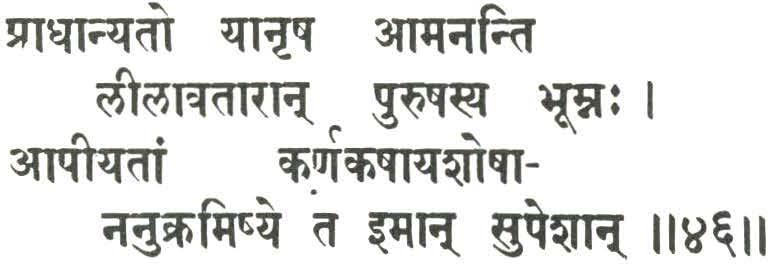
TEXT 46
priidhiinyato yiin f§U iimananti liliivatiiriin puru�asya bhiimna� iipiyatiiin karrza-ka�iiya-so�iin anukram4ye ta imiin supesiin

Text 46] Puru�a-sukta Confirmed 333
pradhiinyata[l-chiefly;yan-all those;�e-0 Narada;amananti-worship; lila-pastimes; avataran-incarnati�ns; pum§asya-of the Personality of Godhead; bhumna[l-the Supreme; apiyatam-in order to be relished by you; karr-a-ears; ka§aya-foul matter; SO§lin-that which evaporates;_ anukrami§ye-shall state one after another; te-they;imiin-as they are in my heart;supesiin-all pleasing to hear.
TRANSLATION

0 Narada, now I shall state, one after another, the transcendental incarnations of the Lord, known as lila avataras. Hearing of their activities counteracts all foul matters accumulated in the ear. These pastimes are pleasing to hear and are to be relished. Therefore they are in my heart."
PURPORT
As it was said in the beginning of Srimad-Bhiigavatam (Bhag. 1.5.8), one cannot be fully satisfied by hearing unless and until one is given a chance to hear of the transcendental activities of the Lord. So Brahmajl is also trying, in this verse, to stress the importance of narrating the transcendental pastimes of the Lord as He comes and manifests Himself here on the surface of the material planets. Every living entity has a tendency to hear pleasing messages, and as such almost every one of us is inclined to hear news and talks broadcast by the radio stations. But the difficulty is that no one is satisfied at heart by hearing all those messages. The cause of such dissatisfaction is the incompatibility of the message with the innermost stratum of the living soul. This transcendental literature is especially prepared by Srila Vyasadeva to give the utmost s�tisfaction to the people in general by narration of the activities of the Lord, as instructed by Sri Narada Muni to Srila Vyasadeva. Such activities of the Lord areprincipally of two varieties. One concerns the mundane manifestation of the material creative force, and the other deals with His pastimes in the form of different incarnations in terms of the time and place. There are innumerable incarnations of the Lord, like the waves of the river flowing constantly in and out. Less intelligent persons take more interest in the creative forces of the Lord in the material world, and, being disconnected from their relationship with the Lord, they put forward many theories of the creation in the name of scientific research. The devotees of the Lord, however, know well how the creative forces work concurrently by the action and reaction
334 Srimad-Bhagavatam [Canto 2, Ch. 6
of the material energy of the Lord. Therefore they take more interest in the transcendental activities of the Lord as He incarnates Himself on the surface of the material world. Srimad-Bhiigavatam is the history of such activities of the Lord, and people who take interest in hearing SrimadBhiigavatam clear their hearts of accumulated mundane filth. There are a thousand and one rash literatures on the market, but one who has taken interest in the Srimad-Bhiigavatam loses all interest in such filthy literatures. Sri Brahmajl is thus attempting to narrate the principal incarnations of the Lord so that they may be drunk by Narada as transcendental nectar.
Thus end the Bhaktivedanta pu rports of the Second Canto, Sixth Chapter, of the Srimad-Bhagavatam, entitled "Puru§a-sukta Confirmed."

Text 46] PunJl?a-sukta Confirmed 335














































































































































































































































































































































































































































































































